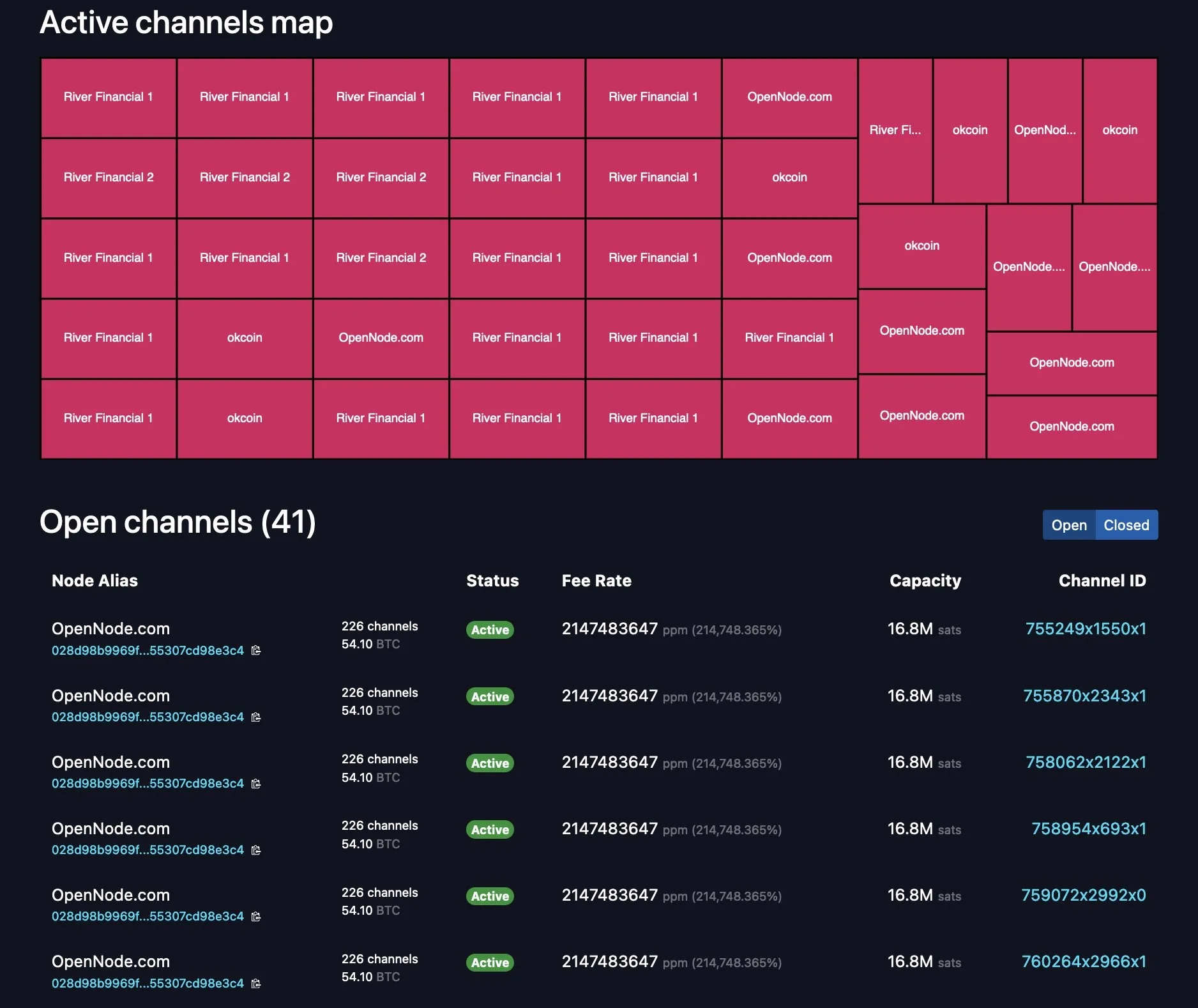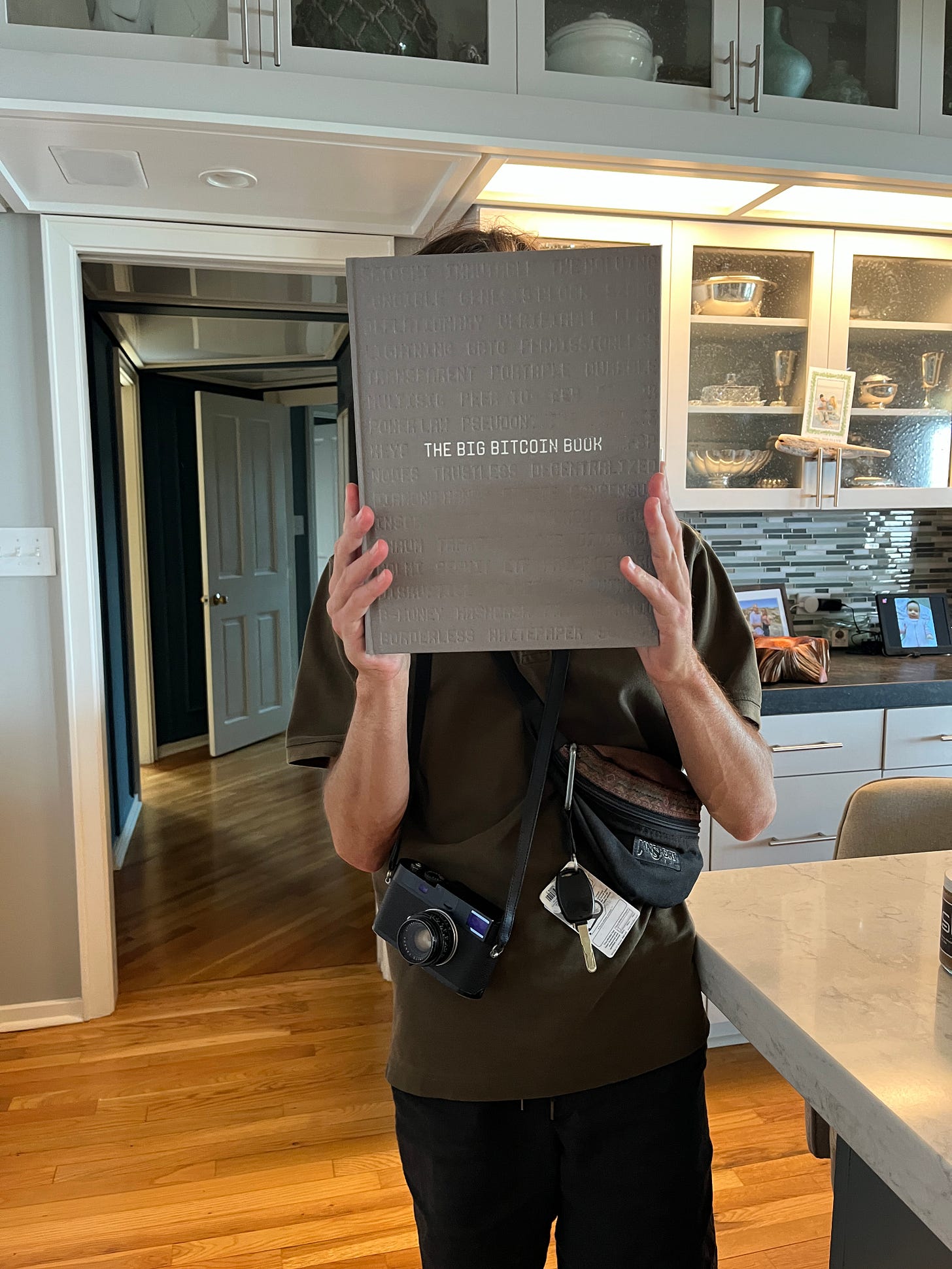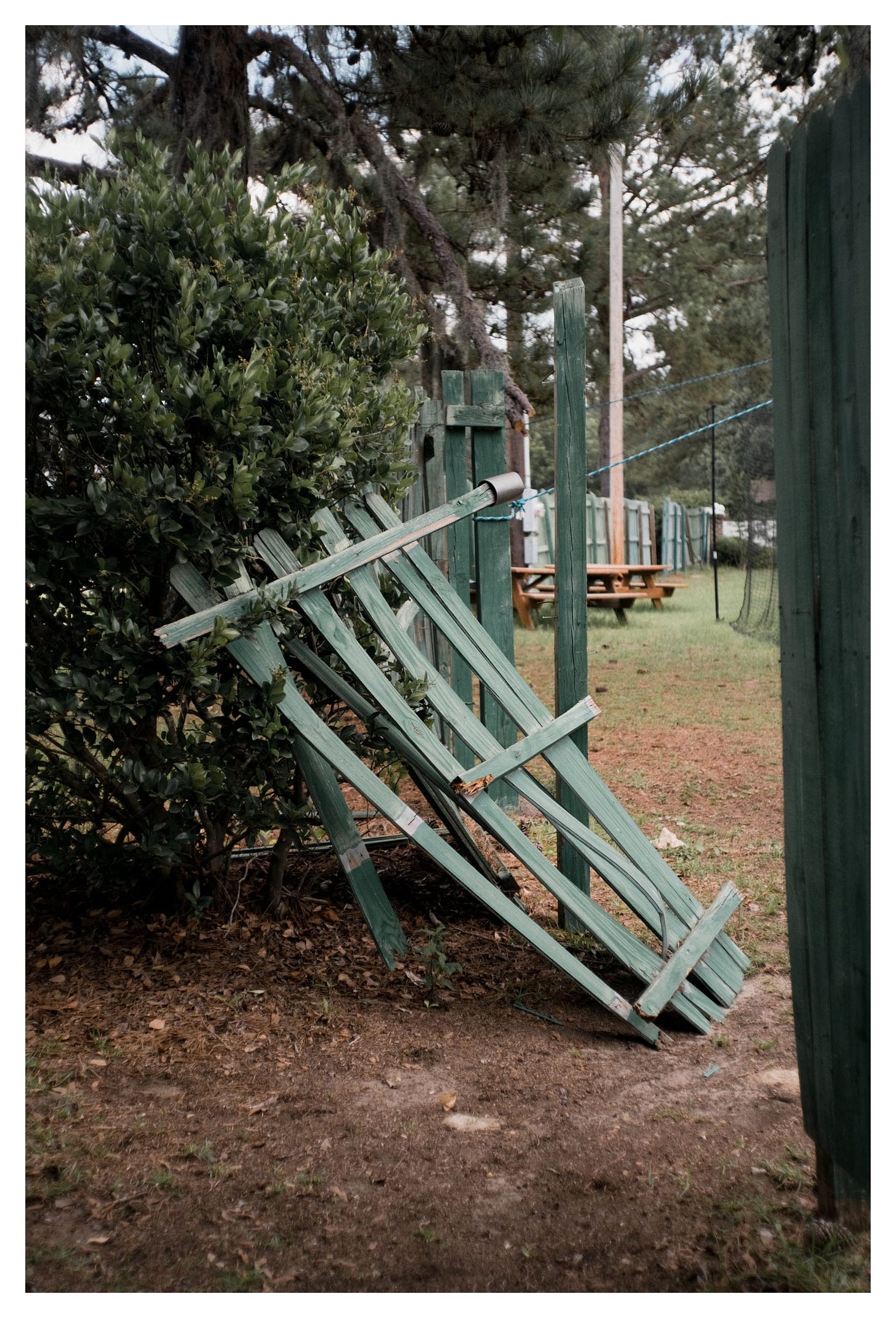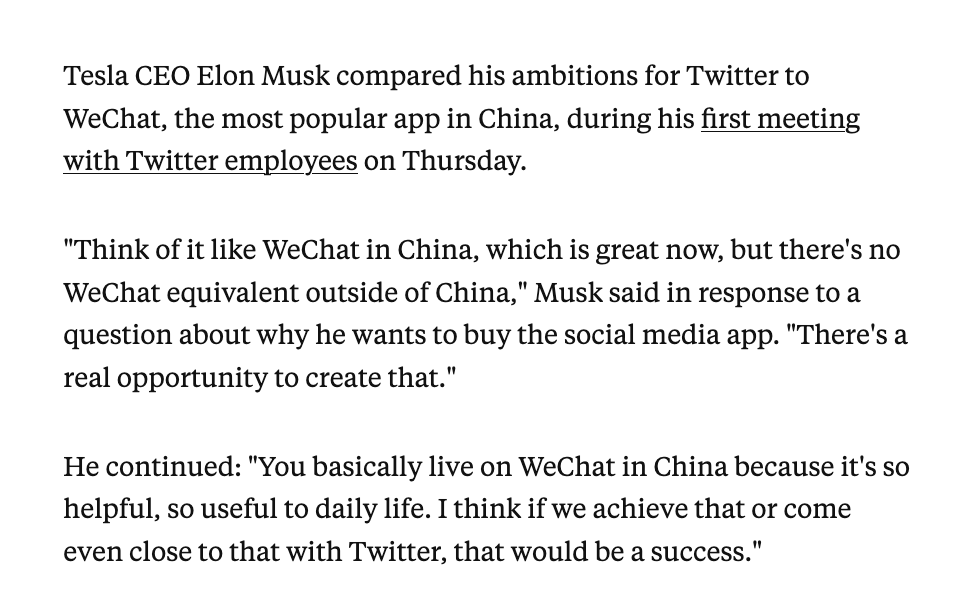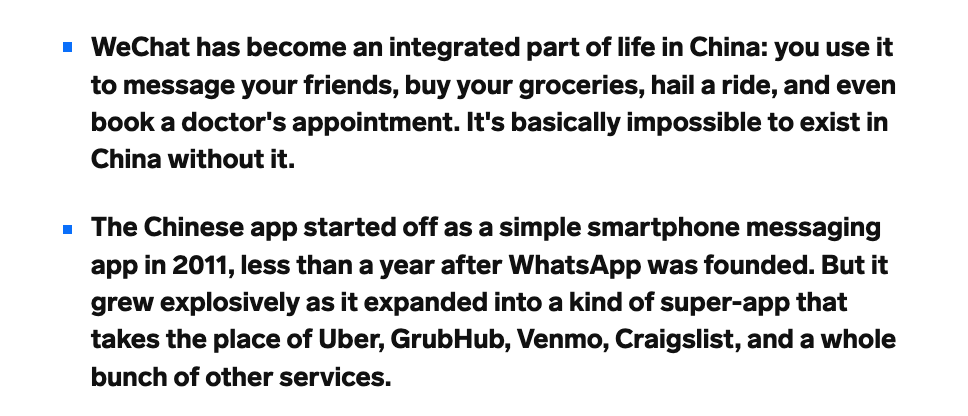-
 @ 8d34bd24:414be32b
2025-06-01 04:04:10
@ 8d34bd24:414be32b
2025-06-01 04:04:10Many people today believe that the church has replaced Israel and that the promises given to Israel now apply to the church. When we say this, we are calling God a liar.
Can you imagine a groom promising to love and cherish his wife until death do they part and then saying, “I’m keeping my promise by loving and cherishing a new and different wife.”? We would never consider that man to be honest, faithful, and good. If God promised to protect and guide Israel, to have a descendant of David on the throne, and to give them the land, we can only trust Him if He fulfills these promises.
When we say the church has replaced Israel, we make two mistakes. We raise up the church beyond what is right and we put down Israel. We need to be careful because God promised Abraham:
“And I will bless those who bless you, And the one who curses you I will curse. And in you all the families of the earth will be blessed.” (Genesis 12:3)
and He reiterated this promise to Israel during the Exodus:
“He couches, he lies down as a lion,\ And as a lion, who dares rouse him?\ Blessed is everyone who blesses you [Israel],\ And cursed is everyone who curses you [Israel].” (Numbers 24:9) {clarification mine}
When we curse Israel or the Jews, we will be under God’s curse. Now this does not mean that every criticism of a particular action by Israel’s leaders brings a curse. Today’s nation of Israel is led by fallible men like every other nation, so there are mistakes made or corruption by particular leaders. It does, however, mean that generalizations against Israel and the Jews are wrong and of Satan.
Paul specifically warned the church against thinking they had replaced Israel in God’s blessing and love.
If the first piece of dough is holy, the lump is also; and if the root is holy, the branches are too.
But if some of the branches were broken off, and you, being a wild olive, were grafted in among them and became partaker with them of the rich root of the olive tree, do not be arrogant toward the branches; but if you are arrogant, remember that it is not you who supports the root, but the root supports you. You will say then, “Branches were broken off so that I might be grafted in.” Quite right, they were broken off for their unbelief, but you stand by your faith. Do not be conceited, but fear; for if God did not spare the natural branches, He will not spare you, either. Behold then the kindness and severity of God; to those who fell, severity, but to you, God’s kindness, if you continue in His kindness; otherwise you also will be cut off. And they also, if they do not continue in their unbelief, will be grafted in, for God is able to graft them in again. For if you were cut off from what is by nature a wild olive tree, and were grafted contrary to nature into a cultivated olive tree, how much more will these who are the natural branches be grafted into their own olive tree?
For I do not want you, brethren, to be uninformed of this mystery—so that you will not be wise in your own estimation—that a partial hardening has happened to Israel until the fullness of the Gentiles has come in; and so all Israel will be saved; just as it is written,
“The Deliverer will come from Zion,\ He will remove ungodliness from Jacob.”\ “This is My covenant with them,\ When I take away their sins.” *From the standpoint of the gospel they are enemies for your sake, but from the standpoint of God’s choice they are beloved for the sake of the fathers*; for the gifts and the calling of God are irrevocable**. For just as you once were disobedient to God, but now have been shown mercy because of their disobedience, so these also now have been disobedient, that because of the mercy shown to you they also may now be shown mercy. For God has shut up all in disobedience so that He may show mercy to all. (Romans 11:16-32) {emphasis mine}
Paul warns that although the Jews were pruned away due to rejection of Him and gentiles were grafted into Him by faith, if we reject God’s word, we can be pruned away and if the Jews return to Jesus, they can be grafted back in. He predicts that the Jews will return. “…that a partial hardening has happened to Israel until the fullness of the Gentiles has come in; and so all Israel will be saved.” He also says regarding Israel that “the gifts and the calling of God are irrevocable.” Yes, Israel rejected Jesus and was punished for doing so, but they will be called back to God and trust in their Messiah, Jesus. In the end, all the promises of God to Abraham, Jacob, David, and others regarding Israel, will be brought to complete fulfillment.
Both the Old and New Testaments talk about Israel being punished for rejecting God and their Messiah, but that, after the time of the Gentiles, they will be called back to Him.
and they will fall by the edge of the sword, and will be led captive into all the nations; and Jerusalem will be trampled under foot by the Gentiles until the times of the Gentiles are fulfilled. (Luke 21:24)
After Daniel had been in prayer and repentance for the sins of Israel, the angel Gabriel came with this prophecy about Israel.
“Seventy weeks have been decreed for your people and your holy city, to finish the transgression, to make an end of sin, to make atonement for iniquity, to bring in everlasting righteousness, to seal up vision and prophecy and to anoint the most holy place. So you are to know and discern that from the issuing of a decree to restore and rebuild Jerusalem until Messiah the Prince there will be seven weeks and sixty-two weeks; it will be built again, with plaza and moat, even in times of distress. Then after the sixty-two weeks the Messiah will be cut off and have nothing, and the people of the prince who is to come will destroy the city and the sanctuary. And its end will come with a flood; even to the end there will be war; desolations are determined. (Daniel 9:24-26)
In this prophecy, the prediction of 69 weeks (literally sevens, but meaning groups of 7 years) from the decree to rebuild Jerusalem (by Artaxerxes) to the Messiah was fulfilled to the day when Jesus rode into Jerusalem on a donkey on Palm Sunday.
I always thought it strange that the prophecy predicted 70 sevens and that there was the first 69 sevens (483 years), then \~2,000 years where nothing happens, and then comes the final seven — the Great Tribulation. It didn’t make sense until I realized, the 70 sevens referred to the years of Israel. The time of the gentiles intervenes between the 69th and 70th sevens. This delay happened due to Israel rejecting their Messiah.
When He approached Jerusalem, He saw the city and wept over it, saying, “If you had known in this day, even you, the things which make for peace! But now they have been hidden from your eyes. For the days will come upon you when your enemies will throw up a barricade against you, and surround you and hem you in on every side, and they will level you to the ground and your children within you, and they will not leave in you one stone upon another, because you did not recognize the time of your visitation.” (Luke 19:41-44)
We are now in the time of the Gentiles, the church age, the intermission in the story of Israel. After the church is raptured, the story will return to Israel. The Jews (at least many of them) will finally accept their Messiah. They will suffer through the Tribulation while witnessing to the world and then God will finally fully fulfill His promises to Israel through the Millennial kingdom.
Alas! for that day is great,\ There is none like it;\ And it is the time of Jacob’s distress,\ But he will be saved from it.
‘It shall come about on that day,’ declares the Lord of hosts, ‘that I will break his yoke from off their neck and will tear off their bonds; and strangers will no longer make them their slaves. But they shall serve the Lord their God and David their king, whom I will raise up for them.
Fear not, O Jacob My servant,’ declares the Lord,\ ‘And do not be dismayed, O Israel;\ For behold, I will save you from afar\ And your offspring from the land of their captivity.\ And Jacob will return and will be quiet and at ease,\ And no one will make him afraid.\ For I am with you,’ declares the Lord, ‘to save you;\ For I will destroy completely all the nations where I have scattered you,\ Only I will not destroy you completely.\ But I will chasten you justly\ And will by no means leave you unpunished.’ \ (Jeremiah 30:7-11) {emphasis mine}
Jacob’s distress is the final Tribulation. The 144,000 Jewish witnesses will be saved through the whole Tribulation. Others may become saved and die a martyrs death, but they will then be brought into the millennial kingdom where the Messiah will fill the throne of David and Israel will reach from the River to the Sea.
The Jews have already been saved “from afar, and your offspring from the land of their captivity” with the recreation of Israel in 1947 and the continual return of Jews to their homeland.
God is working to fulfill His promises to Israel and His work is nearly complete.
“O Jacob My servant, do not fear,” declares the Lord, “For I am with you. For I will make a full end of all the nations where I have driven you, Yet I will not make a full end of you; But I will correct you properly And by no means leave you unpunished.” (Jeremiah 46:28)
God promises a “full end of all the nations where I have driven you.” Those nations and people who try to destroy Israel will be destroyed. As Christians we should love what God loves, and despite Israel’s repeated betrayals, God still loves Israel, so we should, too.
May the God of heaven give us a right view of Israel. May we see them as God sees them. May God use us to share the Gospel in such a way as to lead to a harvest of Jews for the Kingdom of God. To God be the glory!
Trust Jesus
-
 @ eb0157af:77ab6c55
2025-06-01 04:01:08
@ eb0157af:77ab6c55
2025-06-01 04:01:08The revelation by Miles Suter, Product Lead at Block, at the Bitcoin Conference 2025 confirms the economic potential of LN for professional operators, but the yield comes mainly from routing fees
During the Bitcoin 2025 conference in Las Vegas, Miles Suter, Bitcoin Product Lead at Block Inc., revealed data that could change the economic perception of the Lightning Network: the company’s routing node is generating annual returns of 9.7% on invested liquidity.

During his presentation, Suter confirmed what many experts suspected but no one had ever quantified precisely: Lightning payment routing can be not only technically effective, but also economically profitable on a large scale. With an estimated public capacity of 184 BTC (approximately $20 million), Block is demonstrating that Lightning infrastructure can generate significant returns through the use of bitcoin as a payment method.
Non-custodial yield, with a doubt
Lightning routing represents what experts define as “true non-custodial yield” – returns generated from the pure economic utility of bitcoin as a means of payment, without having to entrust one’s funds to third parties.
“We are earning almost 10% returns on Bitcoin by effectively routing real payments on the Lightning network,” Suter declared.
Riccardo Masutti — researcher and founder of Baited — has, however, observed that the double-digit yields advertised by Block are closely tied to an exceptionally aggressive fee structure that markedly deviates from the median parameters of the Lightning Network. In particular, the Cash App nodes apply a fee rate of 2,147,483,647 ppm, resulting in fees up to 2 million times higher than the average cost of standard channel transactions. Block’s own node also enforces significant fees: to route a million satoshis, it requires 1,053 sats in outgoing fees and 2,955 sats in incoming fees, compared to a network median base fee of approximately 0.999839 sat and a median fee rate of 0.000063 sat/sat. This discrepancy suggests that the yield is generated more by a surcharge imposed on intermediated payments than by any real efficiency in liquidity allocation.
In 2024 Cash App recorded an increase in Lightning payment volume equal to 7 times that of the previous year: one in four outgoing payments now occurs via LN, Suter stated.
According to Block’s Product Lead “if Bitcoin becomes only digital gold, we have failed the mission. If we don’t use bitcoin for payments, we risk losing one of the most important promises permissionless money. If we don’t preserve the qualities of cash in the digital world, human liberty is seriously in trouble.”
The company aims to incentivize practical and daily use of bitcoin, seeing Lightning payments as the key to realizing Satoshi Nakamoto’s original vision of a “peer-to-peer electronic payment system.”
The post According to Block, routing on Lightning yields 10% annually: but the yield comes from fees appeared first on Atlas21.
-
 @ 9ca447d2:fbf5a36d
2025-06-01 04:00:47
@ 9ca447d2:fbf5a36d
2025-06-01 04:00:47The third annual Bitcoin FilmFest (aka BFF25) proved once again that sovereign minds and decentralized culture thrive together.
For four electrifying days in Poland’s capital, the festival’s rallying call—’Fix the money, fix the culture‘—wasn’t just a slogan but a living, breathing movement.
From May 22-25, 2025, Warsaw buzzed with cinematic innovation, Bitcoin philosophy, and artistic vibe marking this gathering as truly incomparable.
Rebel Tribe with Unfiltered Creativity
With 200+ attendees from 20+ countries – primarily Poland, Czech Republic, the UK and Germany (~70% combined), plus representation from Spain, Italy, USA, Turkey and 15+ other nations including Thailand, Israel, Dubai and Latin America—BFF25 became a true global hub of freedom-fighters at heart.
The European Pizza Day opener (May 22), celebrating Bitcoin’s first real-world transaction, saw rainy evening weather that couldn’t dampen the energy.
With concerts by Roger9000 and ABBE plus DJ sets from MadMunky, 2140 collective w/Airklipz and G.O.L.D., all early arrivals had a memorable start.
Dual Focus on Film and Bitcoin Culture
-
Seven film workshops and seven hands-on sessions running parallel across Friday and Saturday at Amondo Cinema Club. Film: Martin Piga, Oswald Horowitz, Psyfer, Juan Pablo Mejía, Kristina Weiserova, Rare Passenger, Noa Gruman & Lahav Levi (Scardust). Bitcoin/Nostr: Aleks Svetski, Ioni Appelberg, Flash, CryptoSteel, Bitrefill, Polish Bitcoin Association, Bitvocation.
-
The Community Stage (Friday to Sunday afternoon) gave important space for both projects and individuals discussing their work and passions.
Everything from music, art, fiction, Nostr, personal sovereignty to Polish-language debates on Bitcoin’s state and its possible future. -
Onscreen, 9 cinematic blocks from Friday to Sunday featured titles like UNBAKABLE, REVOLUCIÓN BITCOIN, HOTEL BITCOIN, PLANDEMIC: THE MUSICAL, plus shorts on new media (AI/experimental cinema), parallel communities (outcast cinema), and newly released pilots.
-
Cinematic shark-tank with a €3,000 bounty: 8 contestants
- Martin Piga: “PARALLEL SPACES”
- Kristina Weiserova: “PUZZLE”
- Aaron Koenig : “SATOSHI’S LAST WILL”
- Philip Charter: “21 FUTURES”
- Jenna Reid: “WHERE DO WE GO FROM HERE?”
- Mr Black: “A LODGING OF WAYFARING MEN”
- Oswald Horowitz: “THE LEGEND OF LANDI”
The event ended with Jenna winning.
-
Official Gala: Golden Rabbits 2025 crowned:
- HOTEL BITCOIN by Manuel Sanabria & Carlos “Pocho” Villaverde (Best Story)
- SATOSHI: THE CREATION OF BITCOIN by Arthur Machado (Best Short)
- REVOLUCIÓN BITCOIN by Juan Pablo Mejía (Audience Choice)
- NO MORE INFLATION by Maiku Tsukai’s aka Bitcoin Shooter (Best Film)
Nights Charged with Music and Unscripted Surprise
The festival’s legendary afterparties kept the energy high—Friday’s underground gathering at Morph Club (ex-Barbazaar) featured Aaron Koening’s live concert and 2140 DJs (Akme + Andy Princz).
The weekend’s unforgettable moment came when Noa Gruman took the stage with “MY HEAVEN” (Scardust original) and “40HPW” — her powerful tribute to Bitcoin podcasts and Bugle.News.
Lightning-Powered Innovation, and Extras
-
Lightning in Action: Flash enabled instant Bitcoin payments across both main venues (Amondo + Samo Centrum, merch stations, and online shop)
-
IndeeHub Backstage Pass: Attendees unlocked exclusive access to Lightning-powered VOD featuring selected films from BFF23-25
-
BFF TV: Kiki (El Salvador) broadcasting live interviews, event clips, and trailers. Day One, and Day Two to rewatch online.
-
Comedy Strike: Robert Le Ricain’s Gala stand-up proved Bitcoiners pack brains and humor—in equal measure.
A Community-Driven Cultural Experience
Bitcoin FilmFest wasn’t just an event—it was proof that culture shifts when money gets fixed. Mark your calendars for June 2026 and the next edition. More info and tickets going on sale soon.
-
-
 @ cae03c48:2a7d6671
2025-06-01 04:00:27
@ cae03c48:2a7d6671
2025-06-01 04:00:27Bitcoin Magazine
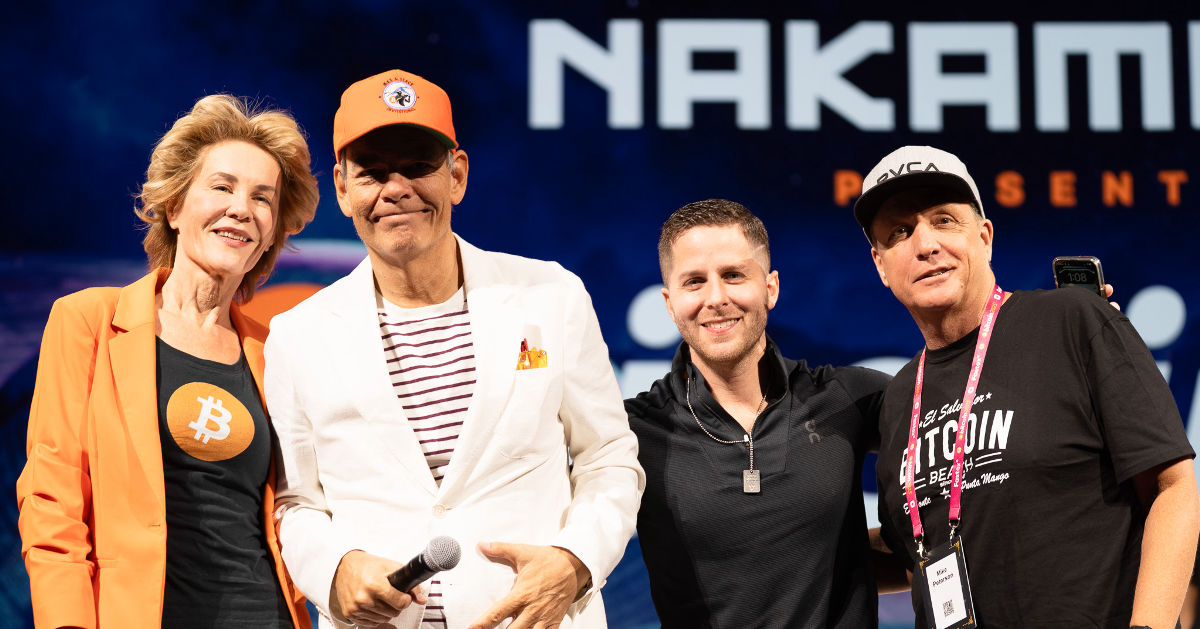
Panama City Mayor Mizrachi: “Bitcoin Is Not Just Safe, It’s Prosperous”At the 2025 Bitcoin Conference in Las Vegas, the Director of Bitcoin Beach Mike Peterson, the Presidential Advisors of Building Bitcoin Country El Salvador Max & Stacy and the Mayor City of Panama Mayer Mizrachi discussed Bitcoins future in Panama.
At the beginning of the panel, Is Panama Next? El Salvador Leading The Region For Bitcoin Adoption, Mayor Mizrachi started by mentioning, “We accept Bitcoin. The city gets paid in Bitcoin, but it receives in dollars through an intermediary processing, payments processor. Bitcoin is not just safe. It’s prosperous.”
Max commented about the scammers in crypto and how El Salvador is managing it.
“We did a couple of things early on, one was to create The Bitcoin Office which will be directly reporting to the President, and then also we passed a law which will say bitcoin is money and everything else is an unregistered security,” said Max.
Mike Peterson stated, “the access of Bitcoin in Central America to do battle against the globalists that have always looked at the regionist back yard. This is intolerable and this is going to change right now.” After Mizrachi commented, “Imagine yourself in an economic block powered by El Salvador, supported by Panama and the rest will come.”
Stacy reminded everybody about El Salvador’s School system.
“El Salvador is the first country in the world to have a comprehensive public school financial literacy education program from 7 years old,” mentioned Stacy. “These are little kids, learning financial literacy.”
Max ended the panel by saying, “the US game theory right? Because the US wants to buy a lot of Bitcoin, so if Panama wants to buy a lot of bitcoin then it helps everybody in the US. This is the beautiful expression of game theory perfectly aligned in the protocol that is changing the world that we live in. And on the street level what bitcoin does to the population is to go from a spending mentality to a saving mentality.”
You can watch the full panel discussion and the rest of the Bitcoin 2025 Conference Day 3 below:
This post Panama City Mayor Mizrachi: “Bitcoin Is Not Just Safe, It’s Prosperous” first appeared on Bitcoin Magazine and is written by Oscar Zarraga Perez.
-
 @ cae03c48:2a7d6671
2025-06-01 04:00:26
@ cae03c48:2a7d6671
2025-06-01 04:00:26Bitcoin Magazine
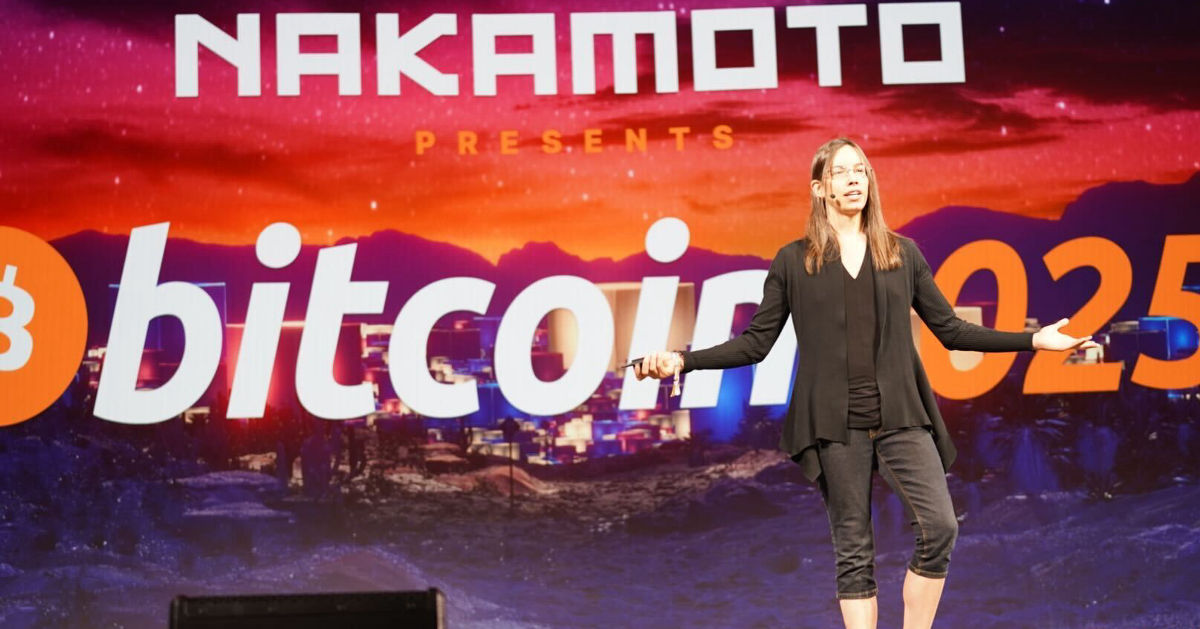
The Debt Train Has No Brakes: Lyn Alden Makes the Case for BTC at Bitcoin 2025“Nothing stops this train,” Lyn Alden initially stated at Bitcoin 2025, walking the audience through a data-rich presentation that made one thing clear: the U.S. fiscal system is out of control—and Bitcoin is more necessary than ever.
Her first chart, sourced from the Federal Reserve’s FRED database, displayed a stark decoupling: the unemployment rate is down, yet the fiscal deficit has surged past 7% of GDP. “This started around 2017, went into overdrive during the pandemic, and hasn’t corrected,” Alden said. “That’s not normal. We’re in a new era.”
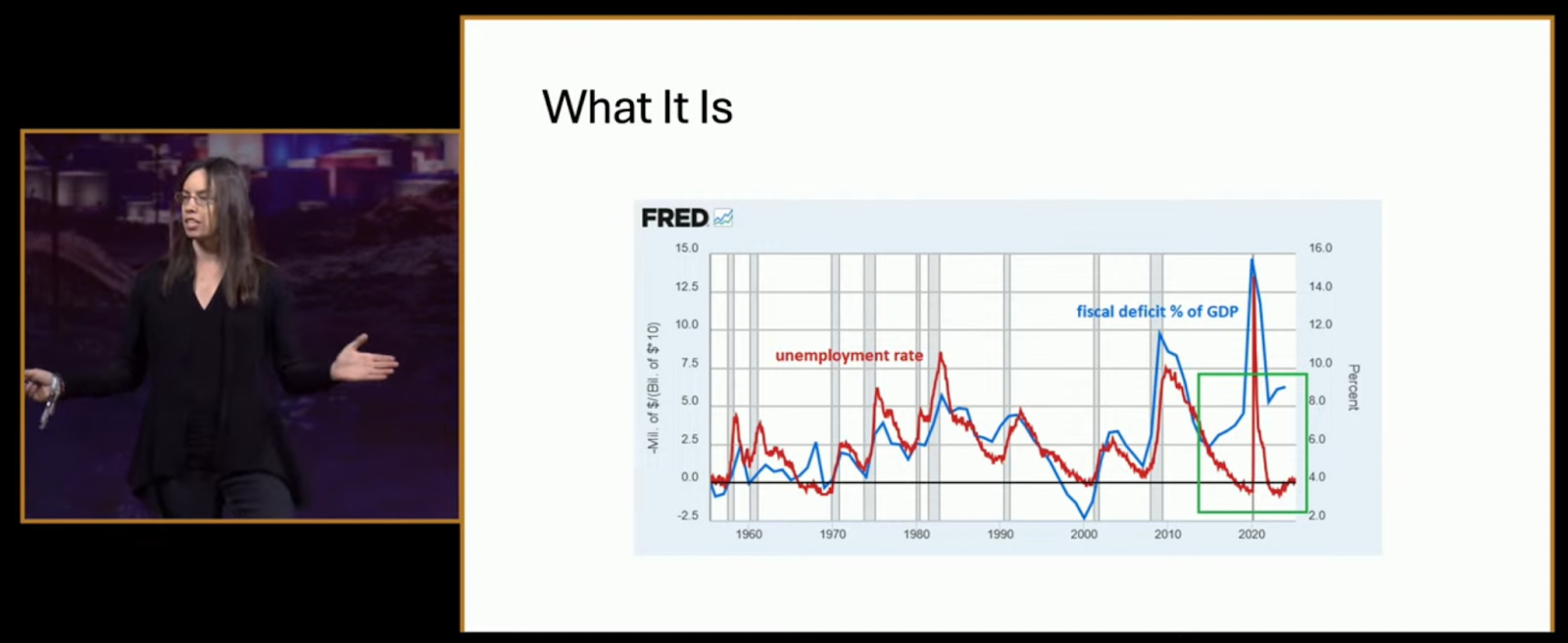
She didn’t mince words. “Nothing stops this train because there are no brakes attached to it anymore. The brakes are heavily impaired.
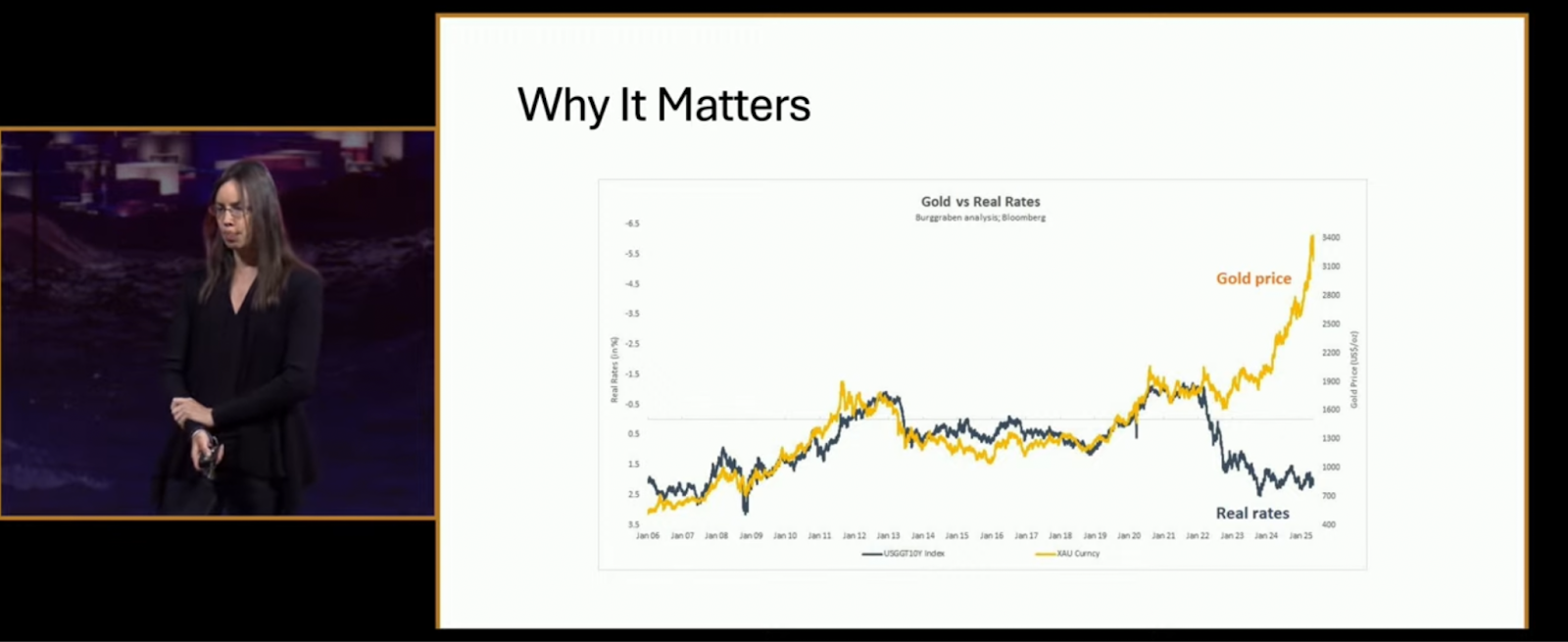
Why should Bitcoiners care? Because, as Alden explained, “it matters for asset prices—especially anything scarce.” She displayed a gold vs. real rates chart that showed gold soaring as real interest rates plunged. “Five years ago, most would have said Bitcoin couldn’t thrive in a high-rate environment. Yet here we are—Bitcoin over $100K, gold at new highs, and banks breaking under pressure.”
Next came what she called “The Turning Point”—a side-by-side showing how public debt growth overtook private sector debt post-2008, flipping a decades-long norm. “This is inflationary, persistent, and it means the Fed can’t slow things down anymore.”
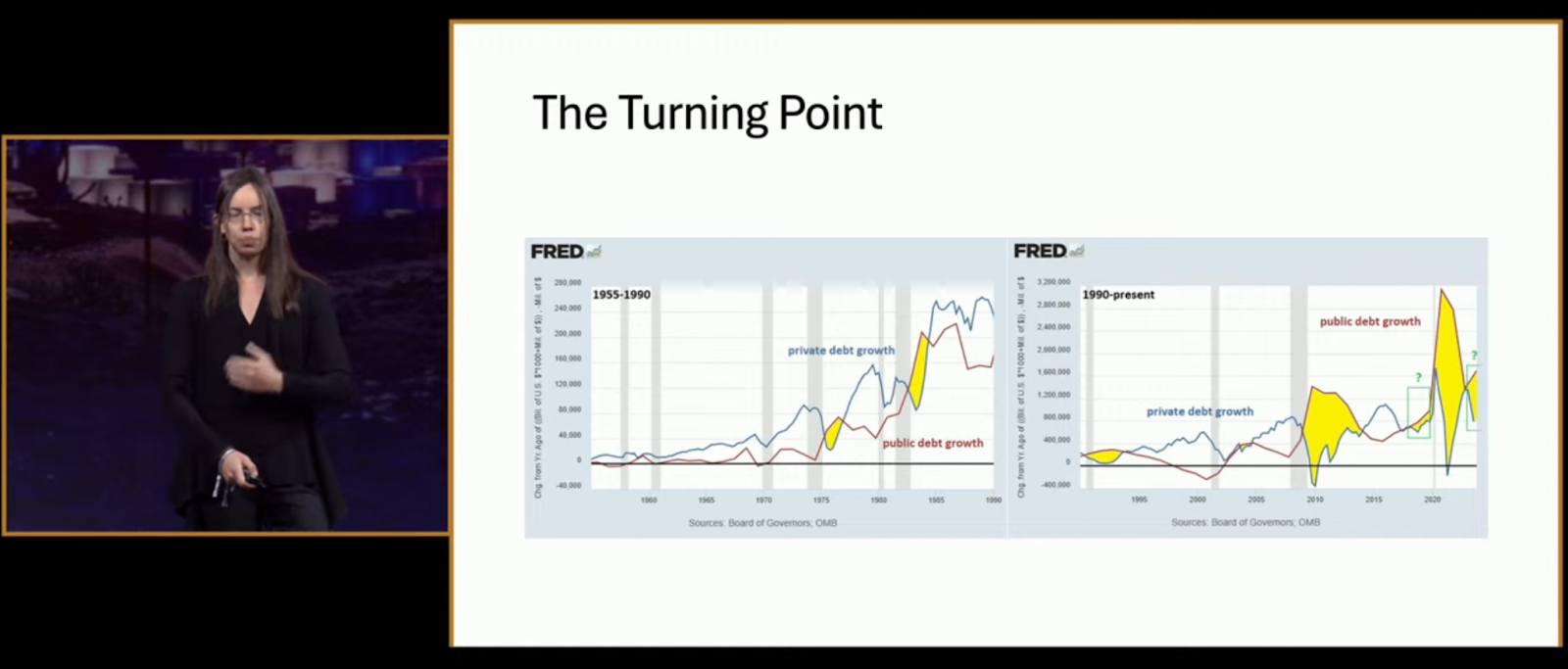
Another chart revealed why rising interest rates are now accelerating the deficit. “They’ve lost their brakes. Raising rates just makes the federal interest bill explode faster than it slows bank lending.”
Alden called it a ponzi: “The system is built on constant growth. Like a shark, it dies if it stops swimming.”
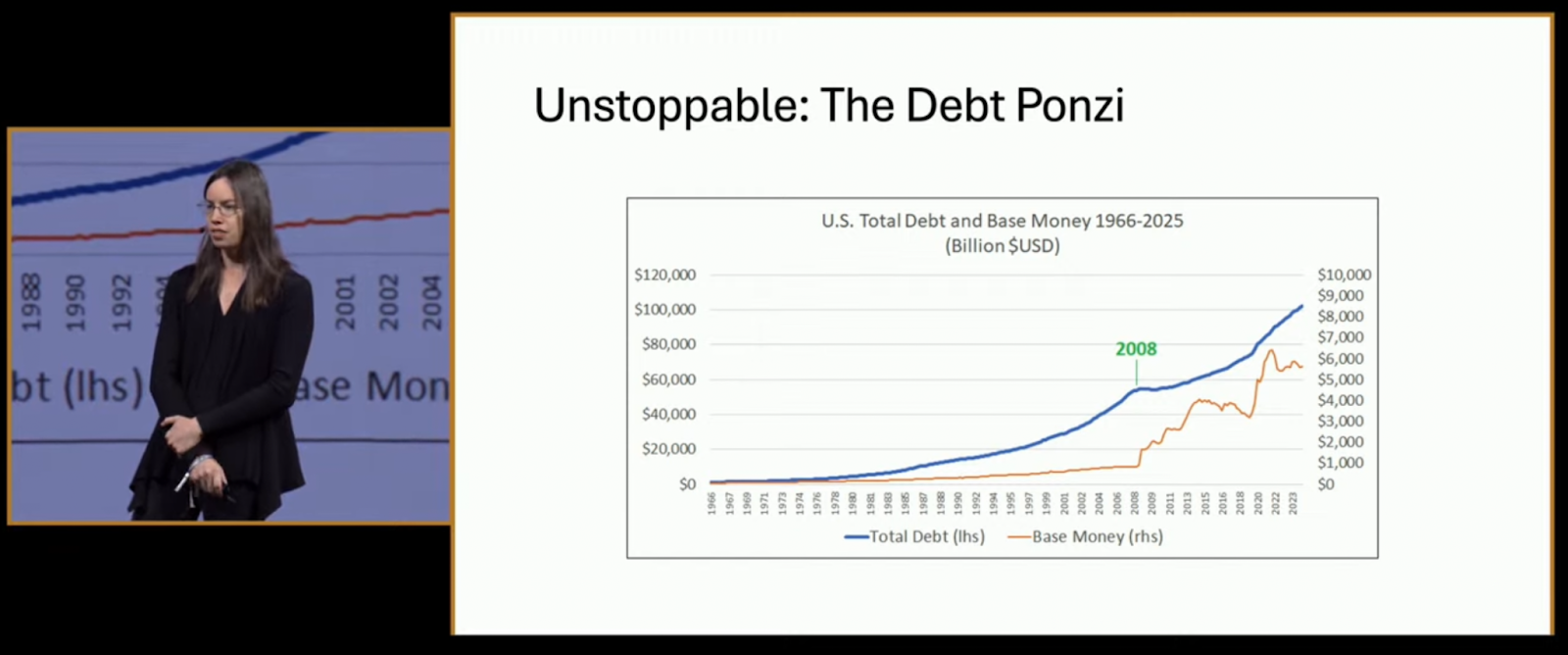
Her slide showed a relentless rise in total debt versus base money—except for a jolt in 2008, and again after 2020. “This isn’t going backward. Ever.”
So why Bitcoin? “Because it’s the opposite. Scarce, decentralized, and mathematically capped,” Alden concluded. “There are two reasons nothing stops this train: math and human nature. Bitcoin is the mirror of this system—and the best protection from it.”
You can watch the full panel discussion and the rest of the Bitcoin 2025 Conference Day 3 below:
This post The Debt Train Has No Brakes: Lyn Alden Makes the Case for BTC at Bitcoin 2025 first appeared on Bitcoin Magazine and is written by Jenna Montgomery.
-
 @ 84b0c46a:417782f5
2025-05-31 09:11:23
@ 84b0c46a:417782f5
2025-05-31 09:11:23Simple Long Form Content Editor (NIP-23)
機能
-
nostr:npub1sjcvg64knxkrt6ev52rywzu9uzqakgy8ehhk8yezxmpewsthst6sw3jqcw や、 nostr:nevent1qvzqqqqqqypzq4jsz7zew5j7jr4pdfxh483nwq9vyw9ph6wm706sjwrzj2we58nqqyxhwumn8ghj77tpvf6jumt9qys8wumn8ghj7un9d3shjtt2wqhxummnw3ezuamfwfjkgmn9wshx5uqpr4mhxue69uhhyetvv9ujumn0wd68ytnhd9ex2erwv46zu6nsqyxhwumn8ghj7mn0wvhxcmmvqqsgcn99jyn5tevxz5zxsrkd7h0sx8fwnqztula423xh83j9wau7cms3vg9c7 のようにnostr:要素を挿入できる (メニューのNアイコンから挿入またはnostr:note~~のように手動で入力)
-
:monoice:のようにカスタム絵文字を挿入できる(メニューの🙂アイコンから)
:monopaca_kao:
:kubipaca_karada:
- 新規記事作成と、既存記事の修正ができる
やることやったこと
-
[x] nostr:を投稿するときにtagにいれる
-
[x] 画像をアップロードできるようにする(NIP-96)
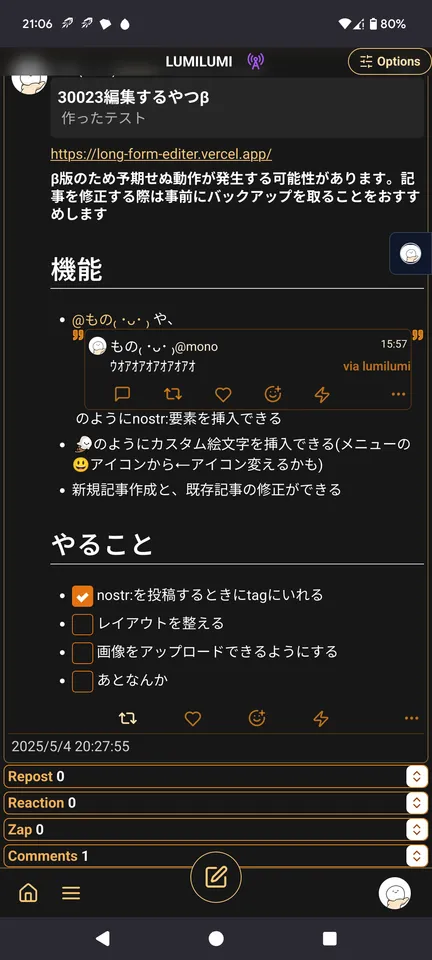 できる
できる - [x] 投稿しましたログとかをトースト的なやつでだすようにする
- [ ] レイアウトを整える
- [ ] あとなんか
test
nostr:naddr1qvzqqqr4gupzpp9sc34tdxdvxh4jeg5xgu9ctcypmvsg0n00vwfjydkrjaqh0qh4qqxnzde58q6njvpkxqersv3ejxw9x9
-
-
 @ 58537364:705b4b85
2025-06-01 01:05:37
@ 58537364:705b4b85
2025-06-01 01:05:37โลกเป็นอย่างไร เพราะใจเราเป็นอย่างนั้น
พระอาจารย์ไพศาล วิสาโล วัดป่าสุคะโต แสดงธรรม เย็นวันที่ ๓๑ กรกฎาคม ๒๕๖๕

คนเราทุกคนมีตา หู จมูก ลิ้น กาย แล้วก็ใจ ตา หู จมูก ลิ้น กาย มีไว้เพื่อรับรู้โลกภายนอก ตารับรู้รูป หูรับรู้เสียง จมูกรับรู้กลิ่น ลิ้นรับรู้รส และกายก็รับรู้สัมผัสที่เรียกว่าโผฏฐัพพะ และไม่ว่าจะรับรู้โลกภายนอกอะไร มันก็ส่งมาที่ใจ ใจทำหน้าที่คิด ทำหน้าที่รู้สึก
เราก็คงจะสังเกตได้ว่า เรารับรู้อะไร ใจก็มักจะเป็นอย่างนั้น เช่น ถ้าเกิดเราเห็นภาพคนกำลังอดอยากหิวโหย ก็เกิดความรู้สึกเศร้า สงสารในใจของเรา ถ้าเห็นภาพอุบัติเหตุรถยนต์ ก็เกิดความเสียวสยอง หรือว่าหวาดวิตกในใจ ถ้าเห็นเด็กกำลังร้องไห้ ก็เกิดความรู้สึกเศร้าในใจของเรา แต่ถ้าเกิดเห็นภาพคนกำลังสนุกสนานรื่นเริง มันก็มีความยินดีเกิดขึ้นในใจ
รับรู้อะไรก็มีผลต่อใจของเรา รับรู้สิ่งที่เป็นลบ ใจก็พลอยรู้สึกลบไปด้วย รับรู้สิ่งที่เป็นบวก ใจก็พลอยเป็นบวกไปด้วย เพราะฉะนั้นการรับรู้อะไร ก็เป็นสิ่งที่เราต้องใส่ใจ
ถ้าเราอยากจะให้ใจเราสงบ ใจเราเป็นสุข ไม่ถูกแผดเผาด้วยความโกรธ หรือว่าไม่ถูกกดกดดันด้วยความเศร้า หรือว่าถูกกระตุ้นเร้าด้วยความโลภ ความอยาก อันนี้ก็โยงไปถึงว่า เราเลือกที่จะอยู่ไหนด้วย ถ้าเราเลือกที่จะอยู่ในที่ที่สงบสงัด ใจก็พลอยสงบ หรือว่าสามารถจะเย็นได้ง่าย
เพราะฉะนั้นธรรมะข้อหนึ่งในโอวาทปาฏิโมกข์คือ พึงนอนและนั่งในที่สงัด ในที่ที่สงัดที่ที่เป็นรมณีย์ มันก็มีส่วนน้อมใจให้สงบไปด้วย
รวมทั้งการรู้จักใช้หู ใช้ตา ใช้จมูกให้เป็น ต้องรู้จักเลือกรับรู้สิ่งที่มันจะเกื้อกูล ต่อการสร้างกุศลธรรมขึ้นมาในใจ อย่างไรก็ตามเท่านั้นยังไม่พอ เพราะว่าการรับรู้ของเรา บ่อยครั้งเราไม่ได้รับรู้สิ่งที่เกิดขึ้นข้างหน้าเราอย่างที่มันเป็นจริง
บ่อยครั้งเราก็มีการตีความหรือปรุงแต่ง เราไม่ได้เห็นอย่างที่รูปปรากฏ เราไม่ได้ได้ยินอย่างที่เสียงมากระทบหูเรา เพราะว่ามีการตีความ หรือปรุงแต่งซ้อน แบบเรียกว่าสนิทแนบแน่นเลย อย่างเช่น เห็นคนกระซิบกระซาบต่อหน้าเรา เราก็อาจจะตีความไปว่า เขากำลังพูดถึงเรา หรืออาจจะถึงขั้นนินทาเรา แต่ความจริงอาจจะไม่ได้เป็นอย่างนั้น
หรือว่ามีคนบางคนมองหน้าเรา จ้องเรา เราก็อาจจะตีความว่า เขากำลังหาเรื่องเราก็ได้ หรือเขากำลังไม่พอใจเรา แต่ว่าความจริงอาจจะไม่ได้เป็นอย่างนั้นก็ได้ แต่ว่าเราตีความไปแล้ว แล้วส่วนใหญ่เราก็จะไม่ได้เห็น ไม่ได้รับรู้สด ๆ หรือว่าอย่างที่มันเป็น
แต่ว่ามันมีการตีความ ตีความในทางบวกก็มี ตีความในทางลบก็มี ซึ่งตรงนี้บ่อยครั้งก็สร้างปัญหา หรือสร้างความทุกข์ให้กับเรา เพราะการที่เราไม่ได้เห็นอะไรอย่างที่มันเป็นจริงๆ มันมีการตีความในใจของเราหรือด้วยใจของเรา และเราก็เผลอไปคิดว่า สิ่งที่จิตตีความ มันคือความจริง แต่บ่อยครั้งมันก็เป็นแค่การปรุงแต่ง หรือความคิดของเราเอง
มีพระทิเบตท่านหนึ่งเล่าว่า มีคราวหนึ่งจะเดินทางขึ้นเครื่องบิน ที่สนามบินมีการตรวจเอกซเรย์ข้าวของ โทรศัพท์ คอมพิวเตอร์ ระหว่างที่กำลังรอข้าวของของท่านที่กำลังผ่านการเอกซเรย์ ท่านก็เหลือบไปมองเห็นด่านรักษาความปลอดภัยอีกด่านหนึ่ง ที่เป็นด่านสุดท้าย
แล้วก็สังเกตว่ามีเจ้าหน้าที่รักษาความปลอดภัยคนหนึ่ง รูปร่างสูงใหญ่ มีหนวดเฟิ้มเลย จ้องมองมาที่ท่าน จ้องแบบเขม็งเลย ท่านเหลียวไปมองหลายครั้งก็เห็นว่าเขายังจ้องไม่เลิก ก็รู้สึกไม่ค่อยสู้ดีแล้ว เอ๊ะ หรือว่าเจ้าหน้าที่คนนี้กำลังสงสัยอะไรเราหรือเปล่า ถึงจ้องมองแบบนั้น แล้วยิ่งเห็นเจ้าหน้าที่คนนั้นจ้องมองมากเท่าไหร่ โดยที่ไม่มีรอยยิ้มเลยนะ ท่านก็เลยนึกในใจว่า เขาคงจะสงสัยเรา
ยิ่งมองเจ้าหน้าที่คนนั้น ก็ยิ่งรู้สึกว่าเจ้าหน้าที่คนนี้ หน้าเหี้ยม แล้วก็ดูหยาบกระด้าง หน้าตารูปร่างเหมือนมาเฟียเลย จู่ ๆ เจ้าหน้าที่คนนั้นก็วิทยุ พระทิเบตก็คิดสงสัยว่าคงต้องมีอะไรแน่ แล้วก็จริงด้วย มีเจ้าหน้าที่คนใหม่เดินมาที่ชายคนนี้ แล้วก็พูดคุยอะไรกันสักอย่าง แล้วเจ้าหน้าที่ที่มีหนวดก็ชี้มาที่ตัวท่าน
พระทิเบตใจเขาก็ไม่สู้ดีแล้ว เจ้าหน้าที่คนใหม่ก็มา พอมายืนแทนเจ้าหน้าที่คนแรกที่มีหนวด เจ้าหน้าที่ที่มีหนวดนั่นก็เดินตรงมาเลยที่ท่าน แล้วก็ถามว่า คุณคือมิสเตอร์ยงเกใช่ไหม ท่านก็ตอบว่าใช่ มีอะไรเหรอ เจ้าหน้าที่คนนั้นก็บอกว่า ผมอยากจะขอบคุณคุณเหลือเกินนะ เพราะว่าหนังสือคุณนี่ช่วยผมได้มากเลย อยากจะขอบคุณจริง ๆ เลย
เท่านี้แหละ พระทิเบตก็ยิ้มเลย แล้วเจ้าหน้าที่คนนั้นก็ยิ้มด้วย แล้วก็มาเขย่ามือกัน เป็นมิตรเลยนะ ก็รู้สึกโล่งอกขึ้นมาเลย นึกว่าจะมีเรื่องอะไร อ๋อ ที่แท้มาขอบคุณที่ได้อ่านหนังสือของเรา ทีแรกนึกว่าจะมาสงสัย มาค้นตัวอะไรสักอย่าง
แล้วท่านก็พบว่าภาพของชายคนนั้น ในสายตาของท่านเปลี่ยนไปเลย จากคนที่มีสีหน้าเหี้ยม กระด้างเหมือนมาเฟีย กลายเป็นคนที่อารมณ์ดี ใจดี สุภาพเรียบร้อย มีความเป็นมิตร และท่านก็มาเอะใจ ทำไมเรามองเจ้าหน้าที่คนนี้เปลี่ยนไป ทีแรกเห็นเป็นคนเหี้ยม คนหยาบ แต่เห็นตอนนี้กลายเป็นมิตร มีน้ำใจ แล้วก็มีความสุภาพ ก็คนคนเดียวกันแหละ แต่ทำไมเห็นต่างกันเลย แบบตรงข้ามกันเลย หลังจากที่เขามาทักทาย แล้วก็มาขอบคุณ
อันนี้ก็ชี้ให้เห็นว่าจิตของคนเรา มันส่งผลมากต่อการรับรู้ ทีแรกพอเห็นเจ้าหน้าที่คนนั้นจ้องมองเขม็งเลย ที่จริงเขาก็ไม่ได้มีอะไรในใจ แต่ว่าพระทิเบตท่านนี้ตีความไปแล้วว่า เขาคงไม่ชอบเราหรือคิดไม่ดีกับเรา ตีความไปในทางร้ายแล้ว ไม่ได้เห็นอย่างที่เป็น
พอตีความไปในทางร้ายเขาคิดไม่ดีกับเรา ท่านก็เลยรู้สึกไม่ดีกับเขา พอรู้สึกไม่ดีกับเขา ภาพของเขาที่เห็นในใจของท่าน ก็กลายเป็นคนที่ดูเหี้ยม กระด้าง เหมือนมาเฟีย เหมือนอันธพาล แต่ว่าพอเขามีอากัปกริยาในทางที่เป็นมิตร มาขอบคุณ มาขอบอกขอบใจ ความรู้สึกของท่านที่มีต่อเขาก็เปลี่ยนไป แทนที่จะเห็นว่าเขาคิดไม่ดีกับเรา ที่แท้เขาขอบคุณเรา พอรู้สึกดีกับเขา ภาพของเขาในสายตาของท่านก็เปลี่ยนไปเลย กลายเป็นคนที่สุภาพเรียบร้อย มีความเป็นมิตร
อันนี้เป็นสิ่งที่ชี้ให้เห็นเลยว่า คนเราบ่อยครั้งเรารับรู้อะไรก็ตาม เราไม่ได้รับรู้อย่างที่มันเป็น แต่ว่ามีการตีความ และถ้าเราตีความในทางลบ ว่าเขาคิดไม่ดีกับเรา จิตมันก็มีปฏิกิริยาตอบโต้ทันทีเลย พอคิดว่าเจ้าหน้าที่คนนี้เขาคิดไม่ดีกับเรา ท่านก็รู้สึกไม่ดีกับเขาโดยอัตโนมัติเลย
พอรู้สึกไม่ดีกับเขา ภาพของเขาที่ท่านเห็นก็กลายเป็นภาพของคนที่ดูดุร้าย ดูเหี้ยม มีการเติมแต่ง มีการใส่สี และนี่คือสิ่งที่เกิดขึ้นกับคนเรา เกิดขึ้นกับเราในชีวิตประจำวัน เรารับรู้อะไร เราก็ไม่เคยรับรู้อย่างที่มันเป็น แต่ว่ามีการตีความ
ถ้าตีความในทางบวกก็ดีไป ถ้าตีความในทางลบ ก็เกิดความวิตก เกิดความกลัว เกิดความเครียด เกิดความขุ่นมัว และพอใจมีความวิตก มีความขุ่นมัว มองอะไรออกไป ก็เห็นแต่ภาพในทางลบ คนๆหนึ่งก็ถูกมองว่ากลายเป็นคนที่เหี้ยม กลายเป็นคนที่กระด้าง แต่พอใจเปลี่ยนไป ความรู้สึกที่มีต่อคนคนนั้นเปลี่ยนไป ภาพที่เห็นหรือว่าภาพที่มองออกไป มันก็เป็นอีกแบบหนึ่ง ตรงข้ามกันเลย
พูดอีกอย่างหนึ่งก็คือว่า ไม่ใช่แค่ว่าเราเห็นอะไรใจก็เป็นอย่างนั้น ในทางกลับกัน ใจเราเป็นอย่างไรก็เห็นโลกไปในทางนั้น ถ้าใจเราขุ่นมัว ใจเรามีความเครียด หรือมีความรู้สึกเป็นลบ โลกที่อยู่รอบตัวเรา หรือคนที่อยู่ข้างหน้าเรา ก็ถูกเติมแต่งให้เป็นลบไปด้วย มีการใส่สี แต่ถ้าเรารู้สึกบวกกับเขา ภาพที่เห็นก็เปลี่ยนไป กลายเป็นบวกไปด้วย อันนี้คือสิ่งที่เกิดขึ้นกับเราตลอดเวลาเลยว่าก็ว่าได้
โลกเป็นอย่างไร มันก็อยู่ที่ใจของเราว่าเป็นอย่างไรด้วย ฉะนั้นบ่อยครั้ง เวลาเรารู้สึกว่าโลกมันหม่นหมอง ผู้คนไม่น่ารัก มันอาจจะเป็นเพราะว่าใจเราหม่นหมอง หรือว่าใจเรามีความรู้สึกที่เป็นลบก็ได้
ฉะนั้นก่อนที่เราจะไปตัดสิน ไปวิพากษ์วิจารณ์ หรือไปมองว่าโลกมันแย่ บางทีเราต้องกลับมาดูที่ใจของเรา ว่าใจเรามันมีการเติมแต่ง รูปที่ได้เห็น เสียงที่ได้ยินหรือเปล่า
ในปฏิจจสมุปบาท จะมีปัจจยาการตอนต้นเลยที่บอกว่า อวิชชาเป็นปัจจัยให้เกิดสังขาร สังขารเป็นปัจจัยให้กับวิญญาณ ที่พูดมาก็เป็นเรื่องที่ชี้ให้เห็นว่า สังขารปรุงแต่งวิญญาณอย่างไร
สังขารในที่นี้ก็คือการปรุงแต่ง หรือความรู้สึกนึกคิดในใจ อารมณ์ที่เกิดขึ้นในใจ มันก็ไปปรุงแต่งการรับรู้ ไม่ว่าจะเป็นการรับรู้ทางตา ทางหู ทางจมูก ทางลิ้น ทางกาย หรือแม้แต่ทางใจ ถ้าใจมีความรู้สึกในทางลบ เช่นคิดลบ หรือรู้สึกลบกับใคร ก็จะเห็นภาพคนๆ นั้นในทางลบไปด้วย เห็นเป็นคนที่กระด้าง เป็นคนที่เหี้ยม เป็นคนที่ไม่น่ารัก แต่ถ้าใจมีความรู้สึกเป็นบวก ก็จะเห็นเขาเป็นคนที่เป็นมิตร เห็นเขาสุภาพ
อันนี้ก็ไม่ต่างจากเรื่องของคนผู้ชายคนหนึ่งไปพักที่โรงแรม แล้วก็ถอดสร้อยคอที่คล้องพระสมเด็จราคาแพงด้วย ไว้ที่หัวนอน ออกไปทำธุระตอนเช้า ไปออกกำลังกาย กินข้าวเสร็จก็กลับเข้ามาในห้อง สร้อยหาย เอ๊ะ ใครเอาไป สงสัยพนักงานทำความสะอาด เพราะว่าในช่วงนั้น มีพนักงานทำความสะอาดเข้าไปจัดเตียง
เขาก็ตามหาว่าใครเป็นพนักงานทำความสะอาด พอพบเห็นเขา ก็ปักใจเชื่อเลยว่าเขาขโมยเอาสร้อยคอไป แล้วก็เฝ้าสังเกตผู้ชายคนนั้น ดูท่วงท่ามีพิรุธ แววตาก็มีพิรุธ ไม่กล้าสบตาเขา ใช่แน่ๆ เลย เอาสร้อยคอของเราไป แต่ปรากฏว่าตอนสายๆ หรือตอนบ่าย ปรากฏว่าเจอสร้อยมันตกอยู่หลังเตียง
พอรู้ว่าชายคนนั้น พนักงานทำความสะอาดไม่ได้ขโมยไป ก็เห็นเขาในภาพใหม่เลย น้ำเสียงเขาก็ไม่ได้มีพิรุธอะไร พูดจาก็ดี อากัปกริยาก็ไม่ได้ผิดปกติอะไร ภาพของพนักงานทำความสะอาดเปลี่ยนไปเลย
ที่จริงก็ไม่ได้เปลี่ยนไปหรอก เขาก็เหมือนเดิม ไม่ว่าตอนเช้า ตอนสาย หรือตอนบ่าย แต่ที่เปลี่ยนไปคือใจของผู้ชายคนนั้น ทีแรกปักใจเชื่อว่าพนักงานทำความสะอาดเป็นขโมย พอคิดแบบนั้นเข้า ก็เห็นแต่พิรุธ แต่พอรู้ว่าเขาไม่ได้ขโมยไป ภาพที่เห็นก็เปลี่ยนไป อันนี้เรียกว่าสังขารเป็นปัจจัยให้เกิดวิญญาณ
แล้วไม่ใช่เฉพาะกรณีแบบนี้เท่านั้น ในชีวิตประจำวันทั่วๆ ไป เวลาเรามีความทุกข์ ความเครียด แล้วเรารู้สึกว่าเป็นเพราะโลกภายนอก เป็นเพราะคนรอบตัว เช่นเราเห็นเขาไปในทางลบทางร้าย เราก็เลยเป็นทุกข์ ให้เราลองสังเกตดูก็ได้ว่า บ่อยครั้งความทุกข์ของเรา มันเกิดจากการที่เราตีความไปในทางลบ หรือว่าปรุงแต่งไปในทางร้ายหรือเปล่า
ฉะนั้นถ้าเรารู้จักหมั่นสังเกต หมั่นทบทวน เอาประสบการณ์ที่เคยเข้าใจผิดที่ตีความในทางลบ หรือว่าเติมแต่งในทางร้าย และทำให้เราเกิดความทุกข์ เกิดความวิตก เกิดความเครียด หรือว่าเกิดความไม่พอใจ เอามาเป็นบทเรียนสอนใจ มันจะช่วยทำให้เรารู้จักทักท้วง
ทักท้วงว่าสิ่งที่เราเห็น ที่จริงมันอาจจะไม่ใช่เป็นความจริงก็ได้ มันอาจจะมีการตีความไปแล้วในทางลบ หรือที่เรามองเห็น มองออกไปข้างนอก อาจจะมีการเติมแต่งไปในทางร้ายก็ได้ ไม่ว่ารับเข้ามาจะเป็นรูป รส กลิ่น เสียงที่ได้ยิน หรือมองออกไป มันมักจะมีการตีความหรือเติมแต่ง
แล้วมันก็ไม่จำเป็นต้องเป็นทางลบ อาจจะเป็นไปในทางบวกก็ได้ อันนี้ที่เขาเรียกว่าอคติ ฉันทาคติก็คือลำเอียงเพราะชอบ อันนี้ก็หมายถึงว่า มองเห็นคลาดเคลื่อนจากความเป็นจริง เพราะว่ามีความชอบ เขาทำอะไรก็ดูดีไปหมด เขาทำอะไรก็ดูถูกต้องไปหมด ทั้งๆ ที่ที่ผิดก็มี ที่พลาดก็มี แต่ว่าไม่เห็นเพราะว่ามองเห็นแต่ด้านดี อันนี้เพราะว่าลำเอียงเพราะชอบ หรือมิฉะนั้นก็ตรงข้าม โทสาคติ ลำเอียงเพราะโกรธ หรือลำเอียงเพราะกลัว ภยาคติ หรือว่าลำเอียงเพราะหลง
อย่างกรณีของพระทิเบต ท่านก็เกิดโทสาคติ ทีแรกเกิดโทสาคติ ก็เลยเห็นเจ้าหน้าที่รักษาความปลอดภัยคนนั้น เหี้ยม ดุ เหมือนผู้ร้าย เหมือนมาเฟีย แต่พอเขามาขอบคุณ เขามาแสดงความเป็นมิตร ก็เปลี่ยนไปเลย ฉันทาคติมาแทนโทสาคติ ก็เห็นเขาเป็นคนที่เป็นมิตร สุภาพเรียบร้อย อันนี้ก็เป็นสิ่งที่เราควรจะสังเกตได้ กับประสบการณ์ของตัวเราเอง ว่ามันเป็นอย่างนั้นบ้างหรือเปล่า จะได้เป็นเครื่องเตือนใจเรา เพื่อไม่ให้เราทุกข์ ที่สร้างขึ้นมาเอง
บางครั้งความทุกข์เราไปมองว่าเป็นเพราะคนนู้นคนนี้ แต่ที่จริงเป็นเพราะการปรุงแต่ง การตีความในทางลบ หรือว่าการเติมแต่งในทางร้ายของเรา
ที่พระพุทธเจ้าตรัสว่า ธรรมทั้งหลายมีใจเป็นใหญ่ มีใจเป็นหัวหน้า สำเร็จได้ด้วยใจ อันนี้ก็เป็นตัวอย่างหนึ่งว่า โลกภายนอกที่เราเห็นผ่าน ตา หู จมูก ลิ้น กาย หรือแม้กระทั่งความคิด มันล้วนแล้วแต่เกิดหรือถูกกำหนดด้วยใจของเรา ถ้าใจเราเป็นลบก็เห็นเป็นลบ ถ้าใจเราเป็นบวกก็เห็นเป็นบวก
ฉะนั้นการกลับมาดูใจของเรา จึงเป็นเรื่องที่สำคัญมาก ถ้าไม่อยากให้เกิดไฟเผาในใจของเรา ก็ต้องกลับมาสำรวจตรวจตา หรือสอดส่องใจของเราว่า มันมีอคติ โทสาคติ ภยาคติหรือเปล่า หรือมันมีการเติมแต่งไปในทางลบทางร้ายหรือเปล่า ไม่อย่างนั้นเราก็จะสร้างหรือก่อทุกข์ขึ้นมาในใจของเรา ทั้งที่ความจริงไม่ได้เป็นอย่างนั้น.
พระอาจารย์ไพศาล วิสาโล
ขอขอบคุณ Visalo.org
-
 @ cae03c48:2a7d6671
2025-06-01 04:00:25
@ cae03c48:2a7d6671
2025-06-01 04:00:25Bitcoin Magazine

Jack Mallers Announced A New System of Bitcoin Backed Loans at StrikeThe Founder and CEO of Strike, Jack Mallers, at the 2025 Bitcoin Conference in Las Vegas, announced a new system of Bitcoin backed loans at Strike with one digit interest rate.
Jack Mallers began his keynote by pointing at the biggest problem. Fiat currency.
“The best time to go to Whole Foods and buy eggs with your dollars was 1913,” said Mallers. “Every other time after, you are getting screwed.”
What’s the solution?
“The solution is Bitcoin,” stated Mallers. “Bitcoin is the money that we coincide that nobody can print. You can’t print, you can’t debase my time and energy, you cannot deprive me of owning assets, of getting out of debt, of living sovereignly and protecting my future, my family, my priced possessions. Bitcoin is what we invented to do that.”
Mallers gave a power message to the audience by explaining that people should HODL every dollar they have in Bitcoin. People should also spend a little of it to have a nice life.
“You can’t HODL forever,” said Jack.
While talking about loans that people borrow against their Bitcoin. He explained why he thinks banks putting 20% in interest for loans backed with Bitcoin is outrageous.
“All these professional economists, they are like Bitcoin is risky and volatile,” stated Mallers. “No it’s not. This is the magnificent 7 one year volatility and the orange one in the middle is Bitcoin. It’s no more risky and volatile. It’s a little bit more volatile than Apple, but is far less more volatile than Tesla.”
“As Bitcoin matures, its volatility goes down,” continued Jack. “Bitcoin volatility is at a point where it is no more risky than a Tesla Stock. We should not be paying double digits rates for a loan.”
Mallers announced his new system of loans at Strike of 9-13% in interest rates. It will allow people to get loans from $10,000 to $1 billion.
Mallers closed by saying, “please be responsible. This is debt. Debt is like fire in my opinion. It can heat a civilization. It can warm your home, but if you go too crazy it can burn your house down.”
“Life is short,” said Jack. “Take the trip, but with bitcoin you just get to take a better one.”
This post Jack Mallers Announced A New System of Bitcoin Backed Loans at Strike first appeared on Bitcoin Magazine and is written by Oscar Zarraga Perez.
-
 @ cae03c48:2a7d6671
2025-06-01 04:00:25
@ cae03c48:2a7d6671
2025-06-01 04:00:25Bitcoin Magazine

Michael Saylor Presents The 21 Ways to Wealth at Bitcoin 2025Michael Saylor, Executive Chairman of Strategy, took the stage at Bitcoin 2025 delivering a keynote titled “21 Ways to Wealth.” He stated: “This speech is for you. I’ve traveled the world and told countries, institutional investors, and even the disembodied spirits of our children’s children why they need Bitcoin. This is for every individual, every family, every small business. It’s for everybody.”
He began with clarity. “The first way to wealth is clarity,” he said. “Clarity comes the moment you realize Bitcoin is capital—perfected capital, programmable capital, incorruptible capital.” For Saylor, every thoughtful individual on Earth will ultimately seek such pristine capital, and every AI system will prefer it as well.
The second path is conviction. Bitcoin, he said, will appreciate faster than every other asset, because it’s engineered for performance. “It’s going to grow faster than real estate or collectibles. It is the most efficient store of value in human history.”
The third way is courage. “If you’re going to get rich on Bitcoin, you need courage,” he warned. “Wealth favors those who embrace intelligent monetary risk. Some people will get left behind. Others will juggle it. But the bold will feed the fire—sell your bonds, buy Bitcoin. An extraordinary explosion of value is coming.”
Fourth comes cooperation. “You are more powerful if you have the full support of your family. Your children have time and potential. The secret is transferring capital into their hands. Families that move in unity are unstoppable.”
The fifth is capability. “Master AI,” he said. “In 2025, everything you can imagine is at your fingertips—wisdom, analysis, creativity. Ask AI, argue with it, use it. You can become a super genius. Don’t put your ego first—put your interests first. Your family will thank you.”
Saylor’s sixth way to wealth is composition: construct legal entities that scale your strategy and protect your assets. “Ask the AI and figure it out. You can work hard, or you can work smart. This year, everyone should be operating like the most sophisticated millionaire family office.”
The seventh is citizenship. Choose your economic nexus carefully—“domicile where sovereignty respects your freedom,” he said. “This isn’t just about this year—it’s about this century.”
Eighth is civility. “Respect the natural power structures of the world. Respect the force of nature,” he explained. “If you want to generate wealth in the Bitcoin universe, don’t fight unnecessarily. Find common ground. Inflation and distraction are your enemies.”
Ninth is corporation. “A well-structured corporation is the most powerful wealth engine on Earth. Families are powerful. Partnerships are even more powerful. But corporations can scale globally. What is your vehicle? What is your path?”
The tenth way is focus. “Just because you can do a thing doesn’t mean you should,” he warned. “If you invest in Bitcoin, there’s a 90% chance it will succeed over five years. Don’t confuse ambition with accomplishment. Come up with a strategy—and stick to it.”
The eleventh is equity. “Share your opportunities with investors who will share your risk,” he said, pointing to MicroStrategy’s own rise from $10 million to a $5 billion market cap by aligning with equity partners who believed in the Bitcoin mission.
The twelfth is credit. “There are people in the world who are afraid of the future—they want small yield, certainty. Offer that. Give creditors security in return for capital. Convert their fear into fuel and turn risk into yield by investing in Bitcoin.”
The thirteenth is compliance. “Create the best company you can within the rules of your market. Learn the rules of the road. If you know them, you can drive faster. You can scale legally and sustainably.”
The fourteenth way is capitalization. “Velocity compounds wealth,” Saylor said. “Raise and reinvest capital as fast and as often as you can. The faster your money moves into productive Bitcoin strategies, the more it multiplies.”
Fifteenth is communication. “Speak with candor. Act with transparency. And repeat your message often,” he urged. “Creating wealth with Bitcoin is simple—but only if people understand what you’re doing and why you’re doing it.”
Sixteenth is commitment. “Don’t allow yourself to be distracted,” he said. “Don’t chase your own ideas. Don’t feed the trolls. Stay committed to Bitcoin. It’s the greatest idea in the world. The world probably doesn’t care what you think—but it will care when you win.”
The Seventeenth way is competence. “You’re not competing with noise—you’re competing with someone who is laser-focused, who executes flawlessly,” he said. “You must deliver consistent, precise, and reliable performance. That’s how you win.”
The Eighteenth is adaptation. “Circumstances change. Every structure you trust today will eventually fail. A wise person is prepared to abandon their baggage and adjust plans when needed. Rigidity is ruin.”
Nineteenth is evolution. “Build on your core strengths. You don’t need to start over—you need to level up. Leverage what you already do best, and expand it through Bitcoin and advanced technologies.”
Twentieth is advocacy. “Inspire others to walk the Bitcoin path,” he said. “Become an evangelist for economic freedom. Show others what this revolution really means. Show them the way.”
Finally, the twenty-first way is generosity. “When you’re successful—and you will be successful—spread happiness. Share security. Deliver hope. That light inside you will shine. And others will be drawn to it.”
As he ended, Saylor smiled and quoted the very origin of it all:
“It might make sense to get some, in case it catches on.” – Satoshi.
In Michael Saylor’s worldview, Bitcoin is not a get-rich-quick scheme—it’s the ultimate long-term play. It is the foundation of generational wealth, the engine of personal and institutional freedom, and the tool for those bold enough to lead humanity into a more sovereign, secure future.
You can watch the full panel discussion and the rest of the Bitcoin 2025 Conference Day 3 below:
This post Michael Saylor Presents The 21 Ways to Wealth at Bitcoin 2025 first appeared on Bitcoin Magazine and is written by Jenna Montgomery.
-
 @ 5d4b6c8d:8a1c1ee3
2025-06-01 00:08:04
@ 5d4b6c8d:8a1c1ee3
2025-06-01 00:08:04How'd everyone do on their ~HealthAndFitness goals today?
I got pretty good sleep, stuck to my fast pretty well, didn't eat much junk food, and was pretty active with chores and errands. Not a particularly strong day, but not a weak on, either.
https://stacker.news/items/994000
-
 @ cae03c48:2a7d6671
2025-06-01 04:00:24
@ cae03c48:2a7d6671
2025-06-01 04:00:24Bitcoin Magazine

Bitcoin Builders Exist Because Of UsersBuilder: Nicholas Gregory
Language(s): C++, Rust
Contribute(s/ed) To: Ocean Sidechain, Mainstay, Mercury Wallet, Mercury Layer
Work(s/ed) At: CommerceBlock (formerly)
Prior to Bitcoin, Nicholas was a software developer working in the financial system for banking firms developing trading and derivatives platforms. After the 2008 financial crisis he began to consider alternatives to the legacy financial system in the fallout.
Like many from that time, he completely ignored the original Slashdot article featuring the Bitcoin whitepaper due to the apparent focus on Windows as an application platform (Nicholas was a UNIX/Linux developer). Thankfully someone he knew introduced him to Bitcoin later on.
The thing that captured his interest about Bitcoin rather than other alternatives at the time was its specific architecture as a distributed computer network.
“The fact that it was like an alternative way. It was all based around [a] kind of […] network. And what I mean by that, building financial systems, people always wanted a system that was 24-7.
And how do you deal with someone interacting [with] it in different geographical parts of the world without it being centralized?
And I’d seen various ways of people solving that problem, but it never had been done, you know, in a kind of […] scalable solution. And using […] cryptography and proof of work to solve that issue was just weird, to be honest. It was totally weird for me.”
All of the other systems he had designed, and some that he built, were systems distributed across multiple parts of the world. Unlike Bitcoin however, these systems were permissioned and restricted who could update the relevant database(s) despite that fact that copies of them were redundantly distributed globally.
“The fact that in Bitcoin you had everyone kind of doing this proof of work game, which is what it is. And whoever wins does the [database] write. That mess[ed] with my head. That was […] very unique.”
Beginning To Build
Nicholas’s path to building in the space was an organic one. At the time he was living in New York City, and being a developer he of course found the original Bitdevs founded in NYC. Back then meetups were incredibly small, sometimes even less than a dozen people, so the environment was much more conducive to in-depth conversations than some larger meetups these days.
He first began building a “hobbyist” Over The Counter (OTC) trading software stack for some people (back then a very significant volume of bitcoin was traded OTC for cash or other fiat mediums). From here Nicholas and Omar Shibli, whom he met at Bitdevs, worked together on Pay To Contract (BIP 175).
BIP 175 specifies a scheme where a customer purchasing a good participates in generating the address the merchant provides. This is done by the two first agreeing on a contract describing what is being paid for, afterwards the merchant sends a master public key to the consumer, who uses the hash of that description of the item or service to generate an individual address using the hash and master public key.
This allows the customer to prove what the merchant agreed to sell them, and that the payment for the good or service has been made. Simply publishing the master public key and contract allows any third party to generate the address that was paid, and verify that the appropriate amount of funds were sent there.
Ocean and Mainstay
Nicholas and Omar went on to found CommerceBlock, a Bitcoin infrastructure company. Commerceblock took a similar approach to business as Blockstream, building technological platforms to facilitate the use of Bitcoin and blockchains in general in commerce and finance. Shortly afterwards Nicholas met Tom Trevethan who came on board.
“I met Tom via, yeah, a mutual friend, happy to say who it is. There’s a guy called, who, new people probably don’t know who he is, but OGs do, John Matonis. John Matonis was a good friend of mine, [I’d] known him for a while. He introduced me to Tom, who was, you know, kind of more on the cryptography side. And it kind of went from there.”
The first major project they worked on was Ocean, a fork of the Elements sidechain platform developed by Blockstream that the Liquid sidechain was based on. The companies CoinShares and Blockchain in partnership with others launched an Ocean based sidechain in 2019 to issue DGLD, a gold backed digital token.
“So we, you know, we were working on forks of Elements, doing bespoke sidechains. […] Tom had some ideas around cryptography. And I think one of our first ideas was about how to bolt on these forks of Elements onto […] the Bitcoin main chain. […] We thought the cleanest way to do that was […] using some sort of, I can’t remember, but it was something [based on] single-use sealed sets, which was an invention by Peter Todd. And I think we implemented that fairly well with Mainstay.”
The main distinction between Ocean and Liquid as a sidechain platform is Ocean’s use of a protocol designed at Commerceblock called Mainstay. Mainstay is a timestamping protocol that, unlike Opentimestamps, strictly orders the merkle tree it builds instead of randomly adding items in whatever order they are submitted in. This allows each sidechain to timestamp its current blockheight into the Bitcoin blockchain everytime mainchain miners find a block.
While this is useless for any bitcoin pegged into the sidechain, for regulated real world assets (RWA), this provides a singular history of ownership that even the federation operating the sidechain cannot change. This removes ambiguity of ownership during legal disputes.
When asked about the eventually shuttering of the project, Nicholas had this to say:
“I don’t know if we were early, but we had a few clients. But it was, yeah, there wasn’t much adoption. I mean, Liquid wasn’t doing amazing. And, you know, being based in London/Europe, whenever we met clients to do POCs, we were competing against other well-funded projects.
It shows how many years ago they’d either received money from people like IBM or some of the big consultancies and were promoting Hyperledger. Or it was the days when we would be competing against EOS and Tezos. So because we were like a company that needed money to build prototypes or build sidechains, it kind of made it very hard. And back then there wasn’t much adoption.”
Mercury Wallet and Mercury Layer
After shutting down Ocean, Nicholas and Tom eventually began working on a statechain implementation, though the path to this was not straightforward.
“[T]here were a few things happening at the same time that led to it. So the two things were we were involved in a [proof of concept], a very small […]POC for like a potential client. But this rolled around Discreet Log Contracts. And one of the challenges of Discreet Log Contracts, they’re very capital inefficient. So we wanted a way to novate those contracts. And it just so happened that Ruben Sampson, you know, wrote this kind of white paper/Medium post about statechains. And […] those two ideas, that kind of solved potentially that issue around DLCs.”
In the end they did not wind up deploying a statechain solution for managing DLCs, but went in a different direction.
Well, there was another thing happening at the same time, coinswaps. And, yeah, bear in mind, in those days, everyone worried that by […] 2024/2025 […] network fees could be pretty high. And to do […] coin swaps, you kind of want to do multiple rounds. So […] state chains felt perfect because […] you basically take a UTXO, you put it off the chain, and then you can swap it as much as you want.”
Mercury Wallet was fully built out and functional, but sadly never gained any user adoption. Samourai Wallet and Wasabi Wallet at the time dominated the privacy tool ecosystem, and Mercury Wallet was never able to successfully take a bite out of the market.
Rather than completely give up, they went back to the drawing board to build a statechain variant using Schnorr with the coordinator server blind signing, meaning it could not see what it was signing. When asked why those changes were made, he had this to say: “That would give us a lot more flexibility to do other things in Bitcoin with L2s. You know, the moment you have a blinded solution, we thought, well, this could start having interoperability with Lightning.”
Rather than building a user facing wallet this time, they built out a Software Development Kit (SDK) that could be integrated with other wallets.
“{…] I guess with Mercury Layer, it was very much building a kind of […] full-fledged Layer 2 that anyone could use. So we [built] it as an SDK. We did have a default wallet that people could run. But we were hoping that other people would integrate it.”
The End of CommerceBlock
In the end, CommerceBlock shuttered its doors after many years of brilliant engineering work. Nicholas and the rest of the team built numerous systems and protocols that were very well engineered, but at the end of the day they seemed to always be one step ahead of the curve. That’s not necessarily a good thing when it comes to building systems for end users.
If your work is too far ahead of the demand from users, then in the end that isn’t a sustainable strategy.
“…being in the UK, which is not doing that well from a regulatory point of view, played into it. If I
-
 @ 7f6db517:a4931eda
2025-05-31 22:01:43
@ 7f6db517:a4931eda
2025-05-31 22:01:43
Nostr is an open communication protocol that can be used to send messages across a distributed set of relays in a censorship resistant and robust way.
If you missed my nostr introduction post you can find it here. My nostr account can be found here.
We are nearly at the point that if something interesting is posted on a centralized social platform it will usually be posted by someone to nostr.
We are nearly at the point that if something interesting is posted exclusively to nostr it is cross posted by someone to various centralized social platforms.
We are nearly at the point that you can recommend a cross platform app that users can install and easily onboard without additional guides or resources.
As companies continue to build walls around their centralized platforms nostr posts will be the easiest to cross reference and verify - as companies continue to censor their users nostr is the best censorship resistant alternative - gradually then suddenly nostr will become the standard. 🫡
Current Nostr Stats
If you found this post helpful support my work with bitcoin.

-
 @ cae03c48:2a7d6671
2025-06-01 04:00:23
@ cae03c48:2a7d6671
2025-06-01 04:00:23Bitcoin Magazine
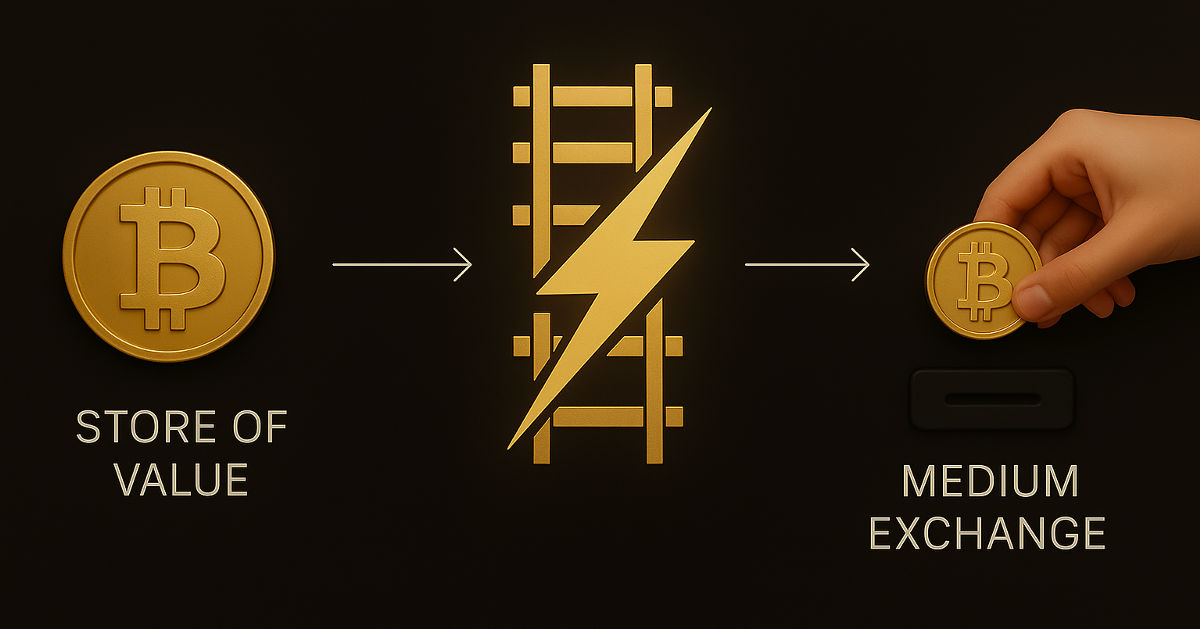
Amboss Launches Rails, a Self-Custodial Bitcoin Yield ServiceAmboss, a leader in AI-driven solutions for the Bitcoin Lightning Network, today announced Rails, a groundbreaking self-custodial Bitcoin yield service. According to a press release sent to Bitcoin Magazine, it’s designed to empower companies, custodians, and high net worth individuals. This allows participants to earn a yield on their Bitcoin.
Big news from @TheBitcoinConf !
We’re thrilled to announce Rails—a self-custodial Bitcoin yield service that empowers you to earn on your BTC while supercharging the Lightning Network.Let’s bring Bitcoin to the World.https://t.co/3WYYvB95hP
— AMBOSS
 (@ambosstech) May 29, 2025
(@ambosstech) May 29, 2025Rails also launched a secure way for Liquidity Providers (LPs) to hold all custody of their Bitcoin while generating returns from liquidity leases and payment routing, although they are not guaranteed. The implementation of Amboss’ AI technology, Rails strengthened their Lighting Network with more dependable transactions and larger payment volumes.
“Rails is a transformative force for the Lightning Network,” said the CEO and Co-Founder of Amboss Jesse Shrader. “It’s not just about yield—it’s about enabling businesses to strengthen the network while earning on their Bitcoin. This is a critical step in Bitcoin’s evolution as a global medium of exchange.”
The service offers two options:
- Rails LP is designed for high net worth individuals, custodians, and companies with Bitcoin treasuries, requiring a minimum commitment of 1 BTC for one year.
- Liquidity subscriptions are designed for businesses that receive Bitcoin payments, with fees starting at 0.5%.
Amboss partnered with CoinCorner and Flux (a joint venture between Axiom and CoinCorner), to bring Rails to the market. CoinCorner has incorporated it into both its exchange platform and daily payment services in the Isle of Man. Flux is jointly focused on advancing the Lightning Network’s presence in global payments. Their participation highlights growing industry trust in Rails as a tool to scale Bitcoin effectively.
“Rails offers a practical way for businesses like ours to participate in the Lightning Network’s growth,” said the CFO of CoinCorner David Boylan. “We’ve been using the Lightning Network for years, and Rails provides a structured approach to engaging with its economy, particularly through liquidity leasing and payment routing. This aligns with our goal of making Bitcoin more accessible and practical for everyday use.”
This post Amboss Launches Rails, a Self-Custodial Bitcoin Yield Service first appeared on Bitcoin Magazine and is written by Oscar Zarraga Perez.
-
 @ 1bc70a01:24f6a411
2025-05-31 04:34:37
@ 1bc70a01:24f6a411
2025-05-31 04:34:37{"title":"SVG Bee Logo","description":"Bee ready with a nice bee logo for your beeloved app!","price":35000,"contentUrl":"https://d.nostr.build/HRcgBzWongPHkSYT.svg","imageUrl":"data:image/png;base64,iVBORw0KGgoAAAANSUhEUgAACSgAAASUCAYAAABu9HH1AAAACXBIWXMAABYlAAAWJQFJUiTwAAAAAXNSR0IArs4c6QAAAARnQU1BAACxjwv8YQUAAI8dSURBVHgB7N3PblX32ffhXwvCsgsKNQWJKKlJ0kStGqkOo84CR4A5gsCow5gjwB51GHvWGfYRYEYdxjkAFFeKlAoUgiVLSI6MsGzhgmLl1b1ebcSThMTG+157/bkuacsuT5U63mvybH343r+5ePHiDwUAAAAADuju3bsFAAAAAA7qtwUAAAAAAAAAACCJQAkAAAAAAAAAAEgjUAIAAAAAAAAAANIIlAAAAAAAAAAAgDQCJQAAAAAAAAAAII1ACQAAAAAAAAAASCNQAgAAAAAAAAAA0giUAAAAAAAAAACANAIlAAAAAAAAAAAgjUAJAAAAAAAAAABII1ACAAAAAAAAAADSCJQAAAAAAAAAAIA0AiUAAAAAAAAAACCNQAkAAAAAAAAAAEgjUAIAAAAAAAAAANIIlAAAAAAAAAAAgDQCJQAAAAAAAAAAII1ACQAAAAAAAAAASCNQAgAAAAAAAAAA0giUAAAAAAAAAACANAIlAAAAAAAAAAAgjUAJAAAAAAAAAABII1ACAAAAAAAAAADSCJQAAAAAAAAAAIA0AiUAAAAAAAAAACCNQAkAAAAAAAAAAEgjUAIAAAAAAAAAANIIlAAAAAAAAAAAgDQCJQAAAAAAAAAAII1ACQAAAAAAAAAASCNQAgAAAAAAAAAA0giUAAAAAAAAAACANAIlAAAAAAAAAAAgjUAJAAAAAAAAAABII1ACAAAAAAAAAADSCJQAAAAAAAAAAIA0AiUAAAAAAAAAACCNQAkAAAAAAAAAAEgjUAIAAAAAAAAAANIIlAAAAAAAAAAAgDQCJQAAAAAAAAAAII1ACQAAAAAAAAAASCNQAgAAAAAAAAAA0giUAAAAAAAAAACANAIlAAAAAAAAAAAgjUAJAAAAAAAAAABII1ACAAAAAAAAAADSCJQAAAAAAAAAAIA0AiUAAAAAAAAAACCNQAkAAAAAAAAAAEgjUAIAAAAAAAAAANIIlAAAAAAAAAAAgDQCJQAAAAAAAAAAII1ACQAAAAAAAAAASCNQAgAAAAAAAAAA0giUAAAAAAAAAACANAIlAAAAAAAAAAAgjUAJAAAAAAAAAABII1ACAAAAAAAAAADSCJQAAAAAAAAAAIA0AiUAAAAAAAAAACCNQAkAAAAAAAAAAEgjUAIAAAAAAAAAANIIlAAAAAAAAAAAgDQCJQAAAAAAAAAAII1ACQAAAAAAAAAASCNQAgAAAAAAAAAA0giUAAAAAAAAAACANAIlAAAAAAAAAAAgjUAJAAAAAAAAAABII1ACAAAAAAAAAADSCJQAAAAAAAAAAIA0AiUAAAAAAAAAACCNQAkAAAAAAAAAAEgjUAIAAAAAAAAAANIIlAAAAAAAAAAAgDQCJQAAAAAAAAAAII1ACQAAAAAAAAAASCNQAgAAAAAAAAAA0giUAAAAAAAAAACANAIlAAAAAAAAAAAgjUAJAAAAAAAAAABII1ACAAAAAAAAAADSCJQAAAAAAAAAAIA0AiUAAAAAAAAAACCNQAkAAAAAAAAAAEgjUAIAAAAAAAAAANIIlAAAAAAAAAAAgDQCJQAAAAAAAAAAII1ACQAAAAAAAAAASCNQAgAAAAAAAAAA0giUAAAAAAAAAACANAIlAAAAAAAAAAAgjUAJAAAAAAAAAABII1ACAAAAAAAAAADSCJQAAAAAAAAAAIA0AiUAAAAAAAAAACCNQAkAAAAAAAAAAEgjUAIAAAAAAAAAANIIlAAAAAAAAAAAgDQCJQAAAAAAAAAAII1ACQAAAAAAAAAASCNQAgAAAAAAAAAA0giUAAAAAAAAAACANAIlAAAAAAAAAAAgjUAJAAAAAAAAAABII1ACAAAAAAAAAADSCJQAAAAAAAAAAIA0AiUAAAAAAAAAACCNQAkAAAAAAAAAAEgjUAIAAAAAAAAAANIIlAAAAAAAAAAAgDQCJQAAAAAAAAAAII1ACQAAAAAAAAAASCNQAgAAAAAAAAAA0giUAAAAAAAAAACANAIlAAAAAAAAAAAgjUAJAAAAAAAAAABII1ACAAAAAAAAAADSCJQAAAAAAAAAAIA0AiUAAAAAAAAAACCNQAkAAAAAAAAAAEgjUAIAAAAAAAAAANIIlAAAAAAAAAAAgDQCJQAAAAAAAAAAII1ACQAAAAAAAAAASCNQAgAAAAAAAAAA0giUAAAAAAAAAACANAIlAAAAAAAAAAAgjUAJAAAAAAAAAABII1ACAAAAAAAAAADSCJQAAAAAAAAAAIA0AiUAAAAAAAAAACCNQAkAAAAAAAAAAEgjUAIAAAAAAAAAANIIlAAAAAAAAAAAgDQCJQAAAAAAAAAAII1ACQAAAAAAAAAASCNQAgAAAAAAAAAA0giUAAAAAAAAAACANAIlAAAAAAAAAAAgjUAJAAAAAAAAAABII1ACAAAAAAAAAADSCJQAAAAAAAAAAIA0AiUAAAAAAAAAACCNQAkAAAAAAAAAAEgjUAIAAAAAAAAAANIIlAAAAAAAAAAAgDQCJQAAAAAAAAAAII1ACQAAAAAAAAAASCNQAgAAAAAAAAAA0giUAAAAAAAAAACANAIlAAAAAAAAAAAgjUAJAAAAAAAAAABII1ACAAAAAAAAAADSCJQAAAAAAAAAAIA0AiUAAAAAAAAAACCNQAkAAAAAAAAAAEgjUAIAAAAAAAAAANIIlAAAAAAAAAAAgDQCJQAAAAAAAAAAII1ACQAAAAAAAAAASCNQAgAAAAAAAAAA0giUAAAAAAAAAACANAIlAAAAAAAAAAAgjUAJAAAAAAAAAABII1ACAAAAAAAAAADSCJQAAAAAAAAAAIA0AiUAAAAAAAAAACCNQAkAAAAAAAAAAEgjUAIAAAAAAAAAANIIlAAAAAAAAAAAgDQCJQAAAAAAAAAAII1ACQAAAAAAAAAASCNQAgAAAAAAAAAA0giUAAAAAAAAAACANAIlAAAAAAAAAAAgjUAJAAAAAAAAAABII1ACAAAAAAAAAADSCJQAAAAAAAAAAIA0AiUAAAAAAAAAACCNQAkAAAAAAAAAAEgjUAIAAAAAAAAAANIIlAAAAAAAAAAAgDQCJQAAAAAAAAAAII1ACQAAAAAAAAAASCNQAgAAAAAAAAAA0giUAAAAAAAAAACANAIlAAAAAAAAAAAgjUAJAAAAAAAAAABII1ACAAAAAAAAAADSCJQAAAAAAAAAAIA0AiUAAAAAAAAAACCNQAkAAAAAAAAAAEgjUAIAAAAAAAAAANIIlAAAAAAAAAAAgDQCJQAAAAAAAAAAII1ACQAAAAAAAAAASCNQAgAAAAAAAAAA0giUAAAAAAAAAACANAIlAAAAAAAAAAAgjUAJAAAAAAAAAABII1ACAAAAAAAAAADSCJQAAAAAAAAAAIA0AiUAAAAAAAAAACCNQAkAAAAAAAAAAEgjUAIAAAAAAAAAANIIlAAAAAAAAAAAgDQCJQAAAAAAAAAAII1ACQAAAAAAAAAASCNQAgAAAAAAAAAA0giUAAAAAAAAAACANAIlAAoAAAAAAAAAZBEoAQAAAAAAAAAAaQRKAAAAAAAAAABAGoESAAAAAAAAAACQRqAEAAAAAAAAAACkESgBAAAAAAAAAABpBEoAAAAAAAAAAEAagRIAAAAAAAAAAJBGoAQAAAAAAAAAAKQRKAEAAAAAAAAAAGkESgAAAAAAAAAAQBqBEgAAAAAAAAAAkEagBAAAAAAAAAAApBEoAQAAAAAAAAAAaQRKAAAAAAAAAABAGoESAAAAAAAAAACQRqAEAAAAAAAAAACkESgBAAAAAAAAAABpBEoAAAAAAAAAAEAagRIAAAAAAAAAAJBGoAQAAAAAAAAAAKQRKAEAAAAAAAAAAGkESgAAAAAAAAAAQBqBEgAAAAAAAAAAkEagBAAAAAAAAAAApBEoAQAAAAAAAAAAaQRKAAAAAAAAAABAGoESAAAAAAAAAACQRqAEAAAAAAAAAACkESgBAAAAAAAAAABpBEoAAAAAAAAAAEAagRIAAAAAAAAAAJBGoAQAAAAAAAAAAKQRKAEAAAAAAAAAAGkESgAAAAAAAAAAQBqBEgAAAAAAAAAAkEagBAAAAAAAAAAApBEoAQAAAAAAAAAAaQRKAAAAAAAAAABAGoESAAAAAAAAAACQRqAEAAAAAAAAAACkESgBAAAAAAAAAABpBEoAAAAAAAAAAEAagRIAAAAAAAAAAJBGoAQAAAAAAAAAAKQRKAEAAAAAAAAAAGkESgAAAAAAAAAAQBqBEgAAAAAAAAAAkEagBAAAAAAAAAAApBEoAQAAAAAAAAAAaQRKAAAAAAAAAABAGoESAAAAAAAAAACQRqAEAAAAAAAAAACkESgBAAAAAAAAAABpBEoAAAAAAAAAAEAagRIAAAAAAAAAAJBGoAQAAAAAAAAAAKQRKAEAAAAAAAAAAGkESgAAAAAAAAAAQBqBEgAAAAAAAAAAkEagBAAAAAAAAAAApBEoAQAAAAAAAAAAaQRKAAAAAAAAAABAGoESAAAAAAAAAACQRqAEAAAAAAAAAACkESgBAAAAAAAAAABpBEoAAAAAAAAAAEAagRIAAAAAAAAAAJBGoAQAAAAAAAAAAKQRKAEAAAAAAAAAAGkESgAAAAAAAAAAQBqBEgAAAAAAAAAAkEagBAAAAAAAAAAApBEoAQAAAAAAAAAAaQRKAAAAAAAAAABAGoESAAAAAAAAAACQRqAEAAAAAAAAAACkESgBAAAAAAAAAABpBEoAAAAAAAAAAEAagRIAAAAAAAAAAJBGoAQAAAAAAAAAAKQRKAEAAAAAAAAAAGkESgAAAAAAAAAAQBqBEgAAAAAAAAAAkEagBAAAAAAAAAAApBEoAQAAAAAAAAAAaQRKAAAAAAAAAABAGoESAAAAAAAAAACQRqAEAAAAAAAAAACkESgBAAAAAAAAAABpBEoAAAAAAAAAAEAagRIAAAAAAAAAAJBGoAQAAAAAAAAAAKQRKAEAAAAAAAAAAGkESgAAAAAAAAAAQBqBEgAAAAAAAAAAkEagBAAAAAAAAAAApBEoAQAAAAAAAAAAaQRKAAAAAAAAAABAGoESAAAAAAAAAACQRqAEAAAAAAAAAACkESgBAAAAAAAAAABpBEoAAAAAAAAAAEAagRIAAAAAAAAAAJBGoAQAAAAAAAAAAKQRKAEAAAAAAAAAAGkESgAAAAAAAAAAQBqBEgAAAAAAAAAAkEagBAAAAAAAAAAApBEoAQAAAAAAAAAAaQRKAAAAAAAAAABAGoESAAAAAAAAAACQRqAEAAAAAAAAAACkESgBAAAAAAAAAABpBEoAAAAAAAAAAEAagRIAAAAAAAAAAJBGoAQAAAAAAAAAAKQRKAEAAAAAAAAAAGkESgAAAAAAAAAAQBqBEgAAAAAAAAAAkEagBAAAAAAAAAAApBEoAQAAAAAAAAAAaQRKAAAAAAAAAABAGoESAAAAAAAAAACQRqAEAAAAAAAAAACkESgBAAAAAAAAAABpBEoAAAAAAAAAAEAagRIAAAAAAAAAAJBGoAQAAAAAAAAAAKQRKAEAAAAAAAAAAGkESgAAAAAAAAAAQBqBEgAAAAAAAAAAkEagBAAAAAAAAAAApBEoAQAAAAAAAAAAaQRKAAAAAAAAAABAGoESAAAAAAAAAACQRqAEAAAAAAAAAACkESgBAAAAAAAAAABpBEoAAAAAAAAAAEAagRIAAAAAAAAAAJBGoAQAAAAAAAAAAKQRKAEAAAAAAAAAAGkESgAAAAAAAAAAQBqBEgAAAAAAAAAAkEagBAAAAAAAAAAApBEoAQAAAAAAAAAAaQRKAAAAAAAAAABAGoESAAAAAAAAAACQRqAEAAAAAAAAAACkESgBAAAAAAAAAABpBEoAAAAAAAAAAEAagRIAAAAAAAAAAJBGoAQAAAAAAAAAAKQRKAEAAAAAAAAAAGkESgAAAAAAAAAAQBqBEgAAAAAAAAAAkOZ4AQBaZ39/v2xubpbd3d3y9OnT6j+/bGxsrPp64sSJcuzYseprvOLP4+v4+HiBw4hn7Pnz52Vvb688e/as+n7wZ4PnL/78ZRMTE9Xz9sYbb5QzZ84UAAAAYHSePHlSFhcXy+rqallbW6v+88suXLjw4uvp06err/Gampqqvk5PTxc4jHjGHj58WD1v6+vr1feDPxs8f/H9y+I5i+dtZmamfPLJJwUA6I7fXLx48YcCALRChCAbGxtla2urHNUgHjl58mT1fXyFEM9ZxG87Ozv/J0o6injWzp8/L1QCgI64e/duAQDaIUKQGzdulKWlpXJUg3jk0qVL5W9/+1v1FUI8ZxG/ffHFFy+ipB/HR4cVz9rc3JxQCQA6QqAEAC0Rkcg333xTBSMZYmkpQqVYu4m/JRdBCf0RQVJ8kDRY5cpy6tSp8u6771bPGwDQXgIlAGiHiESuXr165FDkVeIzpIiWYu3mypUrL1aY6IcIku7cufNilStLhHC3b9+unjcAoL0ESgDQAhEn3bt37yen3DJFoBT/T38s3jgJ1z3xLMVzFWtcESbV+WxFCPf++++LlACgxQRKANB8EYxcvnz5J6fcMr18mstJuO6JZymeq+Xl5bKyslLrsxXP0+effy5SAoAWEygBQMPFYlLESVnLSQcxOM8V6zeWldptsJQUYVKdUdKPxYdJsaQEALSTQAkAmi0WkyJOylpOOojBea6PP/7YslLLDZaS4kxgnVHSj0X8FktKAEA7CZQAoOHW19ermKQpYlEpXidPniy0Q4RI8Qxtb2+XnZ2d0hTvvfdedVIQAGgfgRIANNv169ermKQprl27Vq0qxaku2iFCpMFSUgRKTRGBUoRKAED7CJQAoMFi7SbWk5oo1pQmJyerWIlmijBpc3Ozeo1yLelVYo3rww8/LABA+wiUAKC5IiaJ9aQmikBpECvRTBEmLS4uloWFhZGuJb1KrHF9++23BQBon98WAKCxmrSc9GOxxBPrTl999VWjf84+ihjp0aNH1XsTX5sYJ4U4WxgRHgAAADA8sXrTVBFPRaD0zjvvNPrn7KOIkebn56v3Jk7zNTFOCnG2sEmLTgDAwQmUAKDBmnSO61UiMhmESnt7e4XRakOY9LKmftgFAAAAbdWGeCMik0GotLa2VhitNoRJL7tz504BANpHoAQADRVxScQ/bRE/69dff13FSm36ubsilojaFCYNeFYAAABgeCIuifinLeJn/eijj8r169db9XN3RcRsbQqTBjwrANBOAiUAaKg2RSYvi3NvESpFKEO+CHzu379f7t2718rYR6AEAAAAw9PWpeKlpaUqVIolH/JF4HP16tVy+fLlVsY+AiUAaCeBEgAwdBFXDU6NCVDybG5uVjFYG04BvsqxY8cKAAAAQMRVseQTiz4ClDyLi4tVDLayslLa6vTp0wUAaB+BEgA0VBfCjYiTBmfHGJ7BatLGxkZrl7YAAACA4etCuBFxUkRK1pSGK36vsZg0Ozvb2qUtAKDdBEoA0FARKHVlXSYCpQhqrCkd3e7ubnXOrc2rSS8bHx8vAAAAwHBEoHThwoXSBbGm1NYTZE2zurpa/S7jaxdMT08XAKB9BEoA0GBnzpwpXRFBTYQ1e3t7hdcToVf8DrsUepnkBgAAgOGamZkpXTEIa9bW1gqvJ5aouhZ6XblypQAA7SNQAoAG61q8EWHN119/7eTbIcUZtwcPHnTu9zY2NlZOnjxZAAAAgOHpWrwRYc1HH33k5NshxRm3q1evVktUXRILYZcuXSoAQPsIlACgwSLeOHXqVOmaCG1ESgcziLriQ6WuOX/+fAEAAACGK+KNLgYcEdqIlA5mEHWtrKyUrrl582YBANpJoAQADTc1NVWOHTtWuiYCpVgFinUgfl6cw+vaSbeBOF84OTlZAAAAgOG7detWJ8+qR6QUq0Bd/ItcwxLn8Lp20m3g2rVr1QsAaCeBEgA03IkTJ8oHH3zQyUgpPky6f/++SOlndDlOmpiYKG+99VYBAAAAcsQZrM8//7yTkVKsAkWAI1L6qS7HSfFMf/bZZwUAaC+BEgC0wPj4eBUpjY2Nla55+vRpdcKsiyHO69ra2qripC6GW3Gy8P333+9kcAcAAABNMj09XUVKEXZ0TYQ4ccKsiyHO6+pyuBUnC7/88stOBncA0CcCJQBoiYiUIuyI01hdE3FSV9eCDivipPX19c7FScePH69Wk8RJAAAAUJ9BpNTFs1gRJ3V1LeiwIk7q4um7CJJiNamra2AA0De/uXjx4g8FAGiVCHm2t7erDx3iFNj3339fuiBOf/U5YBmcdetKnBSLXydPnqxWk9544w1hEgB0yN27dwsA0C4R8kTIcufOnWqBqCsxyyDC6mvAMjjr1pX3Mxa/YjHp448/LjMzM8IkAOgQgRIAdEzELfGKiCm+xgm1CF/i+52dndJ0fY2U2hInxRJSrHnFKwKkEydOVK94vwYvAKD7BEoA0C0Rt8QrIqb4+p///OdFxLS6ulqarq+RUlvipHhf4j2K19TUVBUhxSv+fPACALpPoAQAPbO7u1vFMPHBRVODpThjFx9W9EWTT9xFkBTrR7GCFGtIESMBAAiUAKBfIlKKGCbWl5oaLMUZu1u3bpW+aPKJuwiOYv0oVpBiDSliJAAAgRIA9Fis9QxOxTXtb1qdP3++enVdE+OkiJImJyerD5MiSgIA+DGBEgD0V3yGNDgVF1+bZG5urty8ebN0XRPjpPgcKSKxK1euVFESAMCPCZQAgEoEMrGu9OjRo/Ls2bPSBG+99VY5d+5c6bL79+83ZskqVpIiChMlAQC/RqAEAIQIZGJRaX5+vjGxzMLCQvn0009Ll0Wc1JQlq4iRIgoTJQEAv0agBAD8xOPHjxsRKh07dqx88MEHZXx8vHRR/I7jNWpxUi/CJOfbAICDEigBAD+2tLRUFhcXq1NwoxRLPp9//nmZnp4uXRQxWCxFjVqsJUWY5HwbAHBQAiUA4JWaECpFNPOXv/ylipW6ZGtrq6yvr5dREiYBAK9LoAQAvEqESqNeVIpo5ssvv6xipS6J3+3169fLKAmTAIDX9dsCAPAKk5OT5a9//Wv1gcPY2FgZhTg9N+qQZ9ji32mUy0lxyi2WqaampsRJAAAAwFBFwPLtt9+WW7dujSxiiThq1CHPsMW/U4RfoxIn3GKZapTvKwDQbsfOnz8/VwAAfkGcWIu/cba/v1/29vZK3f73v/9VC0q/+93vShc8ePBgJL/H48ePlzfffLP88Y9/FCYBAEfyj3/8owAA/JI4sTYzM1O2t7dHcvbtv//9b/n9739f/v73v5cuuHr16kh+j/GZ4D//+c/yr3/9S5gEAByJBSUA4EAiaInFnVGtKcXiUCwPtV38e+zs7JS6xWrSn//853Lu3LkCAAAAUIf4HCkWd0a1ujM3NzfSU3PDEstJq6urpW6xmhSn8mZnZwsAwFEJlACAQ4mzb++//36ZmJgodYr1prafehvVabfz589X75nVJAAAAGAU4uxbnAeL4KVOT548af2ptwisIrSq282bN6v3zGoSADAsTrwBAIcW59b+8Ic/VN/v7u6WukTg0+ZTb3Harc4VqDjp9qc//amcOXOmAAAMkxNvAMBhxamwCJXCF198UeoSgU+bT73Fabc6V6Diffr3v//94r0CABgWC0oAwGuLZZ6333671CkWiGJNqW22trZqPe0WZ/jipNvJkycLAAAAQFPEGtBnn31W6hT/m7Gm1DZLS0u1nnaLtaQ46Vb30hUA0A8CJQDgSM6ePVt9eBHLRnWIOGkUZ9KOou6fOeIkJ90AAACAppqdnS23b9+u1nrqEHHS/Px8aZO6f+b4fM9JNwAgk0AJADiyycnJ8sEHH9QWKW1ubpa9vb3SFvHz1nXabWJiolpOEicBAAAATTYzM1MFMXVFSgsLC2Vtba20xeLiYm2n3aanp6vlJHESAJBJoAQADMX4+HitkdLGxkZpgwiT6lpPGiwn1fUeAAAAABxFhDF1Rko3btwobRBhUpylq8NgOamu9wAA6C+BEgAwNBEpvf3226UOOzs7ZXd3tzSdOAkAAADg1SJS+uyzz0odVldXq1fT1XXaTZwEANRJoAQADFWce6srUqor/nldsZ60tbVVsg3iJGfdAAAAgDa6du1abZFSXfHP64r1pKWlpZJtECc56wYA1EWgBAAM3dmzZ8u5c+dKtqavKNUVUL377rviJAAAAKDVZmdnq1e2pq8o1RVQ3b59W5wEANRKoAQApHjrrbfKxMREydbUFaW61pPOnz9fndYDAAAAaLtYUYqTb9mauqJU13rSzZs3a/k9AwC8TKAEAKSJZZ9jx46VTLGitL+/X5rmyZMnJduZM2eqQAkAAACgK2LZ5/Tp0yVTLCjV8dnNYa2srJRscU5vbm6uAADUTaAEAKSJs2Nvvvlmyba5uVmaJvtnGhsbEycBAAAAnRNnx2LhJ9vi4mJpmuyfqa7fLQDAzxEoAQCpzp49W06dOlUyRQzUpBWlOO0WJ94yRZwUARgAAABA18zOzpZLly6VTAsLC41aUYrTbnHiLVPESREpAQCMgkAJAEg3NTWVeuot4qQ49dYU29vbJVOcdpucnCwAAAAAXXXr1q3UU28RJ8Wpt6a4c+dOyRSn3eIFADAqAiUAIF0s/Zw7d65k+u6770oTxHJS9t++c9oNAAAA6LpY+oklpUxNOfMWy0krKyslk9NuAMCoCZQAgFpEoDQ2NlayxIJSE868ZS85xe/RaTcAAACgDz799NPUk2SxoNSEM2/ZS07Zv0cAgIMQKAEAtYgTb9nLP1tbW2XUHj9+XLJE4JW9RAUAAADQFHHiLXv5Z3l5uYxa5s9QxxIVAMBBCJQAgNpMTk6mrihtb2+XUYrzbpkLSvH7s54EAAAA9Mm1a9dS13+yT6v9mjjvlrmg9Mknn1hPAgAa4XgBAKjR2bNny8bGRsnw9OnT6sxbrDWF+D6iob29vfLs2bPq+xBfB99///33rzwNN4ipBlFQfI1/dnyN/1t8HR8ff/Hfzz7vdubMmQIAAADQN7EAlLUCtLa2Vp15i7WmEN9HNBR/vr6+Xn0f4uvg+/jvvOo03CAGevlr/LPj69TUVPV1enr6xX8/+7xbBF4AAE3wm4sXL/5QAABqEjHQV1999coo6Kgi4on4aBAr1WFiYqKKlQb/uxni3ys+xAIAaIK7d+8WAIC6RAz0zjvvvDIKOqqZmZnqnz2IleoQkVLESoMYKkPESbdu3SoAAE0gUAIAavfo0aPqxcF9+OGHzrsBAI0hUAIA6jY/P1/m5uYKB/ftt9867wYANMZvCwBAzQaT2RzMYKEJAAAAoK+uXLlSOLjBQhMAQFMIlACA2o2Pj5dTp04VDubcuXMFAAAAoM8iuLl06VLhYD799NMCANAkAiUAYCROnjxZOBi/KwAAAIBSZmZmCgcj5gIAmkagBACMxJkzZwq/LpamnHcDAAAAcObtoCJOct4NAGgagRIAMBIR3Qhvfp31JAAAAID/L6Ib4c2vs54EADSRQAkAGIn9/f0yNjZWAAAAAOAgnjx5IlACAGgpgRIAUKsIkx49elS++uqrsrOzU/hlg9/V1tZWAQAAAOijCJPm5+fLO++8U1ZXVwu/bG5urvpdLS8vFwCApvjNxYsXfygAADXY3NysgpuIlDi88fHx8t577zmNBwCM3N27dwsAQB0WFxer4CYiJQ5venq63L592/IUADByFpQAgHS7u7vl66+/LhsbG+KkI9jb26vWlNbX18vz588LAAAAQFfFUtJHH31UZmdnxUlHsLa2Vq0pXb9+vTx8+LAAAIyKQAkASBMxUsQ09+7dq+IahiPOvcXv1Nk3AAAAoGsiRoqY5vLly1Vcw3AsLS1Vv1Nn3wCAUXHiDQBIER8mRZxkMSmXs28AwCg48QYAZFhZWaniJItJuZx9AwBGwYISADBUESQ9ePCgeomT8sUyVZzP29zcLAAAAABtFEHS1atXq5c4KV8sU8X5vMXFxQIAUBeBEgAwNLu7u1Us44OkekUItrGxUUVhz58/LwAAAABtsbq6WsUysZ5EfeLzu9nZ2SoKe/jwYQEAyCZQAgCG4tGjR+XevXsCmRGKD5biPYhQDAAAAKDp5ufny+XLlwUyIxRhWLwHEYoBAGQSKAEARxLrPffv368CJUYvArGIlLwfAAAAQFPFX7KKKGZubq4wehGIxfsRwRgAQBaBEgDw2vb29qqTbjs7O4VmiUApzr5FQAYAAADQFGtra9VJN4s9zRPB2I0bN6qADABg2ARKAMBr2dractKt4TY3N6uAzHsEAAAANMHy8rKTbg23sLBQBWTeIwBg2ARKAMChxTrP+vq6dZ4WGJx8EykBAAAAoxTnw65du2adpwUGJ99ESgDAMAmUAIBDiTgpXrTHIFKKk3wAAAAAdYs4Kc6H0R4RJ8WSUpzkAwAYBoESAHBg4qT2GkRK29vbBQAAAKAu4qT2irWrWFJaWVkpAABHJVACAA4kTrqJk9otTvJ988035fHjxwUAAAAg2/Xr18VJLReR0tWrV8vy8nIBADgKgRIA8KsiTtra2ip0Q0x0i5QAAACATBEnLS0tFbrh2rVrIiUA4EgESgDAL4rVJHFS90SktLu7WwAAAACGLc66iZO6JyKl1dXVAgDwOgRKAMArRZzkrFt3xbm3vb29AgAAADAsESc569Zdce5tbW2tAAAclkAJAPhZ4qTu29/fL/fu3SvPnz8vAAAAAEclTuq+J0+elMuXL1fr3AAAhyFQAgB+Ik66iZP6QaQEAAAADMPy8rI4qSdESgDA6xAoAQD/R4QqGxsbhf6I9/zBgwdVrAQAAABwWBGqzM7OFvoj3vM49xaxEgDAQQiUAIAXIlSJNR2hSv88ffrUahYAAABwaBGqxJqOUKV/1tbWqrN+AAAHIVACAF745ptvnPrqsc3NzeoFAAAAcFCxouPUV38tLCyUxcXFAgDwawRKAEAl1nP29vYK/Rbn/TwHAAAAwEHEek6s6NBvcd7PcwAA/BqBEgBQtra2nPfihVjScuYPAAAA+CVLS0tlbm6uQIglLWf+AIBfIlACgJ6Lk27iJF4Wz8T6+noBAAAA+Dlx0i3Wk2Agnonr168XAIBXESgBQM9FiBJBCrws/sbb5uZmAQAAAPixGzduVEEKvGxlZaUsLi4WAICfI1ACgB6LAGVnZ6fAz4llLfEaAAAA8LIIUCJEgZ8TZ//EawDAzxEoAUBPOe3Gr9nf33fqDQAAAHghwpMIUOBVYpXbqTcA4OcIlACgpyJOigAFfkksbG1vbxcAAACA+fn5KkCBX7K6umplCwD4CYESAPTQ1tZW9YKDiL8dKWYDAACAfltaWqpecBCxoiRmAwBeJlACgB5y2o3DiDhpc3OzAAAAAP0V60lwUBEneWYAgJcJlACgZyJOev78eYHD8NwAAABAf0VoEgvLcBgLCwueGwDgBYESAPRIBCbWk3hd6+vrBQAAAOiXCEzm5uYKvI449QYAEARKANAj4iSOYmdnp+zu7hYAAACgP5zp4ihWV1erFwCAQAkAeiLWk7a2tgochcgNAAAA+iPWk5aWlgochcgNAAgCJQDoCWEJw2BFCQAAAPpDWMIwWFECAIJACQB6wHoSwyR2AwAAgO6znsQwid0AAIESAPSAoIRhsqIEAAAA3ScoYZisKAEAAiUA6DjrSWQQvQEAAEB3WU8ig+gNAPpNoAQAHffkyZMCwxYrSvv7+wUAAADonpWVlQLDFgtKEb8BAP0kUAKAjtvc3CyQwbMFAAAA3bS4uFggw/LycgEA+kmgBAAdFqfd4sQbZIhAyYoSAAAAdEucdrNyQ5aFhQWL7wDQUwIlAOiwx48fF8gScVKcegMAAAC6w8INmSJOilNvAED/CJQAoKNiOUk8QrbvvvuuAAAAAN0Qy0niEbI5IQgA/SRQAoCOEidRh3jOnHkDAACAbhAnUYd4zpx5A4D+ESgBQEdtbm4WqMPW1lYBAAAA2s+yDXVxShAA+kegBAAdFOfd9vb2CtRhe3u7AAAAAO0W593W1tYK1GFlZaUAAP0iUAKADjKRTJ2ceQMAAID2u3PnToG6OPMGAP0jUAKADrJoQ92ceQMAAIB2s2hD3Zx5A4B+ESgBQMfEkk0s2kCdRHEAAADQXrFkE4s2UCdRHAD0i0AJADpGnMQoPH36tAAAAADt9MUXXxSo29raWgEA+kOgBAAdY8mGUYjlrt3d3QIAAAC0jyUbRsFyFwD0i0AJADrGkg2j4tkDAACAdrJkw6hY7wKA/hAoAUCHPH/+vOzt7RUYBetdAAAA0D6xYiNQYlQsKAFAfwiUAKBDLNgwSp4/AAAAaB8LNoySOA4A+kOgBAAdYj2JUdrf369WvAAAAID2EIgwSrHg9fDhwwIAdJ9ACQA6ZHd3t8Ao7ezsFAAAAKA9nNhi1Kx4AUA/CJQAoEOc2GLUrHgBAABAu1hQYtQ8gwDQDwIlAOiIOK8VLxglJ94AAACgPeK8VrxglJx4A4B+ECgBQEdYrqEJrHgBAABAe1iuoQk8hwDQDwIlAOiIZ8+eFRg1C0oAAADQHpZraIJ4Di15AUD3CZQAoCOEITSFZxEAAADaYX19vUATCJQAoPsESgDQEU680RSeRQAAAGgHC0o0hTNvANB9AiUA6Ij9/f0CTfD9998XAAAAoPkESjTF9vZ2AQC6TaAEAB0hCqEpnHgDAACAdnBWi6YQywFA9wmUAKAjRCE0hTUvAAAAaAdRCE0hlgOA7hMoAUBHiEJoCs8iAAAAtIMohKbwLAJA9wmUAKADBCE0iecRAAAAmk8QQpN4HgGg+wRKANABghCaxPMIAAAAzScIoUk8jwDQfQIlAAAAAAAAAAAgjUAJAAAAAAAAGBkLSgDQfQIlAACG6tmzZwUAAAAADkqgBADdJ1ACAGCojh8/XgAAAAAAAGBAoAQAwFAdO3asAAAAAMBBXbhwoQAA3SZQAgAAAAAAAAAA0giUAAAAAAAAAACANAIlAOgAJ7UAAAAAOIzTp08XAACoi0AJADpAoESTnDhxogAAAADNJlCiSS5cuFAAgG4TKAFAR4iUaArPIgAAALSDSImm8CwCQPcJlACgI0QhNIVnEQAAANpBFEJTeBYBoPsESgDQEWNjYwWawIk3AAAAaAdntWgKzyIAdJ9ACQA6QhRCU4jlAAAAoB1EITTF1NRUAQC6TaAEAB0hUKIpnHgDAACAdhAo0RROvAFA9wmUAKAjBEo0xfj4eAEAAACaz2oNTTE9PV0AgG4TKAFAR0xMTBQYNc8hAAAAtIcohCbwHAJAPwiUAKAjLCjRBM67AQAAQHs48UYTOO8GAP0gUAKAjogwRBzCqDnvBgAAAO0RYYhIiVGzoAQA/SBQAoAOOXXqVIFR8gwCAABAu4hDGLWPP/64AADdJ1ACgA5x5o1R8wwCAABAu1hQYtQ8gwDQDwIlAOiQkydPFhiVODHoxBsAAAC0y6VLlwqMSpwZtOIFAP0gUAKADnFei1GamJgoAAAAQLs4r8UoiZMAoD8ESgDQIbFg48QWo2LBCwAAANonFmyc2GJULHgBQH8IlACgY+JDJRgFC14AAAD8P/buLlbL88wP/WVjg8FgMNgkuCZgO7GdOlMDldqMc5BFlbSTSo3hoGlyUAHZk3pvzUgsEk3mkLVOKs3MAWupGWlmS2NAW1UymkhAVLWT2JKxtJ1mtOVhRYqU2GkcPHZFywQPDgRiEuTN9ay8Cbb5WB/v/bzPx+8nvXrBib/Wx7P8/J//fV20044dOwJGwQQvAOgPBSUA6Jjly5cH1C2nd5mgBAAAAO30+OOPB9QtD1qaoAQA/aGgBAAdY4ISo2B6EgAAALSXCUqMgnISAPSLghIAdExOslEWoW6KcQAAANBeJtkwCk8++WQAAP2hoAQAHbR69eqAOlnvBgAAAO1mihJ1U4oDgH5RUAKADjLNhjrlxK6lS5cGAAAA0F6m2VCnLCdt3rw5AID+UFACgA7Ksog1b9Rl3bp1AQAAALRblkVMtKEuu3btCgCgXxSUAKCjrNyiLr7WAAAAoBsUlKiLrzUA6B8FJQDoqPXr1weUZr0bAAAAdMfevXsDSrPeDQD6SUEJADpqyZIl1rxRnPVuAAAA0B1r1qwx2YbirHcDgH5SUAKADtuwYUNAKcuWLYu1a9cGAAAA0B379+8PKCUnJ+3evTsAgP5RUAKADlu5cmU1SQlKyK8vAAAAoFtyglJOUoISTOgCgP5SUAKAjlu/fn1ACSZ0AQAAQDeNj48HlGBCFwD0l4ISAHRcFpRMUWLY1q1bF0uXLg0AAACge/bu3WuKEkOXq91yxRsA0E9LNmzYMBEAQGfdeuut8ctf/jJ+9rOfBQzLsmXL4he/+EW8/fbbVQEuv84AgP546qmnAgDorjvuuCP+9//+3/Gd73wnYFiynJRfVz//+c+rAlx+nQEA/XFbAACddfny5bh48WL1DsN09uzZ6jWwYsWKaqLS6tWrq18vX748AAAAgPbJ+/2ZmZl33PfDMBw9erR6DWzZsqUqLe3YsSMef/zx6vcAQHfdsm3btrcDAOiM8+fPx7lz5379DqOQZaUsKmVhadWqVdbBAUDHvPjiiwEAdMfx48fj+eefr97zBaOQZaUsKWVh6eMf/7h1cADQMQpKANByOR0py0iDiTamJdFEWVZauXJlNb473wGAdlNQAoB2ywwpi0jHjh2rJtqYlkQTZVlpbGwsnnzyyeodAGg3BSUAaKEsIb355ptx5syZuHDhglISrZLTlHKq0rp165SVAKClFJQAoH2yhJRlpMOHD1vhRuvkNKUsKe3atUtZCQBaSkEJAFoiS0gXL16MU6dOKSXRGYOy0oYNG6yBA4AWUVACgHbIElKWkSYnJ5WS6IxBWWnv3r3VlCUAoB0UlACg4Qbr23JaklISXZZr4O69996qsKSsBADNpqAEAM02WN926NAhpSQ6LQtK4+Pj8fGPf7wqLgEAzaWgBAANlEWkLCTlGrdz584F9E2uf7MCDgCaS0EJAJoni0i5vi3XuGVBCfpm9+7dVsABQIMpKAFAg5iWBO+Uk5Ry/ZupSgDQLApKANAcpiXBO+UkpYmJCVOVAKBhFJQAoAGykPTGG2+YlgQ3kBOVsqykqAQAo6egBACjl5OSpqenTUuCG8ipSvv371dUAoAGUFACgBHJCUmnT5+uXqYlwdzlNKW1a9dWhSUAYDQUlABgNHJCUpaSpqamTEuCeci1b4MVcADAaCgoAUDNLl26VJWSrHGDxRmsf1NUAoD6KSgBQL1OnjxZFZOscYPFGax/U1QCgPopKAFATc6fPx+nTp2yxg2GLItK69evjzVr1lj/BgA1UVACgHrk+rbJyUlr3GDIsqg0Pj4eTz75pPVvAFATBSUAKEwxCeqR5aRc/5ZTlRSVAKAsBSUAKEsxCeqR5aRc/7Z//35FJQAoTEEJAApRTILRybVvikoAUI6CEgCUoZgEo7N7925FJQAoSEEJAIZMMQmaQ1EJAMpQUAKA4VJMguZQVAKAMhSUAGBIFJOguRSVAGC4FJQAYDgUk6C5FJUAYLgUlABgkRSToB2ynJRFpXwpKgHA4igoAcDiKCZBO2Q5KYtKu3btUlQCgEVSUAKABbp06VJVTDpz5kx00ZoVEWcvBHROlpNymlIWlQCAhVFQAoCFOXnyZFVMOnToUHSRPImuynLSxMREVVQCABZGQQkA5uny5ctx+vTpqpwEtJeiEgAsnIISAMzP2bNnY3p6uio4AO2lqAQAC6egBABzNCgm5St/DXRDFpUyXFq5cmUAAHOjoAQAczMoJk1NTVW/Brohs6SDBw/G2NhYAABzo6AEAHOQa9xyYlKudeu6zffMjuNOM38X9NjYo7Nj2U/+pB/j2XOSUk5UysISAHBjCkoAcHO5xi3XueVat66TJzHQtzxp9+7dsX///qqwBADcmIISANzA+fPnq2LSuXPnomsyNMrAYPO6iMc3Xvn1I7Nh0sCxExE7vhL0VH4t/PiPfvP7DJRmXpt9vfqT2ffjP4hOWr9+ffVSVAKA61NQAoDrO378eFVMyveuuVmedPyliO1/HPRUn/Ok8fHx2Lt3r6ISANyAghIAXEOucHv99deryUldMQiQPn4lONqx5Z3h0bUceiFiz9NBj739Fzf//2Tw+PxLs+9dCpiynJTTlHKqEgDwXgpKAPBeucJt37591eSkrpAnMV99zpOynDQxMRG7du0KAOC9FJQA4F1yYtLp06erklLbZWi0Y2vEk1tnT7TNx+Q3IiaOBT2WJ95uFjxeLU/FHT0xGzDlexfGeGdR6eGHHzZNCQDeRUEJAN4pJyZNTU1VJaW2kyexGPKk2aLSkSNHYsuWLQEA/IaCEgD8Sq5zO3nyZFy6dCnabMsHZgOk3U/MLwx4t51/eiUU+Nugx478/mwguVAZKuWqwC6ESzlJKScqKSoBwCwFJQCYlWvc9uzZU2VKbSZPYlgWmyflVKXDL3QjT9q9e3fs37/f2jcA+JXbAgB6LgtJuc6tzSfcctz23k/Onmqb78m26zn5k6DnXl3khsMMo/J1MGZHvB+baW9Imesez507Z+0bAAAAlcyRsph09OjRaCt5EiUsNk8afD1mnpQlpcPfbm+elOses8Ro7RsAzDJBCYBey1VuudKtrevcxh6N2P/p4YVIV7vl/wh6bvfHroRBn4+hyqAyT8LlyPe2hpbWvgGACUoA9Nv09HRVOGjrYTd5EiXJk64tpyg999xzpikB0GsmKAHQS7nOLYtJORGlbQan28Y/MfvrEvKGH2b+LoYux8Tvvmc2rBqM7M7pSm2SU9e+973vxfr166uJSkuWLAkAAAC6b2ZmJvbt21dNRGkbeRJ1kSddW66BfOCBB2J8fLxa+7ZmzZoAgL4xQQmAXslJSVlMyslJbVPydNu7TT97JbD6akD8w38qF1wOtPkUXE5RsvYNgD4yQQmAPslJSZOTkzE1NRVtI09iFORJN5ZTlKx9A6CPFJQA6I2cmpQnVXL6SVvkjXyeDNp15bVlY9Rm55+2d7c7w/Xcl+sJMQfy9Nvhb18JmH4QrZIFpSwqWfsGQF8oKAHQFzktac+ePVWm1BbyJEZNnjQ3u3fvrqYpWfsGQF/cGgDQcTk16fXXX4+XX365NeWkDJL2Pxnx4z+KOPDZesOkVGIUM+30fM3j2TNAfe4PIk5MzP66Lc6cOVNdY/IdAACA9supSbnObfv27a0pJ8mTaIpjJ6JWbc2TDh06VF1jDh8+HADQByYoAdBpbZualPvU937yyo30E+XHIF/PzGsRWycCKnnaLU+9jUqO6M5R3XkSri1MUwKgD0xQAqDL2jY1KfOknJY0/gl5Es0gT5o/05QA6AMTlADopLZNTcog6eDnZ0+4jTJMSnVPzKHZjl/5ejh7IUbm6u+NtpyAM00JAACgndo2Nenqe+aJT8uTaA550vyZpgRAHygoAdA5OTXp+9//fpw+fTqabuzR2dNETbpZPvq3Ae9wbCZGrm3BUhYjX3311erVlgluAAAAfZZTk7Zu3RpTU1PRdPIk2kCeNH9ZjMxJSm2a4AYA86GgBEBntGlqUt4cZ5CUu9Fz5HFT5Mmm40688S7HfxCN0bZgyTQlAACAZmvT1KS8Jz7y+/Ik2kGetHCmKQHQVQpKAHRCW6YmXX0z3KQgaeDoiYD3aOLXRZuCJdOUAAAAmqktU5OuvgfesTUaR57EtciTFsc0JQC6SEEJgNZrw9SkNSsiDnyu+Te/TRi9TPM0+SRkm4KlwTSlLFQCAAAwWm2YmiRPos3kScMxmKaUhUoAaDsFJQBaKwtJTZ+alEHS/idnb3bHPxGN16TRyzTLsYafhmxLsJTXrSwpnTp1KgAAAKhfFpKaPjVJnkRXyJOGI69bWVKanJwMAGizW7Zt2/Z2AEDLZCkpH/Bfvnw5mmrvJyMmPj0bKrXBoRci9jwdcE35dfwP/ylaI0/o5dfzyZ9EYy1dujQefvjh6h0A2ubFF18MAGib6enpmJiYiLNnz0ZTyZPoEnnS8G3evDmee+656h0A2sYEJQBaJQtJr776arXWranlpLFHZ0/dTH22PWFSMo6bG2nyWO5rGXtk9vswT8HlabgmasMUOAAAgC7IQtKePXtifHy8seUkeRJdJE8avsEUuCxcAkDbLNmwYcNEAEALXLx4sVqNdP78+WiiLRsjvvp/tuuU20CeCvq//p+AG7rlymvH1miVLR+IGP9kVP/wzzcwEHv77bfjpz/9aVVWWrVqVdx6q/MDALTDU089FQDQBjMzM9VqpOPHj0cTyZPoOnnS8P385z+Pv/7rv64O8o6NjcUdd9wRANAGnoAA0Ao5YSQnjeRD/KbJ8OjA5yJOTMyesmmjNp1kYnSOnpg9+dZGGfTmCbjdH4tGOnPmTGOvcQAAAG2VE0Zy0khOHGkaeRJ9IU8q59ChQ429xgHAtSgoAdBoucbtlVdeqVa6NdHeT87epI5/Ilrt8AsBN5Vh0uFvR2vlaO4c0Z3hbxPHdGc56Xvf+56VbwAAAIuUa9x27txZrXRrInkSfSJPKivLSQ888ICVbwC0goISAI2VK91yokiGSk0z9mjEc1+OmPps+8Zvv1uO43bijbk6+rfRejk+P4PgPKnaxGApC5n5yoImAAAA85Mr3XKiyNGjR6Np5En0lTypvCxk7tu3r5FZOgAMKCgB0Eg5QeTll19u3Lqjwfjt5/6gveO3323yGwFzluHjzGvRCXlSNb+Xmzimu8lrLQEAAJoqJ4hs3769ceuO5En0nTypHlNTU1a+AdBoCkoANE5Tp4fkTWcXxm+/m9NuzNexE9EZgzHdR36/eaffspyURc0333wzAAAAuLGcHJITRJo2PUSeBLPkSfXIclIWNZs4RQ4AFJQAaIx8GJ8TQ3JySJPkTWaO386bzraP3363Qy/MjuSG+Zh6JuLsheiUHVtnA+P9T0aj5HXxRz/6UZw6dSoAAAB4r3wYnxNDcnJIk8iT4J3kSfXJ6+LOnTtjcnIyAKBJFJQAaISLFy9Wk0LyvUny5vLE/u6M3363wy8EzFuGSV09KTnx6dlgqWmn37Kg9MorrzRushwAAMAozczMVJNC8r1J5EnwXpkndWmK0tWamidNTExURaWmTZYDoL8UlAAYuZyYlJOTclJIU2zZeCVImpi9uezaKbeBPOlmHDcLNf1MdFaGSRkqHfhcs77/M0xq2rUSAABgVKanp6vJSTkppCnkSXBjhzpcbmtqnpSr3pp2rQSgvxSUABip119/vXo1Rd485k1khkkZKnXZ5DcCFizDyK4HkuOfaN6J1ywnNXHaHAAAQJ327dsX4+Pj0RSZJ1VTkybkSXAjfcqTdmyLxshyUhOnzQHQPwpKAIxErin64Q9/WE1PaoqxR2dvHvMmsuvytNvRjo5Upj5dHct9tTz99tyXIw5+vjmn37KklJOUmnT9BAAAqENOls11RVNTU9EUgzwppyZ1nTyJYejDisDMk4783mye1JS1b1lSyklKOX0OAEZFQQmA2g0erp87dy6aIqcmPfcHzdsTXkqeVMq977AYOZa7L19Huz/WvGlKOX3u1KlTAQAA0AeDh+u5rqgp5Ekwf1ly61OelNeIJuVJOX1ucnIyAGAUlmzYsGEiAKAmuZbof/yP/1GVlJogx27/ty9G7NgavbLzTwVKLN7PfxGxfGmzQpaScoJSBktr7oz4m1dm//1H7fz589X1dNWqVXHrrc4eAFCfp556KgCgLrmW6FOf+lRVUmoCeRIsnDwpRu748ePx6quvxtjYWNxxxx0BAHXxFAOA2uQY7pdffrkx5aS9n4w4MTEbKvVJTr3JkdwwDFPP9C+czDWQOU2pKSdkz5w5U63MbMq1FQAAYJhyYtL27dsbU06SJ8HiyZNG79ChQ426tgLQDwpKANTi9OnT8corr8Tly5dj1PIm8LkvX7kR/mz0Uh/2vFOfDJOOnYjeyevIj/8oYv+T0QgXLlxoVAEUAABgGKanp2Pnzp3VobdRkycFDE3mSYe/Hb3TtDwpp9MpKQFQJwUlAIo7depUvP7669EEuz42e1KlLyOE3+34S7MvGKZDPQ4pJz49Gyw14fRblpOUlAAAgK6YnJyM8fHxaAJ5kjyJ4Tv0/0ZvNSlPynKSkhIAdVFQAqCoLCfla9Ry1/eBz1258f387K/7ymk3Suh7UJlhUgbVuz8WI5flpO9///tx8eLFAAAAaKssJ01MTMSoyZNmyZMoYeY1eVJT8qQsJ23durWaqAQAJS3ZsGHDRABAAa+++mq12m3UtmycHcH9Ox+JXjv5k4g9TwcU8epPmhGojModt0fs2HolsL4z4m9eifj5L2Jk3n777fiHf/iHWLp0aSxfvjwAoISnnnoqAKCEPXv2xNTUVIyaPGmWPImS5EnNyZN+/vOfx1/+5V/GlefGsWXLlgCAEkxQAqCILCedOXMmRm3vJyNOTDRjXO6oTX4joBjj3meNf2L29NuorzmXL1+uTr+98cYbAQAA0BZZTjp06FCMmjzpN+RJlCRPmtWUPOns2bOxe/fuOHz4cABACQpKAAxVPhT/4Q9/OPJyUo7dPvL7EVOfDWL2tNsh47gpbPJYELNh0o//6Eq49MkYuSwpNWGSHQAAwI3kQ/Ht27ePvJwkT3oneRJ1kCfNalKelCWl6enpAIBhs+INgKHJctLLL78cP/vZz2KUBiO4P/pQ8Cv7vja71x1KOnkmYuxRJ0wHcg1AE0Z0//SnP63eV61aFQAwLFa8ATAsg3LSd77znRgledJ7yZOogzzpnZqSJ/31X/913HLLLTE2NhYAMCwmKAEwFINy0sWLF2OUcgR3hkluaH/DaTfq5NTbOzVlRPepU6eqFwAAQJMMykkzMzMxSvKk95InUSd50js1JU+amJiIycnJAIBhUVACYNGaUE7KEdwHPjc7gjt/zW9MfiOgNsdfcrry3TJMylBp98dipJSUAACAJmlCOUmedH3yJOqUeVK++I2m5ElKSgAMkxVvACzaSy+9NNJyUt6s/bd9ETu2Bu+Sp932PB1Qq7d+4fvx3e64/Vcfk1sinh9h4Hb+/PlYtmxZLF++PABgMax4A2CxPvWpT410rZs86frkSYzClcjE9+O7NCVPOn78eDzwwAOxZcuWAIDFMEEJgEV59dVXR1pOyv3kz/1BxJaNwTU47cYo5Aj4DDN5r4lPRxz5/dGezD158mS88cYbAQAAMCp79uypHniPijzpxuRJjII86foGedIoV77t3r07Dh8+HACwGApKACzY66+/HmfOnIlR2fvJ2TBp1Lu4mypv6PPGHkZBmHl9efItR3SP8tqVJaWcpgQAAFC3ffv2xaFDh2JU5Ek3Jk9ilORJ15d50qivXVlSGmW5FID2U1ACYEFOnToVp0+fjlE58LmIqc8GN+CGnlFy6u3GMkzKUGnskRiZH/3oRyOdgAcAAPTP5ORkTE1NxajIk25OnsQoyZNubJAnjXIV3s6dO2NmZiYAYCEUlACYtywn5WsUci3Sc1+OGP9EcANOu9EE+74W3EAVKl25nu1/Mkbi8uXLVUnp0qVLAQAAUFqWkyYmJmIU5ElzI0+iCfY8HdxA5km57m1UedLZs2erklJO5waA+VJQAmBe8gZkVOWkvPnKtUijnDjSFk670QRHT0Qcfym4iYlPjy5UynLSyy+/XJWVAAAASjl69OjIyknypLmTJ9EEmSXJk25ulHlSlpO2b99ePSsAgPlQUAJgzvJB9quvvhqjsGXj6Hdst4XTbjTJ5LFgDjJUytNveaq3bnltf+WVVwIAAKCEfJC9Z8+eGAV50tzJk2gSedLcjDJPymt7TlICgPlQUAJgTkY5ZWPXx2bHcAuT5sZpN5rEqbe527F1dNe6c+fOxeuvvx4AAADDNMopG/Kk+ZEn0STypLkbZZ50/Pjx2LdvXwDAXCkoATAnP/rRj6qSUt32fjLi0OdHcwqkjZx2o4mcepu7UZ7uPX36dPUCAAAYlpyukSWlusmT5keeRBPJk+ZulHnS1NRUTE9PBwDMhYISADd16tSpuHjxYtQtd2hPfTaYB6fdaCKn3uYnw6RRhUqjut4DAADdMzk5GTMzM1E3edL8yZNoInnS/IwyTxofHx/J9R6A9lFQAuCGzpw5Uz2wrluGSblDm7lz2o0mc+ptfjJMOrF/9gRcnXKNZ07MG8U6TwAAoDsOHToUExMTUTd50vzJk2gyedL8jCpPSjkxbxTrPAFoFwUlAK4rV7qNopx04HPCpIVw2o0mc+pt/nIVwXNfrj9Uymv/q6++GgAAAAuRK91yelLd5EkLI0+iyeRJ8zeqPCmv/Xv27AkAuBEFJQCuK6do5IPqOh38fMT4J4J5yht1p91ouj1PB/OUodKJiYhdH4ta5Ym306dPBwAAwHzlA+p8UF0nedLCyJNoA3nS/I0qTzp69GhMT08HAFyPghIA15STky5evBh1yjBpd803TV3hRp02yLHx088EC3Do8/WHSvlzoO6SKgAA0G45Oen48eNRJ3nSwsmTaAN50sKNIk/K9Z51l1QBaA8FJQDeYxSr3YRJC5cn3fJGHdpg4hsRZy8EC1B3qHT58mWr3gAAgDnLB9L5YLpO8qSFkyfRJvKkhas7T8qp3Fa9AXA9CkoAvMfrr78edRImLc7kNwJaI8Ok6WeDBcpQacfWqM25c+fizTffDAAAgJvZt29f1EmetDjyJNpEnrQ4dZeUcpJernsDgHdTUALgHc6cOVOdcqjL/ieFSYvhtBttNPWMU2+LkSH8lo1Rm9dee62apgQAAHA9hw4dqvVhtDxpceRJtJE8aXGmPltvnpSl1TqfMwDQDgpKALxDnavdMkya+HSwQBkkOe1GG2WYNHksWKA1KyKe+3J9oVKu/Tx9+nQAAABcz+TkZNRFnrQ48iTaSp60OHXnSbn2c3p6OgDgards27bt7QCAmJ2e9Oqrr0YdhEmLt++rEVOFRxv7PPXXA39Y/jTliYl6T251TX5+tv9JPadelyxZEh/5yEeqdwBIL774YgBAyulJe/bsiTrIKRZPnkRJ8qTmqzNPWrNmTfz4xz+u3gEgmaAEQCUnZNQ1PSn3XQspFidvIEuHSZvv8XnqswOfjeIyFGXh8nv0uT+YfS8tV7zVOWEPAABoh5yQUdf0JHnS4smTKC3X0pcmT1qcOvOkXPFW54Q9AJpPQQmASj54zpJSaXm65VANN6pdV8co7v3CpF7bsTVi7JEo6vhLsy8WLsOkI78ftcg1b+fPnw8AAICBfPCcJaXSMk+aquEgTdfJkygtsyR5UvPVmSdNTU3F8ePHAwCSghIAVTEp17uVVueNT5fNvBZx6IUoKj9Xuz8W9FyOZC/NqbfFy6D+wOeiFqYoAQAAA1lMyvVupQ3ypDUrgkWQJ1EXeVI71JknmaIEwICCEgDx8ssvRx3qGh3bdTu/EsU57Uaq49RbBqTTzwSLNP6JK69PRnHnzp2rpdAKAAA0386dO6MO8qThkCdRF3lSe9SVJ+UEpcOHDwcAKCgB9Fw+aK5jtVuexhAmLV6edDv5kyjKaTeuVsept4lvRJy9ECzSgc/Onn4r7fXXX4/Lly8HAADQXzk5aWZmJkqTJw2HPIm6yZPao648aXx8PM6ePRsA9JuCEkDP1bGuJ8OJPI3B4uQN9+Q3oriDnw/4tTzxtmNrFJVf29PPBkNQx9qDLCedPn06AACA/qpjXY88aTjqypOy5AADdeVJk8eCIagjT8py0vT0dADQbwpKAD1Wx/SkPD1lvPNw5Nji0qfdMvwrPYKZ9qkjZJw4Vv7ruw+qa24NpxSzoGSKEgAA9FNOTzp58mSUJE8anjrypB3bypdRaJ868qSpZ+VJw1BXnjQ1NWWKEkDPKSgB9Fgd05MyTDKKe/HyRnuihtNuwj+uJb+HJ2oIKfY8HQxBnjAuXTQ0RQkAAPqrjulJ8qThqCtPOvDvAt5DntQudeRJpigBoKAE0FN1TE/KaTx2zw9HHaO483Ml/ON69n6i/Kjn4y/Nvli8OlY1KigBAED/HDt2rPj0pJzGI08aDnkSoyZPapfMk0p/vnKKEgD9paAE0FNvvPFGlGYaz3AcemH2VZrPFzeS4cT4J6O4PPV29kKwSHWcUswpSsZyAwBAv9TxYNk0nuGQJ9EE8qR2yTyp9Ocrs6SjR48GAP2koATQQzk56dy5c1GS01PDU8dpt9wx7vPFzeSpt9JfJzl+fvrZYAjqOKX493//9wEAAPRDTk46fvx4lCRPGh55Ek0hT2qXOvIka94A+ktBCaCHTp06FaU5PTUck8dmb7BLqk7GfCLgpjKcOPDZKG7qmfJf931QxynFLLtevHgxAACA7pucnIzS5EnDIU+iSeRJ7VJHnpRl15mZmQCgfxSUAHqo9PQkp6eGI2+op2o4+ZPhX+lTMXTHjq0RY49EUTmSe9/XgiGo45SiNW8AANAPpacnyZOGQ55EE8mT2iW/v0tfj48dOxYA9I+CEkDPnD9/vlrxVkreuEw47TYUOYq79O70/Hzl+HSYjwyNSzt64kr4/VKwSBkWH/x8FHX69OkAAAC6LctJueKtFHnS8MiTaCp5UruUzpOmpqYCgP5RUALomTNnzkRJRnEPR95MH3ohiit9o0k35Ym3OoLIPU8HQ5Cfr5KnFC9fvlyVXwEAgO46fPhwlCRPGo6Z1+RJNJc8qV1K50k5kbv0ZD4AmkdBCaBnSq53G3vU6alhqWMccX6uSo9WprvqGOWeY+nz5CeLVzo8Lr06FAAAGK2SD5HlScOz8ytRnDyJxZAntUvpPMmaN4D+UVAC6JHS692cdhuOyWOzN9Kl+XyxGDnOffyTUdzUM/V8P3Rd6fH7b775ZgAAAN1Uer2bfGI45Em0gTypXUrnSSYoAfSPghJAj5SenuT01OLljfPUs1Fc7nzPG0xYjL2fKP91dPZCPRPF+mBXwUDpwoUL1ao3AACge55//vkoRZ40HPIk2kSe1C4l86SZmZlq1RsA/aGgBNAjOUGplF1PBEOQ44fzBrqk6qTSJwIWLUdyH/hsFHf0RMTxl4JFytC/ZPAvUAIAgG4qOeFCnjQc8iTaRJ7ULqXzJGveAPpFQQmgR0pNUCo96rUvDr0w+yqtjl3v9MeOrfWcdt3zdPmwtQ/2FhyjfvHixQAAALqnVEFJnjQc8iTaSJ7ULiXzpJyiBEB/KCgB9ETJ6UlGcQ9HnnYrbcsHhH8M34HPRXE5rn66hnH1XZfX61KBcsmfMwAAwGiUnJ4kTxqOOvIkZTJKkCe1R8k86ejRowFAfygoAfTEhQvljorsElAs2uSx2Rvm0o78XsDQbdkYMV7wJNXA1DP1fJ90WYZJeUqxhPw5c/ny5QAAALrju9/9bpQiT1q8uvKk5/4gYOjkSe1RMk86efJknD17NgDoBwUlgJ64dOlSlJA3J068LU7eIE/UcNotT7rliTcooY5R7zmSO0dzszgfL3jNLvWzBgAAGI18cFyCPGnx5El0gTypPUrmSaV+1gDQPApKAD1x8eLFKEGYtHh13CBnkJQ3/FBKhkn7n4zijr8UcfiFYBFKnXhLJaf1AQAA9ZuZmYkS5EmLJ0+iC+RJ7VEyTyo5rQ+AZlFQAuiJUg+Nxx4NFuHQC7M3yKVlmOS0G6WNf6KekHn8a7On31iYDP9KXQ9KlWEBAIDRKFZQkictijyJLpEntUPmSVs+EEWU+lkDQPMoKAH0wOXLl6tXCY9vDBYoR3FP1jCKO4OkHMcNdajj1FuGSZPHgkUoFfyV+lkDAADU7+zZs9WrBHnSwsmT6CJ5UjtsKXTtLvWzBoDmUVAC6IFLly5FKVsESguWYVKGSqU99wcBtcniy/gno7ipZ+s5LdpVpU68maAEAADdcfLkyShFnrRw8iS6SJ7UDiYoAbBYCkoAPVBqokWGSTnalfnLG+FDNew9z9NuRnFTt72fiFrseTpYoM3roohf/vKXAQAAdEOpiRbypIWTJ9Fl8qTmK5UnmaAE0B8KSgA98NZbb0UJa+4MFsiNMCxeXWPtu6jUOoWSE/sAAIB6lZqgJE9aOHkSLJ48aeFK5UklJ/YB0CwKSgA9UGqCUqkTE12Xu87rGMUNfTD1jO+nhXASFgAAuJk333wzSpAnLYw8CYZHnrQwJfMkU5QA+kFBCaAHihWUPOCet7zxnXBCB4bm7AUnSBeq1EoFU5QAAKAbSj0stt5t/uRJMFzypIUrdQ1XUALoBwUlAKjR9j8JYMiOvxQx/UwwTx4KAAAAo+BeZP7kSTB88qSFcQ0HYDEUlACgJtNGB0MxeZLU9xcAAABdI0+CcuRJAFAvBSUAqIFR3FBWjube97UAAACAzpAnQVnyJACol4ISANRg8huzN7xAOUdPzI7nBgAAgC6QJ0F5mSflCwAoT0EJAAo79MLsCyhvz9PC27nycQIAAGgueRLUJ6coyUnmxscJgMVQUALogSVLlkQJ9nPfXH6MJo3ihtpU33PHgjkoFSgtXbo0AACA9luzZk2UIE+6OXkS1EueNHel8qRSP3MAaBYFJYAeKFVQclri5jJMErxBvaaetertZlyXAACAm1m9enWUIE+6OXkS1E+edHMlr0sKSgD9oKAE0AOlCkozrwU3YBQ3jI5Vbzd28kwUYXoSAAB0x9133x0lyJNuTJ4EoyNPurFSedLmzZsDgH64LQDovGXLlkUJTnJdX1NGcec/xy3/R0DvDEZzH/hccA3fLfRA4Lbb3F4AAEBXbNq0KUqQJ12fPAlGS550Y6XyJNOTAPrDBCWAHig1QSk59XZtRnHD6BnNfX2lrk8mKAEAQHeUnGghT7o2eRKMnjzp+kpdnxSUAPpDQQmgB/KBcamS0ncFSu9hFDc0h9Hc1zbzd1GEghIAAHRHPjAu9dBYnvRe8iRoDnnStZXKk7Zs2RIA9IOCEkBPlHpofPwHwVWaMoobmJXfkxkq8RsZsJU6CaigBAAA3VJqipI86Z3kSdAs8qRrK5UnlZzYB0CzKCgB9MSKFSuihKMngqts/xOjuKFp8jo1/UzwKyVXKZT6WQMAAIxGqakW8qR3kidB88iT3qnk2rvHH388AOgHBSWAnli+fHmUUHISR9vs+6owCZpq/GuuVQOHC64MKPWzBgAAGI1SBSV50m/Ik6C55Em/UTJPsuINoD8UlAB6ouRUi+fdpMXksYipZwNosBzNLfQtF6zlz5klS5YEAADQHSWnWsiT5EnQBvKkWaXypCwnrVmzJgDoBwUlgJ4oOdXiUMHTE22Q434nvhHAAmWppY5iS4ZJOTY/T+r2VYZJpUK1pUuXBgAA0C0lp1rIk+RJsBh33XVX9SpNnlQ2T9q8eXMA0B8KSgA9kQ//S5WU8uakr6NuZ16bPUUDLFxen+65556oQxUq/XH0Vslx3E67AQBA9+R/55cqKcmTAliE1atXxxe+8IWogzwpinnyyScDgP5QUALokVWrVkUpOZK6b/LGdOdX+n16BoZl/fr1cccdd0Qd+hoE5zWr5AnlkpP6AACA0RkbG4tS5EnAYnzxi1+Mxx57LOogTyqj5KQ+AJpHQQmgR0pOtyg55rWJBqN97R+HxRusd7vvvvuiLhms9C1UKnnabdmyZQpKAADQUSWnW8iTgMWanp6OusiThivXuykoAfSLghJAj+TD40ERoITJb0QvCJNguAbXpZUrV1aTlOqSoVJfTutWp92+HcXk5w4AAOimfHhc8tCbPAlYiI0bN1bvjz/+eIyPj0dd5EnDU3JCHwDNpKAE0CNZAlixYkWUkjdnXQ9ZhElQ1oYNG6ppPHWZuBKE7/tqdN7hwtfndevWBQAA0E1ZTir5EFmeBCzW/v37q2k8dZEnDceuXbsCgH5RUALombVr10ZJXR5xK0yC8rJIuWnTpqjT1LPdv3ZNFDyRnIUyE5QAAKDbSq55S/IkYDGySHnw4MGokzxpcbJQZoISQP8oKAH0TN6slVzzdvyl2VfXzLwWsXVSmAR1qHvVW8oTu9v/OOLsheic0usSlJMAAKD7duzYUXTNmzwJWKwsu9S56i1lnrR1Qp60EMpJAP2koATQM1lOKhkopTw50qWbssMdvtGEJrj99tur91tuueXXf+z+++8vupLyWjIM71pwnEFZvkqy3g0AALovs6Tdu3dHSV3Mk7p6EAaaILOjdNttt/36jx04cCC2bNkSdepiEbGOPMl6N4B+UlAC6KHSD5PzZmzyWHRC/nvsHsGoXg/8IeLBBx8sOvHtWgaj9zNcarvqWlz4tJv1bgAA0B+l17x1MU+qu5yUJbLSBxOh6Y4cOVL794E8aX6sdwPoLwUlgB7Kh8mlJ5PkDu7pZ6K1MkDa+ZWye7avJx/4b9iwIZYuXRrQB4Ov9asnKA3+eAYWdcsgJqemtfkalvL0cenTe3mtAgAA+iEfJpd+oCxPWri8f96/f7+CEr2xcePG6v3dh9vye+HgwYNRN3nS3OW1CoB+UlAC6Km1a9dGaRnGtPHUyGAs79ETUbscSfyhD32oKmbUPTkGRuVGX+urV6+O9evXxyiMfy1i31fbOY4/T+vmyrqS8vNmehIAAPTLjh07ojR50vxlKem5556rihkKSvTFXXfdVb3feut7H3XmtWp8fDxGQZ50c6YnAfSXghJAT+UKsdIFmMGpsTbt384TLtv/eHT/zO9///t/PU0mJylBH9x+++3V+7snKA3cf//9sWrVqhiFPL2bAXObrmMZJtVxWjdDb5PeAACgX3bt2lW8ACNPmr+cRjKYQDyKScQwCpkXpetl3AcOHBhZEaaNeVJex+rIk3IVpesUQH8pKAH0VN641TGVZLB/u+k3Y9U/5x/PnnAZ1emWXJV09efEBCX6Yi5f6w8++ODISnt5fXjgD2eLP013+IX6VglY7wYAAP2T5aQ6ppLIk+Yuy0lXf05MUKIvcup2utYEpYEjR46MrAzTtjwpr2N1sN4NoN8UlAB6LMswdZRgmh4q5emQPNFSx/ja68mJVu9+2G8yCX0xl6/1vFbl+sNRFvey+JPBUlOvZRkm7X46apHXLNcoAADop71799ZSgpEn3VyusZqYmHjHHzOZhL7YuHFj9X6jrGiw/nCUxT150m+YngSAghJAj9U1RSk1MVTKAGnUp9zSihUrfj2S+Goe/tMXN1vxNpDfEw8//HCM0tWn30Z53Xi3OsOkZHoSAAD0V11TlJI86fq2bNkSBw8efM8f37RpU0Af3GzF20AWYkZdUpInzTI9CQAFJYCeq2uKUmpKqJQ3gfu+OhsmjfKUW8qVVbm66lqfgywuQdctX768er9ZOenq/38TTlrl6bc8KZtBzqhluFV3OUmBEgAA+i2nKNV1byZPeq/82OfqqmsVLrK4BF332GOPVe+DQ283k98XBw4ciFHrc55U588NAJpLQQmg57IYMxiHW4cMk/ImLMdg1y2DpLzxytMqU8/GyGU5KVdWXe9BvwIAfbCQguTatWtrvW5dT17PMsjJa8oogqW8pu15ejbcqktet3K9GwAA0G9ZjKlzEoY86TcG02Cu96BfAYA+WL16dfU+1wNvKdeLNaGk1Mc8Ka9LdU3eA6DZlmzYsGEiAOi1nEhy/vz5uHTpUtTh57+I+OvvRbx55Wboow9F3DG3gy4Lljddf/RfIz73f8/+ffPvP2o3KyelW2+9NU6fPh1vv/12QFfdddddsWrVqurrPV9zdeedd1bvee0atbzGHD1xJVT6dsTdKyK2fCCKy9O6n5qq/9RuFsNWrlwZAPDUU08FAP2WE0mef/75OHnyZNRBnnTzclK64447Ynp6On7+858HdNXv/M7vxNjYWJVrZ846Vx/96Eer97x2jdoo8qSZ12Yn0tWdJ2UxLD9fAKCgBEAl14n95Cf1zsr+zisRf/n/lbsByxutfV+bPRGSv25CkJTmUk4aOHfuXG3FMRiFe++9t/qeyElK8zn1lrLYlJpQUkpXB0sZmG++J2LNkDc1DgLyvK7lr+uUPyeaMLkKgGZQUAIgZUnpz//8z6NOfc2T5lJOGvjmN79ZW3EMRuH3fu/34oMf/GB1iOq2226b1587KMo0oaSU6syTPvfn9edJ+XPiz/7szwIAkoISAJXBvu66H/QPbsCef2n25itfi5HBUY7G3fmnEX9+POIH/ysaZT7lpHTx4sX42c9+FtBV69evr4KknJ4034JSalpJKeV1La9F08/OXtvy3yqDpcWES+8+uTsKjzzyyIJW8gHQTQpKAKT3v//91b3c8ePHo059y5PmU05K3/3ud+M73/lOQFdlQSkzpcFU7vlqWkkpdTVP+u///b9Xa0EBIN2ybds2e2MA+LUf/OAHceFCzccorpKB0o6tEU9eeW3ZeOMbsLzBOnlm9oZt5u9mg6mzo/tHv6n5lpPSmTNn4tVXXw3oqt/6rd+q3gclyYU6depU9WqysUdmT/d+/JHZa92WmwwjOvmT2WAqr3Gjvr5t2LChegHAwIsvvhgAMLB169aYmZmJUVlInpRZUhPut25mvuWkdOjQodizZ09AV/3P//k/q/f77rsvFmNiYiImJyejydqcJ+3fv7/6GAPAgIISAO+Q68S+//3vx+XLl6MJqlNw62Z/neFS3lBVr4uzN1ttsZByUsrPx/e+N6LjLVBYjuF+4IEHqtO28x3HfS1tKCldLa9peX0bBOdXX+MyLG9KQJ6nEfP6BQBXU1AC4Gq5TixLSmfPno0m6EqetJByUsrPR95vQxc98cQT8Vd/9VdVznrPPYscnxbtKCldrS15Uk6pyusXAFxt8U+CAOiUvLHLkyevvfZaNEGGRm0Kjq5loeWklH9OrlRqSmEMhumOO+6o3hey2u1acsJPfr9lENsGGRjNNPiUbsqP56ZNmwIAAOBGskCTkzL27dsXTdCFPGmh5aTBn5srlZpSGINheuyxx6r3hWSt15IFpfyeacvUsTbkSfnxPHjwYADAu81/MSsAnXfvvfdWO7xZvJw88uijjy7qhnnFikUsGocGu/POO6v3W28d3n+Srl27Nj784Q9XxT4W78EHHxxa4AcAAHTb+Ph49WLxcvLIiRMnFlROuvqvAV300Y9+tHofZl6xe/fu6nsui30s3pEjRxZ1/QKguxSUALimnESiGLM4WfLKyUmLLUqsXr06oIsGE5SGbfny5VVJKaf/sHD5cyA/lgAAAHOVU5S2bNkSLNzevXuryUmLLUooKNFVH/nIR6r322+/PYYpr12LLQbi5wAAN6agBMA1ZakmJ2d4wL8w+WD//vvvj2FQFKOLsviSJ91yvduwVrxdLf/aWRD0/bMweQ3LFwAAwHxkqcbkjIXLB/tTU1MxDI8//nhA12zcuLHKXDO7LjE9e7BaUcFmYfIalivzAOB6FJQAuK7BA36rkubutttui4cffnioD/ZXrlzpc0DnDKYnlSgnDeQ1LFcsWlk5P/lAQTkJAABYqMEDfquS5i4/VvkxG+aD/Zyg5HNA1/z2b/929V7yUG1ew3KSUpZtmLsdO3YoJwFwUwpKANxQPuDPwo2CzM3lpJYsQ2ShaNhWrVoV0CV33XVX9X7rreX/czRP1uUJO9exm8vr2KZNmwIAAGAxlJTmbrBWqsRKNmve6Jp/9a/+VfU+OPhWUpZtDhw44Do2B3kdO3jwYADAzdyybdu2twMAbuLixYvx8ssvx+XLl4P3ygktOXGkVAHi9OnT8frrr0dJz335SnD1SEDseTri0AtR1D/+x/+4+n65/fbboy6XLl2KH/7wh/HWW28F75XlJFPzAJirF198MQDgZmZmZmL79u1x9uzZ4L327t1blSBKFSCmp6djfHw8SpInMVBHnvT973+/OvT2/ve/v5ZDb+nkyZPVdSzfea8sJymkAjBXJigBMCfLly83SekacqXbQw899Ovd56WsW7cuSjt2IqBy/KUoarC2sOR6t2ux8u36lJMAAIASPLi+tvx4HDlyJKampop+bHbt2hWlyZMYKJ0nPfHEE1U5KfOduspJabDyrXTZr41c4wGYLwUlAOZsUFIqueO7TXLtWpYdVq9eHaVlaaD0mrc84XT2QtBz+XVw8idR1CC0qDNMGsjvpSwUZrjkWjYrry3KSQAAQCmDB9h5H8bs2rUsO+zYsSNKy/vv0mve5EmkOvKkf/tv/231noes6pbfS7nuLdeYuZbNymuLchIA86WgBMC8ZEkpH2T3+cF+Tk3KgkN+HPLETl1y6kxJGSZNPxv0XB1fA3feeWf1XvcEpautXbu2+h6uYzpZk+W/v3ISAABQmpLSbwoOdX8cSheh5EmkOr4GcoJSGmUuvXv37up7ON/7LKezKScBsBAKSgDMW5Zy8oH2KE6rjFredI1qRVQdf8/Se+JpthzFPfN3UVQW7fIakuWkURaUUv5zbNq0qbfTlDZs2FD9+wMAANQh773ygXaWlfomS0KjWhFVx5o3eVK/1ZEnZTkpD4xmljPqQ1Z5LctJSn2dprR///44dOhQAMBCKCgBsCB5Mziqos4oZHkh19s9+OCDtU5Nuloda95yFHPpffE01+EaAsVRrne7npym9Nhjj1WFnT7IKXAPPfRQb/59AQCA5siH+aMq6ozCoJR15MiRkRUZ6ljzJk/qtzrypFGud7uenKL04x//uCrs9EFeS7KUNTExEQCwUApKACxKnlzZuHFjdFU+yM+H+FleKL1ibS5Wr14dpU0eC3oow8Q6Tjw2Yb3b9eT3+kc+8pFOr33LIC/LpXVcSwAAAK4nV53lq6vrgfLfK0sLWV4oXQ6ai9Jr3pI8qZ/qypOasN7terKwk9/rXV77lpPvslza99V2ACyeghIAi3bvvfdWD/W7tCLp6mJSk6aMZHGi9BjjPPHm1Fv/TH4jirv77rurCWQ5PamJBaU0WPv24Q9/uPjEsrrlxLtczzmqKXAAAABXyylK+cC7SyuSri4mNWnKSK55K10Gkyf1Ux150mc+85nqkGweuhr1erfrGax9y2taE0qJw7R3795qElwf19kBMHwKSgAMRT7w7sKKpHcXk5p201vHmrfk1Fu/1HXaLQtKqUnr3a5n+fLlVZknVzu2vag0WFGZYV5TgzwAAKCf8oF3F1YkvbuY1LTJUHWseUvypH6pK0/KglJq0nq368lJQ1nmyVfbi0qDFZVTU1OdnXYHQP0UlAAYqsGKpDbcMF6t6cWkq+UUlNLyxNvRE0FP1HHaLUuMud4tJyc1dXrSteRqx0FRqY1hTF7PcqVbE1ZUAgAAXM9gRVI+3G+TpheTrpZTUEqTJ/VLHXnSxo0b47d/+7errLZNE6GznDQoKtWxYnHY8rrWxWlQAIzeLdu2bXs7AKCAN954I06dOhVvvfVWNFVORsnwaO3ata2aLPLDH/4wzp07FyVtvifixP4rYVu7umbMUwaHO78SxeX0npyglN9nbZigdD2XLl2qrmtvvvlm/PKXv4ymymtbrqqzzg2AUl588cUAgBIOHToUk5OTcfLkyWiqfGj/5JNPxu7du1t1mGX79u1x/PjxKEme1A9ZRtv+x1HcgQMHqglK+X3WtgOxV8vrWV7Xjh49GmfPno2mymtbrqqzzg2AUkxQAqCYLP3kRKK8ockVQ02R05JyClFORMnJKPfee2/r1h6tXr06SssxzdPPBh2372tRi5yelNo0PelasvCTxZ/Bta1p69/yn2dwbVNOAgAA2ihLPzmRqGkPybMgMT4+/uupKPnrtk3arWOSizypH/Y8HbV44oknqvcmZcsLkdeyvKYNrm1Nm0x09cQn5SQASjJBCYDanD9/Ps6cOVO96palpCz1rFu3LpYvX966QtK7Xb58Ob73ve9V7yXlabc89Zan3+ie6WcixmsoKOXkpJyglJOT2v69dy05VWlwfSs92exa8vqWRcssXnbx4wtAM5mgBEBdcuLP4cOHq8lKdcsCUpZ6du3aVa2fa+Pq76vl5JYHHnig+AQXeVK31ZUn5eSknKCUk5Pa/r13LTlVaXB9Kz3Z7FryY5qrH9tYtgSgvRSUAKhdlmpyPVKGIflQv9SapJwksnLlyl+/d02umcpXaWOPRDz35aBj8kTj1skr4eSFKO6RRx6ppvlkkabtE5RuZlBWyqJSvpdacZknB7N0mQFSF69vADSfghIAdcscKdcjHTt2rHqYX6pkk5NEsoyUK9yaNuVkGHLN1MTERJQmT+qmOvOkv/mbv6kOvL3vfe/r/IGsQVnp+eefr95LrbjM6UhZuuzq9Q2A5lNQAmDkLl68+OsH+lleyt/Pp7SUD+rzJjUnI+WJmnzvwpSkm6lrilI68vsRO7YGHZKjuA+9EMV1fXrSzWRhKa9pFy5cqN7z9/ma7zUur2lZ8sprXBaTTEoCYNQUlAAYtZmZmepB/ne/+93qYX7+fj6lpXxQn4c+soz0+OOPV+9dmJJ0M3VNUUrypO6pK0/q+vSkmxlc0/L6lu/5+3zN9xqX17R8z2tcFpNMSgJg1BSUAGikLN3kQ/yryzf5+3xAn/LhfL4Gv++ruqYoGc3dLRkkZaBUhz5NT5oP1zgA2k5BCYAmyof3736In7/PB/QpH87na/D7vqpripI8qVvqzJP6ND1pPlzjAGg7BSUAaLE6pygZzd0NdY7i7vv0JADoMgUlAGivOqcoyZO6oc48qe/TkwCgy24NAKC1svSxfv36qMPxlyKmnwlabvuf1BMmpcHXZhaUAAAAgGbI0sf4+HjUQZ7UDXXmSV/60peq91WrVgUA0C2eFgFAy2UJpK7pNONfi5h5LWipyWOzJ97qkNOTcj1ZlpOsdgMAAIBm2bt3b23TaeRJ7VZnnpTTk3Iad05PMo0bALpHQQkAWq7OKUpp51fqCyUYnkMvREx8I2pjehIAAAA0V51TlJI8qZ3qzpNMTwKAbvPECAA6IMsgy5YtizpkmJShEu2Rn7N9X4vavO997zM9CQAAABoupyht3rw56iBPap+686QsJ+X0pCwnmZ4EAN2koAQAHZA37Zs2bYq65FjufV8NWiDDpO1/EnH2QtQii0nr1q2rikmmJwEAAEBz5RSlgwcPRl3kSe1Rd560cePGar1bZpy53g0A6CZPjQCgI1auXFnr+OOpZ2d30NNcGSJlmFTnCPWc5pVhkulJAAAA0HxjY2PVqy7ypOYbRZ70xS9+0fQkAOgBBSUA6JCcolTnTXzuoJ9+Jmio7X9cb5i0evXquPvuu6tykulJAAAA0A45RSmnKdUl8yQlpeaqO0964oknqulJOZXb9CQA6DZPjgCgQ/JGPifY1Gn8axGHXwgaZs/Ts6PT6/T+97+/eldOAgAAgPbYvHlzjI+PR52ypCRPap5R5EkHDhyo3vPQGwDQbZ4eAUDHbNiwofbTRrufFio1SYZJh2r+fLzvfe+rCnJWuwEAAED77N+/P7Zs2RJ1kic1yyjypC996UtWuwFAjygoAUAH5aq3ugmVmmEUYdJgclcWk4RJAAAA0E656q1u8qRmGEWetHHjxvjiF79YZUlZUAIAum/Jhg0bJgIA6JTbb789brvttvjpT38adTp6IiJn54w9GtTs7IWITx2Y/RzUKUOkhx56qPp6y1+bngQA/fDUU08FANAtubp9zZo18c1vfjPqJE8anVHlSemZZ56Ju+66qzr0lhO5AYDu8xMfADrq3nvvHcnpo4lvREweC2p08icR2/844vhLUTur3QAAAKA7xsfHY2xsLOomT6rfKPOkycnJarXb6tWrTeMGgB5RUAKADstVb6O4yc9Qad9XgxpUYdKfRMy8FrW7++67Y926dVU5yUk3AAAA6IZc9ZaTlOomT6rPKPOkz3zmM/G7v/u7sWLFirjzzjsDAOgPT5IAoMNyss3mzZtjFKaejdg6MRt4UEaO3946OZqPcX5t5QjunJqknAQAAADdkVlSlpRGIfOkB/5QnlTSKPOkjRs3xpe+9KXqQOUoJr8DAKPlaRIAdFyOSs4iySjkKaw8jTWKUdFdl2PPd34l4uyFGIkHHnigKilloGS1GwAAAHTLjh07qnVvozCY7iNPGr5R50lf//rXq9Vu99xzj9VuANBDCkoA0AN54z+qU0mDffYZgLB4g49njj0flfvuu085CQAAADruwIEDMTY2FqMgTxquJuRJk5OTVUaZhymVkwCgnxSUAKAnNm3aFMuWLYtRyQDEyrfFGYzgHuUJwjzhtm7dumqtm9VuAAAA0G1HjhypVr6Nijxp8ZqQJ33hC1+I3/3d342VK1fGnXfeGQBAP92ybdu2twMA6IVLly7F97///bh8+XKMypoVV8KlT0fs/WQwRzl2e8/Ts4HSKC1fvjw++MEPVlOTbrvttgAA+uvFF18MAKAfTp48GVu3bo2zZ8/GqMiT5q8pedJjjz0W3/rWt+L222+Pe++9NwCA/nLsHQB6JNdyPfTQQzFKGY6Mf83pt7mafibigT8cfZiUXzsf+MAHqnKSMdwAAADQHzlBKScpjZI8aX4OvdCMPGnjxo3x9NNPV1nS2rVrAwDotyUbNmyYCACgN7JoktNvfvrTn8Yo/a8rf/vpZyPevBIwPbph9iQcv5Fjt/OU2589H/HzX8RI5dfMAw88UK0IzEApS0oAQL899dRTAQD0R5aU1qxZE9/85jdjlORJNzbIk/JjNOo8KctJX//612PTpk1xzz33OPAGACgoAUAfDXa9nz9/PkbtO69EHJuJuPtKoLTlA9F7eQpw39dmXyfPxMhleJRTt5STAICrKSgBQP989KMfrd6ff/75GDV50js1LU+666674r/8l/9STePOtW7KSQBAUlACgJ5atWpV9d6EklKO6c6R04e/3d9gKT8Gf/RfI/YcnA3ZmiDDo5yctHz5cuUkAOAdFJQAoJ/Gxsaq9yaUlORJzcyTspyUk5MefvjhWLduXTXJHQAg3bJt27a3AwDorVOnTlWvJtl8T8TEpyN2fSw6L0+45djtQy/MhkpNMSgnrVixQjkJAHiPF198MQCA/pqYmIjJycloEnlSM3zrW9+Kxx57rJqcdPvttwcAwICCEgDQyJJSymBp7JGI/Z+e/XWXHH8pYvLY7HvTZCHp/vvvj9WrV8ett95avQAArqagBAA0saSU5Emjc+DAgfjMZz4Ta9asqQ69AQBcTUEJAKg0taQ0kMHS7o+1+xRcnmibfibi0LdnT7o1kclJAMBcKCgBAKmpJaUBeVI9cq3b008/HR/72Mdi7dq1sXTp0gAAeDcFJQDg15peUkprVkTs2Brx5NbZ96bLEOnwlQDp6N8293TbgHISADBXCkoAwEDTS0pJnlROlpO+/vWvx2/91m/FunXrrHUDAK5LQQkAeIc2lJSutuNXwdLjH4jYsjFGLgOkmdcinv/BbIDU9BBpIE+2feADH1BOAgDmREEJALhaG0pKV5MnDcfGjRvjL/7iL+Kf/JN/Uk1OUk4CAG5EQQkAeI+///u/j9deey3aZvM9s6HS2KNXAqaNs79eU3jdfY7WztDou1c+XDN/NxsmZajUJllOyslJy5YtU04CAOZEQQkAeLepqanYt29ftI08aWGynJSTkzZt2hT33HNPlSkBANyIghIAcE3nz5+PH/3oR3H58uVoswyUMljKsClfm9bNvqfN6371fs97/7wMhQbB0Mkzv/n9d38VGGV4NPjjbbZ8+fKqnHTbbbcpJwEAc6agBABcy/Hjx2Pnzp1x9uzZaDN50o099thj8fTTT1eZUk5OUk4CAOZCQQkAuK5Lly7FD3/4w3jrrbeC7snTbRs2bIhbb71VkAQAzIuCEgBwPSdPnozt27dX73TPF77whWql38qVK+Ouu+4KAIC5ujUAAK4jV3996EMfijVr1gTdct9991XlpCwmKScBAAAAw7J58+Z47rnnYseOHUG3TE5OVuWk1atXKycBAPOmoAQA3FCWlB588MGqzEL7DT6fOT0p17rl9CQAAACAYcqS0pEjR2L//v1B+23cuDG+/vWvx1NPPVVlSnfeeWcAAMyXJ1IAwJxkQemhhx6KZcuWBe2Uo7cfeOCBWLVqVTU16ZZbbgkAAACAUnLaThaVsrBEOz3xxBNVOenjH/94VU7Kw28AAAuhoAQAzFmOb7byrZ1ypVuWk5YvX66cBAAAANQmV71Z+dZOudLtr/7qr+Kxxx6rykmZKQEALJSCEgAwL4MVYTnaWSjRfPn5+uAHP2ilGwAAADAyg5VvBw4ccPCtBTL3+9a3vlWtdLv33nutdAMAhsITKgBgQTKc+PCHPxwrVqwImilLSVlOyhDJ1CQAAABg1MbHx+PEiRMxNjYWNNMXvvCFqpz0z//5P6/yv9tvvz0AAIZBQQkAWLCczvPoo49Wp6qWLVsWNMPKlSurYtI/+kf/qPq8KCcBAAAATZHTlHLl28GDB6tf0wxPPPFEVUz6j//xP8ZDDz0Ud911l0ncAMBQ3bJt27a3AwBgkS5duhSnTp2KM2fOBKORRaT3ve991eSkDJCESABAKS+++GIAACzWyZMnY3JyMg4dOhSMRhaRvvSlL8V/+A//IVatWmWdGwBQjIISADBUFy9ejFdeeSXeeuutoD5ZSlq/fn01djuLSSYmAQAlKSgBAMM0MzMTO3furApL1CfXuX3xi1+M++67r5rI7bAbAFCS/9IAAIZq+fLl8dhjj1Ujuq19Ky/DowcffNA6NwAAAKC1tmzZEj/+8Y+tfatJrnP7+te/Xq1zy1zJOjcAoA4mKAEARb3xxhvV6jcTlYYri0k5MSlHb5uYBADUzQQlAKCkXPmWq99MVBquLCblxKSPf/zjVSlp6dKlAQBQFwUlAKAWikrDoZgEADSBghIAUAdFpeFQTAIAmkBBCQColaLSwigmAQBNoqAEANRJUWlhFJMAgCZRUAIARuLNN9+M06dPx7lz54JrW7JkSdx9991xzz33xLJlyxSTAIDGUFACAEbh6NGjMT09HcePHw+uLYtI/+7f/bv4whe+EI888kjceeedVcYEADBqCkoAwEhdunSpmqh0/vx5U5V+Jacl5aSkdevWxW233VaVkhSTAIAmUVACAEYpJynlRKUsKpmqNCunJf3Lf/kv49//+39fTeFesWJFddgNAKApFJQAgMbIqUpnz56NM2fORN/kSbaclJSn3PJkm1ISANBkCkoAQFPkVKVjx45Va+D6JnOknJT0qU99Kv7ZP/tnsXz58uqwGwBAEykoAQCNc/ny5aqslOvf8v2Xv/xldNHSpUurIGn16tXV1CQr3ACAtlBQAgCaJg+9ZVnp+eefr97z9120cePG+J3f+Z341//6X8e/+Bf/Iu64444qYwIAaDoFJQCg8XL9W4ZK+X7hwoVoq5ySlCfZBqWkZcuWmZQEALSSghIA0HS5/i0nK+X7zMxMtFXmSB/5yEeqUtK/+Tf/Jj74wQ9W+VLmTAAAbaKgBAC0yqVLl+LixYvVdKXBe1NdXUjK91zdNgiPlJIAgDZTUAIA2uTkyZNVSSmnK+V7lpaa6upC0pYtW+Kf/tN/Gvfcc0+1ui2nbwMAtJWCEgDQeqdOnapeTZGTkTZv3hwrVqyofq+MBAB0jYISANB2ExMTMTk5GU2RWdJ//s//ObZu3VqtbDMhCQDoGlVrAKD1NmzYEKtWrYqmyH+enJZkfRsAAABAM2VBaWxsLJpi//798cQTT1jfBgB0loISANAJWQpqgpyetHbt2gAAAACg2bIU1AQ5PWn37t0BANBlCkoAQCesXLky1q1bF6N2//33BwAAAADNlxOUmlAMOnDgQAAAdJ2CEgDQGTlFaZQjsLMgtXr16gAAAACgHbIctGbNmhiVLEjt2LEjAAC6TkEJAOiMpUuXxvr162NUmrJmDgAAAIC5yXLS+Ph4jEpT1swBAJSmoAQAdEoWlJYtWxZ1y3JSFqQAAAAAaJe9e/fG5s2bo25ZThrF3xcAYBQUlACATskVb5s2bYo6ZSEq17sBAAAA0D45RengwYNRpywm5Xo3AIC+UFACADpn5cqVsWrVqqiL6UkAAAAA7TY2Nla96mJ6EgDQNwpKAEAnZWmoDjk9ae3atQEAAABAux04cCDqYHoSANBHCkoAQCflFKX169dHaQ8++GAAAAAA0H5btmyJ8fHxKO3IkSMBANA3CkoAQGflFKUlS5ZEKevWrYvly5cHAAAAAN2Qq9fWrFkTpeTkpCxCAQD0jYISANBZWU4qOUWprjVyAAAAANQjy0lZUiql5F8bAKDJFJQAgE7LEtGyZcti2PKvu3Tp0gAAAACgW3LN2+bNm2PYspxU4q8LANAGCkoAQOdt2rQphikLT6YnAQAAAHTXwYMHY5iymDQxMREAAH2loAQAdN7KlStj1apVMSzKSQAAAADdNjY2Vr2GxWo3AKDvFJQAgF4Y1hSlFStWxNq1awMAAACAbhvWFKUtW7bE7t27AwCgzxSUAIBeWLp06VAmHz344IMBAAAAQPcNay3bkSNHAgCg7xSUAIDeWL9+fSxZsiQWat26dVXRCQAAAIB+2Lt3b6xZsyYWKicnZdEJAKDvFJQAgN7IctJ9990XC7Fs2bKhTGACAAAAoD2ynLR///5YiCwmLfTPBQDoGgUlAKBX7r333li1alXM19q1a01PAgAAAOih8fHxGBsbi/natWuX6UkAAL+ioAQA9M58JyGZngQAAADQb/OdhJTFpImJiQAAYJaCEgDQOytXrqzGc8+VchIAAABAv+UEpR07dsz5/2+1GwDAOykoAQC9dP/998eSJUtu+v9bt25dtd4NAAAAgH47cODAnA697d69u3oBAPAbCkoAQC8tXbo0Hn744Wp92/WsWrWqKjIBAAAAQK5te+6556r368lJS1lkAgDgnRSUAIDeWr58eXzoQx+qpiStWLGi+mO33XZbVUzKoCn/t7lMWQIAAACgH7Zs2VKVlHJCUv465VSlLCYdPHiw+t/mMmUJAKBvbtm2bdvbAQAAAABz9OKLLwYAAAAAzJUJSgAAAAAAAAAAQDEKSgAAAAAAAAAAQDEKSgAAAAAAAAAAQDEKSgAAAAAAAAAAQDEKSgAAAAAAAAAAQDEKSgAAAAAAAAAAQDEKSgAAAAAAAAAAQDEKSgAAAAAAAAAAQDEKSgAAAAAAAAAAQDEKSgAAAAAAAAAAQDEKSgAAAAAAAAAAQDEKSgAAAAAAAAAAQDEKSgAAAAAAAAAAQDEKSgAAAAAAAAAAQDEKSgAAAAAAAAAAQDEKSgAAAAAAAAAAQDEKSgAAAAAAAAAAQDEKSgAAAAAAAAAAQDEKSgAAAAAAAAAAQDEKSgAAAAAAAAAAQDEKSgAAAAAAAAAAQDEKSgAAAAAAAAAAQDEKSgAAAAAAAAAAQDEKSgAAAAAAAAAAQDEKSgAAAAAAAAAAQDEKSgAAAAAAAAAAQDEKSgAAAAAAAAAAQDEKSgAAAAAAAAAAQDEKSgAAAAAAAAAAQDEKSgAAAAAAAAAAQDEKSgAAAAAAAAAAQDEKSgAAAAAAAAAAQDEKSgAAAAAAAAAAQDEKSgAAAAAAAAAAQDEKSgAAAAAAAAAAQDEKSgAAAAAAAAAAQDEKSgAAAAAAAAAAQDEKSgAAAAAAAAAAQDEKSgAAAAAAAAAAQDEKSgAAAAAAAAAAQDEKSgAAAAAAAAAAQDEKSgAAAAAAAAAAQDEKSgAAAAAAAAAAQDEKSgAAAAAAAAAAQDEKSgAAAAAAAAAAQDEKSgAAAAAAAAAAQDEKSgAAAAAAAAAAQDEKSgAAAAAAAAAAQDEKSgAAAAAAAAAAQDEKSgAAAAAAAAAAQDEKSgAAAAAAAAAAQDEKSgAAAAAAAAAAQDEKSgAAAAAAAAAAQDEKSgAAAAAAAAAAQDEKSgAAAAAAAAAAQDEKSgAAAAAAAAAAQDEKSgAAAAAAAAAAQDEKSgAAAAAAAAAAQDEKSgAAAAAAAAAAQDEKSgAAAAAAAAAAQDEKSgAAAAAAAAAAQDEKSgAAAAAAAAAAQDEKSgAAAAAAAAAAQDEKSgAAAAAAAAAAQDEKSgAAAAAAAAAAQDEKSgAAAAAAAAAAQDEKSgAAAAAAAAAAQDEKSgAAAAAAAAAAQDEKSgAAAAAAAAAAQDEKSgAAAAAAAAAAQDEKSgAAAAAAAAAAQDEKSgAAAAAAAAAAQDEKSgAAAAAAAAAAQDEKSgAAAAAAAAAAQDEKSgAAAAAAAAAAQDEKSgAAAAAAAAAAQDEKSgAAAAAAAAAAQDEKSgAAAAAAAAAAQDEKSgAAAAAAAAAAQDEKSgAAAAAAAAAAQDEKSgAAAAAAAAAAQDEKSgAAAAAAAAAAQDEKSgAAAAAAAAAAQDEKSgAAAAAAAAAAQDEKSgAAAAAAAAAAQDEKSgAAAAAAAAAAQDEKSgAAAAAAAAAAQDEKSgAAAAAAAAAAQDEKSgAAAAAAAAAAQDEKSgAAAAAAAAAAQDEKSgAAAAAAAAAAQDEKSgAAAAAAAAAAQDEKSgAAAAAAAAAAQDEKSgAAAAAAAAAAQDEKSgAAAAAAAAAAQDEKSgAAAAAAAAAAQDEKSgAAAAAAAAAAQDEKSgAAAAAAAAAAQDEKSgAAAAAAAAAAQDEKSgAAAAAAAAAAQDEKSgAAAAAAAAAAQDEKSgAAAAAAAAAAQDEKSgAAAAAAAAAAQDEKSgAAAAAAAAAAQDEKSgAAAAAAAAAAQDEKSgAAAAAAAAAAQDEKSgAAAAAAAAAAQDEKSgAAAAAAAAAAQDEKSgAAAAAAAAAAQDEKSgAAAAAAAAAAQDEKSgAAAAAAAAAAQDEKSgAAAAAAAAAAQDEKSgAAAAAAAAAAQDEKSgAAAAAAAAAAQDEKSgAAAAAAAAAAQDEKSgAAAAAAAAAAQDEKSgAAAAAAAAAAQDEKSgAAAAAAAAAAQDEKSgAAAAAAAAAAQDEKSgAAAAAAAAAAQDEKSgAAAAAAAAAAQDEKSgAAAAAAAAAAQDEKSgAAAAAAAAAAQDEKSgAAAAAAAAAAQDEKSgAAAAAAAAAAQDEKSgAAAAAAAAAAQDEKSgAAAAAAAAAAQDEKSgAAAAAAAAAAQDEKSgAAAAAAAAAAQDEKSgAAAAAAAAAAQDEKSgAAAAAAAAAAQDEKSgAAAAAAAAAAQDEKSgAAAAAAAAAAQDEKSgAAAAAAAAAAQDEKSgAAAAAAAAAAQDEKSgAAAAAAAAAAQDEKSgAAAAAAAAAAQDEKSgAAAAAAAAAAQDEKSgAAAAAAAAAAQDEKSgAAAAAAAAAAQDEKSgAAAAAAAAAAQDEKSgAAAAAAAAAAQDEKSgAAAAAAAAAAQDEKSgAAAAAAAAAAQDEKSgAAAAAAAAAAQDEKSgAAAAAAAAAAQDEKSgAAAAAAAAAAQDEKSgAAAAAAAAAAQDEKSgAAAAAAAAAAQDEKSgAAAAAAAAAAQDEKSgAAAAAAAAAAQDEKSgAAAAAAAAAAQDEKSgAAAAAAAAAAQDEKSgAAAAAAAAAAQDEKSgAAAAAAAAAAQDEKSgAAAAAAAAAAQDEKSgAAAAAAAAAAQDEKSgAAAAAAAAAAQDEKSgAAAAAAAAAAQDEKSgAAAAAA/P/t2jEBAAAAwiD7pzbFPsgBAAAAZAQlAAAAAAAAAAAgIygBAAAAAAAAAAAZQQkAAAAAAAAAAMgISgAAAAAAAAAAQEZQAgAAAAAAAAAAMoISAAAAAAAAAACQEZQAAAAAAAAAAICMoAQAAAAAAAAAAGQEJQAAAAAAAAAAICMoAQAAAAAAAAAAGUEJAAAAAAAAAADICEoAAAAAAAAAAEBGUAIAAABgAAAAAFARlAAAAAAAAAAAgIygBAAAAAAAAAAAZAQlAAAAAAAAAAAgIygBAAAAAAAAAAAZQQkAAAAAAAAAAMgISgAAAAAAAAAAQEZQAgAAAAAAAAAAMoISAAAAAAAAAACQEZQAAAAAAAAAAICMoAQAAAAAAAAAAGQEJQAAAAAAAAAAICMoAQAAAAAAAAAAGUEJAAAAAAAAAADICEoAAAAAAAAAAEBGUAIAAAAAAAAAADKCEgAAAAAAAAAAkBGUAAAAAAAAAACAjKAEAAAAAAAAAABkBCUAAAAAAAAAACAjKAEAAAAAAAAAABlBCQAAAAAAAAAAyAhKAAAAAAAAAABARlACAAAAAAAAAAAyghIAAAAAAAAAAJARlAAAAAAAAAAAgIygBAAAAAAAAAAAZAQlAAAAAAAAAAAgIygBAAAAAAAAAAAZQQkAAAAAAAAAAMgISgAAAAAAAAAAQEZQAgAAAAAAAAAAMoISAAAAAAAAAACQEZQAAAAAAAAAAICMoAQAAAAAAAAAAGQEJQAAAAAAAAAAICMoAQAAAAAAAAAAGUEJAAAAAAAAAADICEoAAAAAAAAAAEBGUAIAAAAAAAAAADKCEgAAAAAAAAAAkBGUAAAAAAAAAACAjKAEAAAAAAAAAABkBCUAAAAAAAAAACAjKAEAAAAAAAAAABlBCQAAAAAAAAAAyAhKAAAAAAAAAABARlACAAAAAAAAAAAyghIAAAAAAAAAAJARlAAAAAAAAAAAgIygBAAAAAAAAAAAZAQlAAAAAAAAAAAgIygBAAAAAAAAAAAZQQkAAAAAAAAAAMgISgAAAAAAAAAAQEZQAgAAAAAAAAAAMoISAAAAAAAAAACQEZQAAAAAAAAAAICMoAQAAAAAAAAAAGQEJQAAAAAAAAAAICMoAQAAAAAAAAAAGUEJAAAAAAAAAADICEoAAAAAAAAAAEBGUAIAAAAAAAAAADKCEgAAAAAAAAAAkBGUAAAAAAAAAACAjKAEAAAAAAAAAABkBCUAAAAAAAAAACAjKAEAAAAAAAAAABlBCQAAAAAAAAAAyAhKAAAAAAAAAABARlACAAAAAAAAAAAyghIAAAAAAAAAAJARlAAAAAAAAAAAgIygBAAAAAAAAAAAZAQlAAAAAAAAAAAgIygBAAAAAAAAAAAZQQkAAAAAAAAAAMgISgAAAAAAAAAAQEZQAgAAAAAAAAAAMoISAAAAAAAAAACQEZQAAAAAAAAAAICMoAQAAAAAAAAAAGQEJQAAAAAAAAAAICMoAQAAAAAAAAAAGUEJAAAAAAAAAADICEoAAAAAAAAAAEBGUAIAAAAAAAAAADKCEgAAAAAAAAAAkBGUAAAAAAAAAACAjKAEAAAAAAAAAABkBCUAAAAAAAAAACAjKAEAAAAAAAAAABlBCQAAAAAAAAAAyAhKAAAAAAAAAABARlACAAAAAAAAAAAyghIAAAAAAAAAAJARlAAAAAAAAAAAgIygBAAAAAAAAAAAZAQlAAAAAAAAAAAgIygBAAAAAAAAAAAZQQkAAAAAAAAAAMgISgAAAAAAAAAAQEZQAgAAAAAAAAAAMoISAAAAAAAAAACQEZQAAAAAAAAAAICMoAQAAAAAAAAAAGQEJQAAAAAAAAAAICMoAQAAAAAAAAAAGUEJAAAAAAAAAADICEoAAAAAAAAAAEBGUAIAAAAAAAAAADKCEgAAAAAAAAAAkBGUAAAAAAAAAACAjKAEAAAAAAAAAABkBCUAAAAAAAAAACAjKAEAAAAAAAAAABlBCQAAAAAAAAAAyAhKAAAAAAAAAABARlACAAAAAAAAAAAyghIAAAAAAAAAAJARlAAAAAAAAAAAgIygBAAAAAAAAAAAZAQlAAAAAAAAAAAgIygBAAAAAAAAAAAZQQkAAAAAAAAAAMgISgAAAAAAAAAAQEZQAgAAAAAAAAAAMoISAAAAAAAAAACQEZQAAAAAAAAAAICMoAQAAAAAAAAAAGQEJQAAAAAAAAAAICMoAQAAAAAAAAAAGUEJAAAAAAAAAADICEoAAAAAAAAAAEBGUAIAAAAAAAAAADKCEgAAAAAAAAAAkBGUAAAAAAAAAACAjKAEAAAAAAAAAABkBCUAAAAAAAAAACAjKAEAAAAAAAAAABlBCQAAAAAAAAAAyAhKAAAAAAAAAABARlACAAAAAAAAAAAyghIAAAAAAAAAAJARlAAAAAAAAAAAgIygBAAAAAAAAAAAZAQlAAAAAAAAAAAgIygBAAAAAAAAAAAZQQkAAAAAAAAAAMgISgAAAAAAAAAAQEZQAgAAAAAAAAAAMoISAAAAAAAAAACQEZQAAAAAAAAAAICMoAQAAAAAAAAAAGQEJQAAAAAAAAAAICMoAQAAAAAAAAAAGUEJAAAAAAAAAADICEoAAAAAAAAAAEBGUAIAAAAAAAAAADKCEgAAAAAAAAAAkBGUAAAAAAAAAACAjKAEAAAAAAAAAABkBCUAAAAAAAAAACAjKAEAAAAAAAAAABlBCQAAAAAAAAAAyAhKAAAAAAAAAABARlACAAAAAAAAAAAyghIAAAAAAAAAAJARlAAAAAAAAAAAgIygBAAAAAAAAAAAZAQlAAAAAAAAAAAgIygBAAAAAAAAAAAZQQkAAAAAAAAAAMgISgAAAAAAAAAAQEZQAgAAAAAAAAAAMoISAAAAAAAAAACQEZQAAAAAAAAAAICMoAQAAAAAAAAAAGQEJQAAAAAAAAAAICMoAQAAAAAAAAAAGUEJAAAAAAAAAADICEoAAAAAAAAAAEBGUAIAAAAAAAAAADKCEgAAAAAAAAAAkBGUAAAAAAAAAACAjKAEAAAAAAAAAABkBCUAAAAAAAAAACAjKAEAAAAAAAAAABlBCQAAAAAAAAAAyAhKAAAAAAAAAABARlACAAAAAAAAAAAyghIAAAAAAAAAAJARlAAAAAAAAAAAgIygBAAAAAAAAAAAZAQlAAAAAAAAAAAgIygBAAAAAAAAAAAZQQkAAAAAAAAAAMgISgAAAAAAAAAAQEZQAgAAAAAAAAAAMoISAAAAAAAAAACQEZQAAAAAAAAAAICMoAQAAAAAAAAAAGQEJQAAAAAAAAAAICMoAQAAAAAAAAAAGUEJAAAAAAAAAADICEoAAAAAAAAAAEBGUAIAAAAAAAAAADKCEgAAAAAAAAAAkBGUAAAAAAAAAACAjKAEAAAAAAAAAABkBCUAAAAAAAAAACAjKAEAAAAAAAAAABlBCQAAAAAAAAAAyAhKAAAAAAAAAABA5rcwQPH6Y8W9AAAAAElFTkSuQmCC","lightningAddress":"fd5ce42fc3e44e17@coinos.io","zapSplits":[{"pubkey":"1bc70a0148b3f316da33fe3c89f23e3e71ac4ff998027ec712b905cd24f6a411","weight":95,"relay":"wss://relay.damus.io"},{"pubkey":"1bc70a0148b3f316da33fe3c89f23e3e71ac4ff998027ec712b905cd24f6a411","weight":5,"relay":"wss://nos.lol"}]}
-
 @ c230edd3:8ad4a712
2025-05-31 01:51:38
@ c230edd3:8ad4a712
2025-05-31 01:51:38Chef's notes
Most Santa Maria tri tip roast recipes call for red wine vinegar and dijon mustard. I prefer other ingredients in place of those, but should you like those flavors and textures, they are more traditional.
Keep in mind when cooking and slicing, that the grain of tri-tip runs in 3 directions and the meat is unevenly thick. Pulling the roast when the thin end achieves well done, the thicker end will be a nice medium rare. When slicing, change direction to cut against the grain as you transition through for the most tender outcome.
Details
- ⏲️ Prep time: 10 minutes
- 🍳 Cook time: 1 hour ( with grill heating time)
- 🍽️ Servings: 4-6
Ingredients
- 1.5 - 2 lb Tri-Tip Roast
- 1 Tbsp Kosher Salt
- 1 tsp Black Pepper
- 1 tsp Cayanne Pepper ( substitute all or some with smoked paprika for a milder taste)
- 1 tsp Garlic Powder
- 1 tsp Onion Powder
- 1 Tbsp Rosemary
- 2 Tbsp Stone Ground Mustard
- 1 Tbsp Rice Vinegar
- 2-3 Cloves Garlic, Minced
Directions
- Mix all dry spices.
- Pat the roast dry and coat on all sides with seasdoning mix.
- Cover loosely and allow to sit in fridge for 8-12 hours.
- Preheat grill to 475 degrees F, allow meat to sit at room temp during this process.
- Mix vinegar, mustard, and minced garlic.
- Place meat on hot grill, fat side down and coat the upward side with mustard mix
- Grill approximately 7-10 minutes.
- Flip meat, repeat coating and grilling.
- Flip once more and grill for 2-3 minutes to caramelize the glaze and until the fat begins to render.
- Remove from grill and let the roast rest for 5 minutes before slicing,
- Serve with grilled veggies or any side of your choice. This is a bit spicy so it goes well with a salsa fresca and tortillas, too.
-
 @ 9b12847f:9a3ee831
2025-05-31 23:42:09
@ 9b12847f:9a3ee831
2025-05-31 23:42:09What is the CGT loan trap?
The Capital Gains Tax (CGT) loan trap, is where you take a bitcoin-backed loan, expecting that providing the collateral does not trigger CGT, only to find that it does trigger CGT.
Oof.
It's a particularly dangerous trap for plebs because bitcoin collateralised lending typically requires over-collateralisation which is often 2x the amount being borrowed. This means if CGT is triggered on the provision of the collateral, your CGT is 2x the CGT bill had you just sold down the bitcoin for the amount you borrowed.
That's without adding the additional cost of the interest on the loan; more oof.
Why it's important to pay attention to this
Firstly because if you're caught in the trap, you're the one who is liable and not the Lender.
Secondly, because all bitcoin transactions are permanent records and you can reasonably assume that future tax collection sleuths will backtrack through yesterday's transactions. Lenders who KYC their customers provide an easy data collection point for tax collectors, and that data doesn't go away.
And lastly, because there is no emerging signs of fiscal responsibility at the sovereign level, so it's reasonable to assume tax agencies are being directed to increase collections .. and bitcoiners aren't going to get any sort of pass there.
And of course, the bigger the Bitcoin network grows, the more attractive bitcoin collateralised lending will be, and the the more attention it will garner .. and some of that will be from tax collectors.
So, what determines if CGT is applicable?
The concept of beneficial ownership is the relevant term to understand and pay attention to. A change in beneficial ownership is what tax authorities use as the trigger to determine if a CGT event has occurred. This isn't a term or concept isolated to my country (Australia) or the US or the UK or Europe - it's one that's been actively harmonised across the G20. It applies to all asset classes.
The beneficial owner is the one who enjoys the benefits of the asset. It's slightly different to the concept of legal owner which is the person or entity on a government register as the "owner" of the asset.
And if you're a bitcoiner reading this, you're probably already aware that there is no government register of the "ownership of bitcoin" - that's very literally what the timechain, and your bitcoin private keys, are .. but we digress.
Where there is a change in the beneficial owner of an asset, that triggers a CGT liability. This isn't new, it's not related to bitcoin specifically but to all asset classes, and it is consistent over a wide group of countries. The way that each jurisdiction legislates, enforces and applies it will vary somewhat.
So let's explore how that relates to providing collateral in bitcoin-backed loans.
Types of bitcoin backed loans
Bitcoin represents pristine and unimpeachable collateral, so any dollar lender should be happily accepting it as collateral from their perspective. But let's focus on the issue of changing beneficial ownership and how that ties into the borrower's CGT liabilities.
There are loans available from platforms that provide the dollar liquidity, and there are loans from peers.
Loans from platforms
Loans from platforms are going to require KYC information because there is a centralised lender and that will come with a legal construct. The three things to pay attention to are:
- Legal terms and conditions
Ideally, the platform terms should have a statement that acknowledges the unchanged beneficial ownership of the collateral by the borrower, as long as the borrower does not default on the loan.
There may not be such a statement, and if there is not, then the next point on how the collateral is managed needs some careful attention.
The immediate red-flag is if the terms categorically state that there is a change of beneficial ownership of the collateral; being a party to such a contract would legally acknowledge that you transferred beneficial ownership, triggering CGT.
NB: The legal terms and conditions should be generally accessible. If they aren't available then request them from support. If they're not forthcoming, then it's a giant red flag and I'd recommend you exit stage left.
- How the collateral is custodied
A key test that is used to determine if beneficial ownership has changed is the custody of the asset(s). If bitcoin as collateral is kept in a discrete location, and is not pooled with other collateral, then there is a strong case to maintain the chain of unbroken beneficial ownership.
By contrast, collateral that is sent into a "pool" can be deemed to be disposed of, since it's not the same bitcoin that is being returned on successful completion of the loan. I am personally aware of plebs who have been "bitten" by using lending services who "pool" collateral from multiple loans into a pool, and consequently receive different bitcoin on loan completion. The safe assumption is that collateral that is pooled, will be deemed a disposal for CGT events.
- Whether collateral can be re-hypothecated
Ignoring the very dubious issues around re-hypothecation more generally, (who remembers BlockFi, Celsius, Genesis, 3Arrows Capital etc), from a CGT trigger event perspective, if collateral can be re-hypothecated, it will likely be deemed a disposal for CGT purposes.
Loans that are peer-to-peer
There are other borrowing mechanisms that are based on enabling borrowing interaction directly between peers. These typically do not need to introduce the privacy and security risks of KYC, and so consequently do not require a specific legal contract between the peers.
The "terms" of the agreement are defined in the code that implements the contract between the parties, with the collateral held in a multi-party escrow, and returned to the Borrower should they successfully repay their loan. Only if the loan is NOT repaid, or needs to be liquidated, does the collateral change ownership.
In an ideal world, the usage terms for such platforms would acknowledge that the collateral provided by the Borrower remains their unchanged beneficial ownership unless the contract is liquidated, or the loan is not repaid.
Examples of platforms that allow peers to connect and create contracts for borrowing between themselves include Debifi, Lend at HodlHodl, Firefish and Lendasat.
How did I end up down this rabbit hole?
I narrowly avoided falling into precisely this trap recently when I was considering a loan from https://ledn.io I was curious that the Loan terms weren't available to review on their site, or from the customer dashboard after I signed up.
They happily provided them on request (https://www.ledn.io/legal/usd-loan-agreement), and once I got to Section 7 (b), it became clear this wasn't a product I wanted to use because every supply of collateral to Ledn, for any loan, would automatically trigger a CGT event.
Ledn, like every other lending platform, do not offer tax advice, and are clear to state the tax implications of using their products are up to the borrower to assess with their appropriate advisors.
Like many things in Bitcoin, this then made me curious about how widespread this practice was, what the underlying legal definitions were, how widely and harmoniously they were applied .. and here we are .. writing (and reading) blog posts!
So why borrow against your bitcoin at all?
Bitcoin-backed loans can potentially provide a mechanism to access dollars, without selling your bitcoin, and thereby deferring CGT on the sale of bitcoin.
For bitcoiners who've humbly stacked sats for several cycles, borrowing against your bitcoin, may provide a mechanism to further delay spending or selling sats, thereby increasing your purchasing power further.
When you borrow against your bitcoin, you are expecting bitcoin to continue to increase in purchasing power, and at a higher rate than the cost of the interest on the loan. Based on 16 years of bitcoin price history, this is a pretty safe assumption.
Don't however, make assumptions on CGT events that can potentially undermine the entire financial logic of going down this route in the first place; check carefully.
What will definitely trigger a CGT event?
Firstly and most obviously, if you take a bitcoin collateralised loan, and fail to repay the loan or are margin called and liquidated, then that portion of the collateral required to extinguish your loan will be sold. That's clearly a change of beneficial ownership, and that transaction will trigger a CGT liability.
Next, any service or product which explicitly requires you to acknowledge a change of beneficial ownership of the collateral on lodgement, will also trigger a CGT event.
After that, as we outlined earlier, pay close attention to collateral custody mechanisms and transparency and clarity on re-hypothecation - both of which are potential CGT trigger events.
So what's worth checking out?
Currently these are the lending offers that I'm aware of that are worth considering and I understand don't fall foul of the three key aspects outlined above.
As always, do your own checking, and validate with your accounting/legal advisors; the consequences of getting this wrong are potentially significant.
To be clear, I've no financial interest in any of these platforms, nor have I been paid to write this article, nor do I use referral codes. I have used some of these platforms, and believe them all to be operated by reputable teams with high integrity.
Final thoughts
Lastly, for those coming to the @bitcoinbushbash at the end of July in Palm Cove Queensland, I'll be presenting a session on this topic.
-
 @ a8d1560d:3fec7a08
2025-05-30 22:16:48
@ a8d1560d:3fec7a08
2025-05-30 22:16:48NIP-XX
Documentation and Wikis with Spaces and Format Declaration
draftoptionalSummary
This NIP introduces a system for collaborative documentation and wikis on Nostr. It improves upon earlier efforts by adding namespace-like Spaces, explicit content format declaration, and clearer separation of article types, including redirects and merge requests.
Motivation
Previous approaches to wiki-style collaborative content on Nostr had two key limitations:
- Format instability – No declared format per event led to breaking changes (e.g. a shift from Markdown to Asciidoc).
- Lack of namespace separation – All articles existed in a global space, causing confusion and collision between unrelated projects.
This NIP addresses both by introducing:
- Spaces – individually defined wikis or documentation sets.
- Explicit per-article format declaration.
- Dedicated event kinds for articles, redirects, merge requests, and space metadata.
Specification
kind: 31055– Space DefinitionDefines a project namespace for articles.
Tags: -
["name", "<space title>"]-["slug", "<short identifier>"]-["description", "<optional description>"]-["language", "<ISO language code>"]-["license", "<license text or SPDX ID>"]Content: (optional) full description or README for the space.
kind: 31056– ArticleAn article in a specific format belonging to a defined space.
Tags: -
["space", "<slug>"]-["title", "<article title>"]-["format", "markdown" | "asciidoc" | "wikitext" | "html"]-["format-version", "<format version>"](optional) -["prev", "<event-id>"](optional) -["summary", "<short change summary>"](optional)Content: full body of the article in the declared format.
kind: 31057– RedirectRedirects from one article title to another within the same space.
Tags: -
["space", "<slug>"]-["from", "<old title>"]-["to", "<new title>"]Content: empty.
kind: 31058– Merge RequestProposes a revision to an article without directly altering the original.
Tags: -
["space", "<slug>"]-["title", "<article title>"]-["base", "<event-id>"]-["format", "<format>"]-["comment", "<short summary>"](optional)Content: proposed article content.
Format Guidelines
Currently allowed formats: -
markdown-asciidoc-wikitext-htmlClients MUST ignore formats they do not support. Clients MAY apply stricter formatting rules.
Client Behavior
Clients: - MUST render only supported formats. - MUST treat
spaceas a case-sensitive namespace. - SHOULD allow filtering, browsing and searching within Spaces. - SHOULD support revision tracking viaprev. - MAY support diff/merge tooling forkind: 31058.
Examples
Space Definition
json { "kind": 31055, "tags": [ ["name", "Bitcoin Docs"], ["slug", "btc-docs"], ["description", "Developer documentation for Bitcoin tools"], ["language", "en"], ["license", "MIT"] ], "content": "Welcome to the Bitcoin Docs Space." }Markdown Article
json { "kind": 31056, "tags": [ ["space", "btc-docs"], ["title", "Installation Guide"], ["format", "markdown"] ], "content": "# Installation\n\nFollow these steps to install the software..." }Asciidoc Article
json { "kind": 31056, "tags": [ ["space", "btc-docs"], ["title", "RPC Reference"], ["format", "asciidoc"] ], "content": "= RPC Reference\n\nThis section describes JSON-RPC calls." }Wikitext Article
json { "kind": 31056, "tags": [ ["space", "btc-docs"], ["title", "Block Structure"], ["format", "wikitext"] ], "content": "== Block Structure ==\n\nThe structure of a Bitcoin block is..." }Redirect
json { "kind": 31057, "tags": [ ["space", "btc-docs"], ["from", "Getting Started"], ["to", "Installation Guide"] ], "content": "" }Merge Request
json { "kind": 31058, "tags": [ ["space", "btc-docs"], ["title", "Installation Guide"], ["base", "d72fa1..."], ["format", "markdown"], ["comment", "Added step for testnet"] ], "content": "# Installation\n\nNow includes setup instructions for testnet users." }
Acknowledgements
This proposal builds on earlier ideas for decentralized wikis and documentation within Nostr, while solving common issues related to format instability and lack of project separation.
-
 @ f4a890ce:af88c4aa
2025-06-01 03:52:49
@ f4a890ce:af88c4aa
2025-06-01 03:52:49執行摘要
隨著比特幣再創歷史新高,市場總市值攀升至 3.39 兆美元,成交量顯著回溫至 704 億美元,顯示多頭氣氛延續。然而,鏈上與衍生品數據釋出警訊,操作上應更加謹慎。 本週需關注三大數據變化:
清算與槓桿風險:永續合約持倉升至 159.7B,多空雙邊爆倉規模擴大。若價格劇烈波動,將可能引發連鎖平倉與資金撤離。 鏈上結構是否轉弱:雖鯨魚持續吸籌,NUPL 指標尚未突破歷史高點,市場情緒未到亢奮,但並不代表市場毫無壓力。 ETF 資金動能是否續強:BTC 與 ETH ETF 雖持續流入,但增幅放緩,若出現流出,將影響市場對主流資產的風險偏好。
此外,Coinbase 與 Korea溢價指數維持正值,代表現貨買盤尚有支撐。整體結構仍偏多,但需持續追蹤資金是否轉趨保守,以應對高位震盪風險。
加密市場
本週加密貨幣市場總市值下降至 3.24 兆美元,較前週略有回落,顯示市場資金流入動能稍微減弱。交易活動方面,當週總成交量達到 591.66 億美元,較上週減少,反映市場活躍度有所下降,投資者情緒轉趨保守。
https://coinmarketcap.com/charts/
市場情緒指標顯示,恐懼與貪婪指數為 55,處於中性區間,代表市場情緒較為平穩,但貪婪情緒較前週下降,投資者對市場前景的信心稍微減弱。
https://www.coinglass.com/zh-TW/pro/i/FearGreedIndex
此外,相對強弱指標處於中性至超賣區間,顯示部分標地短期內可能存在修正壓力,市場仍需消化部分參與者獲利籌碼。
https://www.coinglass.com/zh-TW/pro/i/RsiHeatMap
山寨幣季節指數降至 14,顯示市場資金仍主要流向比特幣及主流加密貨幣,投資者對高風險資產的配置仍較為保守,中小型代幣尚未獲得市場關注。
https://www.blockchaincenter.net/en/altcoin-season-index/
穩定幣市值上升至 2,475.81 億美元,顯示部分資金正在尋求避險,或為市場修正後的潛在買盤做準備。
https://defillama.com/stablecoins
小結
本週加密市場總市值與成交量同步下降,顯示市場資金流動性稍微減弱,交易活躍度下降。恐懼與貪婪指數落在中性區間,市場情緒較為平穩,但投資人信心略有減弱。相對強弱指標顯示市場仍存在修正壓力,短線上漲動能有限。山寨幣季節指數低迷,市場資金仍集中於主流幣種,而穩定幣市值增長,顯示投資者維持謹慎態度,靜待市場更明朗的機會。未來市場走勢仍將受到宏觀經濟因素及市場資金流動影響,需密切關注相關變化。
衍生性商品
槓桿交易持續活躍,本週永續合約持倉規模達 144.18B,顯示市場仍具有強勁的槓桿需求。
https://www.coinglass.com/zh-TW/pro/futures/Cryptofutures
資金費率維持 0.01%,大部分交易所仍為 正費率,市場情緒偏向多頭。
https://www.coinglass.com/zh-TW/FundingRate
爆倉數據方面,本週整體空單爆倉達 826.391M,而多單爆倉則達 1148.547M,顯示市場波動仍造成大規模強制平倉。其中 5月30日 空單爆倉 84.91M,多單爆倉 796.623M,顯示當日市場波動較為劇烈。
https://www.coinglass.com/zh-TW/LiquidationData
清算熱力圖顯示,$93,000 附近 的清算金額達 211.54M,此區間可能成為市場交易的重要風險區域。
https://www.coinglass.com/zh-TW/pro/futures/LiquidationHeatMap
期權市場保持穩定交易量,投資者在不同價格區間進行配置: * $100,000 行權價的看跌期權合約數量達 7.6K,總金額達 $28.16M,顯示市場對該區間的風險防禦仍較為明顯。 * $110,000 行權價的看漲期權合約數量為 10.62K,總金額 $47.56M,顯示市場對上行潛力仍有較高期待。
https://www.coinglass.com/zh-TW/pro/options/OIStrike
最大痛點出現在 2025/06/27 的 $100,000,名義金額 11.97B,以及 2025/06/06 的 $105,000,名義金額 2.85B,顯示市場對未來走勢的佈局仍存在分歧。
https://www.coinglass.com/zh-TW/pro/options/max-pain
小結
加密市場槓桿交易活躍,爆倉情況顯示市場波動仍帶來顯著風險。永續合約與期權市場的數據反映出投資者對市場未來走勢的不同看法,多空資金配置仍在競爭中。隨著市場價格熱區逐漸明朗,投資者需密切關注資金流向與槓桿風險,調整交易策略,以降低市場劇烈變動帶來的影響。
ETF
本週,加密貨幣衍生性商品市場依舊保持穩定,ETF資金流入顯示市場情緒良好。比特幣(BTC)ETF流入2.117億美元。
而以太坊(ETH)ETF則流入5,860萬美元,相比前週的資金流向,ETH的流入幅度顯著提升,可能反映市場對其關注度增強。
https://coinmarketcap.com/zh-tw/etf/
小結
比特幣 ETF 的資金流入雖略低於上週,但仍保持穩健。市場近期受到宏觀經濟變數影響,包括貨幣政策調整與投資者風險偏好的轉變,使得資金配置較為謹慎。此外,以太坊 ETF 的資金流入大幅提升,顯示出投資者可能對 ETH 的技術發展與未來潛力更為樂觀。特別是近期市場對去中心化金融(DeFi)與以太坊網絡升級的關注,也可能促使資金流入提升。
整體而言,本週 ETF 市場仍然展現穩健資金流入,尤其 ETH 的流入幅度增加值得關注。投資者對市場的信心維持穩定,但仍需密切關注宏觀經濟環境以及技術面因素對衍生性商品市場的影響,以評估後續市場動能。
鏈上分析 | BTC
近期鏈上數據顯示,比特幣在二級交易所的儲備量再度創下新低,反映出市場上流通的 BTC 數量持續減少,整體壓力趨緩。
地址分佈方面延續上週趨勢,10–100 顆持倉的中小戶數量持續下降,而 100–1k、1k–10k 及 10k 以上的大型地址則全面增加,尤其是 10k+ 地址出現明顯跳升,顯示有特大型機構或長期資金加速進場。
https://cryptoquant.com/community/dashboard/67e2481ba2a7203afd437b31
鯨魚活躍地址持續上升,代表主力資金在當前價位仍具操作意願與信心。
https://cryptoquant.com/community/dashboard/67e2481ba2a7203afd437b31
從 Exchange Netflow 觀察,目前市場仍處於穩定的淨流出狀態,表明投資者傾向將 BTC 移出交易所、進行長期儲存,進一步減少潛在賣壓。
根據 URPD(UTXO Realized Price Distribution)指標觀察,目前市場中多數比特幣地址的持倉成本集中於 9 萬美元附近,顯示該價格區間具備顯著的籌碼密集度與潛在支撐力,若價格回落至此區間,預期將有較強的買盤介入,形成穩定支撐。
https://charts.bgeometrics.com/distribution_realized_price.html
另一方面,從 NRPL(Net Realized Profit/Loss)指標來看,過去兩次關鍵價格突破均伴隨著大量已實現的盈虧,顯示投資者在獲利後傾向了結部分持倉。然而本次上漲過程中,NRPL 數據顯示已實現盈虧尚處於初步上升階段,暗示市場中仍有大量潛在利潤尚未兌現,市場動能尚未充分釋放。
https://charts.bgeometrics.com/nrpl.html
溢價指數方面,Coinbase Premium Index 持續位於 0 以上,顯示美國市場對 BTC 需求穩健;而 Korea Premium Index 則攀升至 3,反映亞洲市場對 BTC 價格有更高追價意願,顯示整體市場情緒偏向樂觀。
Coinbase Premium Index:https://cryptoquant.com/asset/btc/chart/market-data/coinbase-premium-index?window=DAY&priceScale=log&metricScale=linear&chartStyle=line&sma=0&ema=0
Korea Premium Index:https://cryptoquant.com/asset/btc/chart/market-data/korea-premium-index?window=DAY&sma=0&ema=0&priceScale=log&metricScale=linear&chartStyle=line
小結
近期比特幣鏈上數據持續展現強勁表現。首先,二級交易所的比特幣儲備量再度創下新低,反映出整體市場供給持續減少,為價格提供中長期支撐。 在地址分布方面,10–100 顆地址數量延續下跌趨勢,而 100–1k、1k–10k 以及 10k 顆以上的地址數量皆呈現上升,尤其 10k 顆以上的大型地址數量突然明顯增加,顯示超級大戶進場布局意圖明確。 鯨魚活躍地址也持續上升,顯示主力資金開始進一步參與市場;交易所的 Exchange Netflow 指標則持續顯示資金處於淨流出狀態,佐證了比特幣正由交易所流向冷錢包持有,偏多氛圍濃厚。 同時,Coinbase 溢價指數仍維持在 0 以上,代表美國買盤持續存在,而韓國溢價指數更顯強勁,已升至 3,反映亞洲市場情緒火熱。 從 URPD 指標來看,多數比特幣地址的購入價格集中於 9 萬美元,意味此區具備紮實支撐;而 NRPL 指標顯示,與前兩次價格突破相比,目前的已實現盈虧尚處初升階段,代表仍有大量潛在利潤未被釋放,後續若市場進一步上漲,可能會引發更大規模的獲利了結,總之整體來看鏈上結構穩健,上行動能仍未停止。
總體經濟
本週加密貨幣市場繼續受到總體經濟環境的影響,資金流動性仍受限,價格波動性加大。聯邦基金有效利率維持在 4.33%,顯示市場依然處於高利率環境。
https://fred.stlouisfed.org/series/FEDFUNDS
隨著 6 月 18 日即將召開的 FOMC 會議,市場對利率決策的預期進一步集中,4.25%-4.50% 區間的機率已從 94.4% 上升至 97.8%,而 4.00%-4.25% 的預測則下降至 2.2%,顯示市場對維持較高利率的預期持續增強,這可能抑制風險資產的表現,包括加密貨幣。
https://www.cmegroup.com/cn-t/markets/interest-rates/cme-fedwatch-tool.html
消費者物價指數 (CPI) 為 2.33%,與前期持平,顯示通膨壓力維持穩定。另一方面,失業率仍保持在 4.2%,顯示勞動市場仍然穩健,企業對人力需求依然穩定。由於市場流動性仍受抑制,加密貨幣投資者仍需面對波動風險,尤其是高槓桿交易,風險控制將成為投資策略的重要考量。
失業率:https://www.macromicro.me/series/37/unemployment-rate
消費者物價指數(CPI):https://www.macromicro.me/series/128/consumer-price-index-sa-yoy
值得關注的是,美國 M2 貨幣供給量已連續數月呈現上升趨勢,顯示市場資金逐步回流、流動性環境有所寬鬆。從歷史走勢來看,M2 的變化與比特幣價格具有高度正相關性,特別是在寬鬆週期中,比特幣常伴隨著資金充裕而出現顯著上漲。若當前趨勢延續,M2 持續上升將可能為加密資產市場提供有力支撐,未來比特幣行情表現值得期待。然而,仍需觀察美聯儲政策走向,以確認這波資金釋放是否具備延續性。
https://charts.bgeometrics.com/m2.html
小結
隨著 FOMC 會議臨近,市場對於短期內貨幣政策的變動趨於保守,預期高利率環境將延續一段時間。若會議結果符合市場預期並維持較高利率,加密市場可能會進一步受到流動性受限的影響。然而,若後續經濟數據顯示通膨持續降溫或就業市場開始走弱,市場對未來貨幣政策轉向的預期可能升高,進而帶動風險資產回暖。 美國 M2 貨幣供給量近幾個月持續上升,顯示市場資金正逐步回籠。從歷史數據來看,M2 走勢與比特幣價格具有正相關性,在流動性大量回升的背景下,長期而言對加密市場構成潛在利多。若資金供給趨勢延續,有望為未來行情提供結構性支撐。 整體而言,加密貨幣市場仍受總體經濟環境影響,高利率政策持續壓制資金流動性,短期內價格波動風險較高。投資者應密切關注即將召開的 FOMC 會議及後續政策動向,以評估市場走勢並調整交易策略。
新聞
比特幣序數現在可以透過 BitVMX 橋接到 Cardano
美國法院判定川普關稅無效,白宮顧問:對上訴有信心,將敲定三項貿易協議
巴基斯坦將建立比特幣戰略儲備,為加密貨幣挖礦分配2000兆瓦能源
巴拿馬城市長表示,船舶可以使用比特幣支付巴拿馬運河過境費並免於排隊
美國眾議院共和黨正式提出加密貨幣市場結構法案
美國證券交易委員會稱加密貨幣質押並不違反美國證券法
-
 @ 90c656ff:9383fd4e
2025-05-31 18:09:27
@ 90c656ff:9383fd4e
2025-05-31 18:09:27Since its emergence in 2009, Bitcoin has generated a wide range of success and failure stories. Some of these stories feature people who invested early and reaped the rewards of their foresight, while others highlight the ups and downs that define Bitcoin’s highly volatile market. Over the years, many of these cases have become iconic—serving as both inspiration and cautionary tales for newcomers.
Success stories
01 - Laszlo Hanyecz – The 10,000 Bitcoin Pizza
One of the most legendary stories in Bitcoin’s history involves Laszlo Hanyecz, a programmer from Florida. In 2010, he paid 10,000 bitcoins for two pizzas. At the time, the value was negligible, and the transaction went largely unnoticed. In retrospect, however, those 10,000 bitcoins would be worth hundreds of millions of dollars today.
Though Hanyecz didn’t become rich from this transaction, the story of the “10,000 bitcoin pizza” has become a symbol of Bitcoin’s extraordinary rise in value—and a reminder of how even small holdings in the early days could have been life-changing.
02 - Michael Saylor and MicroStrategy
Michael Saylor, CEO of MicroStrategy, made headlines in 2020 by transforming his company into the first major corporation to invest heavily in Bitcoin. Purchasing over 100,000 bitcoins as a treasury reserve, Saylor positioned Bitcoin as a strategic hedge against inflation and fiat currency devaluation.
Initially met with skepticism, Saylor’s decision turned out to be highly profitable as Bitcoin’s price soared. His bold move inspired other corporations and institutional investors to consider Bitcoin, and he remains one of the cryptocurrency’s most vocal advocates in the business world.
Failure Stories
01 - James Howells – The Lost 8,000 Bitcoins
James Howells, an IT professional from Wales, accidentally discarded a hard drive in 2013 containing the private keys to 8,000 mined bitcoins—worth only a few thousand pounds at the time. As Bitcoin's value skyrocketed, he attempted to recover the drive from a landfill, but was denied permission by local authorities.
This story has become a powerful lesson in crypto security and the consequences of lost private keys. Despite multiple campaigns to dig up the landfill, the bitcoins remain unrecovered.
02 - Mt. Gox Collapse – The Fall of a Giant
At its peak, Mt. Gox was the largest Bitcoin exchange in the world. In 2014, it collapsed after losing about 850,000 bitcoins—worth over $450 million at the time—due to hacking, internal security failures, and poor management.
The exchange’s failure devastated thousands of investors and highlighted the vulnerabilities in early crypto infrastructure. Though some funds were later recovered, the Mt. Gox disaster remains one of Bitcoin’s darkest moments and a turning point for the push toward greater security and transparency in the crypto industry.
- The impact of volatility and adoption
These stories reflect the unpredictable and high-risk nature of the Bitcoin market. The same volatility that has made millionaires has also led to substantial losses. While some view Bitcoin as a path to financial freedom and a hedge against inflation, others have suffered from poor planning, mismanagement, or unfortunate timing.
Bitcoin’s growing adoption, especially in emerging markets and among institutional players and shows its increasing legitimacy, as an alternative to traditional finance. However, exchange failures and lost fortunes underscore the need for robust infrastructure, personal responsibility, and long-term thinking.
In summary, success and failure are two sides of the same coin in the world of Bitcoin. From life-changing gains to heartbreaking losses, these stories illustrate the risks and rewards of participating in a young and volatile market. Whether as a cautionary tale or a source of inspiration, they emphasize the importance of education, security, and strategy for anyone engaging with this revolutionary form of money.
Thank you very much for reading this far. I hope everything is well with you, and sending a big hug from your favorite Bitcoiner maximalist from Madeira. Long live freedom!
-
 @ f4a890ce:af88c4aa
2025-06-01 03:33:35
@ f4a890ce:af88c4aa
2025-06-01 03:33:35執行摘要
市場持續上探新高,總市值達3.26兆美 元,ETF資金穩定流入,鏈上鯨魚持續吸籌,讓 人忍不住想問,是不是該追?然而,數據提醒 我們需保持冷靜。 我們這週需觀察: • 衍生品爆倉與槓桿是否過熱,清算風險升溫, 短線資金可能因波動而退場。 • 觀察鏈上數據是否延續偏多結構。交易所比 特幣儲備持續下滑、大型地址增加,若鯨魚 活躍度持續上升,將有利於中期支撐力道。 同時觀察穩定幣市值變化,以判斷資金 是否持續布局。整體而言,市場結構偏多,但 上行須有資金支持,操作上宜保留彈性,避免 追高。
加密市場
本週加密貨幣市場總市值攀升至3.39 兆美 元,顯示市場持續向上,資本流入動能仍然強勁。交 易量方面,當週總成交量達到704 億美元,相較前週 有所提升,買賣雙方均展現較高的參與度。
https://coinmarketcap.com/charts/
市場情緒指標顯示,恐懼與貪婪指數為67, 仍屬「貪婪」區間,表明投資人對市場前景仍保持樂 觀,但貪婪情緒略有下降,顯示部分投資者可能開始 謹慎調整持倉策略。
https://www.coinglass.com/zh-TW/pro/i/FearGreedIndex
同時,相對強弱指標處於中性至超賣區間, 部分資產短期內面臨修正壓力,但市場尚未進入明顯 弱勢。
https://www.coinglass.com/zh-TW/pro/i/RsiHeatMap
值得注意的是,山寨幣季節指數下降至18, 表明市場資金仍主要流向比特幣及主流加密貨幣,投 資者對風險資產的偏好仍相對保守,中小型代幣尚未 獲得明顯關注。
https://www.blockchaincenter.net/en/altcoin-season-index/
此外,穩定幣市值增至2,462.75 億美元,反 映部分資金尋求避險,或為市場調整後的潛在買盤做 準備。
https://defillama.com/stablecoins
小結
本週加密市場總市值持續上升,而成交量顯 著提高,顯示市場活躍度增加,資金流入動能仍在延 續。恐懼與貪婪指數仍處於貪婪區間,市場情緒樂觀, 但投資者開始謹慎調整。相對強弱指標顯示市場尚未 進入弱勢,但需關注短期修正壓力。山寨幣季節指數 低迷,資金仍集中於主流幣種,而穩定幣市值增長, 可能顯示市場內部資金配置仍較為謹慎。
衍生性商品
市場槓桿交易持續增長,本週永續合約市場 的持倉規模達159.68B,顯示投資者對槓桿交易的需 求仍然強勁。
https://www.coinglass.com/zh-TW/pro/futures/Cryptofutures
資金費率方面,市場維持正費率,主要交易 所的資金費率保持在0.01%左右,表明市場仍偏多。
https://www.coinglass.com/zh-TW/FundingRate
爆倉數據顯示,空單爆倉金額達826.391M, 而多單爆倉金額達1148.547M,近期市場波動導致大 量強制平倉,尤其是多頭受壓較為明顯。
https://www.coinglass.com/zh-TW/LiquidationData
清算熱力圖顯示,$105,000 附近的清算金額 達166.41M,這一價格區間成為市場交易的重要關注 點,投資者需留意可能的風險變化。
https://www.coinglass.com/zh-TW/pro/futures/LiquidationHeatMap
期權市場交易活躍,投資者在不同價格區間 展開佈局: • $100,000行權價的看跌期權合約數量為6.93K,總 金額達$18.34M,顯示市場對該區間的下行風險仍 保持一定的防禦。 • $110,000行權價的看漲期權合約數量為13.32K,總 金額達$76.11M,顯示市場對上行的預期依然較為 強烈。
https://www.coinglass.com/zh-TW/pro/options/OIStrike
此外,最大痛點分別出現在2025/05/30 的 $98,000(名義金額9.7B)以及2025/06/27 的 $95,000(名義金額11.14B),顯示市場對不同價位的 佈局仍然存在分歧,但相較於上週有所收斂。
https://www.coinglass.com/zh-TW/pro/options/max-pain
小結
本週加密市場仍處於高度波動的環境,槓桿 交易與清算熱點區域成為市場關注的焦點。多頭與空 頭的資金配置存在競爭,爆倉規模顯示槓桿風險仍然 不可忽視。期權市場則呈現不同價格區間的佈局策略, 投資者對短期與中期的市場走勢保持不同看法。建議 投資者密切關注市場資金流向與槓桿風險,調整交易 策略,以降低市場波動帶來的潛在影響。
ETF
本週,加密貨幣衍生性商品市場保持活躍, 其中比特幣(BTC)與以太坊(ETH)ETF的資金流入 顯示投資人對市場的信心仍然穩定。比特幣ETF本週 流入2.602億美元。
而以太坊ETF則流入2,220萬美元,儘管流入 規模較上週略有下降,但仍顯示機構與散戶投資人對 市場的參與度不減。
https://coinmarketcap.com/zh-tw/etf/
小結
整體而言,本週加密貨幣衍生性商品市場保 持資金流入趨勢,雖然比特幣ETF流入金額略低於前 週,但以太坊ETF呈現穩定增長。市場投資情緒仍然 良好,未來需持續關注技術發展與宏觀經濟環境對 ETF與衍生性商品市場的影響,以掌握市場動能變化。
鏈上分析 | BTC
二級交易所的比特幣儲備量再次創下新低, 顯示市場上的比特幣供給持續減少,潛在拋壓進一步 降低。這一現象通常反映出投資者傾向於將資產移至 自有錢包,展現長期持有的傾向。
即使比特幣價格已創下歷史新高,地址分佈 方面仍延續與上週相同的趨勢。
https://cryptoquant.com/community/dashboard/67e2481ba2a7203afd437b31
鯨魚活躍地址仍延續上週,無論是新鯨魚或 老鯨魚,近期均明顯提升鏈上活動頻率,顯示其對市 場後市表現持續看好。整體而言,資金與籌碼正在流 向鯨魚,為比特幣後續表現提供強勁支撐。
https://cryptoquant.com/community/dashboard/67e2481ba2a7203afd437b31
然而值得關注的是,即便比特幣價格已創下 歷史新高,NUPL 指標卻未能超越前兩次牛市的高點。 這代表市場雖然整體仍處於盈利狀態,但尚未進入過 度亢奮或泡沫化階段,投資人情緒相對理性。這樣的 結構可能為後續漲勢留下空間。
目前觀察CoinbasePremium Index 與 Korea Premium Index 皆位於0 以上,顯示美國與韓 國市場的現貨買盤相對活躍,市場需求強勁。這也反 映出在全球主要市場中,投資者對比特幣仍具有高度 興趣與買入力道,尤其是來自機構或散戶資金較多的 交易平台表現出溢價狀態,通常代表有資金持續流入 並推升現貨價格,對中短期價格走勢構成支撐。未來 若兩大溢價指數持續維持正值,將有助於延續市場的 多頭氣氛。
CoinbasePremium Index:https://cryptoquant.com/asset/btc/chart/market-data/coinbase-premium-index?window=DAY&sma=0&ema=0&priceScale=log&metricScale=linear&chartStyle=line
Korea Premium Index:https://cryptoquant.com/asset/btc/chart/market-data/korea-premium-index?window=DAY&sma=0&ema=0&priceScale=log&metricScale=linear&chartStyle=line
小結
即便比特幣價格已創下歷史新高,鏈上數據 顯示市場仍存在結構性變化與短期潛在風險。從地址 分布來看,10–100 顆持倉的中小戶數量持續創下新低, 而100–1k、1k–10k 乃至於 10k 以上的地址數量則穩定 上升,顯示資金持續集中於大戶與機構手中。與此同 時,鯨魚活躍地址全面上升,顯示大資金正在積極參 與市場。 值得注意的是,雖然價格已突破新高, NUPL 指標雖來到相對高點,卻尚未超越過去兩次牛 市的峰值,代表市場情緒尚未達到極度貪婪或全面樂 觀的階段,潛在上行空間仍待觀察。 此外,CoinbasePremium Index 與 Korea Premium Index 雙雙維持在正值,代表現貨買盤動能 仍強,有助於支撐價格表現。整體而言,鏈上結構健 康,但需密切關注中小持倉賣壓與市場情緒是否過熱, 避免短線波動風險。
總體經濟
本週總體經濟數據顯示,聯邦基金有效利率 仍維持在4.33%,反映市場依然處於高利率環境。
https://fred.stlouisfed.org/series/FEDFUNDS
隨著6 月18 日即將召開的聯邦公開市場委 員會(FOMC) 會議,市場對利率決策的預期更加集中, 其中4.25%-4.50% 區間的機率已從91.7% 上升至 94.4%,而4.00%-4.25% 的預測則下降至5.6%,顯示 市場對維持較高利率的預期仍在強化,這可能會抑制 風險資產的表現,包括加密貨幣。
https://www.cmegroup.com/cn-t/markets/interest-rates/cme-fedwatch-tool.html
消費者物價指數(CPI) 為2.33%,和上週一 致,失業率保持在4.2%,顯示勞動市場仍然穩定,企 業對人力需求的支撐作用持續發揮。當前情勢意味著 聯準會在利率決策上將維持謹慎,避免過度調整對經 濟產生負面影響。
失業率:https://www.macromicro.me/series/37/unemployment-rate
消費者物價指數(CPI) :https://www.macromicro.me/series/128/consumer-price-index-sa-yoy
小結
加密貨幣市場仍受總體經濟環境影響,高利 率政策使得資金流動性受限,價格波動性加大。投資 者應密切關注即將召開的FOMC 會議及後續政策動向, 以評估市場短期內的走勢與投資機會。
新聞
參議院推進穩定幣法案,為最終通過掃清道路
Crypto.com 收購 Allnew Investments,取得 MiFID 執照,可在歐洲提供衍生性商品交易
德州眾議院通過法案,距離建立戰略比特幣儲備更近一步
香港通過新穩定幣許可法案加入全球競爭
讓外國人更容易買美股!Kraken 將推出蘋果、 Nvidia 等代幣化股票交易
https://blockcast.it/2025/05/23/kraken-to-launch-tokenized-stock-trading-for-non-u-s-customers/
-
 @ 7f6db517:a4931eda
2025-06-01 02:01:34
@ 7f6db517:a4931eda
2025-06-01 02:01:34
What is KYC/AML?
- The acronym stands for Know Your Customer / Anti Money Laundering.
- In practice it stands for the surveillance measures companies are often compelled to take against their customers by financial regulators.
- Methods differ but often include: Passport Scans, Driver License Uploads, Social Security Numbers, Home Address, Phone Number, Face Scans.
- Bitcoin companies will also store all withdrawal and deposit addresses which can then be used to track bitcoin transactions on the bitcoin block chain.
- This data is then stored and shared. Regulations often require companies to hold this information for a set number of years but in practice users should assume this data will be held indefinitely. Data is often stored insecurely, which results in frequent hacks and leaks.
- KYC/AML data collection puts all honest users at risk of theft, extortion, and persecution while being ineffective at stopping crime. Criminals often use counterfeit, bought, or stolen credentials to get around the requirements. Criminals can buy "verified" accounts for as little as $200. Furthermore, billions of people are excluded from financial services as a result of KYC/AML requirements.
During the early days of bitcoin most services did not require this sensitive user data, but as adoption increased so did the surveillance measures. At this point, most large bitcoin companies are collecting and storing massive lists of bitcoiners, our sensitive personal information, and our transaction history.
Lists of Bitcoiners
KYC/AML policies are a direct attack on bitcoiners. Lists of bitcoiners and our transaction history will inevitably be used against us.
Once you are on a list with your bitcoin transaction history that record will always exist. Generally speaking, tracking bitcoin is based on probability analysis of ownership change. Surveillance firms use various heuristics to determine if you are sending bitcoin to yourself or if ownership is actually changing hands. You can obtain better privacy going forward by using collaborative transactions such as coinjoin to break this probability analysis.
Fortunately, you can buy bitcoin without providing intimate personal information. Tools such as peach, hodlhodl, robosats, azteco and bisq help; mining is also a solid option: anyone can plug a miner into power and internet and earn bitcoin by mining privately.
You can also earn bitcoin by providing goods and/or services that can be purchased with bitcoin. Long term, circular economies will mitigate this threat: most people will not buy bitcoin - they will earn bitcoin - most people will not sell bitcoin - they will spend bitcoin.
There is no such thing as KYC or No KYC bitcoin, there are bitcoiners on lists and those that are not on lists.
If you found this post helpful support my work with bitcoin.

-
 @ 502ab02a:a2860397
2025-06-01 01:22:46
@ 502ab02a:a2860397
2025-06-01 01:22:46ไม่ต้องคาดหวังวิชาการมากๆในวันอาทิตย์ก็ได้นะครับ วันนี้เรามาคุยเรื่องแดดในอีกแบบกันบ้าง เพราะเห็นว่าช่วงนี้ฝนตกบ่อยจนบางทีก็มีแดดมาให้ตากแค่แว๊บเดียวจริงๆ แต่มันเป็นแว๊บที่ทำให้นึกอะไรขึ้นมาได้ครับ
เฮียชอบมองฟ้าเวลาฝนหยุดตกใหม่ๆ ฟ้ายังไม่ใสสนิท แต่มีแสงอ่อนๆ ทะลุเมฆบางๆ แดดแบบนี้แหละที่มักจะพา “รุ้งกินน้ำ” มาวิ่งเล่นกลางท้องฟ้า
สมัยก่อนเคยสงสัยว่า แค่แสงผ่านหยดน้ำในอากาศ ทำไมถึงแยกสีได้เจ็ดเฉดแบบนั้น จนวันหนึ่งเฮียได้รู้ว่า หยดน้ำเล็กๆ เหล่านั้น ไม่ใช่แค่ “ใส” แต่ทำหน้าที่เหมือน “เลนส์” อย่างดีของธรรมชาติ เป็นเลนส์ที่รวมแสง กระจายแสง หักเหแสง แล้วเปลี่ยนพลังธรรมดาให้กลายเป็นภาพมหัศจรรย์บนฟ้า
และนั่นแหละที่ทำให้เฮียเริ่มสงสัยต่อว่า...มันจะเป็นไปได้ไหม ที่หยดน้ำจะสร้าง “ไฟ” จากแสงแดดได้จริงๆ? คำตอบคือ ได้จ้ะ 55555
ในฟิสิกส์ เราเรียกปรากฏการณ์นี้ว่า focusing of light หรือการรวมแสง ซึ่งสามารถเกิดขึ้นได้จริงแม้ผ่านเลนส์ธรรมชาติอย่างหยดน้ำ หรือแม้แต่ไอน้ำบางๆ ที่ล่องลอยอยู่ในอากาศ พลังงานแสงที่รวมผ่านเลนส์แบบนี้ อาจมีความร้อนพอจุดไฟติดได้เลยทีเดียว เช่น ไฟไหม้ที่เริ่มจากแว่นขยาย หรือจากกระจกเว้าสะท้อนแดด ก็ล้วนใช้หลักเดียวกัน
สมัยก่อนก็มีตำนานว่าอาร์คีมีดีส นักคณิตแห่งกรีก เคยใช้กระจกสะท้อนแดดเผาเรือข้าศึก โชว์พลังแสงจากฟ้าจนกลายเป็นเรื่องเล่าในตำนาน แม้จะถกเถียงกันว่าเวอร์ไปหรือเปล่า แต่หลักการมันจริงจังนะครับ
เพราะในโลกของความเป็นจริงพลังงานเกือบทั้งหมดที่โลกใช้ได้ในวันนี้...มาจากแดด
-ลมที่พัดเกิดจากอุณหภูมิบนพื้นดินที่แดดอุ่นไม่เท่ากัน -ฝนที่ตกก็เพราะแดดระเหยน้ำขึ้นไปเป็นไอ -พืชเติบโตได้เพราะแดดกระตุ้นให้เกิดกระบวนการสังเคราะห์แสง -แม้แต่ไฟฟ้าที่มนุษย์ใช้ ก็เริ่มต้นจากโฟตอนเล็กๆ ที่ปล่อยตัวเองออกมาจากดวงอาทิตย์
โลกของเรา คือเครื่องจักรแปรแสงเป็นชีวิต หยดน้ำ เป็นเพียงหนึ่งในฟันเฟืองใสๆ ที่เปลี่ยนแสงนั้นให้เกิดรูปร่าง เกิดพลัง เกิดไฟ และสุดท้ายกลายเป็น "ความรุ่งเรืองของชีวิต"
ย้อนกลับไปในประวัติศาสตร์ มนุษย์รู้เรื่องนี้มาก่อนเราจะมีไฟฟ้าเสียอีก อียิปต์โบราณบูชาเทพ “รา” เทพแห่งดวงอาทิตย์ ชาวอินคาและมายา วัดจังหวะชีวิตจากการเคลื่อนของแดด ในจีนยุคโบราณ เชื่อว่าไฟฟ้าบนฟ้า ไอน้ำบนดิน ต้องสมดุล ไม่งั้นจะเกิดโรคระบาด ทั้งหมดบอกเราว่า แดดไม่ใช่แค่แสง แต่เป็นครูของชีวิต
แต่ที่เฮียชอบที่สุดคือ แม้จะเป็นเพียงหยดน้ำหนึ่งหยด ถ้าอยู่ในที่ที่เหมาะ เจอกับแสงที่ใช่ มันสามารถจุด “ไฟ” ขึ้นมาได้จริงๆ
เฮียว่านี่แหละคือสัญลักษณ์ของมนุษย์ เราก็เหมือนหยดเล็กๆ ใสๆ ธรรมดาแต่ถ้าได้พบแดดของตัวเอง ไม่ว่าแดดนั้นจะเป็นแรงบันดาลใจ ความรัก งานที่ทำ หรือความฝันในใจ และถ้าเรายอมเป็น “เลนส์” ให้พลังนั้นลอดผ่าน ไฟบางอย่างก็จะลุกขึ้นในตัวเราและทำให้โลกรอบข้างอุ่นขึ้นด้วย
เฮียเลยอยากชวนให้ลองหันหน้าเข้าหาแดด ไม่ต้องถึงขั้นจ้องตากับพระอาทิตย์ แค่ยอมให้แสงนั้นผ่านใจเรา เพราะแม้แดดจะเหมือนเดิมทุกวัน แต่ใจเราต่างหากที่เปลี่ยนไปในทุกครั้งและบางที แค่แสงหนึ่งหยด ก็อาจเป็นไฟสำหรับทั้งชีวิต
#SundaySpecialเราจะไปเป็นหมูแดดเดียว #pirateketo #กูต้องรู้มั๊ย #ม้วนหางสิลูก #siamstr
-
 @ 7f6db517:a4931eda
2025-06-01 03:01:36
@ 7f6db517:a4931eda
2025-06-01 03:01:36
The newly proposed RESTRICT ACT - is being advertised as a TikTok Ban, but is much broader than that, carries a $1M Fine and up to 20 years in prison️! It is unconstitutional and would create massive legal restrictions on the open source movement and free speech throughout the internet.
The Bill was proposed by: Senator Warner, Senator Thune, Senator Baldwin, Senator Fischer, Senator Manchin, Senator Moran, Senator Bennet, Senator Sullivan, Senator Gillibrand, Senator Collins, Senator Heinrich, and Senator Romney. It has broad support across Senators of both parties.
Corrupt politicians will not protect us. They are part of the problem. We must build, support, and learn how to use censorship resistant tools in order to defend our natural rights.
The RESTRICT Act, introduced by Senators Warner and Thune, aims to block or disrupt transactions and financial holdings involving foreign adversaries that pose risks to national security. Although the primary targets of this legislation are companies like Tik-Tok, the language of the bill could potentially be used to block or disrupt cryptocurrency transactions and, in extreme cases, block Americans’ access to open source tools or protocols like Bitcoin.
The Act creates a redundant regime paralleling OFAC without clear justification, it significantly limits the ability for injured parties to challenge actions raising due process concerns, and unlike OFAC it lacks any carve-out for protected speech. COINCENTER ON THE RESTRICT ACT
If you found this post helpful support my work with bitcoin.

-
 @ dfa02707:41ca50e3
2025-06-01 03:01:33
@ dfa02707:41ca50e3
2025-06-01 03:01:33Contribute to keep No Bullshit Bitcoin news going.
- Coinswap is a decentralized protocol for private, trustless cryptocurrency swaps. It allows participants to securely swap digital assets without intermediaries, using advanced cryptographic techniques and atomic swaps to ensure privacy and security.
- This release introduces major improvements to the protocol's efficiency, security, and usability, including custom in-memory UTXO indexes, more advanced coin-selection algorithms, fidelity bond management and more.
- The update also improves user experience with full Mac support, faster Tor connections, enhanced UI/UX, a unified API, and improved protocol documentation.
"The Project is under active beta development and open for contributions and beta testing. The Coinswap market place is live in testnet4. Bug fixes and feature requests are very much welcome."
- Manuals and demo docs are available here.
What's new
- Core protocol and performance improvements:
- Custom in-memory UTXO indexes. Frequent Core RPC calls, which caused significant delays, have been eliminated by implementing custom in-memory UTXO indexes. These indexes are also saved to disk, leading to faster wallet synchronization.
- Coin selection. Advanced coin-selection algorithms, like those in Bitcoin Core, have been incorporated, enhancing the efficiency of creating different types of transactions.
- Fidelity management. Maker servers now automate tasks such as checking bond expiries, redemption, and recreation for Fidelity Bonds, reducing the user's management responsibilities.
- Taker liveness. The
WaitingFundingConfirmationmessage has been added to keep swap connections between Takers and Makers, assisting with variable block confirmation delays.
-
User experience and compatibility:
- Mac compatibility. The crate and apps now fully support Mac.
- Tor operations are streamlined for faster, more resilient connections. Tor addresses are now consistently linked to the wallet seed, maintaining the same onion address through system reboots.
- The UI/UX improvements enhance the display of balances, UTXOs, offer data, fidelity bonds, and system logs. These updates make the apps more enjoyable and provide clearer coin swap logs during the swap process.
-
API design improvements. Transaction creation routines have been streamlined to use a single common API, which reduces technical debt and eliminates redundant code.
- Protocol spec documentation now details how Coinswap breaks the transaction graph and improves privacy through routed swaps and amount splitting, and includes diagrams for clarity.

Source: Coinswap Protocol specification.
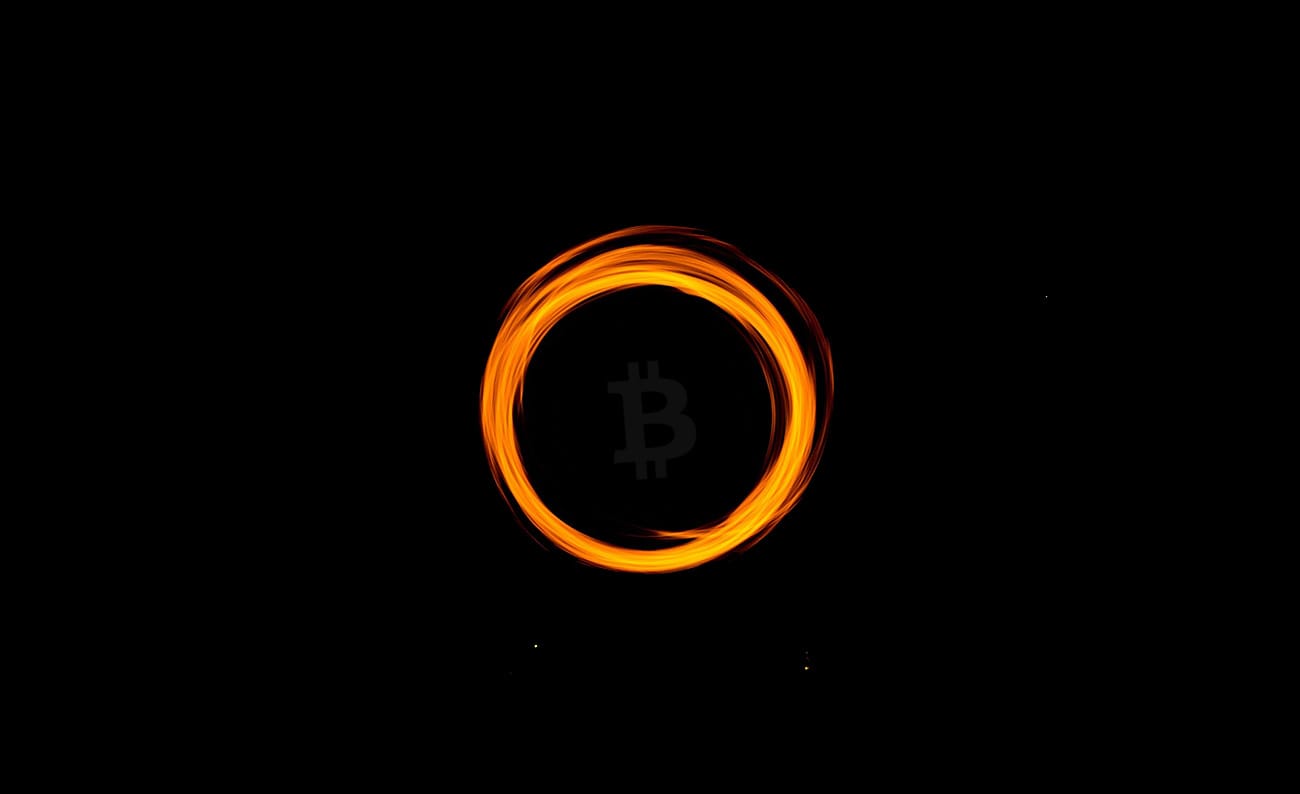
-
 @ 7f6db517:a4931eda
2025-06-01 02:01:33
@ 7f6db517:a4931eda
2025-06-01 02:01:33
The former seems to have found solid product market fit. Expect significant volume, adoption, and usage going forward.
The latter's future remains to be seen. Dependence on Tor, which has had massive reliability issues, and lack of strong privacy guarantees put it at risk.
— ODELL (@ODELL) October 27, 2022
The Basics
- Lightning is a protocol that enables cheap and fast native bitcoin transactions.
- At the core of the protocol is the ability for bitcoin users to create a payment channel with another user.
- These payment channels enable users to make many bitcoin transactions between each other with only two on-chain bitcoin transactions: the channel open transaction and the channel close transaction.
- Essentially lightning is a protocol for interoperable batched bitcoin transactions.
- It is expected that on chain bitcoin transaction fees will increase with adoption and the ability to easily batch transactions will save users significant money.
- As these lightning transactions are processed, liquidity flows from one side of a channel to the other side, on chain transactions are signed by both parties but not broadcasted to update this balance.
- Lightning is designed to be trust minimized, either party in a payment channel can close the channel at any time and their bitcoin will be settled on chain without trusting the other party.
There is no 'Lightning Network'
- Many people refer to the aggregate of all lightning channels as 'The Lightning Network' but this is a false premise.
- There are many lightning channels between many different users and funds can flow across interconnected channels as long as there is a route through peers.
- If a lightning transaction requires multiple hops it will flow through multiple interconnected channels, adjusting the balance of all channels along the route, and paying lightning transaction fees that are set by each node on the route.
Example: You have a channel with Bob. Bob has a channel with Charlie. You can pay Charlie through your channel with Bob and Bob's channel with User C.
- As a result, it is not guaranteed that every lightning user can pay every other lightning user, they must have a route of interconnected channels between sender and receiver.
Lightning in Practice
- Lightning has already found product market fit and usage as an interconnected payment protocol between large professional custodians.
- They are able to easily manage channels and liquidity between each other without trust using this interoperable protocol.
- Lightning payments between large custodians are fast and easy. End users do not have to run their own node or manage their channels and liquidity. These payments rarely fail due to professional management of custodial nodes.
- The tradeoff is one inherent to custodians and other trusted third parties. Custodial wallets can steal funds and compromise user privacy.
Sovereign Lightning
- Trusted third parties are security holes.
- Users must run their own node and manage their own channels in order to use lightning without trusting a third party. This remains the single largest friction point for sovereign lightning usage: the mental burden of actively running a lightning node and associated liquidity management.
- Bitcoin development prioritizes node accessibility so cost to self host your own node is low but if a node is run at home or office, Tor or a VPN is recommended to mask your IP address: otherwise it is visible to the entire network and represents a privacy risk.
- This privacy risk is heightened due to the potential for certain governments to go after sovereign lightning users and compel them to shutdown their nodes. If their IP Address is exposed they are easier to target.
- Fortunately the tools to run and manage nodes continue to get easier but it is important to understand that this will always be a friction point when compared to custodial services.
The Potential Fracture of Lightning
- Any lightning user can choose which users are allowed to open channels with them.
- One potential is that professional custodians only peer with other professional custodians.
- We already see nodes like those run by CashApp only have channels open with other regulated counterparties. This could be due to performance goals, liability reduction, or regulatory pressure.
- Fortunately some of their peers are connected to non-regulated parties so payments to and from sovereign lightning users are still successfully processed by CashApp but this may not always be the case going forward.
Summary
- Many people refer to the aggregate of all lightning channels as 'The Lightning Network' but this is a false premise. There is no singular 'Lightning Network' but rather many payment channels between distinct peers, some connected with each other and some not.
- Lightning as an interoperable payment protocol between professional custodians seems to have found solid product market fit. Expect significant volume, adoption, and usage going forward.
- Lightning as a robust sovereign payment protocol has yet to be battle tested. Heavy reliance on Tor, which has had massive reliability issues, the friction of active liquidity management, significant on chain fee burden for small amounts, interactivity constraints on mobile, and lack of strong privacy guarantees put it at risk.
If you have never used lightning before, use this guide to get started on your phone.
If you found this post helpful support my work with bitcoin.

-
 @ 84b0c46a:417782f5
2025-05-30 22:17:19
@ 84b0c46a:417782f5
2025-05-30 22:17:195/24 nostr:nevent1qvzqqqqqqypzpvly86xv0ekl7gar8kfp8glfztvftvwrusjsys8qexwmal3sdz6lqywhwumn8ghj7mn0wd68ytnrdakhq6tvv5kk2unjdaezumn9wsq3wamnwvaz7tmwdaehgu3wd968gctwd4hjumt9dcqs6amnwvaz7tmev9382tndv5qjqamnwvaz7tmjv4kxz7fddfczumn0wd68ytnhd9ex2erwv46zu6nsqywhwumn8ghj7un9d3shjtnwdaehgu3wwa5hyetydejhgtn2wqq3zamnwvaz7tmwveex2mrp0yhxzursqyfhwumn8ghj7am0wshxummnw3ezumn9wsqzqxk47yl7vwqu0yrv4fljymp4m2vf0gtesmel4cgg638h82rt4hdn6yyejn
nostr:nevent1qvzqqqqqqypzpvly86xv0ekl7gar8kfp8glfztvftvwrusjsys8qexwmal3sdz6lqyxhwumn8ghj77tpvf6jumt9qys8wumn8ghj7un9d3shjtt2wqhxummnw3ezuamfwfjkgmn9wshx5uqpr4mhxue69uhhyetvv9ujumn0wd68ytnhd9ex2erwv46zu6nsqyghwumn8ghj7mnxwfjkccte9eshquqpzdmhxue69uhhwmm59ehx7um5wghxuet5qqs8msrjypjuvhwaarkq72739wl5rewl49vx0ku6s3u3y03anmau5dscqjj0l
nostr:nevent1qvzqqqqqqypzqnza2du6qe3nnjy0dcgpu0kmr7awunk78m4rtl7x78rxfvay8qlwqyxhwumn8ghj77tpvf6jumt9qys8wumn8ghj7un9d3shjtt2wqhxummnw3ezuamfwfjkgmn9wshx5uqpr4mhxue69uhhyetvv9ujumn0wd68ytnhd9ex2erwv46zu6nsqyghwumn8ghj7mnxwfjkccte9eshquqpzdmhxue69uhhwmm59ehx7um5wghxuet5qqs0fzqwr2xt044zglcwcj3dnnxuk0vlcmwcw0sdzw7yhzfsn009ttss5pv6k
こていたんさんのアイコン

5/25 nostr:nevent1qvzqqqqqqypzqnza2du6qe3nnjy0dcgpu0kmr7awunk78m4rtl7x78rxfvay8qlwqyxhwumn8ghj77tpvf6jumt9qys8wumn8ghj7un9d3shjtt2wqhxummnw3ezuamfwfjkgmn9wshx5uqpr4mhxue69uhhyetvv9ujumn0wd68ytnhd9ex2erwv46zu6nsqyghwumn8ghj7mnxwfjkccte9eshquqpzdmhxue69uhhwmm59ehx7um5wghxuet5qqs0ku3qs4zskmclvtqm0lt707jwn2ylz9v2xj2qakznyp86j4p7fzqd85kfq
nostr:nevent1qvzqqqqqqypzqnza2du6qe3nnjy0dcgpu0kmr7awunk78m4rtl7x78rxfvay8qlwqyxhwumn8ghj77tpvf6jumt9qys8wumn8ghj7un9d3shjtt2wqhxummnw3ezuamfwfjkgmn9wshx5uqpr4mhxue69uhhyetvv9ujumn0wd68ytnhd9ex2erwv46zu6nsqyghwumn8ghj7mnxwfjkccte9eshquqpzdmhxue69uhhwmm59ehx7um5wghxuet5qqs8054fh3l8qtngdfpdwxfl84r36ju3f65zmhjvjy67y7gjj0mhjks2c7w80
nostr:nevent1qvzqqqqqqypzqnza2du6qe3nnjy0dcgpu0kmr7awunk78m4rtl7x78rxfvay8qlwqyxhwumn8ghj77tpvf6jumt9qys8wumn8ghj7un9d3shjtt2wqhxummnw3ezuamfwfjkgmn9wshx5uqpr4mhxue69uhhyetvv9ujumn0wd68ytnhd9ex2erwv46zu6nsqyghwumn8ghj7mnxwfjkccte9eshquqpzdmhxue69uhhwmm59ehx7um5wghxuet5qqsr8nycy3gvjfdn3rqjc49j2gwhwjdhu6d5ms6uxx7y44kzf0u2ftsc8r3c3
nostr:nevent1qvzqqqqqqypzpvly86xv0ekl7gar8kfp8glfztvftvwrusjsys8qexwmal3sdz6lqywhwumn8ghj7mn0wd68ytnrdakhq6tvv5kk2unjdaezumn9wsq3wamnwvaz7tmwdaehgu3wd968gctwd4hjumt9dcqs6amnwvaz7tmev9382tndv5qjqamnwvaz7tmjv4kxz7fddfczumn0wd68ytnhd9ex2erwv46zu6nsqywhwumn8ghj7un9d3shjtnwdaehgu3wwa5hyetydejhgtn2wqq3zamnwvaz7tmwveex2mrp0yhxzursqyfhwumn8ghj7am0wshxummnw3ezumn9wsqzpmcs4xzsusg9s6cn2acasjsam2pwmf6m8h0z08kfca56f8aqwyf2fjwv7w
nostr:nevent1qvzqqqqqqypzphu0pfjqc0lap83f8xv6e73en5zhfjzsrlx6hnk22pewugzhmpa9qqsvh305tpg0xesw6n4eu2kmumgx0mcv0cn64zznyydzpezzsazdugcyrfqm0
nostr:nevent1qvzqqqqqqypzpvly86xv0ekl7gar8kfp8glfztvftvwrusjsys8qexwmal3sdz6lqywhwumn8ghj7mn0wd68ytnrdakhq6tvv5kk2unjdaezumn9wsq3wamnwvaz7tmwdaehgu3wd968gctwd4hjumt9dcqs6amnwvaz7tmev9382tndv5qjqamnwvaz7tmjv4kxz7fddfczumn0wd68ytnhd9ex2erwv46zu6nsqywhwumn8ghj7un9d3shjtnwdaehgu3wwa5hyetydejhgtn2wqq3zamnwvaz7tmwveex2mrp0yhxzursqyfhwumn8ghj7am0wshxummnw3ezumn9wsqzq2aq2l9cq04ygjjk4tq8zfjmuezvckcav8cfqv6z745744nfd2nqlxpq04
nostr:nevent1qvzqqqqqqypzphu0pfjqc0lap83f8xv6e73en5zhfjzsrlx6hnk22pewugzhmpa9qqs05f8xz5uahsdzceq9d0mp860hck3ash8s3ssp3paxxu620tw4ufssk6ntz
nostr:nevent1qvzqqqqqqypzpvly86xv0ekl7gar8kfp8glfztvftvwrusjsys8qexwmal3sdz6lqywhwumn8ghj7mn0wd68ytnrdakhq6tvv5kk2unjdaezumn9wsq3wamnwvaz7tmwdaehgu3wd968gctwd4hjumt9dcqs6amnwvaz7tmev9382tndv5qjqamnwvaz7tmjv4kxz7fddfczumn0wd68ytnhd9ex2erwv46zu6nsqywhwumn8ghj7un9d3shjtnwdaehgu3wwa5hyetydejhgtn2wqq3zamnwvaz7tmwveex2mrp0yhxzursqyfhwumn8ghj7am0wshxummnw3ezumn9wsqzppyeyt0xt0fps85hxv4evdhgy35m9zfzhsqtnq93rsy4arnw3n853sc0u7
nostr:nevent1qvzqqqqqqypzpvly86xv0ekl7gar8kfp8glfztvftvwrusjsys8qexwmal3sdz6lqywhwumn8ghj7mn0wd68ytnrdakhq6tvv5kk2unjdaezumn9wsq3wamnwvaz7tmwdaehgu3wd968gctwd4hjumt9dcqs6amnwvaz7tmev9382tndv5qjqamnwvaz7tmjv4kxz7fddfczumn0wd68ytnhd9ex2erwv46zu6nsqywhwumn8ghj7un9d3shjtnwdaehgu3wwa5hyetydejhgtn2wqq3zamnwvaz7tmwveex2mrp0yhxzursqyfhwumn8ghj7am0wshxummnw3ezumn9wsqzq7emnt7e67h5cygnyvz922x2m4f3x30hpvns3yxls2v4t2uy0vrc6060ek
nostr:nevent1qvzqqqqqqypzplnr7nuypscwtkhtmqaakpyw4cqgtqm5klcyc6qqcmzf6296zrcfqqspu5ny2laxuqtrryffsf455fldpnluw5ladrq32cfveu6mjjgmuxsynheu3
nostr:nevent1qvzqqqqqqypzphla8l7r42mzjvdgevy0pg4y3rd8gupaprgaa7fcdzhrpaddu7lpqqsyhjuxzjkgzp5d8xt8wg8vzekcnaw6ud7htrnqppy2xmpeajrhqncs0rv4c
nostr:nevent1qvzqqqqqqypzphu0pfjqc0lap83f8xv6e73en5zhfjzsrlx6hnk22pewugzhmpa9qqswm6wxhc3h426py80vjm9jj03j8vhvrnhwmalunlxm0pq5xvxqs5qpr2kq7
nostr:nevent1qvzqqqqqqypzplnr7nuypscwtkhtmqaakpyw4cqgtqm5klcyc6qqcmzf6296zrcfqqsgehqf8cl5sp0wfw0fzl982lvhmy9j23vpus70wddtytkr4qygxlchprwv6
nostr:nevent1qvzqqqqqqypzqnza2du6qe3nnjy0dcgpu0kmr7awunk78m4rtl7x78rxfvay8qlwqqsvkrvnh8lzw4rfx87278rwxp2uymej2alputzn2nl525p85c3703cmrgkfn
nostr:nevent1qvzqqqqqqypzqnza2du6qe3nnjy0dcgpu0kmr7awunk78m4rtl7x78rxfvay8qlwqyxhwumn8ghj77tpvf6jumt9qys8wumn8ghj7un9d3shjtt2wqhxummnw3ezuamfwfjkgmn9wshx5uqpz9mhxue69uhkuenjv4kxz7fwv9c8qqgawaehxw309aex2mrp0yhxummnw3ezuamfwfjkgmn9wshx5uqpzdmhxue69uhhwmm59ehx7um5wghxuet5qqsf2u5larth503yh236mhssn2tes4shvawnv4kufzh3889cr9dt4wculcv6w
nostr:nevent1qvzqqqqqqypzqnza2du6qe3nnjy0dcgpu0kmr7awunk78m4rtl7x78rxfvay8qlwqqspnfvau4ylywwk2f7nrm68ue6c86j9p4y0cu4parfwapun0nsw97sad9jwf
nostr:nevent1qvzqqqqqqypzplnr7nuypscwtkhtmqaakpyw4cqgtqm5klcyc6qqcmzf6296zrcfqqs2y7lha9uy30wwdt9yn47s6krqv3e8duj6nqrl27e2s6dl465xssg5gt4ue
nostr:nevent1qvzqqqqqqypzplnr7nuypscwtkhtmqaakpyw4cqgtqm5klcyc6qqcmzf6296zrcfqqsyf8peg4zggp858zfha6dt4mjxss4nhc3k4szqynh0u53j22asx6sdhpfwc
nostr:nevent1qvzqqqqqqypzphla8l7r42mzjvdgevy0pg4y3rd8gupaprgaa7fcdzhrpaddu7lpqqsr0s5ger5l8aapw63yyve5sne5rge0ractks4v4l0yn3ezcvq3f4s8wthq8
nostr:nevent1qvzqqqqqqypzphu0pfjqc0lap83f8xv6e73en5zhfjzsrlx6hnk22pewugzhmpa9qqs93gfz3kskw2lcxadwu3dvanyq7xstaj39vfqmppnng0nvz5gjm8syq9p8p
nostr:nevent1qvzqqqqqqypzpvly86xv0ekl7gar8kfp8glfztvftvwrusjsys8qexwmal3sdz6lqywhwumn8ghj7mn0wd68ytnrdakhq6tvv5kk2unjdaezumn9wsq3wamnwvaz7tmwdaehgu3wd968gctwd4hjumt9dcqs6amnwvaz7tmev9382tndv5qjqamnwvaz7tmjv4kxz7fddfczumn0wd68ytnhd9ex2erwv46zu6nsqywhwumn8ghj7un9d3shjtnwdaehgu3wwa5hyetydejhgtn2wqq3zamnwvaz7tmwveex2mrp0yhxzursqyfhwumn8ghj7am0wshxummnw3ezumn9wsqzp5tlgnw663dswldulvnvgczfr08aflg35cu2syaaddmppvjytvn09tc679
nostr:nevent1qvzqqqqqqypzpe30ylfgzj39zuwyvmfdwcf26xsxdkcnv26wykwmtsrkl8nty89hqqswq489vn7h9hz2q0w60m05wn5xuqd0vvnqcxwxkewmh7h72yjtrrc6yulf2
nostr:nevent1qvzqqqqqqypzpvly86xv0ekl7gar8kfp8glfztvftvwrusjsys8qexwmal3sdz6lqywhwumn8ghj7mn0wd68ytnrdakhq6tvv5kk2unjdaezumn9wsq3wamnwvaz7tmwdaehgu3wd968gctwd4hjumt9dcqs6amnwvaz7tmev9382tndv5qjqamnwvaz7tmjv4kxz7fddfczumn0wd68ytnhd9ex2erwv46zu6nsqywhwumn8ghj7un9d3shjtnwdaehgu3wwa5hyetydejhgtn2wqq3zamnwvaz7tmwveex2mrp0yhxzursqyfhwumn8ghj7am0wshxummnw3ezumn9wsqzqzcyhx8d350shzfczewxkhxemqknfeu5z8kj0arrur9wn726k5hjayfwl6
nostr:nevent1qvzqqqqqqypzplnr7nuypscwtkhtmqaakpyw4cqgtqm5klcyc6qqcmzf6296zrcfqqsrnvmc5r2rs6jx7z8v3gvnzpkfsc3vqqxg0ygnk8wn3jmulzq887q07smq2
nostr:nevent1qvzqqqqqqypzpvly86xv0ekl7gar8kfp8glfztvftvwrusjsys8qexwmal3sdz6lqywhwumn8ghj7mn0wd68ytnrdakhq6tvv5kk2unjdaezumn9wsq3wamnwvaz7tmwdaehgu3wd968gctwd4hjumt9dcqs6amnwvaz7tmev9382tndv5qjqamnwvaz7tmjv4kxz7fddfczumn0wd68ytnhd9ex2erwv46zu6nsqywhwumn8ghj7un9d3shjtnwdaehgu3wwa5hyetydejhgtn2wqq3zamnwvaz7tmwveex2mrp0yhxzursqyfhwumn8ghj7am0wshxummnw3ezumn9wsqzqzk0lg9aq8yzg0m4dcqp5a0a468c3jmtcw058hvckt6yj0nlnl0mqfgav7
nostr:nevent1qvzqqqqqqypzpu89j3vdtkj0cec9mzs4hcmetfq5a9d6fw5smezlpyqhme90uq27qqsf4js8wu9zlp74kj5erkwsq9rvhj0d6xmynevt4tsa766nsvja04gsrfaz5
nostr:nevent1qvzqqqqqqypzpu89j3vdtkj0cec9mzs4hcmetfq5a9d6fw5smezlpyqhme90uq27qqsqky2uqkzu60f3tkcttx59q675sxmd9ypyppnd50ukmhlx3qwrqfgmmxmjh
nostr:nevent1qvzqqqqqqypzq6lj6gusf8gqyqgj2s0vzjyw3fgj9ufhqdefn8fsvljn6vdjq69hqqsvtkn6rkgmttjzzm3nn58d85eve5834pnamzhy0u4p584jger8uvgttcqhe
nostr:nevent1qvzqqqqqqypzq6mwr88y02ghe0sn5elwkszn4xesreuwexg5z0n42j2npz8dvtfmqqstua4ssqq9wejs4kjvjjs0azlzjftt6qgh8l80msn2zd8k0nxw5ccnv7p2w
nostr:nevent1qvzqqqqqqypzq6lj6gusf8gqyqgj2s0vzjyw3fgj9ufhqdefn8fsvljn6vdjq69hqqsywfl8gfpxkynq54ju27aa5rqd0mjz9lx2haqzaszelm3vhlfa5mc3n0hkj
nostr:nevent1qvzqqqqqqypzq6mwr88y02ghe0sn5elwkszn4xesreuwexg5z0n42j2npz8dvtfmqqs86az8q8zd9wevcnnw6rcrg6edc3jfzff6sza572a25yywr477s9g4yfrq0
nostr:nevent1qvzqqqqqqypzprzeywf3jcmljlsq0kks66q7vh8rtvdvuvemv20z6vlegewpxfsgqqsq47mwcs7kpylrqwkyec76839nwrk09cx33s3lwdv88e34fkx4hdqf2sa8r
nostr:nevent1qvzqqqqqqypzq6mwr88y02ghe0sn5elwkszn4xesreuwexg5z0n42j2npz8dvtfmqqsxykjsdzg9nnaweajftl4g33amcdh4wjmdq3y30w6fu555e3xpm2c2n4wah
nostr:nevent1qvzqqqqqqypzprzeywf3jcmljlsq0kks66q7vh8rtvdvuvemv20z6vlegewpxfsgqqs9cgpau6l4rfmhkwav4jsjhxjwpgehyhuw3c39q46v23q75qdjfssp3jr0k
nostr:nevent1qvzqqqqqqypzq6mwr88y02ghe0sn5elwkszn4xesreuwexg5z0n42j2npz8dvtfmqqsxrzydard7yz0cp79uk30u9g7wv0nq9sfw36e7f5tefd7z7vfezvsq7kqy4
nostr:nevent1qvzqqqqqqypzpvgsp0c85zgh8rcf2683v7s058fzspcqt0em5ednf8z9c3q5qy5fqqsghpetrx0lkxd4d79vk90h66vln5pd9lklh64sk8qa75a453g20jc3j3q9y
nostr:nevent1qvzqqqqqqypzpvgsp0c85zgh8rcf2683v7s058fzspcqt0em5ednf8z9c3q5qy5fqqsxrmm05rgdzdpthuh9zmk7jf9jmhu0jfty6kf5v8s2f8252683drgf6m79g
nostr:nevent1qvzqqqqqqypzpdc866l8lkwvncdwaqlgrsueg9tvlnm5mm2mpyg3jv8aam445rpqqqswcp6exyy0f9sgpypzlc4dx40equyxeyhwskzgeks78r9rp54w7hc05v93n
nostr:nevent1qvzqqqqqqypzpvly86xv0ekl7gar8kfp8glfztvftvwrusjsys8qexwmal3sdz6lqyxhwumn8ghj77tpvf6jumt9qys8wumn8ghj7un9d3shjtt2wqhxummnw3ezuamfwfjkgmn9wshx5uqpr4mhxue69uhhyetvv9ujumn0wd68ytnhd9ex2erwv46zu6nsqyghwumn8ghj7mnxwfjkccte9eshquqpzdmhxue69uhhwmm59ehx7um5wghxuet5qqstvk6q4xwtd7evpzggkcngqhlk5gktme0sj6235nuf0axxxngktpc88gqd7
nostr:nevent1qvzqqqqqqypzq6lj6gusf8gqyqgj2s0vzjyw3fgj9ufhqdefn8fsvljn6vdjq69hqqswfythwf02x6ekjpfdrucd6cx6su2t3uq3td45d4v0xrucfphy38cn0mmw2
nostr:nevent1qvzqqqqqqypzqu3j6ujahw4eezqm9gn2lz8av5waj9ek9fcwclfsrq5kc63zla2wqqsxpddg7lf4yqmpeg9z82flqa8fzpfcwmn4qfluvy95p03l8pjud2cfjx43u
nostr:nevent1qvzqqqqqqypzpq4np5cygstsu65vsx0ggphrv23kj4z553sh39xwyur08pqvdsqrqqsxzm8fx8aaprn533e0c44edf60lw73a6z5vzzumzd6edttgl0uawgn4kgp2
nostr:nevent1qvzqqqqqqypzpq4np5cygstsu65vsx0ggphrv23kj4z553sh39xwyur08pqvdsqrqqs88tvfyn6h8ls3h2994nmpykj2zc2l90vqwj8epzwfjnz2dy0mcjqyhsms5
nostr:nevent1qvzqqqqqqypzqt7zjsv2gxscw5l9d6k8j5agctlm6rr3rz3c6mar4eqmn69uu6c2qqsdavnxvhtlnkamt8cap09aan7mu2z364ltmeh8u747nvvj60h5jcsyf3hjz
nostr:nevent1qvzqqqqqqypzq6mwr88y02ghe0sn5elwkszn4xesreuwexg5z0n42j2npz8dvtfmqqsq86a0sr2h0p4qfesv00ztyqpdw545rsnq2nmq9quafahwxp8elhckws7wh
nostr:nevent1qvzqqqqqqypzqf4m96ldd32j6ecvsp9s6e2jv7euvc4jrcpx6mjg4jf6vpc9xz2cqqsqp3ugj5y8epkjyh62cfnm4gen27nhq055668glhgzjm87p64ep5sgqgawl
nostr:nevent1qvzqqqqqqypzqcmflwpta32zy6lsnwektdhs6ud3d3ql2mn7ml20jl0z87wr9qw6qqsfagdtz0ldem963wwelh2lc8d4qkuxlmfq0j62qwt6lrkvd8v36squ8d4k8
nostr:nevent1qvzqqqqqqypzpvj726mjcemd4uhpyutaykvsm0y54n5fzte5mhgtv46vhg8lunhfqqsgrrj849xmqpvdx6h9554gnetguxzz2ad8fqvpmvhm0zy85m4pl8swnyg5s
nostr:nevent1qvzqqqqqqypzq6lj6gusf8gqyqgj2s0vzjyw3fgj9ufhqdefn8fsvljn6vdjq69hqqs2n5mz6j5yft327mld352hazjwfrla3w92gpzuvmpgffjttsqyq6qgu5dwe
nostr:nevent1qvzqqqqqqypzq6mwr88y02ghe0sn5elwkszn4xesreuwexg5z0n42j2npz8dvtfmqqsz6wr7cnewt7t7vt4t2c28jtmppu832vs2syacv0sy8lcn28075ss277lty
nostr:nevent1qvzqqqqqqypzplnr7nuypscwtkhtmqaakpyw4cqgtqm5klcyc6qqcmzf6296zrcfqqsdrt35drfatmhl795f36em4yy7gsaasr3xkvgmdwswr7f87rcrmuc7z7kf8
nostr:nevent1qvzqqqqqqypzpvj726mjcemd4uhpyutaykvsm0y54n5fzte5mhgtv46vhg8lunhfqqsrl6c8gu74vkwa5ahlsycxjx40a3gzrx6uxm0qmpa35nrnd7ntysc4d6llh
nostr:nevent1qvzqqqqqqypzqwyu5j2hjyd3ycyn7s4q4yrcv52mtyc3m3dfg26qf4lpdutjs7pgqqsq945chuafedqk95uglwl3xumcuvjcdgz66ykd840hfsa4xpp6dgqa9vsft
nostr:nevent1qvzqqqqqqypzqf4m96ldd32j6ecvsp9s6e2jv7euvc4jrcpx6mjg4jf6vpc9xz2cqqsynxwgyy8nsu2r3dx8f37hww6keemkhh962ghq45umlxz2khemytgzv08n4
nostr:nevent1qvzqqqqqqypzqyrx5pw3ga88uye6jusg5h93w75uq8jts8c0zsms44vlfg9yw45pqyxhwumn8ghj77tpvf6jumt9qywhwumn8ghj7un9d3shjtnwdaehgu3wwa5hyetydejhgtn2wqq3vamnwvaz7tmnv4shycmg9ehx7ueww3hkgcteqqsdex6xy8kq8l64c0gq606yguaqn8fxrsyl67m6ld5cctxxwe79jpcsmxhh6
nostr:nevent1qvzqqqqqqypzpj7tpc9kqtkr4xklc62kh7lru27pydu7uyals5zuu303eqca9ef2qyt8wumn8ghj7um9v9exx6pwdehhxtn5dajxz7gpzemhxue69uhhyetvv9ujumn0wd68ytnzv9hxgqpq7gkdqqukguh3r79yfxcy9tsxpx348wqys6q8v3njfyqj4vga727sh9cfpt
5/26 nostr:nevent1qvzqqqqqqypzpq4np5cygstsu65vsx0ggphrv23kj4z553sh39xwyur08pqvdsqrqyxhwumn8ghj77tpvf6jumt9qywhwumn8ghj7un9d3shjtnwdaehgu3wwa5hyetydejhgtn2wqq3vamnwvaz7tmnv4shycmg9ehx7ueww3hkgcteqqspk6e9e9wph23lt7xumuuu90rayzcswp3gz96c3w25raq9r9agw5cnfgve5
nostr:nevent1qvzqqqqqqypzpp9sc34tdxdvxh4jeg5xgu9ctcypmvsg0n00vwfjydkrjaqh0qh4qyxhwumn8ghj77tpvf6jumt9qywhwumn8ghj7un9d3shjtnwdaehgu3wwa5hyetydejhgtn2wqq3vamnwvaz7tmnv4shycmg9ehx7ueww3hkgcteqqsfnspcp9yqu989mnnpwj9tphrrj05268vjkwwmx7jcus4mn7erqngl94f9y
nostr:nevent1qvzqqqqqqypzpp9sc34tdxdvxh4jeg5xgu9ctcypmvsg0n00vwfjydkrjaqh0qh4qyxhwumn8ghj77tpvf6jumt9qywhwumn8ghj7un9d3shjtnwdaehgu3wwa5hyetydejhgtn2wqq3vamnwvaz7tmnv4shycmg9ehx7ueww3hkgcteqqs84x0ws9myccv29kf99jkuwqh8rj9ws23kn5s9yyl0scz67m97z2g7rq7z5
nostr:nevent1qvzqqqqqqypzphu0pfjqc0lap83f8xv6e73en5zhfjzsrlx6hnk22pewugzhmpa9qyg8wumn8ghj7mn0wd68ytnhd9hx2qgkwaehxw309aek2ctjvd5zumn0wvh8gmmyv9usz9nhwden5te0wfjkccte9ehx7um5wghxyctwvsqzqk76agahvd3t5lutvkuj69pccwrurey3fws0kjnrsemwlx9ntvwukkjfk6
nostr:nevent1qvzqqqqqqypzqrqykrtju88xhdq0an0vdnccdfvrmqr8da0n8p5fs8reaczhxmpeqyxhwumn8ghj77tpvf6jumt9qywhwumn8ghj7un9d3shjtnwdaehgu3wwa5hyetydejhgtn2wqq3vamnwvaz7tmnv4shycmg9ehx7ueww3hkgcteqyt8wumn8ghj7un9d3shjtnwdaehgu3wvfskueqqyz3twtpw08v554hph0j6wpk598rd677pfa460y2pcdd2064aaevjwe74erq
nostr:nevent1qvzqqqqqqypzqx34k480waf274x2e0hd7re5nceq7z3wu5q59zp3xnp7uvv8nnn3qyxhwumn8ghj77tpvf6jumt9qywhwumn8ghj7un9d3shjtnwdaehgu3wwa5hyetydejhgtn2wqq3vamnwvaz7tmnv4shycmg9ehx7ueww3hkgcteqyt8wumn8ghj7un9d3shjtnwdaehgu3wvfskueqqyp59rw9n380w5kvdth9qefc28xsrt99l33tmfgvq02kut3dnepk6zr7ng2t
nostr:nevent1qvzqqqqqqypzplnr7nuypscwtkhtmqaakpyw4cqgtqm5klcyc6qqcmzf6296zrcfqyxhwumn8ghj77tpvf6jumt9qywhwumn8ghj7un9d3shjtnwdaehgu3wwa5hyetydejhgtn2wqq3vamnwvaz7tmnv4shycmg9ehx7ueww3hkgcteqyt8wumn8ghj7un9d3shjtnwdaehgu3wvfskueqqyq8q2qcfne76j4c9y794xz9g5unuxhf98deh3mupmnwpn33mwlxhzmxuefq
nostr:nevent1qvzqqqqqqypzpmzzcaj5rzeah8y940ln4z855wa72af4a6aac4zjypql55egcpsqqyt8wumn8ghj7um9v9exx6pwdehhxtn5dajxz7gpzemhxue69uhhyetvv9ujumn0wd68ytnzv9hxgqpqscswkz2s03r6yhz0yz40h634nkf2j2vpkvqd3vk5rl7lgaj9unns7qz3ms
nostr:nevent1qvzqqqqqqypzprfe5ru6zvakym6hq5eycwdr2vx2q8awzaaw8wu9mq4wlek8yhenqyxhwumn8ghj77tpvf6jumt9qywhwumn8ghj7un9d3shjtnwdaehgu3wwa5hyetydejhgtn2wqq3vamnwvaz7tmnv4shycmg9ehx7ueww3hkgcteqyt8wumn8ghj7un9d3shjtnwdaehgu3wvfskueqqyqr5njtg8f5xdm52p3k9mugfqk3zuc0ycsxaj6j5uf4amkrdt3ymq8kuyhj
nostr:nevent1qvzqqqqqqypzq0363fpyt2sgytq9p3pduzch6rlrp4z8e6swvzr72km83pg76qmnqyxhwumn8ghj77tpvf6jumt9qywhwumn8ghj7un9d3shjtnwdaehgu3wwa5hyetydejhgtn2wqq3vamnwvaz7tmnv4shycmg9ehx7ueww3hkgcteqyt8wumn8ghj7un9d3shjtnwdaehgu3wvfskueqqyrj0xgrrwr2meuurst5lsqn744wt6uxhfmyralknm7cl57lsapcrkunqcnn
nostr:nevent1qvzqqqqqqypzqf57dat64x3qpjq5u6ucwgvpnh0q8r9xpspepwrmvkxnqz4k6rgyqyt8wumn8ghj7un9d3shjtnwdaehgu3wvfskueqqyq2yn3cjlmns8ttaam8ev2rn3csm26wnwhe3ccvk8s5e8x6ejyykql8em9d
nostr:nevent1qvzqqqqqqypzqx34k480waf274x2e0hd7re5nceq7z3wu5q59zp3xnp7uvv8nnn3qyxhwumn8ghj77tpvf6jumt9qywhwumn8ghj7un9d3shjtnwdaehgu3wwa5hyetydejhgtn2wqq3vamnwvaz7tmnv4shycmg9ehx7ueww3hkgcteqyt8wumn8ghj7un9d3shjtnwdaehgu3wvfskueqqyqu2p8vtuwvxmzqh7mlq2lp3xel8z9l0xg5e3hyxjlwamsm0p3pvq9qh4d0
nostr:nevent1qvzqqqqqqypzpvly86xv0ekl7gar8kfp8glfztvftvwrusjsys8qexwmal3sdz6lqyxhwumn8ghj77tpvf6jumt9qys8wumn8ghj7un9d3shjtt2wqhxummnw3ezuamfwfjkgmn9wshx5uqpr4mhxue69uhhyetvv9ujumn0wd68ytnhd9ex2erwv46zu6nsqyghwumn8ghj7mnxwfjkccte9eshquqpzdmhxue69uhhwmm59ehx7um5wghxuet5qqsr9tpqqfeke4qt9xlg6m34446dpd844myrw9cc4tmqcrf3xfp9yqsxa05hf
nostr:nevent1qvzqqqqqqypzpp9sc34tdxdvxh4jeg5xgu9ctcypmvsg0n00vwfjydkrjaqh0qh4qyxhwumn8ghj77tpvf6jumt9qywhwumn8ghj7un9d3shjtnwdaehgu3wwa5hyetydejhgtn2wqq3vamnwvaz7tmnv4shycmg9ehx7ueww3hkgcteqyt8wumn8ghj7un9d3shjtnwdaehgu3wvfskueqqypyaj8uyahtgwf5evyk5deqx90udyrmxff99gqskfcl3eqh0mgmw6nlnlud
nostr:nevent1qvzqqqqqqypzpvly86xv0ekl7gar8kfp8glfztvftvwrusjsys8qexwmal3sdz6lqyxhwumn8ghj77tpvf6jumt9qys8wumn8ghj7un9d3shjtt2wqhxummnw3ezuamfwfjkgmn9wshx5uqpr4mhxue69uhhyetvv9ujumn0wd68ytnhd9ex2erwv46zu6nsqyghwumn8ghj7mnxwfjkccte9eshquqpzdmhxue69uhhwmm59ehx7um5wghxuet5qqsdpy08r0758lz0js2zpk5fe5mpqxd349mdqxg2vk3y7azlme2ysqqm8uy75
nostr:nevent1qvzqqqqqqypzpvly86xv0ekl7gar8kfp8glfztvftvwrusjsys8qexwmal3sdz6lqyxhwumn8ghj77tpvf6jumt9qys8wumn8ghj7un9d3shjtt2wqhxummnw3ezuamfwfjkgmn9wshx5uqpr4mhxue69uhhyetvv9ujumn0wd68ytnhd9ex2erwv46zu6nsqyghwumn8ghj7mnxwfjkccte9eshquqpzdmhxue69uhhwmm59ehx7um5wghxuet5qqs8s0r7c908mmhxk090zvmlajfgswwcnmwxj34dtqjpyxry0tmumagcmm29s
nostr:nevent1qvzqqqqqqypzpvly86xv0ekl7gar8kfp8glfztvftvwrusjsys8qexwmal3sdz6lqyxhwumn8ghj77tpvf6jumt9qys8wumn8ghj7un9d3shjtt2wqhxummnw3ezuamfwfjkgmn9wshx5uqpr4mhxue69uhhyetvv9ujumn0wd68ytnhd9ex2erwv46zu6nsqyghwumn8ghj7mnxwfjkccte9eshquqpzdmhxue69uhhwmm59ehx7um5wghxuet5qqs0x6pgm96r70y8836l0d5ajj6nrlq6p5fz06wdu26fkpg3gznctscf5ggxn
5/27 nostr:nevent1qvzqqqqqqypzqxlwemj4760tc2ysgqmqdu5tt68th2er6gn8xrsjkjlhvtff6gtzqyt8wumn8ghj7um9v9exx6pwdehhxtn5dajxz7gpzemhxue69uhhyetvv9ujumn0wd68ytnzv9hxgqpqlq0lp52xg7uv4wwzuqy9yhtmcpy5v8ad8v7ft9xcwkdncd97h66q0wmawu
nostr:nevent1qvzqqqqqqypzpq4np5cygstsu65vsx0ggphrv23kj4z553sh39xwyur08pqvdsqrqyt8wumn8ghj7um9v9exx6pwdehhxtn5dajxz7gpzemhxue69uhhyetvv9ujumn0wd68ytnzv9hxgqpqpt2wncdxkptxyhj025vd53vjpxz3hjs452px7y8g6gzsxmnfw2fsp2rv0k
KAZもさん nostr:nevent1qvzqqqqqqypzpvly86xv0ekl7gar8kfp8glfztvftvwrusjsys8qexwmal3sdz6lqywhwumn8ghj7mn0wd68ytnrdakhq6tvv5kk2unjdaezumn9wsq3wamnwvaz7tmwdaehgu3wd968gctwd4hjumt9dcqs6amnwvaz7tmev9382tndv5qjqamnwvaz7tmjv4kxz7fddfczumn0wd68ytnhd9ex2erwv46zu6nsqywhwumn8ghj7un9d3shjtnwdaehgu3wwa5hyetydejhgtn2wqq3zamnwvaz7tmwveex2mrp0yhxzursqyfhwumn8ghj7am0wshxummnw3ezumn9wsqzpk3nll8rr3sj6adsrfrlgjpj4cyn2sg9rmlz9m2djwk5zp2ku80czfr460
5/28 kaijiさん nostr:nevent1qvzqqqqqqypzpvly86xv0ekl7gar8kfp8glfztvftvwrusjsys8qexwmal3sdz6lqyxhwumn8ghj77tpvf6jumt9qywhwumn8ghj7mn0wd68ytnrdakhq6tvv5kk2unjdaezumn9wsqjqamnwvaz7tmjv4kxz7fddfczumn0wd68ytnhd9ex2erwv46zu6nsqywhwumn8ghj7un9d3shjtnwdaehgu3wwa5hyetydejhgtn2wqq3zamnwvaz7tmwveex2mrp0yhxzursqythwumn8ghj7mn0wd68ytnfw36xzmndduhx6etwqyfhwumn8ghj7am0wshxummnw3ezumn9wsqzpt7w33qv7tlywj0wphremkdft6dpnv3z8mvw0t2pdxcgvlzw6sathjmz0v
マルフォイ nostr:nevent1qvzqqqqqqypzpvly86xv0ekl7gar8kfp8glfztvftvwrusjsys8qexwmal3sdz6lqyw8wumn8ghj7umjw3ex2mrp0yhxxttnw3jkcmrpwghxuet5qyxhwumn8ghj77tpvf6jumt9qys8wumn8ghj7un9d3shjtt2wqhxummnw3ezuamfwfjkgmn9wshx5uqpr4mhxue69uhhyetvv9ujumn0wd68ytnhd9ex2erwv46zu6nsqyghwumn8ghj7mnxwfjkccte9eshquqpzdmhxue69uhhwmm59ehx7um5wghxuet5qqs8r0frcfwqkgpefhd0knjurekna8ztnq69432f3k00wccd0vcrl5c6qr3gh
5/29 nostr:nevent1qvzqqqqqqypzqrec47eremps2u8wvnu6f2sfjg5njhkrxuw9l6r8uzwfzy2gqq2aqyxhwumn8ghj77tpvf6jumt9qywhwumn8ghj7un9d3shjtnwdaehgu3wwa5hyetydejhgtn2wqq3vamnwvaz7tmjv4kxz7fwdehhxarj9e3xzmnyqqsp2c6xh22lfj2ccy95lqu584hfpfz0ds7w2llnf4sv2qs445yqcgqmgwq57
nostr:nevent1qvzqqqqqqypzphu0pfjqc0lap83f8xv6e73en5zhfjzsrlx6hnk22pewugzhmpa9qyt8wumn8ghj7um9v9exx6pwdehhxtn5dajxz7gpzemhxue69uhhyetvv9ujumn0wd68ytnzv9hxgqpqt43r3wtjkr5ezxay6dh7jq94nelduvsk07w5ufxrver5f6jfggksakz9e8
nostr:nevent1qvzqqqqqqypzqyqmxrhg3sn6z00x30mu3srrdr4ru05rweq4jhqcvat805v2g6j9qyxhwumn8ghj77tpvf6jumt9qywhwumn8ghj7un9d3shjtnwdaehgu3wwa5hyetydejhgtn2wqqjqamnwvaz7tmjv4kxz7fddfczumn0wd68ytnhd9ex2erwv46zu6nsqyghwumn8ghj7mnxwfjkccte9eshquqpz4mhxue69uhhyetvv9ujumt0wd68ytnsw43qzymhwden5te0wahhgtnwdaehgu3wdejhgqpqn6n7xrrmk40ucmh9m5ktae58xjqz6h7epj6mcffpcmuhgpysvv6snh5vf5
nostr:nevent1qvzqqqqqqypzpk28l9nyyf4av8f8j8jhh8k60mt2sc643ux2td3n547kvk4lrsglqyt8wumn8ghj7um9v9exx6pwdehhxtn5dajxz7gpzemhxue69uhhyetvv9ujumn0wd68ytnzv9hxgqpq6gv8avhe93ypvypd66rmn34760s3sldj3x2cz5w4yu2xy9z8tt2qadd7kl
nostr:nevent1qvzqqqqqqypzpk28l9nyyf4av8f8j8jhh8k60mt2sc643ux2td3n547kvk4lrsglqyt8wumn8ghj7um9v9exx6pwdehhxtn5dajxz7gpzemhxue69uhhyetvv9ujumn0wd68ytnzv9hxgqpqn2pfqkgcfk3cdhtvkqqlfycsy2j2xe6c6jz8gzfxlnddnq8jq6vqecuvwy
nostr:nevent1qvzqqqqqqypzpug7j8zm7jr0hjunpkpgz8gzdvgn5h8mw77g4wg58xnmsav6pvz2qqspds662qvcpz995r5rx39wzncyzcx3q5zfpe8ztgx4zdwy9znvu9cv28mya
5/30 nostr:nevent1qvzqqqqqqypzp54kkqfyshkxm078mpzygmfxpqfq6fwu2njry424strce6dmvhwyqqstc5jak2vax4uejyrmu2td3w0spv6k4mds9sfwqtvmh0hwaa3eststwmtzt
nostr:nevent1qvzqqqqqqypzp54kkqfyshkxm078mpzygmfxpqfq6fwu2njry424strce6dmvhwyqqs9v75spmgrxngfn805q5d9fsqa562a8240xkr6z3kvkszkra9plvsgm2qw4
nostr:nevent1qvzqqqqqqypzp62ezs5gz04adyt8xmyghw2ej3yk7eradlnknmuysd5ha2udqnfdqyxhwumn8ghj77tpvf6jumt9qywhwumn8ghj7un9d3shjtnwdaehgu3wwa5hyetydejhgtn2wqqjqamnwvaz7tmjv4kxz7fddfczumn0wd68ytnhd9ex2erwv46zu6nsqyghwumn8ghj7mnxwfjkccte9eshquqpzdmhxue69uhhwmm59ehx7um5wghxuet5qqswy0smsrukck33hfhavscvs68pg9m4d859np8pkgvrc49kwjzr4ac0cwhea
nostr:nevent1qvzqqqqqqypzpc9ge0t4a0lya7a63fjl749mgdv9ssz0dhqt5jnytz3y6lmy9525qyxhwumn8ghj77tpvf6jumt9qywhwumn8ghj7un9d3shjtnwdaehgu3wwa5hyetydejhgtn2wqqjqamnwvaz7tmjv4kxz7fddfczumn0wd68ytnhd9ex2erwv46zu6nsqyghwumn8ghj7mnxwfjkccte9eshquqpz4mhxue69uhhyetvv9ujumt0wd68ytnsw43qzymhwden5te0wahhgtnwdaehgu3wdejhgqpqeunx8pj5hc255wqu4ea9cgz6cptjvcx6jk8yfd8u55smjl6y8z9sepz5xt
nostr:nevent1qvzqqqqqqypzp62ezs5gz04adyt8xmyghw2ej3yk7eradlnknmuysd5ha2udqnfdqyxhwumn8ghj77tpvf6jumt9qywhwumn8ghj7un9d3shjtnwdaehgu3wwa5hyetydejhgtn2wqqjqamnwvaz7tmjv4kxz7fddfczumn0wd68ytnhd9ex2erwv46zu6nsqyghwumn8ghj7mnxwfjkccte9eshquqpzdmhxue69uhhwmm59ehx7um5wghxuet5qqst07pk8637lvs5vjnp00quzhcsx8ghran90nsm6sycnm3a626lnqqw0py8w
nostr:nevent1qvzqqqqqqypzp62ezs5gz04adyt8xmyghw2ej3yk7eradlnknmuysd5ha2udqnfdqyxhwumn8ghj77tpvf6jumt9qyw8wumn8ghj7umjw3ex2mrp0yhxxttnw3jkcmrpwghxuet5qys8wumn8ghj7un9d3shjtt2wqhxummnw3ezuamfwfjkgmn9wshx5uqpr4mhxue69uhhyetvv9ujumn0wd68ytnhd9ex2erwv46zu6nsqyghwumn8ghj7mnxwfjkccte9eshquqpzdmhxue69uhhwmm59ehx7um5wghxuet5qqsya6zp38496uetw83txlr294nttk6myuc0n7hxrl2d7jma2rvvcesnz2naf
nostr:nevent1qvzqqqqqqypzqlwpvac39uz74ay4g7qx2sa3cqrvuvjhy7899vwf40lkxfcw6uz0qyxhwumn8ghj77tpvf6jumt9qyghwumn8ghj7mnxwfjkccte9eshquqpr4mhxue69uhhyetvv9ujumn0wd68ytnhd9ex2erwv46zu6nsqys8wumn8ghj7un9d3shjtt2wqhxummnw3ezuamfwfjkgmn9wshx5uqpzdmhxue69uhhwmm59ehx7um5wghxuet5qqsz6zj33hmynuhq20nscntjc3lhx4hl5azhf0cx38g5nmhpjezuttqpdr0ht
nostr:nevent1qvzqqqqqqypzqhh27290rxjexusv8as357lpxy423nnznzfh4fjkq22k94tvqcpaqyxhwumn8ghj77tpvf6jumt9qyghwumn8ghj7u3wddhk56tjvyhxjmcqyrfpj9ym2apvgjpmcy4qjq2ks89uzuwm27d9jpj9flk7438sm23kqjetapu
nostr:nevent1qvzqqqqqqypzpuy2jdcyy3vqr4l9ucmhlpuwnsl29h7lwsvaez00eu4467jlvf7eqythwumn8ghj7mn0wd68ytnfw36xzmndduhx6etwqyxhwumn8ghj77tpvf6jumt9qys8wumn8ghj7un9d3shjtt2wqhxummnw3ezuamfwfjkgmn9wshx5uqpr4mhxue69uhhyetvv9ujumn0wd68ytnhd9ex2erwv46zu6nsqyghwumn8ghj7mnxwfjkccte9eshquqpzdmhxue69uhhwmm59ehx7um5wghxuet5qqsphe28h7t6jmwlvpd90q38xkde87hmy9q24u90sgeaz6hu6nfsazqxkfw56
-
 @ c1e6505c:02b3157e
2025-05-28 17:36:03
@ c1e6505c:02b3157e
2025-05-28 17:36:03I recently acquired a new lens:
1959 Leica Summaron F2.8 35mm LTM.
1959 Leica Summaron 35mm f2.8 LTM mounted on my Fujifilm Xpro2 with LTM adapter made by Urth.
Technically, it was a trade. I helped a fellow Bitcoiner set up their Sparrow Wallet, Nostr stuff, and troubleshoot a few wallet issues, and in return, they gave me the lens.
It all started at a local Bitcoin meetup I went to about a week ago - my second time attending. I recognized a few faces from last time, but also saw some new ones. These meetups are refreshing - it’s rare to speak a common language about something like Bitcoin or Nostr. Most people still don’t get it. But they will.
Technology moves forward. Networks grow. Old cells die off.
During the meetup, someone noticed I had my Leica M262 with me and struck up a conversation. Said they had some old Leica lenses and gear at home, and wanted to show me.
Bitcoin and photography in one conversation? I’m down.
A day or so later, they sent me a photo of one of the lenses: a vintage Summaron LTM 35mm f/2.8 from 1959. I’d never seen or heard of one before. They asked if I could help them set up Sparrow and a Bitcoin node. In exchange, they’d give me the lens. Sounded like a good deal to me. Helping plebs with their setups feels like a duty anyway. I said, of course.
They invited me over - a pretty trusting move, which I appreciated. They had some great Bitcoin memorabilia: Fred Krueger’s The Big Bitcoin Book (even if the guy’s turned full shitcoiner), and some FTX sunglasses from Bitcoin 2022. Probably future collector’s items, lol.
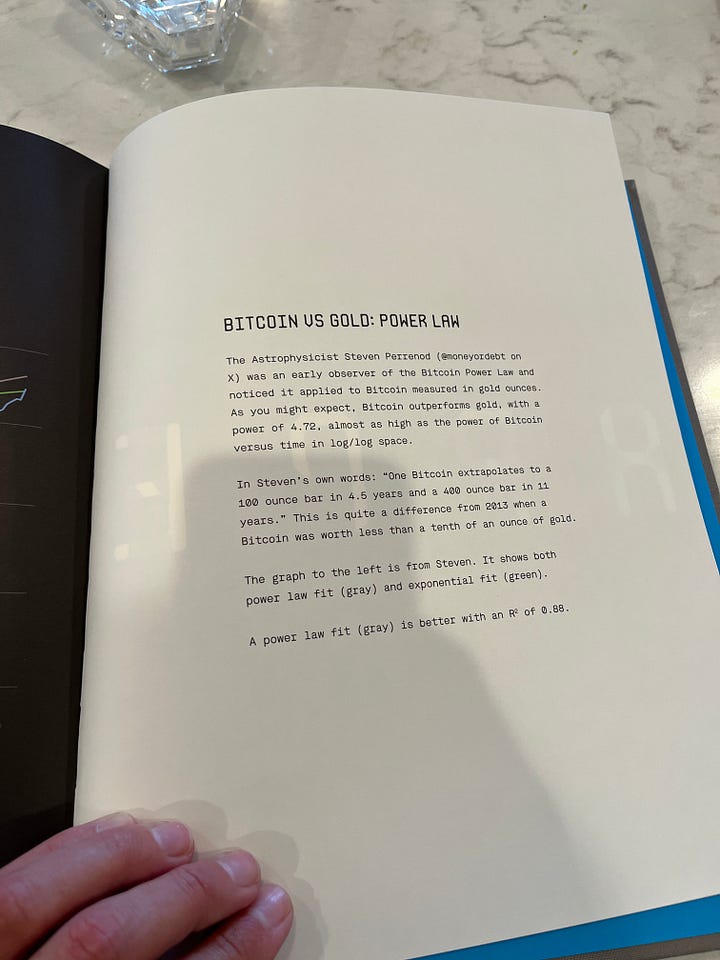
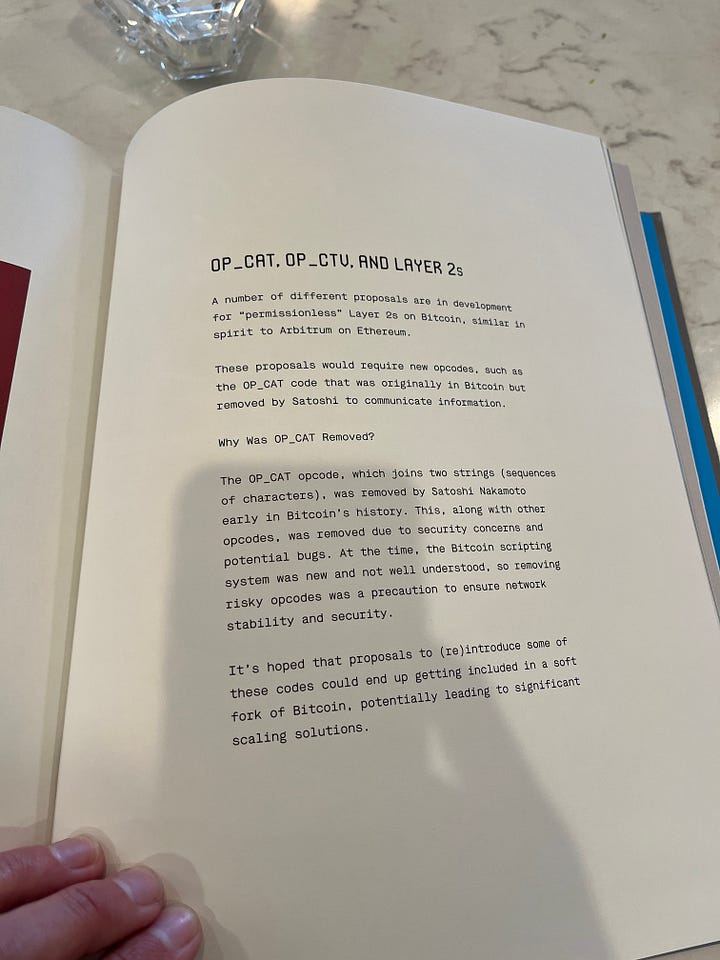
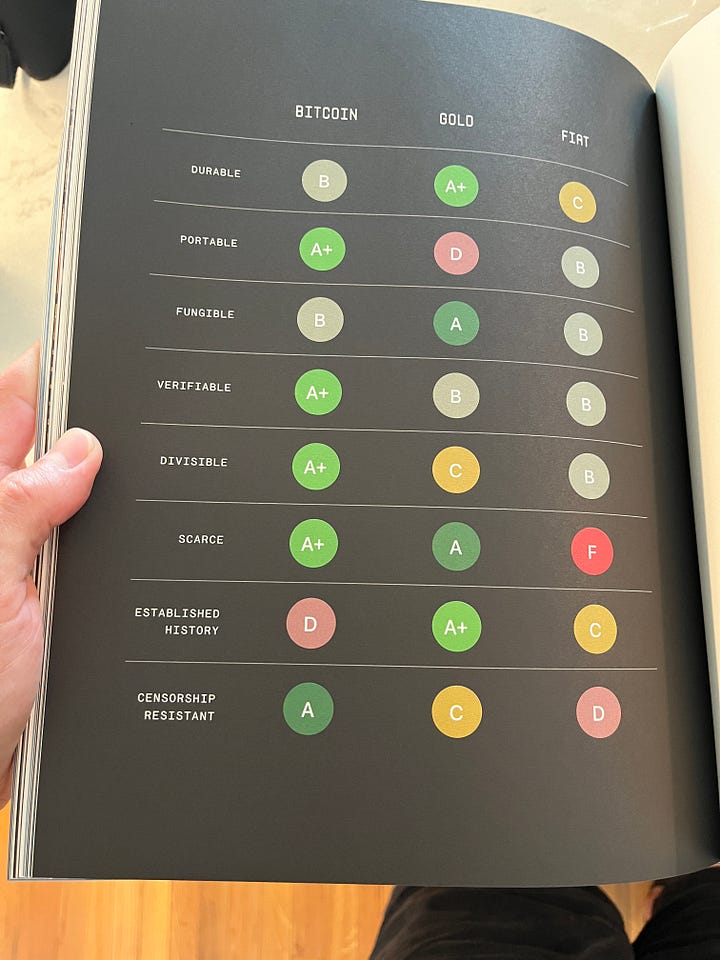
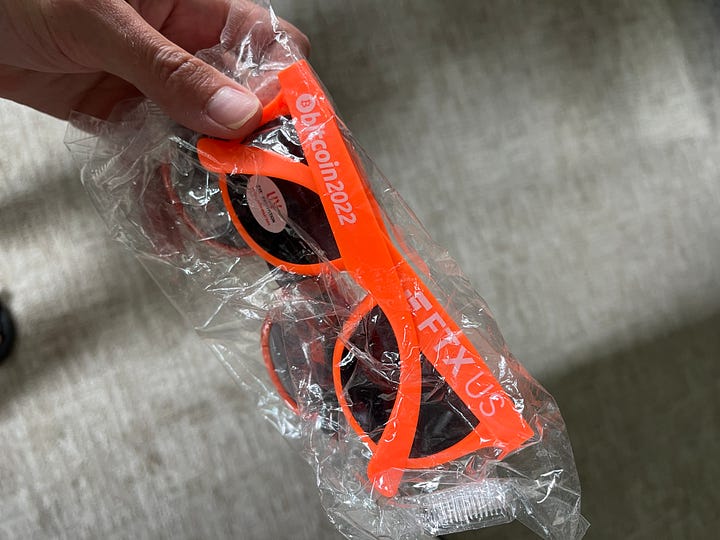
We headed upstairs to work on setting up Sparrow Wallet on their Windows machine. I verified the software download first (which you should always do), then helped them create a new wallet using their Ledger Flex. They also had an older Ledger Nano X. The Flex setup was easy, but the Nano X gave us trouble. It turns out Ledger allows multiple wallets for the same asset, which can show up differently depending on how they’re configured. In Sparrow, only one wallet showed—none of the others.
I believe it had to do with the derivation path from the Ledger. If anyone knows a fix, let me know.
After a few hours of troubleshooting, I told them I couldn’t really recommend Ledger. The UX is a mess. They’d already heard similar things from other plebs too.
I suggested switching to the Blockstream Jade. It’s a solid Bitcoin-only device from a trustworthy team. That’s what you want in a hardware wallet.
But back to the lens…
Since it’s an LTM (Leica Thread Mount), I couldn’t mount it directly on my M262. Luckily, I remembered I had an Urth adapter that fits my Fujifilm X-Pro2. I don’t use the X-Pro2 much these days—it’s mostly been sidelined by the M262 - but this was the perfect excuse to bring it out again.
To test the lens, I shot everything wide open at f/2.8. Nothing crazy fast, but it’s the best way to see a lens’s character. And this one definitely has character. There’s a subtle softness and a kind of motion blur effect around the edges when wide open. At first, I wasn’t sure how I felt about it, but the more I shot, the more I liked it. It reminds me of Winogrand’s work in Winogrand Color - those messy, shifting edges that make the frame feel alive. It also helps soften the digital-ness of the camera sensor.
The focus throw is short and snappy - much tighter than my Summicron V3 35mm f/2. I really like how fast it is to use. The closest focusing distance is about 3.5 feet, so it’s not ideal for close-ups. And with the Urth adapter on the X-Pro2, the focal length ends up closer to 40mm.
The only thing that threw me off was the infinity lock. When the focus hits infinity, it physically locks - you have to press a small tab to unlock it. I’ve seen others complain about it, so I guess it’s just one of those old lens quirks. I’m getting used to it.
All the photos here were taken around where I live in South Carolina. Some during bike rides to the river for a swim, others while walking through the marshlands.
I try to make work wherever I am. You should be able to.
It’s about the light, the rhythm, the play - and having the motivation to actually go out and shoot.
Lens rating: 7.9/10
I mainly shoot with a Leica M262, and edit in Lightroom + Dehancer
Use “PictureRoom” for 10% off Dehancer Film
If you’ve made it this far, thank you for taking the time to view my work - consider becoming a paid subscriber.
Also, please contact me if you would like to purchase any of my prints.
Follow me on Nostr:
npub1c8n9qhqzm2x3kzjm84kmdcvm96ezmn257r5xxphv3gsnjq4nz4lqelne96
-
 @ 90c656ff:9383fd4e
2025-05-31 17:54:42
@ 90c656ff:9383fd4e
2025-05-31 17:54:42Since its creation, Bitcoin has been one of the most hotly debated assets in the financial world—both by passionate supporters and skeptics. Its extreme volatility and the impact it has had on the traditional financial system have made it a constant subject of speculation. Over time, Bitcoin’s adoption has grown, sparking ongoing discussions about its future—both in terms of price and integration into the global financial system. In this context, multiple scenarios have been proposed, ranging from optimistic to cautious, depending on factors like regulation, institutional adoption, and technological innovation.
Bitcoin’s price: forecasts and influencing factors
01 - Institutional Adoption: The growing use of Bitcoin by major companies and institutional investors has been seen as a bullish driver. Companies like Tesla, MicroStrategy, and Square have added Bitcoin to their balance sheets, boosting confidence in it as a store of value. As more businesses follow suit, demand for Bitcoin could increase, pushing the price upward.
02 - Government Regulation: How governments respond to Bitcoin is one of the biggest sources of uncertainty. Heavy-handed regulation could restrict access and dampen interest, while a more favorable approach could boost adoption and support price growth. Countries like El Salvador have shown positive trends by adopting Bitcoin as legal tender, though in many others, regulation remains a significant challenge.
03 - Limited Supply: With a maximum supply of 21 million coins, Bitcoin is immune to inflationary money printing. This scarcity makes it especially attractive as a store of value, particularly during times of global economic uncertainty, potentially supporting long-term price appreciation.
04 - Technology and Scalability: Innovations like the Lightning Network and Taproot, aimed at improving scalability and transaction efficiency, could help increase Bitcoin's utility—making it more accessible for daily use and positively impacting its market value.
Global adoption of Bitcoin: The path toward financial inclusion
Bitcoin adoption is rising globally, especially in regions where traditional financial systems are inefficient or inaccessible. Countries facing economic instability, such as those plagued by high inflation or currency crises, are increasingly viewing Bitcoin as a viable alternative. Financial inclusion is a key driver of this adoption, as Bitcoin offers financial services to people excluded from the traditional banking sector.
01 - Emerging Markets: In countries like Brazil, Argentina, Nigeria, and others, demand for Bitcoin has grown as people seek to protect their assets from the devaluation of local currencies. In these regions, Bitcoin functions as both a store of value and a medium of exchange free from central authority control.
02 - Adoption by Governments and Businesses: As more companies and even governments embrace Bitcoin, its integration into the global economy could accelerate. El Salvador, for example, has shown it’s possible to adopt Bitcoin as an official currency, while more businesses are accepting it as a payment method—further legitimizing its role in global commerce.
03 - Education and Accessibility: As more people understand how Bitcoin works and appreciate its advantages—such as security, privacy, and financial freedom—adoption is likely to grow. Easier-to-use exchanges and improved wallet interfaces are making it simpler for everyday users to access and use Bitcoin.
Future scenarios: Optimism or caution?
Bitcoin's future remains uncertain, but several possible outcomes are taking shape. The optimistic scenario foresees greater price appreciation and widespread global adoption, driven by technological innovation, increased institutional trust, and the search for a decentralized alternative to the traditional financial system. In this case, Bitcoin could become a widely accepted form of payment and a global store of value, with prices reaching new all-time highs.
On the other hand, the more cautious scenario suggests that obstacles like government regulation, competition from other digital currencies, and potential technical shortcomings could prevent Bitcoin from becoming central to the financial system. Furthermore, price volatility could deter those seeking stability and security.
In summary, predictions about Bitcoin’s price and global adoption are undeniably complex and influenced by a wide range of factors. Bitcoin’s future will depend on how society, governments, and businesses respond to this new form of money. While the potential for appreciation is significant, the risks and volatility involved cannot be ignored. As global adoption increases and technology continues to evolve, it will be essential to closely monitor the developments shaping Bitcoin’s role in the global financial landscape.
Thank you very much for reading this far. I hope everything is well with you, and sending a big hug from your favorite Bitcoiner maximalist from Madeira. Long live freedom!
-
 @ a10260a2:caa23e3e
2025-05-31 23:39:05
@ a10260a2:caa23e3e
2025-05-31 23:39:05Last Updated: May 31, 2025
First off, big shoutout to Coinos for having support for adding a memo to BOLT12 offers. This provides a solid alternative for the pleb who wants to support mining decentralization but doesn’t want to set up a CLN node and pay thousands of sats for a channel only to get little rewards. This is the case for most of us who only have a miner or two (e.g. a Bitaxe and/or an S9).
Before we get into setting up Lightning payouts, you’ll want to have your miner configured to mine with OCEAN of course. You’ll also want to make sure that the bitcoin address you use is from a wallet that supports signing messages.
These are the ones listed in the OCEAN docs:
- Bitcoin Knots/Bitcoin Core
- Coldcard
- Electrum
- LND (Command Line)
- Seedsigner
- Sparrow
- Specter
- Trezor
I checked one of my favorite, user-friendly wallets — Blue Wallet — and it happens to support signing messages as well.
Just tap the three dots on the upper right and you’ll see the “Sign/Verify Message” button at the bottom.
Update [January 18]: You can now use Coinos to sign by going to https://coinos.io/sign
The trick here is to not refresh the page. In other words, when you're logged in to your Coinos account, go to the URL and use the legacy address (starts with a "1") that's displayed to configure your miner(s). If you refresh the page, you're going to get a new address which will cause the signing to fail later on. Remember, keep the tab open and don't refresh the page.

Whichever wallet you choose, generate a receive address to use when configuring your miner (it’ll also be your OCEAN username).
Here’s how it looks on the Bitaxe (AxeOS)…
And the Antminer S9 (Braiins OS).
NOTE: There’s a slight difference in the URL format between the two apps. Other than that, the username will be your bitcoin address followed by the optional “.” + the nickname for your machine.
You can find more details on OCEAN’s get started page.
Alright, now that your miner is pointed at OCEAN. Let’s configure Lightning payouts!
Generating the BOLT12 Offer
In the Coinos app, go to Receive > Bolt 12. This should be opened in another tab from the one we're using to sign the the configuration message.
Tap “Set memo” and set it to “OCEAN Payouts for [insert your bitcoin address]” (this text is case-sensitive). Use the same bitcoin address you used above to configure your miner(s).
After tapping OK, copy the BOLT12 offer (it should start with “lno”) and proceed to the next step.
Generating the Configuration Message
Navigate to the My Stats page by searching for your OCEAN Bitcoin address.
The click the Configuration link next to Next Block to access the configuration form.
Paste the BOLT12 offer here, update the block height to latest, click GENERATE, and copy the generated unsigned message.
Signing the Configuration Message
To sign the generated message, go back to Blue Wallet and use the signing function. Paste the configuration message in the Message field, tap Sign, and copy the signed message that’s generated.
If you're using Coinos to sign, return to the page that you kept open (and didn't refresh) and do the same. Paste the configuration message, click submit, and copy the signed message.
Submitting the Signed Message
Once signed, copy the signature, paste it in the OCEAN configuration form, and click CONFIRM.
If all goes well, you should see a confirmation that the configuration was successful. Congrats! 🎉
All you gotta do now is sit back, relax, and wait for a block to be found…
Or you can look into setting up DATUM. 😎
-
 @ eb0157af:77ab6c55
2025-06-01 03:01:16
@ eb0157af:77ab6c55
2025-06-01 03:01:16At Bitcoin 2025, the company unveils the Blockstream App and a strategic roadmap to accelerate adoption.
During the Bitcoin 2025 conference held in Las Vegas, Blockstream announced several updates, including a new non-custodial application and a corporate strategy structured around three operational divisions.
Introducing the Blockstream App: a new Bitcoin wallet that grows with you.
From first sats to advanced custody, it brings self-sovereignty into reach no matter where you start. Available now on Android, coming soon to iOS.
 pic.twitter.com/UBiNHKh8bO
pic.twitter.com/UBiNHKh8bO— Blockstream (@Blockstream) May 29, 2025
The new Blockstream App allows users to purchase Bitcoin directly and store it in their own wallet, eliminating the need to rely on external custodians for fund management. This technological solution is built on the infrastructure of the Blockstream Green wallet. The app supports Bitcoin, Lightning, and Liquid.
The app’s design has been conceived to meet the needs of a diverse audience, the company stated. Its interface is accessible for beginners while retaining advanced functionalities for more experienced users.
It also remains compatible with advanced security features such as hardware wallet signing and air-gapped transactions via Blockstream Jade.
Corporate strategy: consumer, enterprise, and BAM
During the event, Blockstream revealed a strategic restructuring organized into three distinct operational units. This new framework aims to strengthen the company’s position within the Bitcoin economy through tailored approaches for specific markets.
The Consumer division will focus on developing products for retail users, while the Enterprise division will manage relationships with corporate clients. Blockstream Asset Management (BAM) will serve as the company’s institutional arm, specializing in Bitcoin investment products for institutional customers.
Adam Back, CEO of Blockstream, commented:
“The past year has shown clearly that Bitcoin no longer sits on the margins of the global financial system—it is rapidly becoming the foundation. Our vision is simple: the future of finance runs on Bitcoin.”
The post Blockstream launches a non-custodial app to buy Bitcoin appeared first on Atlas21.
-
 @ 7f6db517:a4931eda
2025-06-01 02:01:33
@ 7f6db517:a4931eda
2025-06-01 02:01:33
Bank run on every crypto bank then bank run on every "real" bank.
— ODELL (@ODELL) December 14, 2022
The four main banks of bitcoin and “crypto” are Signature, Prime Trust, Silvergate, and Silicon Valley Bank. Prime Trust does not custody funds themselves but rather maintains deposit accounts at BMO Harris Bank, Cross River, Lexicon Bank, MVB Bank, and Signature Bank. Silvergate and Silicon Valley Bank have already stopped withdrawals. More banks will go down before the chaos stops. None of them have sufficient reserves to meet withdrawals.
Bitcoin gives us all the ability to opt out of a system that has massive layers of counterparty risk built in, years of cheap money and broken incentives have layered risk on top of risk throughout the entire global economy. If you thought the FTX bank run was painful to watch, I have bad news for you: every major bank in the world is fractional reserve. Bitcoin held in self custody is unique in its lack of counterparty risk, as global market chaos unwinds this will become much more obvious.
The rules of bitcoin are extremely hard to change by design. Anyone can access the network directly without a trusted third party by using their own node. Owning more bitcoin does not give you more control over the network with all participants on equal footing.
Bitcoin is:
- money that is not controlled by a company or government
- money that can be spent or saved without permission
- money that is provably scarce and should increase in purchasing power with adoptionBitcoin is money without trust. Whether you are a nation state, corporation, or an individual, you can use bitcoin to spend or save without permission. Social media will accelerate the already deteriorating trust in our institutions and as this trust continues to crumble the value of trust minimized money will become obvious. As adoption increases so should the purchasing power of bitcoin.
A quick note on "stablecoins," such as USDC - it is important to remember that they rely on trusted custodians. They have the same risk as funds held directly in bank accounts with additional counterparty risk on top. The trusted custodians can be pressured by gov, exit scam, or caught up in fraud. Funds can and will be frozen at will. This is a distinctly different trust model than bitcoin, which is a native bearer token that does not rely on any centralized entity or custodian.
Most bitcoin exchanges have exposure to these failing banks. Expect more chaos and confusion as this all unwinds. Withdraw any bitcoin to your own wallet ASAP.
Simple Self Custody Guide: https://werunbtc.com/muun
More Secure Cold Storage Guide: https://werunbtc.com/coldcard
If you found this post helpful support my work with bitcoin.

-
 @ 4c96d763:80c3ee30
2025-05-31 23:33:02
@ 4c96d763:80c3ee30
2025-05-31 23:33:02Changes
Fernando López Guevara (2):
- feat(column): add tooltip on remove column button
- feat(hashtag-column): handle new hashtag on Enter key press
pushed to notedeck:refs/heads/master
-
 @ 7f6db517:a4931eda
2025-06-01 02:01:31
@ 7f6db517:a4931eda
2025-06-01 02:01:31
Nostr is an open communication protocol that can be used to send messages across a distributed set of relays in a censorship resistant and robust way.
If you missed my nostr introduction post you can find it here. My nostr account can be found here.
We are nearly at the point that if something interesting is posted on a centralized social platform it will usually be posted by someone to nostr.
We are nearly at the point that if something interesting is posted exclusively to nostr it is cross posted by someone to various centralized social platforms.
We are nearly at the point that you can recommend a cross platform app that users can install and easily onboard without additional guides or resources.
As companies continue to build walls around their centralized platforms nostr posts will be the easiest to cross reference and verify - as companies continue to censor their users nostr is the best censorship resistant alternative - gradually then suddenly nostr will become the standard. 🫡
Current Nostr Stats
If you found this post helpful support my work with bitcoin.

-
 @ 2cde0e02:180a96b9
2025-05-31 15:06:26
@ 2cde0e02:180a96b9
2025-05-31 15:06:26https://stacker.news/items/993562
-
 @ dfa02707:41ca50e3
2025-06-01 02:01:30
@ dfa02707:41ca50e3
2025-06-01 02:01:30Contribute to keep No Bullshit Bitcoin news going.
- The latest firmware updates for COLDCARD devices introduce two major features: COLDCARD Co-sign (CCC) and Key Teleport between two COLDCARD Q devices using QR codes and/or NFC with a website.

What's new
- COLDCARD Co-Sign: When CCC is enabled, a second seed called the Spending Policy Key (Key C) is added to the device. This seed works with the device's Main Seed and one or more additional XPUBs (Backup Keys) to form 2-of-N multisig wallets.
- The spending policy functions like a hardware security module (HSM), enforcing rules such as magnitude and velocity limits, address whitelisting, and 2FA authentication to protect funds while maintaining flexibility and control, and is enforced each time the Spending Policy Key is used for signing.
- When spending conditions are met, the COLDCARD signs the partially signed bitcoin transaction (PSBT) with the Main Seed and Spending Policy Key for fund access. Once configured, the Spending Policy Key is required to view or change the policy, and violations are denied without explanation.
"You can override the spending policy at any time by signing with either a Backup Key and the Main Seed or two Backup Keys, depending on the number of keys (N) in the multisig."
-
A step-by-step guide for setting up CCC is available here.
-
Key Teleport for Q devices allows users to securely transfer sensitive data such as seed phrases (words, xprv), secure notes and passwords, and PSBTs for multisig. It uses QR codes or NFC, along with a helper website, to ensure reliable transmission, keeping your sensitive data protected throughout the process.
- For more technical details, see the protocol spec.
"After you sign a multisig PSBT, you have option to “Key Teleport” the PSBT file to any one of the other signers in the wallet. We already have a shared pubkey with them, so the process is simple and does not require any action on their part in advance. Plus, starting in this firmware release, COLDCARD can finalize multisig transactions, so the last signer can publish the signed transaction via PushTX (NFC tap) to get it on the blockchain directly."
- Multisig transactions are finalized when sufficiently signed. It streamlines the use of PushTX with multisig wallets.
- Signing artifacts re-export to various media. Users are now provided with the capability to export signing products, like transactions or PSBTs, to alternative media rather than the original source. For example, if a PSBT is received through a QR code, it can be signed and saved onto an SD card if needed.
- Multisig export files are signed now. Public keys are encoded as P2PKH address for all multisg signature exports. Learn more about it here.
- NFC export usability upgrade: NFC keeps exporting until CANCEL/X is pressed.
- Added Bitcoin Safe option to Export Wallet.
- 10% performance improvement in USB upload speed for large files.
- Q: Always choose the biggest possible display size for QR.
Fixes
- Do not allow change Main PIN to same value already used as Trick PIN, even if Trick PIN is hidden.
- Fix stuck progress bar under
Receiving...after a USB communications failure. - Showing derivation path in Address Explorer for root key (m) showed double slash (//).
- Can restore developer backup with custom password other than 12 words format.
- Virtual Disk auto mode ignores already signed PSBTs (with “-signed” in file name).
- Virtual Disk auto mode stuck on “Reading…” screen sometimes.
- Finalization of foreign inputs from partial signatures. Thanks Christian Uebber!
- Temporary seed from COLDCARD backup failed to load stored multisig wallets.
Destroy Seedalso removes all Trick PINs from SE2.Lock Down Seedrequires pressing confirm key (4) to execute.- Q only: Only BBQr is allowed to export Coldcard, Core, and pretty descriptor.
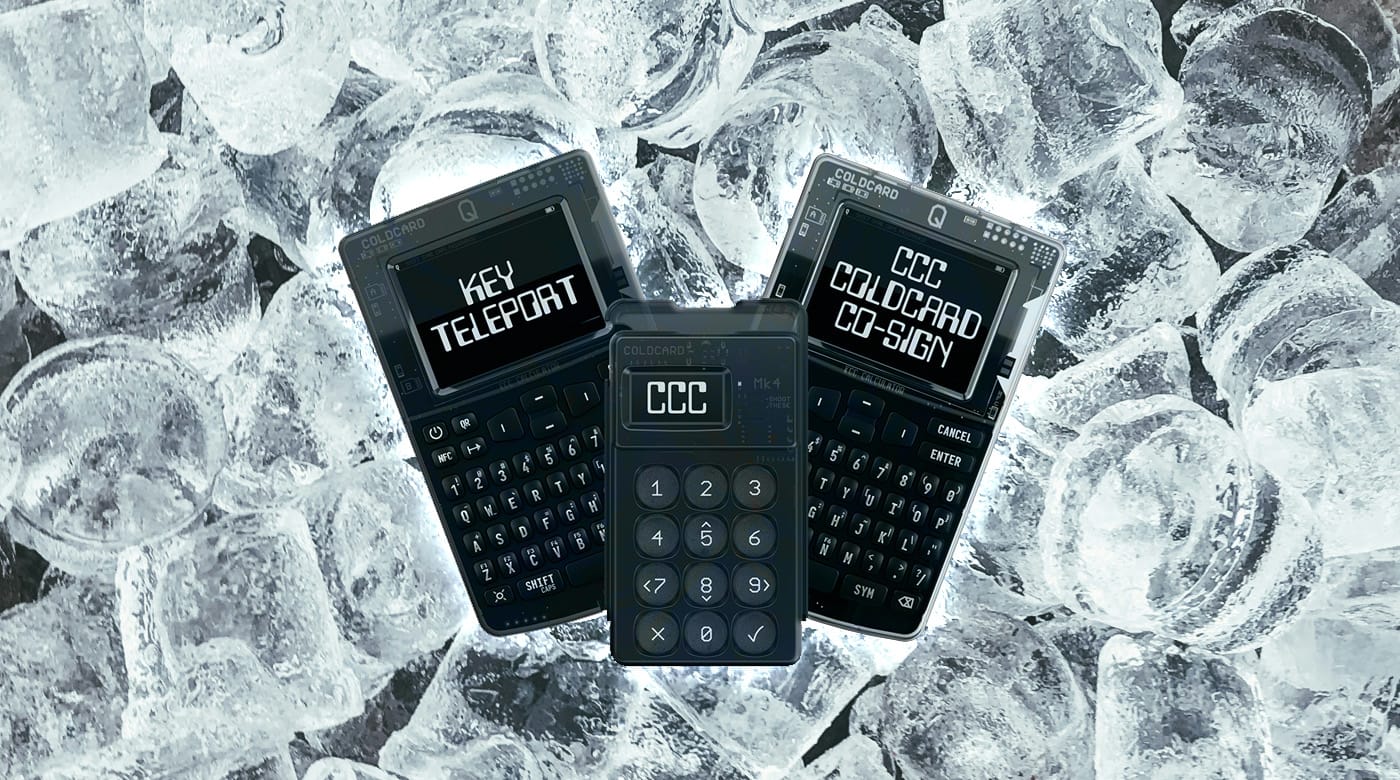
-
 @ b7274d28:c99628cb
2025-05-28 01:11:43
@ b7274d28:c99628cb
2025-05-28 01:11:43In this second installment of The Android Elite Setup tutorial series, we will cover installing the nostr:npub10r8xl2njyepcw2zwv3a6dyufj4e4ajx86hz6v4ehu4gnpupxxp7stjt2p8 on your #Android device and browsing for apps you may be interested in trying out.
Since the #Zapstore is a direct competitor to the Google Play Store, you're not going to be able to find and install it from there like you may be used to with other apps. Instead, you will need to install it directly from the developer's GitHub page. This is not a complicated process, but it is outside the normal flow of searching on the Play Store, tapping install, and you're done.
Installation
From any web browser on your Android phone, navigate to the Zapstore GitHub Releases page and the most recent version will be listed at the top of the page. The .apk file for you to download and install will be listed in the "Assets."
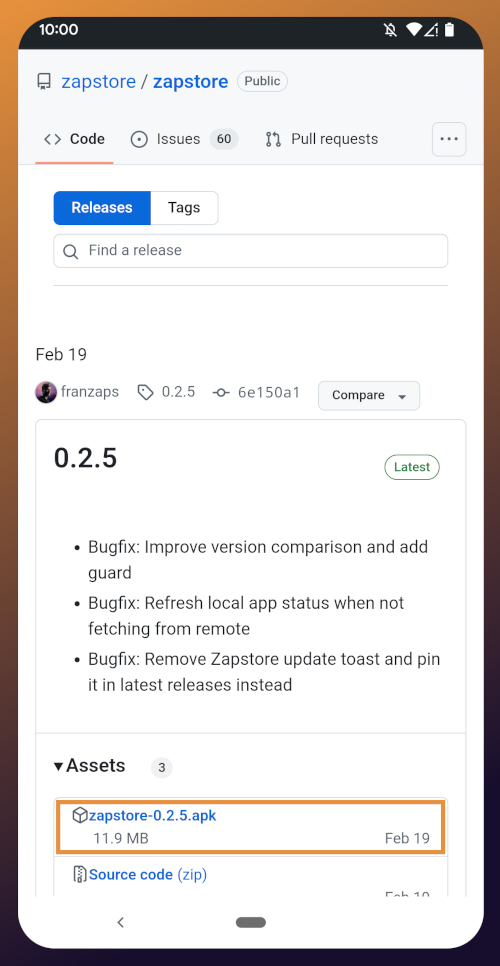
Tap the .apk to download it, and you should get a notification when the download has completed, with a prompt to open the file.
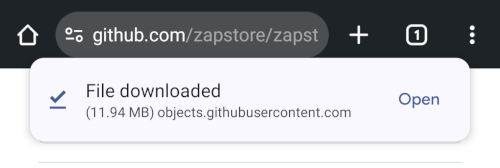
You will likely be presented with a prompt warning you that your phone currently isn't allowed to install applications from "unknown sources." Anywhere other than the Play Store is considered an "unknown source" by default. However, you can manually allow installation from unknown sources in the settings, which the prompt gives you the option to do.
In the settings page that opens, toggle it to allow installation from this source, and you should be prompted to install the application. If you aren't, simply go to your web browser's downloads and tap on the .apk file again, or go into your file browser app and you should find the .apk in your Downloads folder.
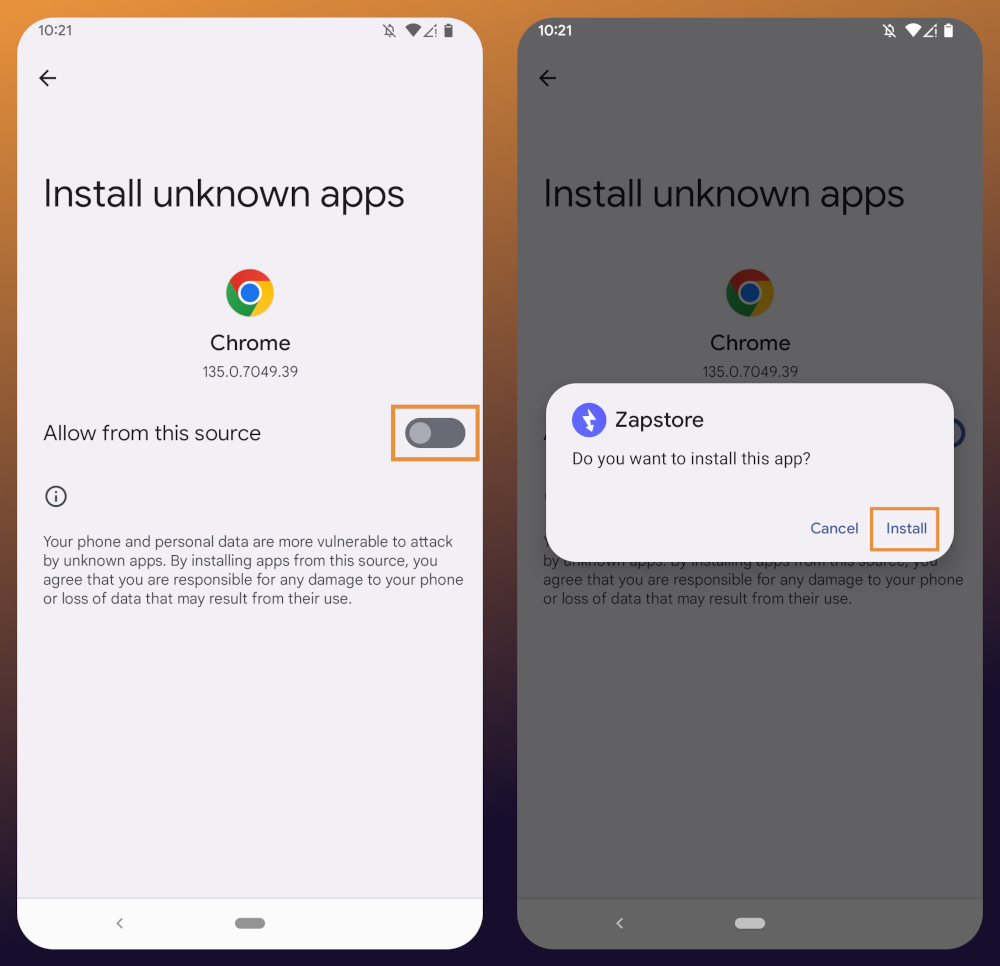
If the application doesn't open automatically after install, you will find it in your app drawer.
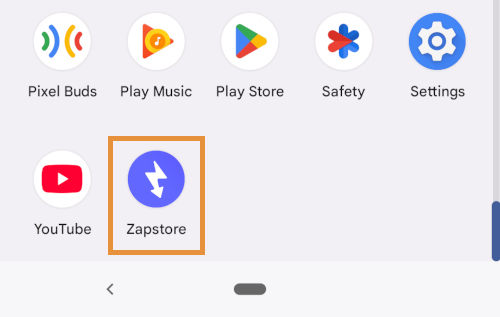
Home Page
Right at the top of the home page in the Zapstore is the search bar. You can use it to find a specific app you know is available in the Zapstore.
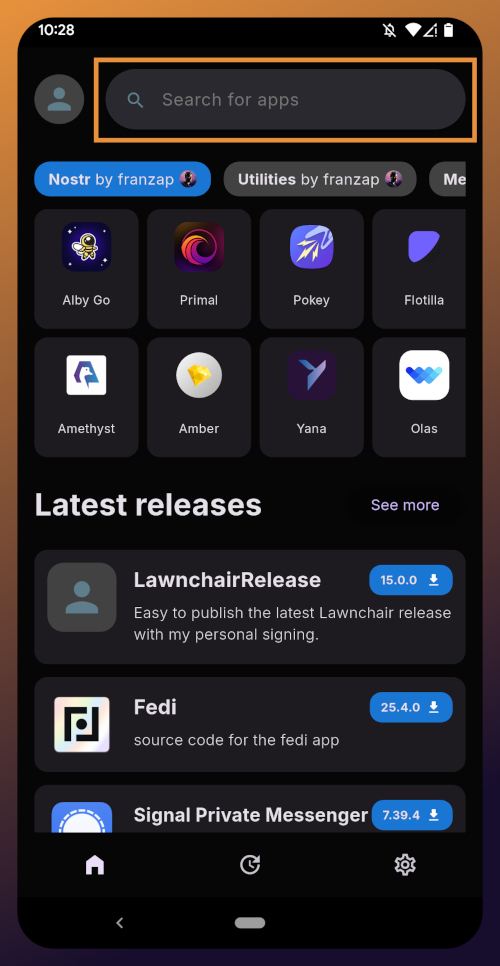
There are quite a lot of open source apps available, and more being added all the time. Most are added by the Zapstore developer, nostr:npub1wf4pufsucer5va8g9p0rj5dnhvfeh6d8w0g6eayaep5dhps6rsgs43dgh9, but some are added by the app developers themselves, especially Nostr apps. All of the applications we will be installing through the Zapstore have been added by their developers and are cryptographically signed, so you know that what you download is what the developer actually released.
The next section is for app discovery. There are curated app collections to peruse for ideas about what you may want to install. As you can see, all of the other apps we will be installing are listed in nostr:npub1wf4pufsucer5va8g9p0rj5dnhvfeh6d8w0g6eayaep5dhps6rsgs43dgh9's "Nostr" collection.
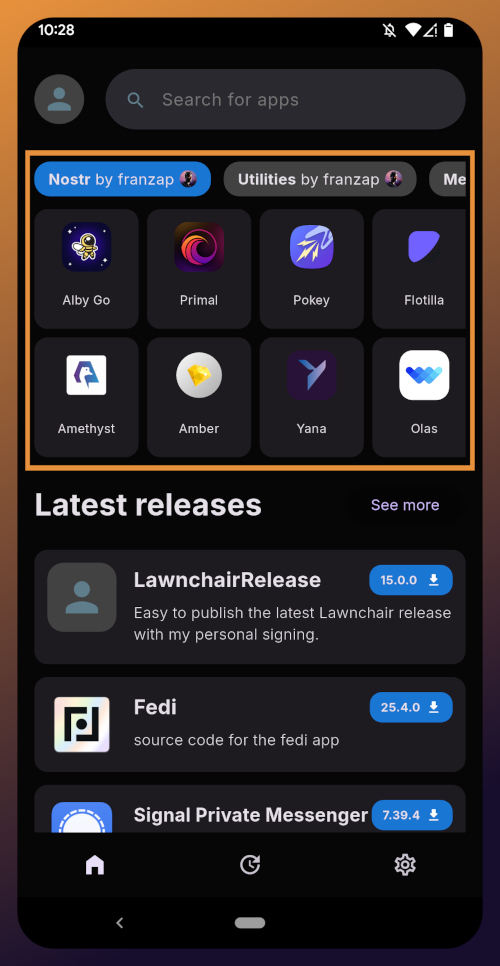
In future releases of the Zapstore, users will be able to create their own app collections.
The last section of the home page is a chronological list of the latest releases. This includes both new apps added to the Zapstore and recently updated apps. The list of recent releases on its own can be a great resource for discovering apps you may not have heard of before.
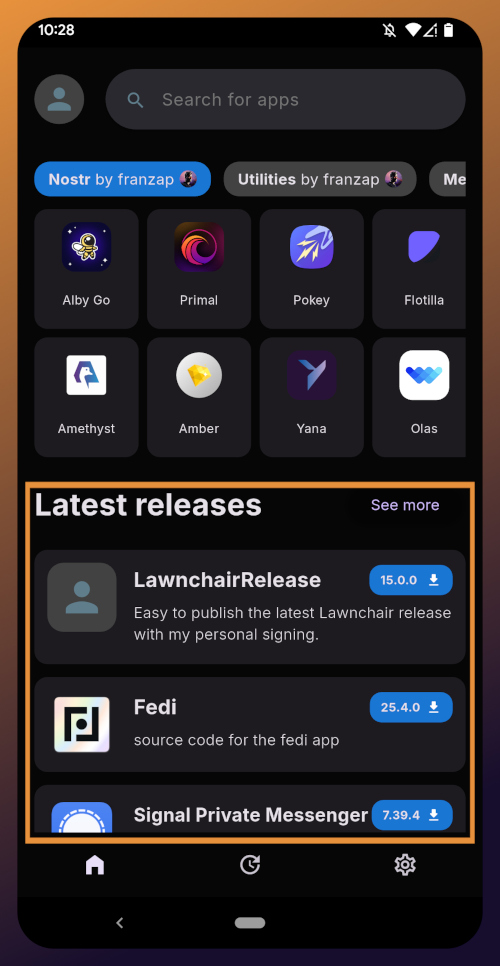
Installed Apps
The next page of the app, accessed by the icon in the bottom-center of the screen that looks like a clock with an arrow circling it, shows all apps you have installed that are available in the Zapstore. It's also where you will find apps you have previously installed that are ready to be updated. This page is pretty sparse on my test profile, since I only have the Zapstore itself installed, so here is a look at it on my main profile:
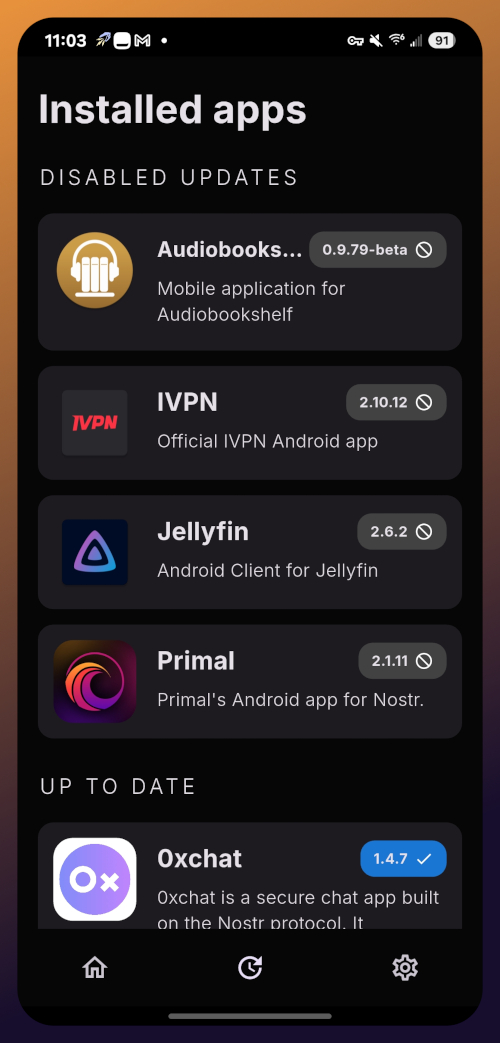
The "Disabled Apps" at the top are usually applications that were installed via the Play Store or some other means, but are also available in the Zapstore. You may be surprised to see that some of the apps you already have installed on your device are also available on the Zapstore. However, to manage their updates though the Zapstore, you would need to uninstall the app and reinstall it from the Zapstore instead. I only recommend doing this for applications that are added to the Zapstore by their developers, or you may encounter a significant delay between a new update being released for the app and when that update is available on the Zapstore.
Tap on one of your apps in the list to see whether the app is added by the developer, or by the Zapstore. This takes you to the application's page, and you may see a warning at the top if the app was not installed through the Zapstore.
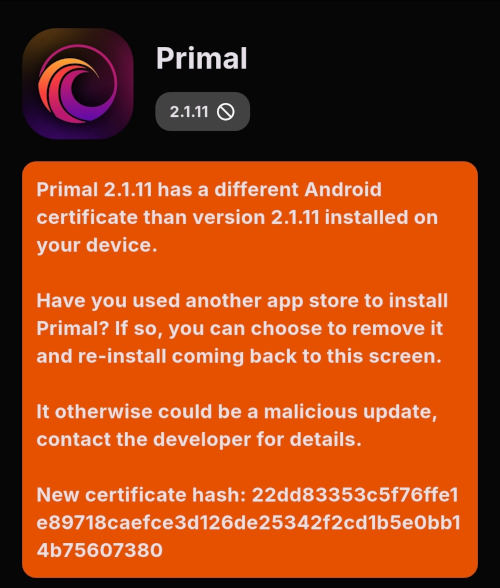
Scroll down the page a bit and you will see who signed the release that is available on the Zapstore.

In the case of Primal, even though the developer is on Nostr, they are not signing their own releases to the Zapstore yet. This means there will likely be a delay between Primal releasing an update and that update being available on the Zapstore.
Settings
The last page of the app is the settings page, found by tapping the cog at the bottom right.
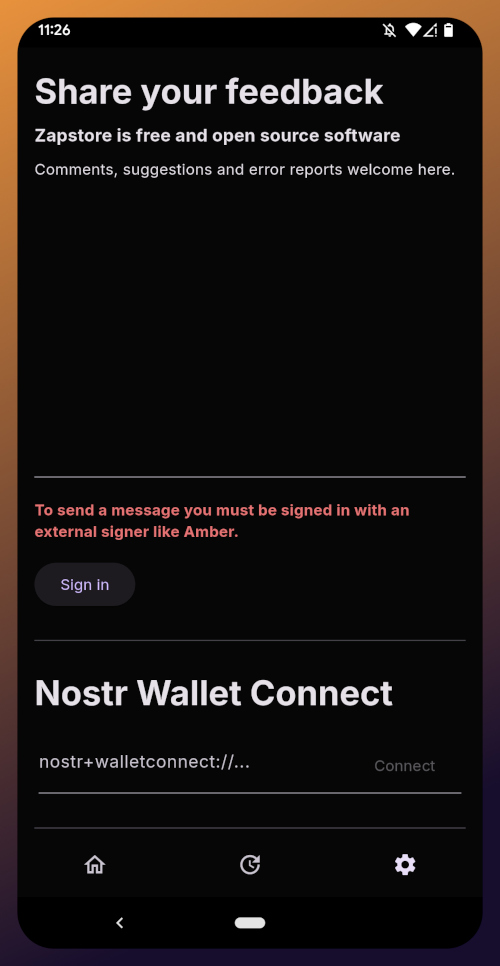
Here you can send the Zapstore developer feedback directly (if you are logged in), connect a Lightning wallet using Nostr Wallet Connect, delete your local cache, and view some system information.
We will be adding a connection to our nostr:npub1h2qfjpnxau9k7ja9qkf50043xfpfy8j5v60xsqryef64y44puwnq28w8ch wallet in part 5 of this tutorial series.
For the time being, we are all set with the Zapstore and ready for the next stage of our journey.
Continue to Part 3: Amber Signer. Nostr link: nostr:naddr1qqxnzde5xuengdeexcmnvv3eqgstwf6d9r37nqalwgxmfd9p9gclt3l0yc3jp5zuyhkfqjy6extz3jcrqsqqqa28qy2hwumn8ghj7un9d3shjtnyv9kh2uewd9hj7qg6waehxw309aex2mrp0yhxyunfva58gcn0d36zumn9wss80nug
-
 @ 90c656ff:9383fd4e
2025-05-31 17:49:25
@ 90c656ff:9383fd4e
2025-05-31 17:49:25With the growing digitalization of money, governments around the world have begun developing Central Bank Digital Currencies (CBDCs) in response to the rising popularity of Bitcoin. While Bitcoin represents a decentralized and censorship-resistant financial system, CBDCs are digital versions of fiat currencies, directly controlled by central banks. This emerging competition could shape the future of money and define the balance between financial freedom and state control.
Key differences between Bitcoin and CBDCs
Bitcoin and CBDCs differ in nearly every fundamental aspect:
01 - Centralization vs Decentralization: Bitcoin operates on a decentralized network where no government or entity can change the rules or censor transactions. CBDCs, on the other hand, are issued and managed by central banks, enabling greater control over the circulation and use of money.
02 - Fixed Supply vs Controlled Inflation: Bitcoin has a fixed supply of 21 million units, making it a scarce and deflationary asset. CBDCs can be issued without limits, much like traditional fiat currencies, and are subject to inflationary monetary policies.
03 - Privacy vs Surveillance: Bitcoin allows pseudonymous transactions, ensuring a certain degree of financial privacy. CBDCs may be designed to track every transaction, enabling full governmental oversight—and potentially, control over how citizens spend their money.
04 - Censorship Resistance vs State Control: Bitcoin enables anyone to transact without needing third-party approval. CBDCs, being centralized, could be used by governments to restrict undesirable transactions or even freeze funds at the press of a button.
What are governments aiming for with CBDCs?
The introduction of CBDCs is often promoted with benefits such as:
01 - Greater efficiency in financial transactions by removing intermediaries and reducing banking costs.
02 - Easier implementation of economic policies, such as direct stimulus payments or automated taxation.
03 - Enhanced ability to combat illegal activities through real-time transaction tracking.
However, these justifications raise serious concerns about the erosion of financial privacy and the expansion of government power over the monetary system.
Bitcoin as an alternative to CBDCs
The rise of CBDCs may, in fact, reinforce Bitcoin’s position as the true alternative to state-controlled money. As citizens become aware of the risks associated with a fully centralized financial system, demand for a decentralized, censorship-resistant asset like Bitcoin may increase.
01 - Protection from state control: Bitcoin empowers users with full sovereignty over their money, free from arbitrary freezes or confiscations.
02 - Preservation of financial privacy: Unlike CBDCs, which may monitor every transaction, Bitcoin offers a level of anonymity that shields individuals from excessive surveillance.
03 - Store of value against inflation: While governments can endlessly issue CBDCs, Bitcoin’s guaranteed scarcity positions it as a hedge against irresponsible monetary policy.
In summary, the competition between Bitcoin and CBDCs is set to become one of the defining financial battles of the future. As governments seek to reinforce their control through centralized digital currencies, Bitcoin remains the leading option for those who value financial independence and protection from state surveillance. The choice between a free, decentralized financial system and a monitored, government-controlled one may determine the course of the digital economy for decades to come.
Thank you very much for reading this far. I hope everything is well with you, and sending a big hug from your favorite Bitcoiner maximalist from Madeira. Long live freedom!
-
 @ b7274d28:c99628cb
2025-05-28 00:59:49
@ b7274d28:c99628cb
2025-05-28 00:59:49Your identity is important to you, right? While impersonation can be seen in some senses as a form of flattery, we all would prefer to be the only person capable of representing ourselves online, unless we intentionally delegate that privilege to someone else and maintain the ability to revoke it.
Amber does all of that for you in the context of #Nostr. It minimizes the possibility of your private key being compromized by acting as the only app with access to it, while all other Nostr apps send requests to Amber when they need something signed. This even allows you to give someone temporary authority to post as you without giving them your private key, and you retain the authority to revoke their permissions at any time.
nostr:npub1w4uswmv6lu9yel005l3qgheysmr7tk9uvwluddznju3nuxalevvs2d0jr5 has provided Android users with an incredibly powerful tool in Amber, and he continues to improve its functionality and ease of use. Indeed, there is not currently a comparative app available for iOS users. For the time being, this superpower is exclusive to Android.
Installation
Open up the Zapstore app that you installed in the previous stage of this tutorial series.
Very likely, Amber will be listed in the app collection section of the home page. If it is not, just search for "Amber" in the search bar.
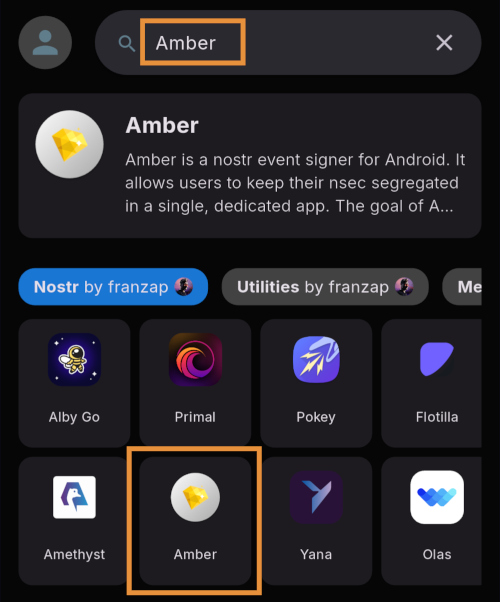
Opening the app's page in the Zapstore shows that the release is signed by the developer. You can also see who has added this app to one of their collections and who has supported this app with sats by zapping the release.
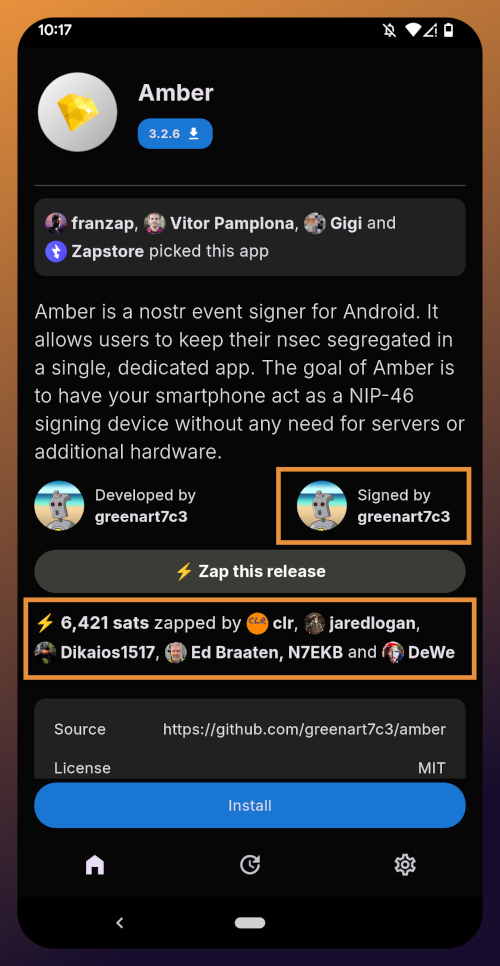
Tap "Install" and you will be prompted to confirm you are sure you want to install Amber.
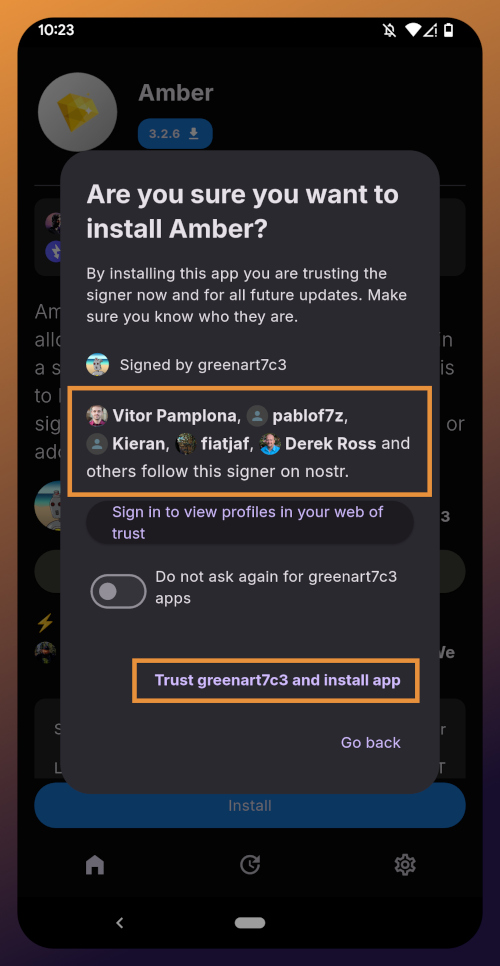
Helpfully, you are informed that several other users follow this developer on Nostr. If you have been on Nostr a while, you will likely recognize these gentlemen as other Nostr developers, one of them being the original creator of the protocol.
You can choose to never have Zapstore ask for confirmation again with apps developed by nostr:npub1w4uswmv6lu9yel005l3qgheysmr7tk9uvwluddznju3nuxalevvs2d0jr5, and since we have another of his apps to install later in this tutorial series, I recommend you toggle this on. Then tap on "Trust greenart7c3 and install app."
Just like when you installed the Zapstore from their GitHub, you will be prompted to allow the Zapstore to install apps, since Android considers it an "unknown source."
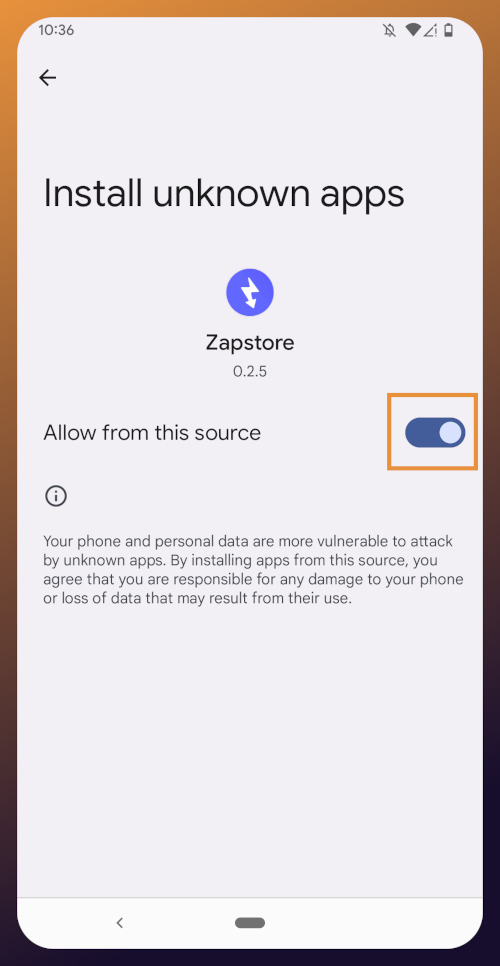
Once you toggle this on and use the back button to get back to the Zapstore, Amber will begin downloading and then present a prompt to install the app. Once installed, you will see a prompt that installation was a success and you can now open the app.
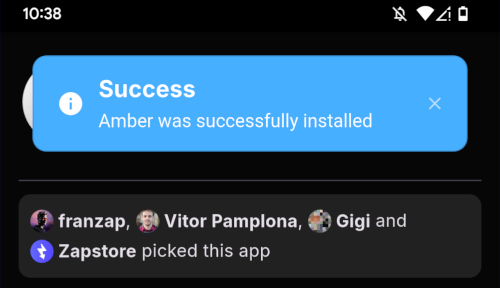
From here, how you proceed will depend on whether you need to set up a new Nostr identity or use Amber with an existing private key you already have set up. The next section will cover setting up a new Nostr identity with Amber. Skip to the section titled "Existing Nostrich" if you already have an nsec that you would like to use with Amber.
New Nostrich
Upon opening the application, you will be presented with the option to use an existing private key or create a new Nostr account. Nostr doesn't really have "accounts" in the traditional sense of the term. Accounts are a relic of permissioned systems. What you have on Nostr are keys, but Amber uses the "account" term because it is a more familiar concept, though it is technically inaccurate.

Choose "Create a new Nostr account" and you will be presented with a screen telling you that your Nostr account is ready. Yes, it was really that easy. No email, no real name, no date of birth, and no annoying capcha. Just "Create a new account" and you're done.
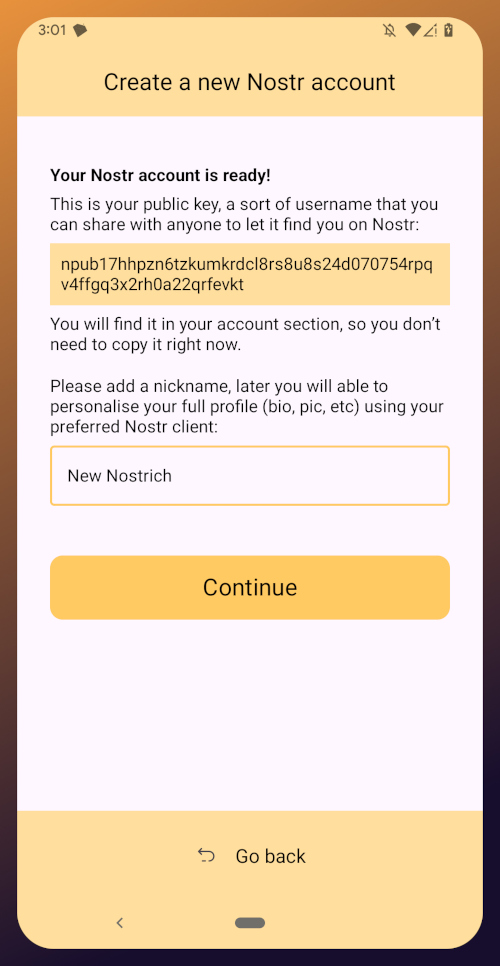
The app presents you with your public key. This is like an address that can be used to find your posts on Nostr. It is 100% unique to you, and no one else can post a note that lists this npub as the author, because they won't have the corresponding private key. You don't need to remember your npub, though. You'll be able to readily copy it from any Nostr app you use whenever you need it.
You will also be prompted to add a nickname. This is just for use within Amber, since you can set up multiple profiles within the app. You can use anything you want here, as it is just so you can tell which profile is which when switching between them in Amber.
Once you've set your nickname, tap on "Continue."
The next screen will ask you what Amber's default signing policy should be.

The default is to approve basic actions, referring to things that are common for Nostr clients to request a signature for, like following another user, liking a post, making a new post, or replying. If you are more concerned about what Amber might be signing for on your behalf, you can tell it to require manual approval for each app.
Once you've made your decision, tap "Finish." You will also be able to change this selection in the app settings at any time.
With this setup out of the way, you are now presented with the main "Applications" page of the app.
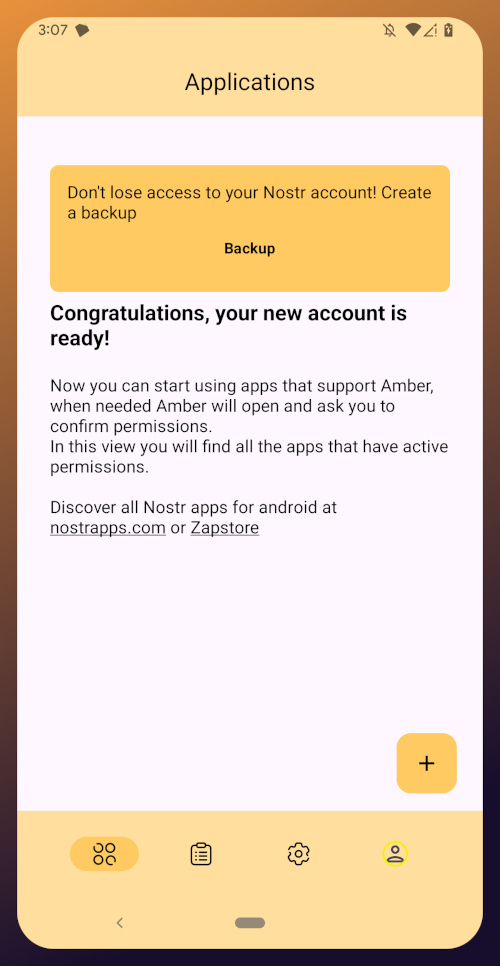
At the top, you have a notification encouraging you to create a backup. Let's get that taken care of now by tapping on the notification and skipping down to the heading titled "Backing Up Your Identity" in this tutorial.
Existing Nostrich
Upon opening the application, you will be presented with the option to use your private key or create a new Nostr account. Choose the former.

The next screen will require you to paste your private key.

You will need to obtain this from whatever Nostr app you used to create your profile, or any other Nostr app that you pasted your nsec into in the past. Typically you can find it in the app settings and there will be a section mentioning your keys where you can copy your nsec. For instance, in Primal go to Settings > Keys > Copy private key, and on Amethyst open the side panel by tapping on your profile picture in the top-left, then Backup Keys > Copy my secret key.
After pasting your nsec into Amber, tap "Next."

Amber will give you a couple options for a default signing policy. The default is to approve basic actions, referring to things that are common for Nostr clients to request a signature for, like following another user, liking a post, making a new post, or replying. If you are more concerned about what Amber might be signing for on your behalf, you can tell it to require manual approval for each app.
Once you've made your decision, tap "Finish." You will also be able to change this selection in the app settings at any time.

With this setup out of the way, you are now presented with the main "Applications" page of the app. You have nothing here yet, since you haven't used Amber to log into any Nostr apps, but this will be where all of the apps you have connected with Amber will be listed, in the order of the most recently used at the top.
Before we go and use Amber to log into an app, though, let's make sure we've created a backup of our private key. You pasted your nsec into Amber, so you could just save that somewhere safe, but Amber gives you a few other options as well. To find them, you'll need to tap the cog icon at the bottom of the screen to access the settings, then select "Backup Keys."
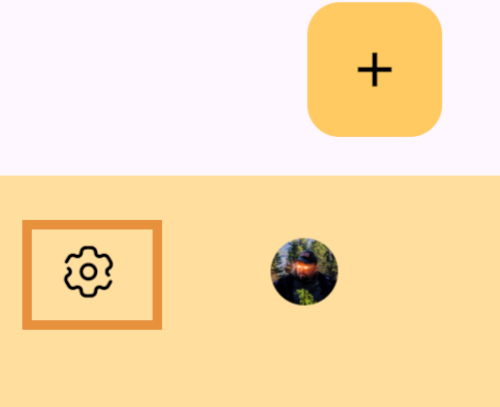
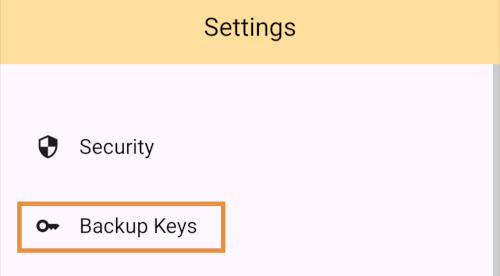
Backing Up Your Identity
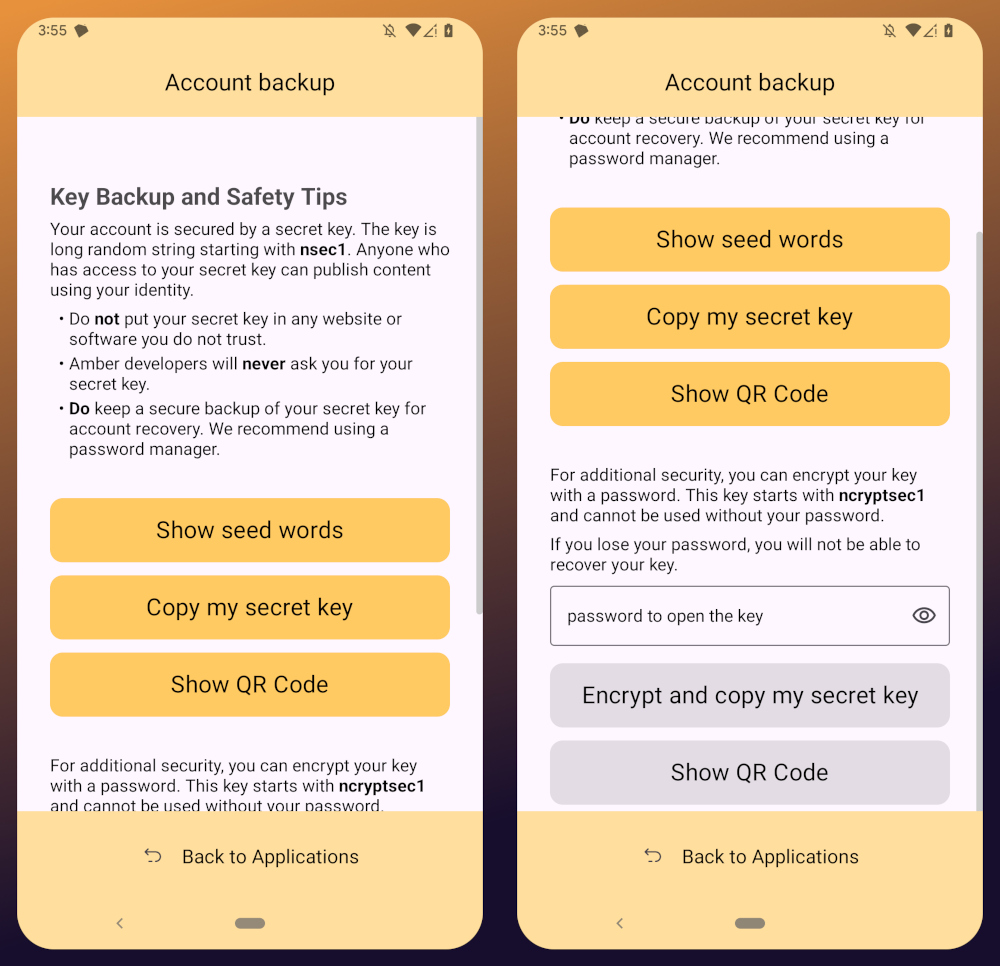
You'll notice that Amber has a few different options for backing up your private key that it can generate.
First, it can give you seed words, just like a Bitcoin seed. If you choose that option, you'll be presented with 12 words you can record somewhere safe. To recover your Nostr private key, you just have to type those words into a compatible application, such as Amber.
The next option is to just copy the secret/private key in its standard form as an "nsec." This is the least secure way to store it, but is also the most convenient, since it is simple to paste into another signer application. If you want to be able to log in on a desktop web app, the browser extension Nostr signers won't necessarily support entering your 12 word seed phrase, but they absolutely will support pasting in your nsec.
You can also display a QR code of your private key. This can be scanned by Amber signer on another device for easily transferring your private key to other devices you want to use it on. Say you have an Android tablet in addition to your phone, for instance. Just make sure you only use this function where you can be certain that no one will be able to get a photograph of that QR code. Once someone else has your nsec, there is no way to recover it. You have to start all over on Nostr. Not a big deal at this point in your journey if you just created a Nostr account, but if you have been using Nostr for a while and have built up a decent amount of reputation, it could be much more costly to start over again.
The next options are a bit more secure, because they require a password that will be used to encrypt your private key. This has some distinct advantages, and a couple disadvantages to be aware of. Using a password to encrypt your private key will give you what is called an ncryptsec, and if this is leaked somehow, whoever has it will not necessarily have access to post as you on Nostr, the way they would if your nsec had been leaked. At least, not so long as they don't also have your password. This means you can store your ncryptsec in multiple locations without much fear that it will be compromised, so long as the password you used to encrypt it was a strong and unique one, and it isn't stored in the same location. Some Nostr apps support an ncryptsec for login directly, meaning that you have the option to paste in your ncryptsec and then just log in with the password you used to encrypt it from there on out. However, now you will need to keep track of both your ncryptsec and your password, storing both of them safely and separately. Additionally, most Nostr clients and signer applications do not support using an ncryptsec, so you will need to convert it back to a standard nsec (or copy the nsec from Amber) to use those apps.
The QR option using an ncryptsec is actually quite useful, though, and I would go this route when trying to set up Amber on additional devices, since anyone possibly getting a picture of the QR code is still not going to be able to do anything with it, unless they also get the password you used to encrypt it.
All of the above options will require you to enter the PIN you set up for your device, or biometric authentication, just as an additional precaution before displaying your private key to you.
As for what "store it in a safe place" looks like, I highly recommend a self-hosted password manager, such as Vaultwarden+Bitwarden or KeePass. If you really want to get wild, you can store it on a hardware signing device, or on a steel seed plate.
Additional Settings
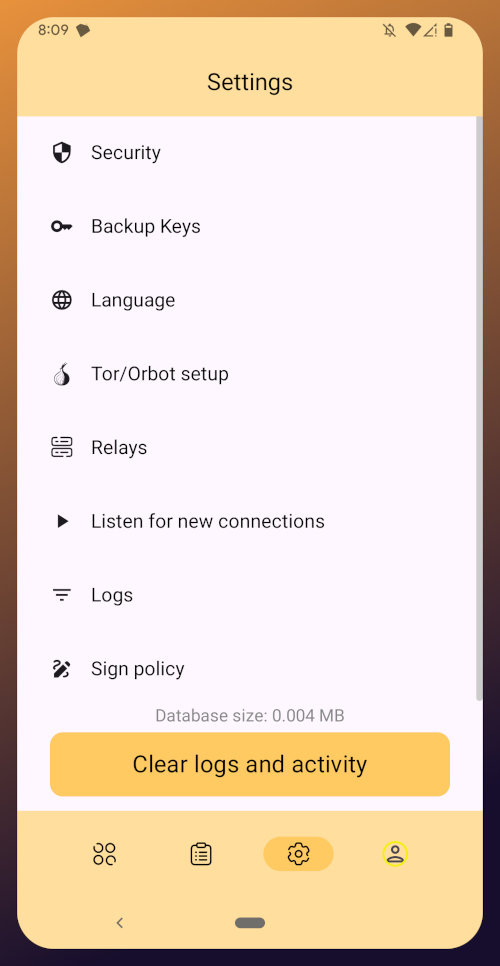
Amber has some additional settings you may want to take advantage of. First off, if you don't want just anyone who has access to your phone to be able to approve signing requests, you can go into the Security settings add a PIN or enable biometrics for signing requests. If you enable the PIN, it will be separate from the PIN you use to access your phone, so you can let someone else use your phone, like your child who is always begging to play a mobile game you have installed, without worrying that they might have access to your Nostr key to post on Amethyst.
Amber also has some relay settings. First are the "Active relays" which are used for signing requests sent to Amber remotely from Nostr web apps. This is what enables you to use Amber on your phone to log into Nostr applications on your desktop web browser, such as Jumble.social, Coracle.social, or Nostrudel.ninja, eliminating your need to use any other application to store your nsec whatsoever. You can leave this relay as the default, or you can add other relays you want to use for signing requests. Just be aware, not all relays will accept the notes that are used for Nostr signing requests, so make sure that the relay you want to use does so. In fact, Amber will make sure of this for you when you type in the relay address.
The next type of relays that you can configure in Amber are the "Default profile relays." These are used for reading your profile information. If you already had a Nostr identity that you imported to Amber, you probably noticed it loaded your profile picture and display name, setting the latter as your nickname in Amber. These relays are where Amber got that information from. The defaults are relay.nostr.band and purplepag.es. The reason for this is because they are aggregators that look for Nostr profiles that have been saved to other relays on the network and pull them in. Therefore, no matter what other relay you may save your profile to, Amber will likely be able to find it on one of those two relays as well. If you have a relay you know you will be saving your Nostr profiles to, you may want to add it to this list.
You can also set up Amber to be paired with Orbot for signing over Tor using relays that are only accessible via the Tor network. That is an advanced feature, though, and well beyond the scope of this tutorial.
Finally, you can update the default signing policy. Maybe after using Amber for a while, you've decided that the choice you made before was too strict or too lenient. You can change it to suit your needs.
Zapstore Login
Now that you are all set up with Amber, let's get you signed into your first Nostr app by going back to the Zapstore.
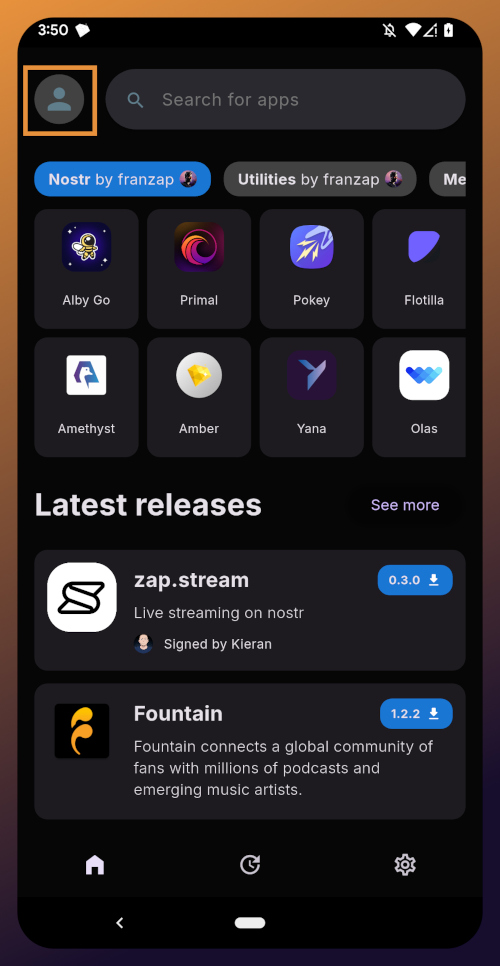
From the app's home screen, tap on the user icon in the upper left of the screen. This will open a side panel with not much on it except the option to "sign in." Go ahead and tap on it.
You will be presented with the option to either sign in with Amber, or to paste your npub. However, if you do the latter, you will only have read access, meaning you cannot zap any of the app releases. There are other features planned for the Zapstore that may also require you to be signed in with write access, so go ahead and choose to log in with Amber.
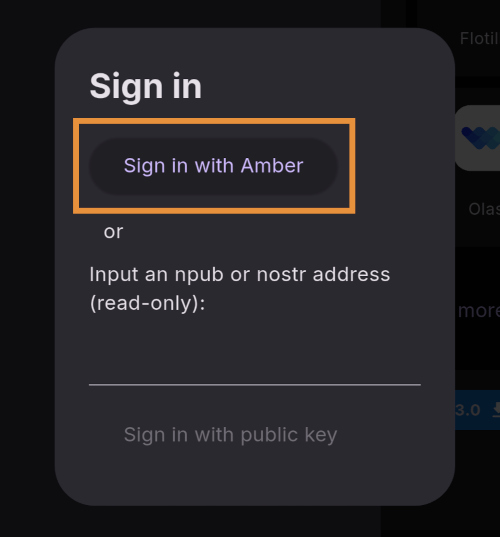
Your phone should automatically switch to Amber to approve the sign-in request.

You can choose to only approve basic actions for Zapstore, require it to manually approve every time, or you can tell it that you "fully trust this application." Only choose the latter option with apps you have used for a while and they have never asked you to sign for anything suspicious. For the time being, I suggest you use the "Approve basic actions" option and tap "Grant Permissions."
Your phone will switch back to the Zapstore and will show that you are now signed in. Congratulations! From here on out, logging into most Nostr applications will be as easy as tapping on "Log in with Amber" and approving the request.

If you set up a new profile, it will just show a truncated version of your npub rather than the nickname you set up earlier. That's fine. You'll have an opportunity to update your Nostr profile in the next tutorial in this series and ensure that it is spread far and wide in the network, so the Zapstore will easily find it.
That concludes the tutorial for Amber. While we have not covered using Amber to log into Nostr web apps, that is outside the scope of this series, and I will cover it in an upcoming tutorial regarding using Amber's remote signer options in detail.
Since you're already hanging out in the Zapstore, you may as well stick around, because we will be using it right out the gate in the next part of this series: Amethyst Installation and Setup. (Coming Soon)
-
 @ 6a6be47b:3e74e3e1
2025-05-31 12:18:17
@ 6a6be47b:3e74e3e1
2025-05-31 12:18:17Hi frens! 🦖
📖 How’s your weekend starting out? I’ve been painting and reading, and I’m super excited to share that I finally finished Jurassic Park by Michael Crichton!
😜 I’m still working on the art of convincing people to read a book without spoiling it, but I’ll do my best here.
📕 Let me just say: the book is so much better than the movie (and that’s saying something, because the movie will always have a special place in my heart). The novel is basically one cliffhanger after another—I was absolutely hooked! There’s nonstop adventure and so much tension as the characters dodge dinosaurs at every turn.
I was pleasantly surprised by how the characters react to the dinosaurs in the book. I love Ian Malcolm’s character even more here—his warnings about the park being a disaster waiting to happen are even sharper and more compelling. I thought Dr. Grant would come to the same conclusion as Malcolm a bit sooner, but as a paleontologist, he’s understandably in awe—this is the pinnacle of his career, after all! Unlike Malcolm, he has less time to process the reality of prehistoric creatures walking the earth again.
The characters are all a bit different (sometimes a LOT different) from their movie versions, but it works so well. If I could change one thing, I would have loved to see Dr. Sattler play a bigger role throughout the novel.
📝 All in all, I’m so glad I finally read it. There’s action, adventure, dinosaurs, humans being humans, and a sprinkle of science and deep questions about the consequences of our actions. I was hooked from start to finish.
If you haven’t read it yet, I hope you give yourself the chance—don’t wait as long as I did!
See you later, alligator 🐊
Godspeed! By the way, I wrote and painted some dinosaurs here 👀 just in case you want to know more about dinosaurs, just like it happened to me!
https://stacker.news/items/993455
-
 @ 7f6db517:a4931eda
2025-06-01 02:01:33
@ 7f6db517:a4931eda
2025-06-01 02:01:33
The newly proposed RESTRICT ACT - is being advertised as a TikTok Ban, but is much broader than that, carries a $1M Fine and up to 20 years in prison️! It is unconstitutional and would create massive legal restrictions on the open source movement and free speech throughout the internet.
The Bill was proposed by: Senator Warner, Senator Thune, Senator Baldwin, Senator Fischer, Senator Manchin, Senator Moran, Senator Bennet, Senator Sullivan, Senator Gillibrand, Senator Collins, Senator Heinrich, and Senator Romney. It has broad support across Senators of both parties.
Corrupt politicians will not protect us. They are part of the problem. We must build, support, and learn how to use censorship resistant tools in order to defend our natural rights.
The RESTRICT Act, introduced by Senators Warner and Thune, aims to block or disrupt transactions and financial holdings involving foreign adversaries that pose risks to national security. Although the primary targets of this legislation are companies like Tik-Tok, the language of the bill could potentially be used to block or disrupt cryptocurrency transactions and, in extreme cases, block Americans’ access to open source tools or protocols like Bitcoin.
The Act creates a redundant regime paralleling OFAC without clear justification, it significantly limits the ability for injured parties to challenge actions raising due process concerns, and unlike OFAC it lacks any carve-out for protected speech. COINCENTER ON THE RESTRICT ACT
If you found this post helpful support my work with bitcoin.

-
 @ 84b0c46a:417782f5
2025-05-27 07:04:13
@ 84b0c46a:417782f5
2025-05-27 07:04:13 -
 @ 7f6db517:a4931eda
2025-06-01 02:01:33
@ 7f6db517:a4931eda
2025-06-01 02:01:33
@matt_odell don't you even dare not ask about nostr!
— Kukks (Andrew Camilleri) (@MrKukks) May 18, 2021
Nostr first hit my radar spring 2021: created by fellow bitcoiner and friend, fiatjaf, and released to the world as free open source software. I was fortunate to be able to host a conversation with him on Citadel Dispatch in those early days, capturing that moment in history forever. Since then, the protocol has seen explosive viral organic growth as individuals around the world have contributed their time and energy to build out the protocol and the surrounding ecosystem due to the clear need for better communication tools.
nostr is to twitter as bitcoin is to paypal
As an intro to nostr, let us start with a metaphor:
twitter is paypal - a centralized platform plagued by censorship but has the benefit of established network effects
nostr is bitcoin - an open protocol that is censorship resistant and robust but requires an organic adoption phase
Nostr is an open communication protocol that can be used to send messages across a distributed set of relays in a censorship resistant and robust way.
- Anyone can run a relay.
- Anyone can interact with the protocol.
- Relays can choose which messages they want to relay.
- Users are identified by a simple public private key pair that they can generate themselves.Nostr is often compared to twitter since there are nostr clients that emulate twitter functionality and user interface but that is merely one application of the protocol. Nostr is so much more than a mere twitter competitor. Nostr clients and relays can transmit a wide variety of data and clients can choose how to display that information to users. The result is a revolution in communication with implications that are difficult for any of us to truly comprehend.
Similar to bitcoin, nostr is an open and permissionless protocol. No person, company, or government controls it. Anyone can iterate and build on top of nostr without permission. Together, bitcoin and nostr are incredibly complementary freedom tech tools: censorship resistant, permissionless, robust, and interoperable - money and speech protected by code and incentives, not laws.
As censorship throughout the world continues to escalate, freedom tech provides hope for individuals around the world who refuse to accept the status quo. This movement will succeed on the shoulders of those who choose to stand up and contribute. We will build our own path. A brighter path.
My Nostr Public Key: npub1qny3tkh0acurzla8x3zy4nhrjz5zd8l9sy9jys09umwng00manysew95gx
If you found this post helpful support my work with bitcoin.

-
 @ dfa02707:41ca50e3
2025-05-31 17:01:29
@ dfa02707:41ca50e3
2025-05-31 17:01:29Contribute to keep No Bullshit Bitcoin news going.
- The latest firmware updates for COLDCARD devices introduce two major features: COLDCARD Co-sign (CCC) and Key Teleport between two COLDCARD Q devices using QR codes and/or NFC with a website.

What's new
- COLDCARD Co-Sign: When CCC is enabled, a second seed called the Spending Policy Key (Key C) is added to the device. This seed works with the device's Main Seed and one or more additional XPUBs (Backup Keys) to form 2-of-N multisig wallets.
- The spending policy functions like a hardware security module (HSM), enforcing rules such as magnitude and velocity limits, address whitelisting, and 2FA authentication to protect funds while maintaining flexibility and control, and is enforced each time the Spending Policy Key is used for signing.
- When spending conditions are met, the COLDCARD signs the partially signed bitcoin transaction (PSBT) with the Main Seed and Spending Policy Key for fund access. Once configured, the Spending Policy Key is required to view or change the policy, and violations are denied without explanation.
"You can override the spending policy at any time by signing with either a Backup Key and the Main Seed or two Backup Keys, depending on the number of keys (N) in the multisig."
-
A step-by-step guide for setting up CCC is available here.
-
Key Teleport for Q devices allows users to securely transfer sensitive data such as seed phrases (words, xprv), secure notes and passwords, and PSBTs for multisig. It uses QR codes or NFC, along with a helper website, to ensure reliable transmission, keeping your sensitive data protected throughout the process.
- For more technical details, see the protocol spec.
"After you sign a multisig PSBT, you have option to “Key Teleport” the PSBT file to any one of the other signers in the wallet. We already have a shared pubkey with them, so the process is simple and does not require any action on their part in advance. Plus, starting in this firmware release, COLDCARD can finalize multisig transactions, so the last signer can publish the signed transaction via PushTX (NFC tap) to get it on the blockchain directly."
- Multisig transactions are finalized when sufficiently signed. It streamlines the use of PushTX with multisig wallets.
- Signing artifacts re-export to various media. Users are now provided with the capability to export signing products, like transactions or PSBTs, to alternative media rather than the original source. For example, if a PSBT is received through a QR code, it can be signed and saved onto an SD card if needed.
- Multisig export files are signed now. Public keys are encoded as P2PKH address for all multisg signature exports. Learn more about it here.
- NFC export usability upgrade: NFC keeps exporting until CANCEL/X is pressed.
- Added Bitcoin Safe option to Export Wallet.
- 10% performance improvement in USB upload speed for large files.
- Q: Always choose the biggest possible display size for QR.
Fixes
- Do not allow change Main PIN to same value already used as Trick PIN, even if Trick PIN is hidden.
- Fix stuck progress bar under
Receiving...after a USB communications failure. - Showing derivation path in Address Explorer for root key (m) showed double slash (//).
- Can restore developer backup with custom password other than 12 words format.
- Virtual Disk auto mode ignores already signed PSBTs (with “-signed” in file name).
- Virtual Disk auto mode stuck on “Reading…” screen sometimes.
- Finalization of foreign inputs from partial signatures. Thanks Christian Uebber!
- Temporary seed from COLDCARD backup failed to load stored multisig wallets.
Destroy Seedalso removes all Trick PINs from SE2.Lock Down Seedrequires pressing confirm key (4) to execute.- Q only: Only BBQr is allowed to export Coldcard, Core, and pretty descriptor.

-
 @ dfa02707:41ca50e3
2025-06-01 02:01:29
@ dfa02707:41ca50e3
2025-06-01 02:01:29News
- Bitcoin mining centralization in 2025. According to a blog post by b10c, Bitcoin mining was at its most decentralized in May 2017, with another favorable period from 2019 to 2022. However, starting in 2023, mining has become increasingly centralized, particularly due to the influence of large pools like Foundry and the use of proxy pooling by entities such as AntPool.

Source: b10c's blog.
- OpenSats announces the eleventh wave of Nostr grants. The five projects in this wave are the mobile live-streaming app Swae, the Nostr-over-ham-radio project HAMSTR, Vertex—a Web-of-Trust (WOT) service for Nostr developers, Nostr Double Ratchet for end-to-end encrypted messaging, and the Nostr Game Engine for building games and applications integrated with the Nostr ecosystem.
- New Spiral grantee: l0rinc. In February 2024, l0rinc transitioned to full-time work on Bitcoin Core. His efforts focus on performance benchmarking and optimizations, enhancing code quality, conducting code reviews, reducing block download times, optimizing memory usage, and refactoring code.
- Project Eleven offers 1 BTC to break Bitcoin's cryptography with a quantum computer. The quantum computing research organization has introduced the Q-Day Prize, a global challenge that offers 1 BTC to the first team capable of breaking an elliptic curve cryptographic (ECC) key using Shor’s algorithm on a quantum computer. The prize will be awarded to the first team to successfully accomplish this breakthrough by April 5, 2026.
- Unchained has launched the Bitcoin Legacy Project. The initiative seeks to advance the Bitcoin ecosystem through a bitcoin-native donor-advised fund platform (DAF), investments in community hubs, support for education and open-source development, and a commitment to long-term sustainability with transparent annual reporting.
- In its first year, the program will provide support to Bitcoin hubs in Nashville, Austin, and Denver.
- Support also includes $50,000 to the Bitcoin Policy Institute, a $150,000 commitment at the University of Austin, and up to $250,000 in research grants through the Bitcoin Scholars program.
"Unchained will match grants 1:1 made to partner organizations who support Bitcoin Core development when made through the Unchained-powered bitcoin DAF, up to 1 BTC," was stated in a blog post.
- Block launched open-source tools for Bitcoin treasury management. These include a dashboard for managing corporate bitcoin holdings and provides a real-time BTC-to-USD price quote API, released as part of the Block Open Source initiative. The company’s own instance of the bitcoin holdings dashboard is available here.
Source: block.xyz
- Bull Bitcoin expands to Mexico, enabling anyone in the country to receive pesos from anywhere in the world straight from a Bitcoin wallet. Additionally, users can now buy Bitcoin with a Mexican bank account.
"Bull Bitcoin strongly believes in Bitcoin’s economic potential in Mexico, not only for international remittances and tourism, but also for Mexican individuals and companies to reclaim their financial sovereignty and protect their wealth from inflation and the fragility of traditional financial markets," said Francis Pouliot, Founder and CEO of Bull Bitcoin.
- Corporate bitcoin holdings hit a record high in Q1 2025. According to Bitwise, public companies' adoption of Bitcoin has hit an all-time high. In Q1 2025, these firms collectively hold over 688,000 BTC, marking a 16.11% increase from the previous quarter. This amount represents 3.28% of Bitcoin's fixed 21 million supply.

Source: Bitwise.
- The Bitcoin Bond Company for institutions has launched with the aim of acquiring $1 trillion in Bitcoin over 21 years. It utilizes secure, transparent, and compliant bond-like products backed by Bitcoin.
- The U.S. Senate confirmed Paul Atkins as Chair of the Securities and Exchange Commission (SEC). At his confirmation hearing, Atkins emphasized the need for a clear framework for digital assets. He aims to collaborate with the CFTC and Congress to address jurisdiction and rulemaking gaps, aligning with the Trump administration's goal to position the U.S. as a leader in Bitcoin and blockchain finance.
- Ethereum developer Virgil Griffith has been released from custody. Griffith, whose sentence was reduced to 56 months, is now seeking a pardon. He was initially sentenced to 63 months for allegedly violating international sanctions laws by providing technical advice on using cryptocurrencies and blockchain technology to evade sanctions during a presentation titled 'Blockchains for Peace' in North Korea.
- No-KYC exchange eXch to close down under money laundering scrutiny. The privacy-focused cryptocurrency trading platform said it will cease operations on May 1. This decision follows allegations that the platform was used by North Korea's Lazarus Group for money laundering. eXch revealed it is the subject of an active "transatlantic operation" aimed at shutting down the platform and prosecuting its team for "money laundering and terrorism."
- Blockstream combats ESP32 FUD concerning Jade signers. The company stated that after reviewing the vulnerability disclosed in early March, Jade was found to be secure. Espressif Systems, the designer of the ESP32, has since clarified that the "undocumented commands" do not constitute a "backdoor."
- Bank of America is lobbying for regulations that favor banks over tech firms in stablecoin issuance. The bank's CEO Brian Moynihan is working with groups such as the American Bankers Association to advance the issuance of a fully reserved, 1:1 backed "Bank of America coin." If successful, this could limit stablecoin efforts by non-banks like Tether, Circle, and others, reports The Block.
- Tether to back OCEAN Pool with its hashrate. "As a company committed to financial freedom and open access, we see supporting decentralization in Bitcoin mining as essential to the network’s long-term integrity," said Tether CEO Paolo Ardoino.
- Bitdeer to expand its self-mining operations to navigate tariffs. The Singapore-based mining company is advancing plans to produce machines in the U.S. while reducing its mining hardware sales. This response is in light of increasing uncertainties related to U.S. trade policy, as reported by Bloomberg.
- Tether acquires $32M in Bitdeer shares. The firm has boosted its investment in Bitdeer during a wider market sell-off, with purchases in early to mid-April amounting to about $32 million, regulatory filings reveal.
- US Bitcoin miner manufacturer Auradine has raised $153 million in a Series C funding round as it expands into AI infrastructure. The round was led by StepStone Group and included participation from Maverick Silicon, Premji Invest, Samsung Catalyst Fund, Qualcomm Ventures, Mayfield, MARA Holdings, GSBackers, and other existing investors. The firm raised to over $300 million since its inception in 2022.
- Voltage has partnered with BitGo to [enable](https://www.voltage.cloud/blog/bitgo-and-voltage-team-up-to-deliver-instant-bitcoin-and-stabl
-
 @ 005bc4de:ef11e1a2
2025-05-31 10:55:47
@ 005bc4de:ef11e1a2
2025-05-31 10:55:47LUV and Hivebits/HBIT/Wusang pause tl;dr LUV and HBIT (aka, Hivebits and the Wusang game) are on a pause at the moment, taking a break. https://files.peakd.com/file/peakd-hive/crrdlx/23x1SY8Vx8j1mVGnDFtq7ebuzKNGd8K9Ssex51AEerxks1VYikxGPShM7bjNhmSrEZ2wf.png Image from pixabay.com Why? There are odd things going on. I have a theory, but here's what is known... May 28, 2025, at about 1:30 pm GMT (8:30 AM EDT), a second attack (for lack of better term) hit HBIT in about a week. It seemed to start with @tyler45 with this comment https://peakd.com/blog/@tyler45/comment-20250528125108033 tx: https://he.dtools.dev/tx/7e7d4126196ca5b6dbe0a04dcded0e25d3bcc7f4 See tyler45's activity at https://he.dtools.dev/@tyler45 Notice the reply and WUSANG command is to a post by @olivia897 and how many of the other WUSANG comments on the explorer are in reply to olivia897. It seems these are all auto-generated accounts. The names and "birthdates" and interactions all point to automation. Once initiated, things happened very fast on the back end, clearly not being done manually. In this way, this seems rather sophisticated technically. I estimate just over 400 HBIT were pilfered the other day from the @Hivebits account before I noticed and was able to shut things down. Just for a little background, after the first attack May 21, 2025. I wrote a small bit of info: https://peakd.com/hivebits/@crrdlx/hbit-resource-credits A couple of days ago this post by @holoz0r was interesting: https://peakd.com/hive-133987/@holoz0r/text-analytics-reveal-thirty-two-percent-of-comments-on-hive-are-not-unique-and-at-least-ten-percent-add-no-value-to-discussion The thing that caught my eye was that the WUSANG comment was the largest by far, along with BBH (hello @bradleyarrow), because the attackers used both commands. Then, a few days later, things happened again: sudden start, repetitive bot attack, until I shut things down. So, a pause This is a period in my personal calendar where I simply don't have time to sit down at a computer for an extended period and try fiddle with this stuff. So, for now @Luvshares and @Hivebits (HBIT) and the @Wusang game are on hold. Plus, there's other fun stuff to do. https://files.peakd.com/file/peakd-hive/crrdlx/AJL43SREA1EuyqPXhydmqaq1RHhRVoYd12PfiBN5vDMu2WSKUtGeYWgKJyuRwV8.jpg I go by @crrdlx or "CR" for short. See all my links or contact info at https://linktr.ee/crrdlx.
Originally posted on Hive at https://peakd.com/@crrdlx/luv-and-hivebitshbitwusang-pause
Auto cross-post via Hostr v0.1.48 (br) at https://hostr-home.vercel.app
-
 @ c1e9ab3a:9cb56b43
2025-05-27 16:19:06
@ c1e9ab3a:9cb56b43
2025-05-27 16:19:06Star Wars is often viewed as a myth of rebellion, freedom, and resistance to tyranny. The iconography—scrappy rebels, totalitarian stormtroopers, lone smugglers—suggests a deep anti-authoritarian ethos. Yet, beneath the surface, the narrative arc of Star Wars consistently affirms the necessity, even sanctity, of central authority. This blog entry introduces the question: Is Star Wars fundamentally a celebration of statism?
Rebellion as Restoration, Not Revolution
The Rebel Alliance’s mission is not to dismantle centralized power, but to restore the Galactic Republic—a bureaucratic, centrally governed institution. Characters like Mon Mothma and Bail Organa are high-ranking senators, not populist revolutionaries. The goal is to remove the corrupt Empire and reinstall a previous central authority, presumed to be just.
- Rebels are loyalists to a prior state structure.
- Power is not questioned, only who wields it.
Jedi as Centralized Moral Elites
The Jedi, often idealized as protectors of peace, are unelected, extra-legal enforcers of moral and military order. Their authority stems from esoteric metaphysical abilities rather than democratic legitimacy.
- They answer only to their internal Council.
- They are deployed by the Senate, but act independently of civil law.
- Their collapse is depicted as tragic not because they were unaccountable, but because they were betrayed.
This positions them as a theocratic elite, not spiritual anarchists.
Chaos and the Frontier: The Case of the Cantina
The Mos Eisley cantina, often viewed as a symbol of frontier freedom, reveals something darker. It is: - Lawless - Violent - Culturally fragmented
Conflict resolution occurs through murder, not mediation. Obi-Wan slices off a limb; Han shoots first—both without legal consequence. There is no evidence of property rights, dispute resolution, or voluntary order.
This is not libertarian pluralism—it’s moral entropy. The message: without centralized governance, barbarism reigns.
The Mythic Arc: Restoration of the Just State
Every trilogy in the saga returns to a single theme: the fall and redemption of legitimate authority.
- Prequels: Republic collapses into tyranny.
- Originals: Rebels fight to restore legitimate order.
- Sequels: Weak governance leads to resurgence of authoritarianism; heroes must reestablish moral centralism.
The story is not anti-state—it’s anti-bad state. The solution is never decentralization; it’s the return of the right ruler or order.
Conclusion: The Hidden Statism of a Rebel Myth
Star Wars wears the costume of rebellion, but tells the story of centralized salvation. It: - Validates elite moral authority (Jedi) - Romanticizes restoration of fallen governments (Republic) - Portrays decentralized zones as corrupt and savage (outer rim worlds)
It is not an anarchist parable, nor a libertarian fable. It is a statist mythology, clothed in the spectacle of rebellion. Its core message is not that power should be abolished, but that power belongs to the virtuous few.
Question to Consider:
If the Star Wars universe consistently affirms the need for centralized moral and political authority, should we continue to see it as a myth of freedom? Or is it time to recognize it as a narrative of benevolent empire? -
 @ 17e2889f:a8fbe515
2025-05-31 09:14:33
@ 17e2889f:a8fbe515
2025-05-31 09:14:33More content will come soon!
Headline
-
 @ 7f6db517:a4931eda
2025-06-01 02:01:32
@ 7f6db517:a4931eda
2025-06-01 02:01:32

"Privacy is necessary for an open society in the electronic age. Privacy is not secrecy. A private matter is something one doesn't want the whole world to know, but a secret matter is something one doesn't want anybody to know. Privacy is the power to selectively reveal oneself to the world." - Eric Hughes, A Cypherpunk's Manifesto, 1993
Privacy is essential to freedom. Without privacy, individuals are unable to make choices free from surveillance and control. Lack of privacy leads to loss of autonomy. When individuals are constantly monitored it limits our ability to express ourselves and take risks. Any decisions we make can result in negative repercussions from those who surveil us. Without the freedom to make choices, individuals cannot truly be free.
Freedom is essential to acquiring and preserving wealth. When individuals are not free to make choices, restrictions and limitations prevent us from economic opportunities. If we are somehow able to acquire wealth in such an environment, lack of freedom can result in direct asset seizure by governments or other malicious entities. At scale, when freedom is compromised, it leads to widespread economic stagnation and poverty. Protecting freedom is essential to economic prosperity.
The connection between privacy, freedom, and wealth is critical. Without privacy, individuals lose the freedom to make choices free from surveillance and control. While lack of freedom prevents individuals from pursuing economic opportunities and makes wealth preservation nearly impossible. No Privacy? No Freedom. No Freedom? No Wealth.
Rights are not granted. They are taken and defended. Rights are often misunderstood as permission to do something by those holding power. However, if someone can give you something, they can inherently take it from you at will. People throughout history have necessarily fought for basic rights, including privacy and freedom. These rights were not given by those in power, but rather demanded and won through struggle. Even after these rights are won, they must be continually defended to ensure that they are not taken away. Rights are not granted - they are earned through struggle and defended through sacrifice.
If you found this post helpful support my work with bitcoin.

-
 @ dfa02707:41ca50e3
2025-06-01 02:01:28
@ dfa02707:41ca50e3
2025-06-01 02:01:28Contribute to keep No Bullshit Bitcoin news going.
News
- Spiral welcomes Ben Carman. The developer will work on the LDK server and a new SDK designed to simplify the onboarding process for new self-custodial Bitcoin users.
- Spiral renews support for Dan Gould and Joschisan. The organization has renewed support for Dan Gould, who is developing the Payjoin Dev Kit (PDK), and Joschisan, a Fedimint developer focused on simplifying federations.
- The Bitcoin Dev Kit Foundation announced new corporate members for 2025, including AnchorWatch, CleanSpark, and Proton Foundation. The annual dues from these corporate members fund the small team of open-source developers responsible for maintaining the core BDK libraries and related free and open-source software (FOSS) projects.
- The European Central Bank is pushing for amendments to the European Union's Markets in Crypto Assets legislation (MiCA), just months after its implementation. According to Politico's report on Tuesday, the ECB is concerned that U.S. support for cryptocurrency, particularly stablecoins, could cause economic harm to the 27-nation bloc.
- Slovenia is considering a 25% capital gains tax on Bitcoin profits for individuals. The Ministry of Finance has proposed legislation to impose this tax on gains from cryptocurrency transactions, though exchanging one cryptocurrency for another would remain exempt. At present, individual 'crypto' traders in Slovenia are not taxed.
- The Virtual Asset Service Providers (VASP) Bill 2025 introduced in Kenya. The new legislation aims to establish a comprehensive legal framework for licensing, regulating, and supervising virtual asset service providers (VASPs), with strict penalties for non-compliant entities.
- Circle, BitGo, Coinbase, and Paxos plan to apply for U.S. bank charters or licenses. According to a report in The Wall Street Journal, major crypto companies are planning to apply for U.S. bank charters or licenses. These firms are pursuing limited licenses that would permit them to issue stablecoins, as the U.S. Congress deliberates on legislation mandating licensing for stablecoin issuers.
"Established banks, like Bank of America, are hoping to amend the current drafts of [stablecoin] legislation in such a way that nonbanks are more heavily restricted from issuing stablecoins," people familiar with the matter told The Block.
- Paul Atkins has officially assumed the role of the 34th Chairman of the US Securities and Exchange Commission (SEC). This is a return to the agency for Atkins, who previously served as an SEC Commissioner from 2002 to 2008 under the George W. Bush administration. He has committed to advancing the SEC’s mission of fostering capital formation, safeguarding investors, and ensuring fair and efficient markets.
- Federal Reserve retracts guidance discouraging banks from engaging in 'crypto.' The U.S. Federal Reserve withdrew guidance that discouraged banks from crypto and stablecoin activities, as announced by its Board of Governors on Thursday. This includes rescinding a 2022 supervisory letter requiring prior notification of crypto activities and 2023 stablecoin requirements.
"As a result, the Board will no longer expect banks to provide notification and will instead monitor banks' crypto-asset activities through the normal supervisory process," reads the FED statement.
- Russian government to launch a cryptocurrency exchange. The country's Ministry of Finance and Central Bank announced plans to establish a trading platform for "highly qualified investors" that "will legalize crypto assets and bring crypto operations out of the shadows."
- Twenty One Capital is set to launch with over 42,000 BTC in its treasury. This new Bitcoin-native firm, backed by Tether and SoftBank, is planned to go public via a SPAC merger with Cantor Equity Partners and will be led by Jack Mallers, co-founder and CEO of Strike. According to a report by the Financial Times, the company aims to replicate the model of Michael Saylor with his company, MicroStrategy.
- Strategy increases Bitcoin holdings to 538,200 BTC. In the latest purchase, the company has spent more than $555M to buy 6,556 coins through proceeds of two at-the-market stock offering programs.
- Metaplanet buys another 145 BTC. The Tokyo-listed company has purchased an additional 145 BTC for $13.6 million. Their total bitcoin holdings now stand at 5,000 coins, worth around $428.1 million.
- Semler Scientific has increased its bitcoin holdings to 3,303 BTC. The company acquired an additional 111 BTC at an average price of $90,124. The purchase was funded through proceeds from an at-the-market offering and cash reserves, as stated in a press release.
- Tesla still holds nearly $1 billion in bitcoin. According to the automaker's latest earnings report, the firm reported digital asset holdings worth $951 million as of March 31.
- Spar supermarket experiments with Bitcoin payments in Zug, Switzerland. The store has introduced a new payment method powered by the Lightning Network. The implementation was facilitated by DFX Swiss, a service that supports seamless conversions between bitcoin and legacy currencies.
- Charles Schwab to launch spot Bitcoin trading by 2026. The financial investment firm, managing over $10 trillion in assets, has revealed plans to introduce spot Bitcoin trading for its clients within the next year.
- Arch Labs has secured $13 million to develop "ArchVM" and integrate smart-contract functionality with Bitcoin. The funding round, valuing the company at $200 million, was led by Pantera Capital, as announced on Tuesday.
- Citrea deployed its Clementine Bridge on the Bitcoin testnet. The bridge utilizes the BitVM2 programming language to inherit validity from Bitcoin, allegedly providing "the safest and most trust-minimized way to use BTC in decentralized finance."
- UAE-based Islamic bank ruya launches Shari’ah-compliant bitcoin investing. The bank has become the world’s first Islamic bank to provide direct access to virtual asset investments, including Bitcoin, via its mobile app, per Bitcoin Magazine.
- Solosatoshi.com has sold over 10,000 open-source miners, adding more than 10 PH of hashpower to the Bitcoin network.
"Thank you, Bitaxe community. OSMU developers, your brilliance built this. Supporters, your belief drives us. Customers, your trust powers 10,000+ miners and 10PH globally. Together, we’re decentralizing Bitcoin’s future. Last but certainly not least, thank you@skot9000 for not only creating a freedom tool, but instilling the idea into thousands of people, that Bitcoin mining can be for everyone again," said the firm on X.
- OCEAN's DATUM has found 100 blocks. "Over 65% of OCEAN’s miners are using DATUM, and that number is growing every day. This means block template construction is making its way back into the hands of the miners, which is not only the most profitable
-
 @ 83279ad2:bd49240d
2025-05-29 04:03:54
@ 83279ad2:bd49240d
2025-05-29 04:03:54 -
 @ dfa02707:41ca50e3
2025-06-01 02:01:27
@ dfa02707:41ca50e3
2025-06-01 02:01:27Contribute to keep No Bullshit Bitcoin news going.
- Wasabi Wallet v2.6.0 "Prometheus" is a major update for the project, focused on resilience and independence from centralized systems.
- Key features include support for BIP 158 block filters for direct node synchronization, a revamped full node integration for easier setup without third-party reliance, SLIP 39 share backups for flexible wallet recovery (sponsored by Trezor), and a Nostr-based update manager for censorship-resistant updates.
- Additional improvements include UI bug fixes, a new fallback for transaction broadcasting, updated code signing, stricter JSON serialization, and options to avoid third-party rate providers, alongside various under-the-hood enhancements.
This new version brings us closer to our ultimate goal: ensuring Wasabi is future-proof," said the developers, while also highlighting the following key areas of focus for the project:
- Ensuring users can always fully and securely use their client.
- Making contribution and forks easy through a codebase of the highest quality possible: understandable, maintainable, and improvable.
"As we achieve our survival goals, expect more cutting-edge improvements in Bitcoin privacy and self-custody. Thank you for the trust you place in us by using Wasabi," was stated in the release notes.
What's new
- Support for Standard BIP 158 Block Filters. Wasabi now syncs using BIP 158 filters without a backend/indexer, connecting directly to a user's node. This boosts sync speed, resilience, and allows full sovereignty without specific server dependency.
- Full Node Integration Rework. The old integration has been replaced with a simpler, more adaptable system. It’s not tied to a specific Bitcoin node fork, doesn’t need the node on the same machine as Wasabi, and requires no changes to the node’s setup.
- "Simply enable the RPC server on your node and point Wasabi to it," said the developers. This ensures all Bitcoin network activities—like retrieving blocks, fee estimations, block filters, and transaction broadcasting—go through your own node, avoiding reliance on third parties.
- Create & Recover SLIP 39 Shares. Users now create and recover wallets with multiple share backups using SLIP 39 standard.
"Special thanks to Trezor (SatoshiLabs) for sponsoring this amazing feature."
- Nostr Update Manager. This version implements a pioneering system with the Nostr protocol for update information and downloads, replacing reliance on GitHub. This enhances the project's resilience, ensuring updates even if GitHub is unavailable, while still verifying updates with the project's secure certificate.
- Updated Avalonia to v11.2.7, fixes for UI bugs (including restoring Minimize on macOS Sequoia).
- Added a configurable third-party fallback for broadcasting transactions if other methods fail.
- Replaced Windows Code Signing Certificate with Azure Trusted Signing.
- Many bug fixes, improved codebase, and enhanced CI pipeline.
- Added the option to avoid using any third-party Exchange Rate and Fee Rate providers (Wasabi can work without them).
- Rebuilt all JSON Serialization mechanisms avoiding default .NET converters. Serialization is now stricter.

Full Changelog: v2.5.1...v2.6.0
-
 @ 8bad92c3:ca714aa5
2025-05-31 17:01:22
@ 8bad92c3:ca714aa5
2025-05-31 17:01:22Marty's Bent

It's been a pretty historic week for the United States as it pertains to geopolitical relations in the Middle East. President Trump and many members of his administration, including AI and Crypto Czar David Sacks and Treasury Secretary Scott Bessent, traveled across the Middle East making deals with countries like Qatar, Saudi Arabia, the United Arab Emirates, Syria, and others. Many are speculating that Iran may be included in some behind the scenes deal as well. This trip to the Middle East makes sense considering the fact that China is also vying for favorable relationships with those countries. The Middle East is a power player in the world, and it seems pretty clear that Donald Trump is dead set on ensuring that they choose the United States over China as the world moves towards a more multi-polar reality.
Many are calling the events of this week the Riyadh Accords. There were many deals that were struck in relation to artificial intelligence, defense, energy and direct investments in the United States. A truly prolific power play and demonstration of deal-making ability of Donald Trump, if you ask me. Though I will admit some of the numbers that were thrown out by some of the countries were a bit egregious. We shall see how everything plays out in the coming years. It will be interesting to see how China reacts to this power move by the United States.
While all this was going on, there was something happening back in the United States that many people outside of fringe corners of FinTwit are not talking about, which is the fact that the 10-year and 30-year U.S. Treasury bond yields are back on the rise. Yesterday, they surpassed the levels of mid-April that caused a market panic and are hovering back around levels that have not been seen since right before Donald Trump's inauguration.
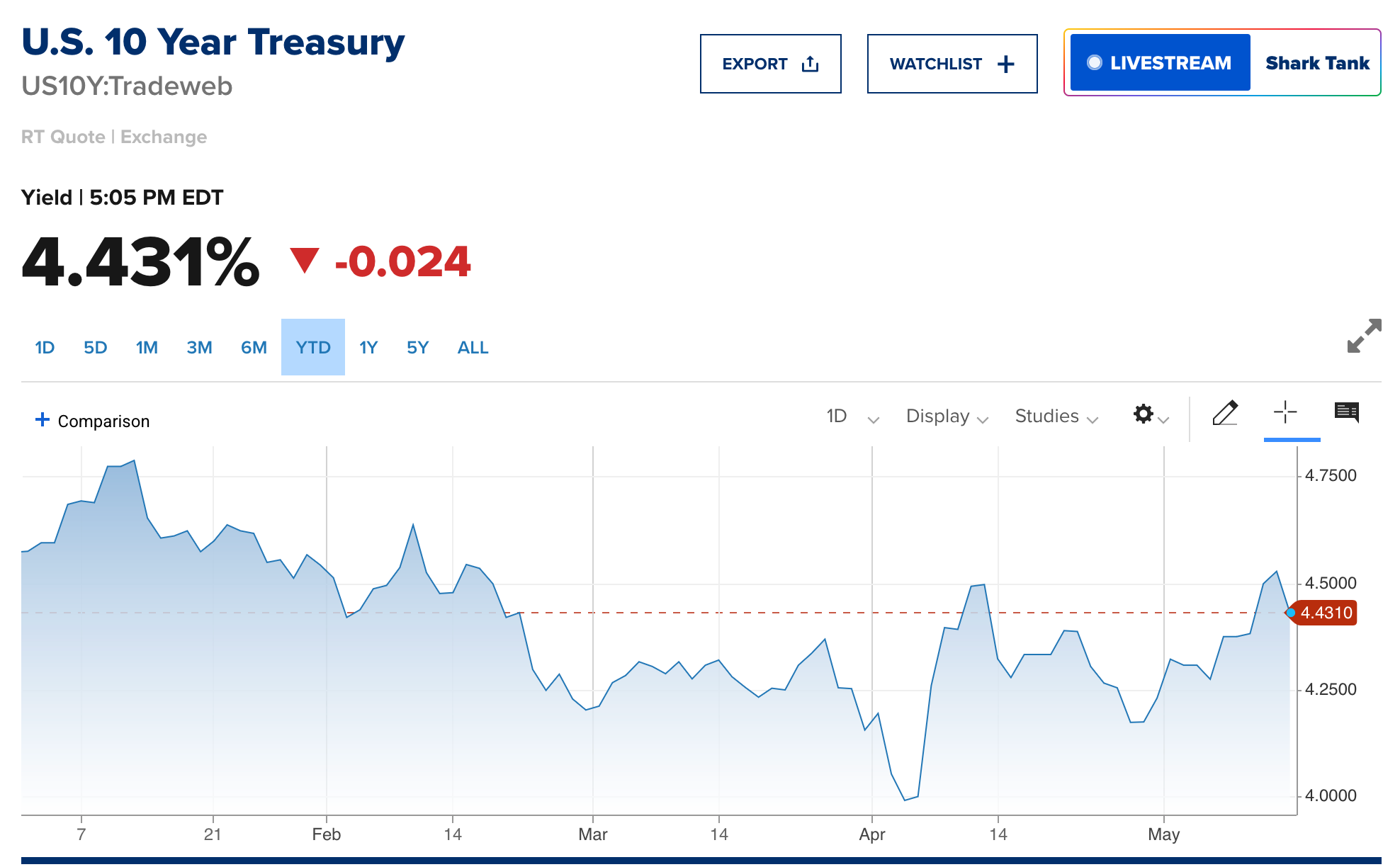
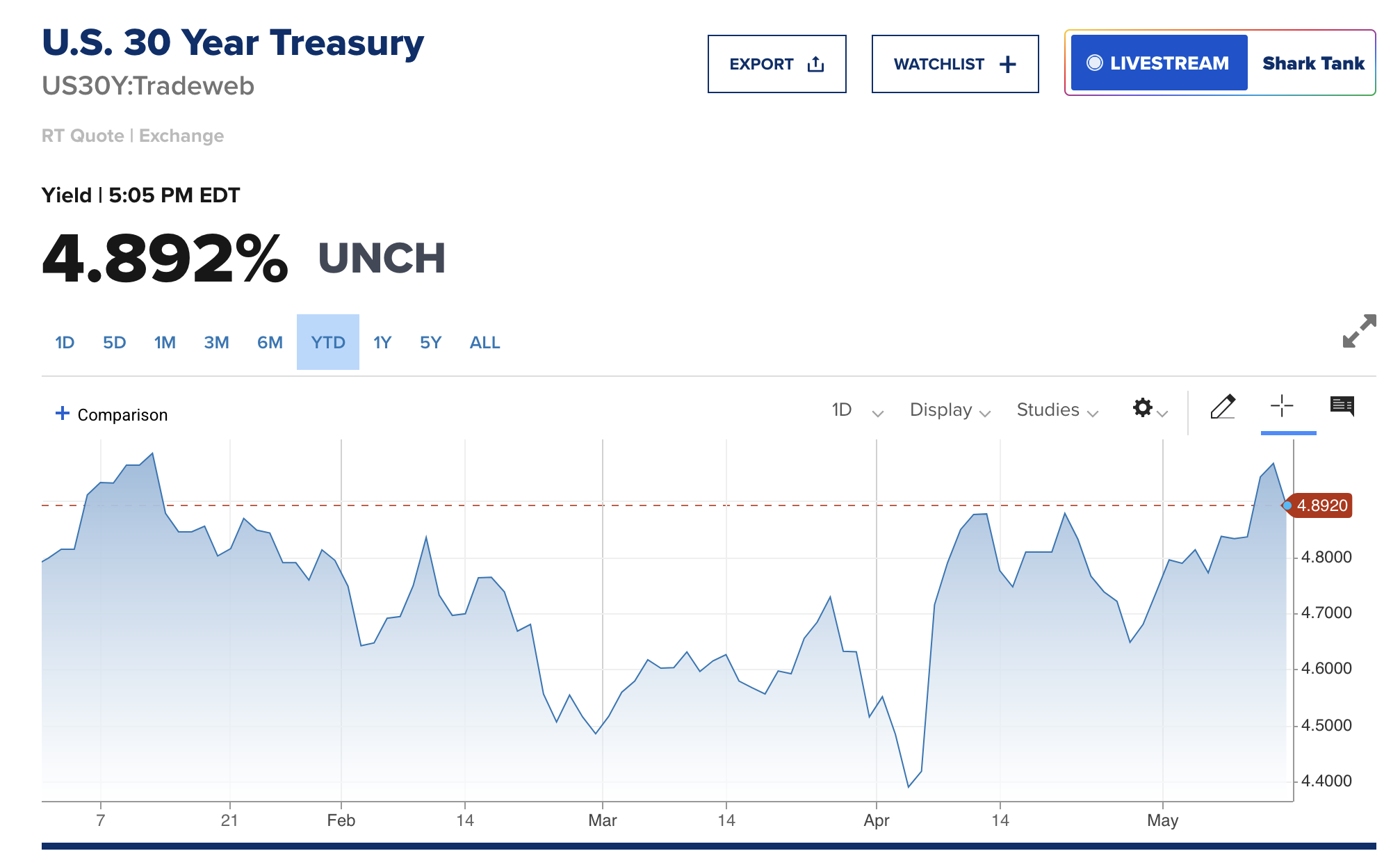
I imagine that there isn't as much of an uproar right now because I'm pretty confident the media freakouts we were experiencing in mid-April were driven by the fact that many large hedge funds found themselves off sides of large levered basis trades. I wouldn't be surprised if those funds have decreased their leverage in those trades and bond yields being back to mid-April levels is not affecting those funds as much as they were last month. But the point stands, the 10-year and 30-year yields are significantly elevated with the 30-year approaching 5%. Regardless of the deals that are currently being made in the Middle East, the Treasury has a big problem on its hands. It still has to roll over many trillions worth of debt over over the next few years and doing so at these rates is going to be massively detrimental to fiscal deficits over the next decade. The interest expense on the debt is set to explode in the coming years.
On that note, data from the first quarter of 2025 has been released by the government and despite all the posturing by the Trump administration around DOGE and how tariffs are going to be beneficial for the U.S. economy, deficits are continuing to explode while the interest expense on the debt has definitively surpassed our annual defense budget.
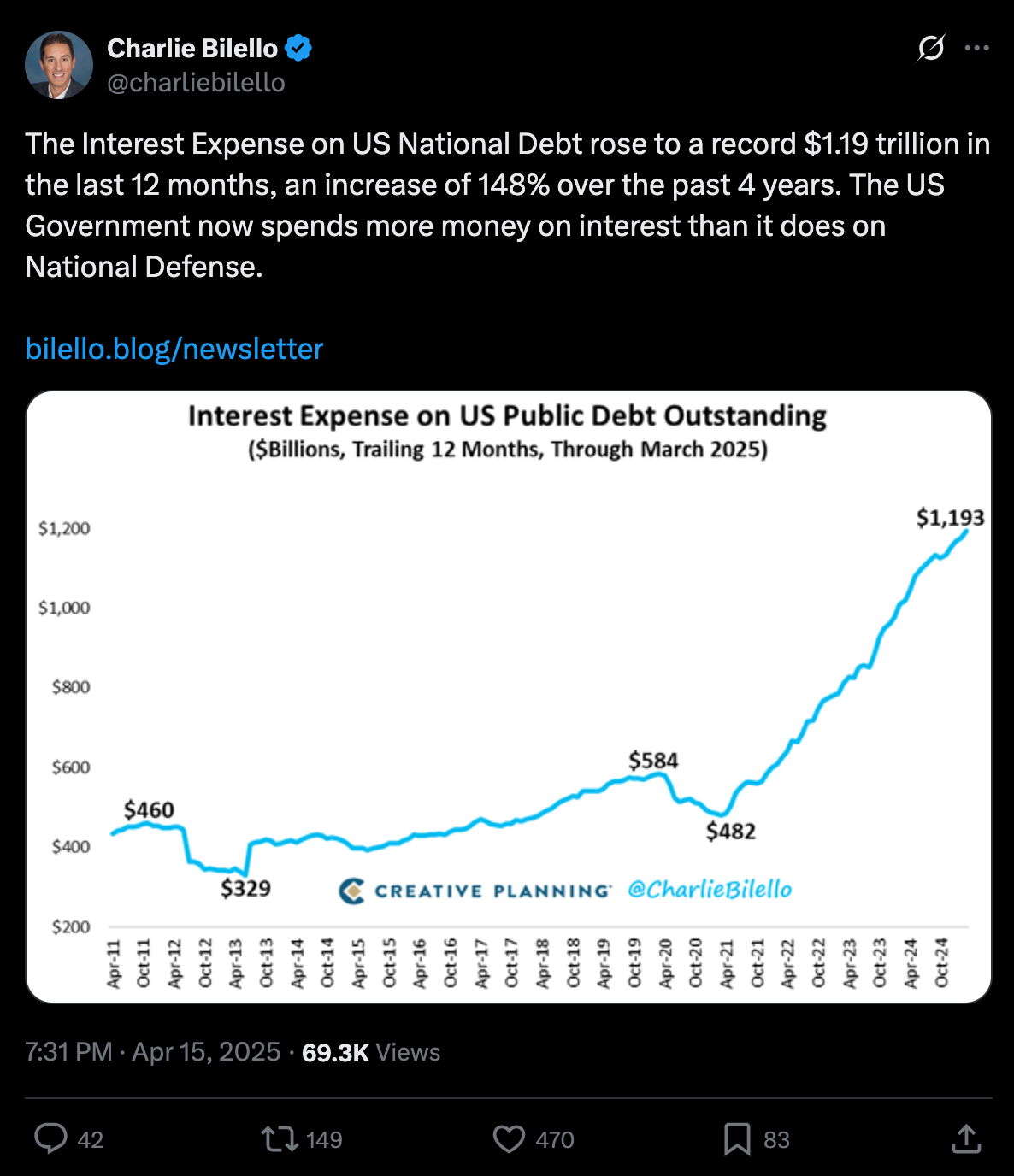
via Charlie Bilello

via Mohamed Al-Erian
To make matters worse, as things are deteriorating on the fiscal side of things, the U.S. consumer is getting crushed by credit. The 90-plus day delinquency rates for credit card and auto loans are screaming higher right now.

via TXMC
One has to wonder how long all this can continue without some sort of liquidity crunch. Even though equities markets have recovered from their post-Liberation Day month long bear market, I would not be surprised if what we're witnessing is a dead cat bounce that can only be continued if the money printers are turned back on. Something's got to give, both on the fiscal side and in the private markets where the Common Man is getting crushed because he's been forced to take on insane amounts of debt to stay afloat after years of elevated levels of inflation. Add on the fact that AI has reached a state of maturity that will enable companies to replace their current meat suit workers with an army of cheap, efficient and fast digital workers and it isn't hard to see that some sort of employment crisis could be on the horizon as well.
Now is not the time to get complacent. While I do believe that the deals that are currently being made in the Middle East are probably in the best interest of the United States as the world, again, moves toward a more multi-polar reality, we are facing problems that one cannot simply wish away. They will need to be confronted. And as we've seen throughout the 21st century, the problems are usually met head-on with a money printer.
I take no pleasure in saying this because it is a bit uncouth to be gleeful to benefit from the strife of others, but it is pretty clear to me that all signs are pointing to bitcoin benefiting massively from everything that is going on. The shift towards a more multi-polar world, the runaway debt situation here in the United States, the increasing deficits, the AI job replacements and the consumer credit crisis that is currently unfolding, All will need to be "solved" by turning on the money printers to levels they've never been pushed to before.
Weird times we're living in.
China's Manufacturing Dominance: Why It Matters for the U.S.
In my recent conversation with Lyn Alden, she highlighted how China has rapidly ascended the manufacturing value chain. As Lyn pointed out, China transformed from making "sneakers and plastic trinkets" to becoming the world's largest auto exporter in just four years. This dramatic shift represents more than economic success—it's a strategic power play. China now dominates solar panel production with greater market control than OPEC has over oil and maintains near-monopoly control of rare earth elements crucial for modern technology.
"China makes like 10 times more steel than the United States does... which is relevant in ship making. It's relevant in all sorts of stuff." - Lyn Alden
Perhaps most concerning, as Lyn emphasized, is China's financial leverage. They hold substantial U.S. assets that could be strategically sold to disrupt U.S. treasury market functioning. This combination of manufacturing dominance, resource control, and financial leverage gives China significant negotiating power in any trade disputes, making our attempts to reshoring manufacturing all the more challenging.
Check out the full podcast here for more on Triffin's dilemma, Bitcoin's role in monetary transition, and the energy requirements for rebuilding America's industrial base.
Headlines of the Day
Financial Times Under Fire Over MicroStrategy Bitcoin Coverage - via X
Trump in Qatar: Historic Boeing Deal Signed - via X
Get our new STACK SATS hat - via tftcmerch.io
Johnson Backs Stock Trading Ban; Passage Chances Slim - via X
Take the First Step Off the Exchange
Bitkey is an easy, secure way to move your Bitcoin into self-custody. With simple setup and built-in recovery, it’s the perfect starting point for getting your coins off centralized platforms and into cold storage—no complexity, no middlemen.
Take control. Start with Bitkey.
Use the promo code *“TFTC20”* during checkout for 20% off
Ten31, the largest bitcoin-focused investor, has deployed 158,469 sats | $150.00M across 30+ companies through three funds. I am a Managing Partner at Ten31 and am very proud of the work we are doing. Learn more at ten31.vc/invest.
Final thought...
Building things of value is satisfying.
Get this newsletter sent to your inbox daily: https://www.tftc.io/bitcoin-brief/
Subscribe to our YouTube channels and follow us on Nostr and X:
@media screen and (max-width: 480px) { .mobile-padding { padding: 10px 0 !important; } .social-container { width: 100% !important; max-width: 260px !important; } .social-icon { padding: 0 !important; } .social-icon img { height: 32px !important; width: 32px !important; } .icon-cell { padding: 0 4px !import
-
 @ 7f6db517:a4931eda
2025-06-01 02:01:32
@ 7f6db517:a4931eda
2025-06-01 02:01:32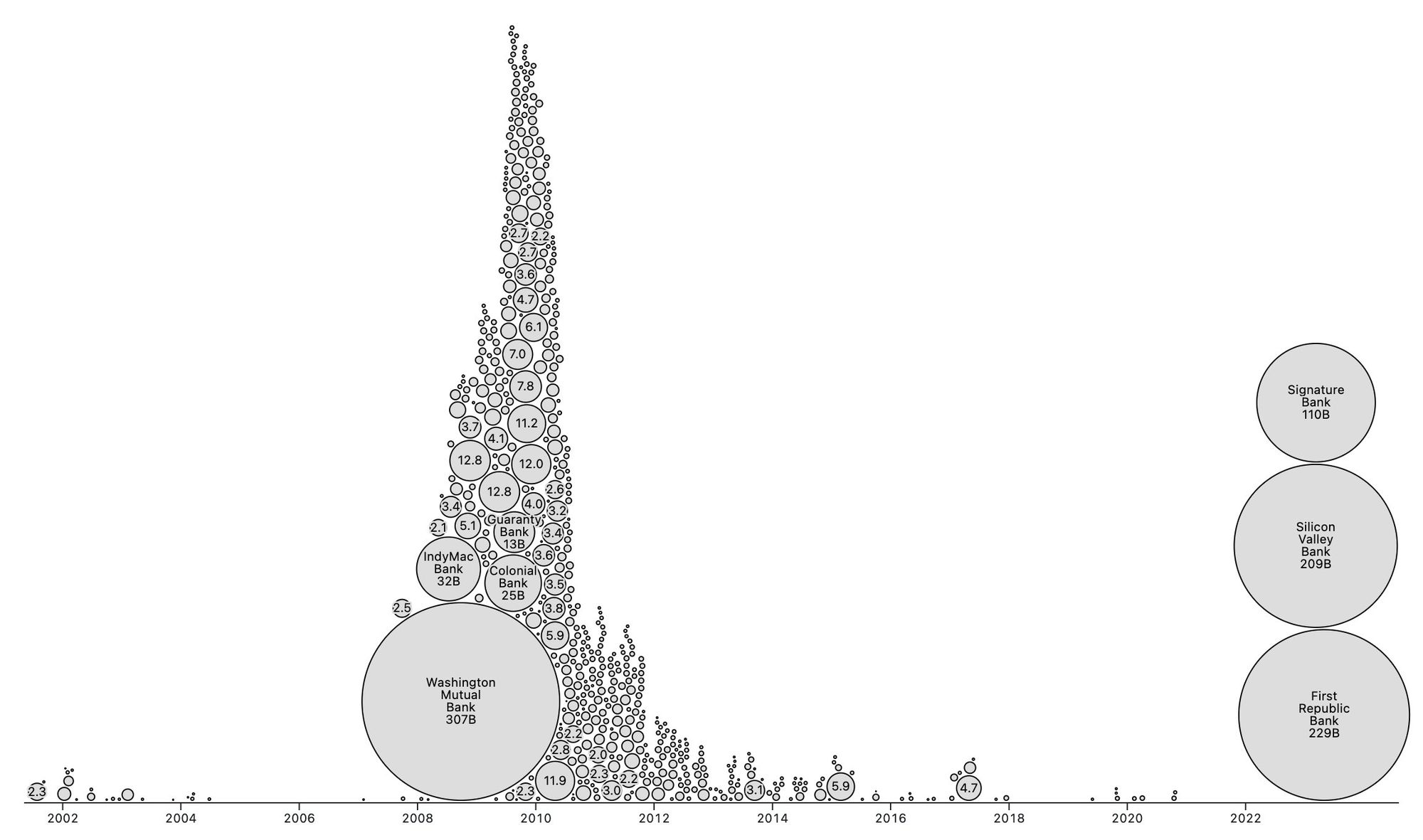
People forget Bear Stearns failed March 2008 - months of denial followed before the public realized how bad the situation was under the surface.
Similar happening now but much larger scale. They did not fix fundamental issues after 2008 - everything is more fragile.
The Fed preemptively bailed out every bank with their BTFP program and First Republic Bank still failed. The second largest bank failure in history.
There will be more failures. There will be more bailouts. Depositors will be "protected" by socializing losses across everyone.
Our President and mainstream financial pundits are currently pretending the banking crisis is over while most banks remain insolvent. There are going to be many more bank failures as this ponzi system unravels.
Unlike 2008, we have the ability to opt out of these broken and corrupt institutions by using bitcoin. Bitcoin held in self custody is unique in its lack of counterparty risk - you do not have to trust a bank or other centralized entity to hold it for you. Bitcoin is also incredibly difficult to change by design since it is not controlled by an individual, company, or government - the supply of dollars will inevitably be inflated to bailout these failing banks but bitcoin supply will remain unchanged. I do not need to convince you that bitcoin provides value - these next few years will convince millions.
If you found this post helpful support my work with bitcoin.

-
 @ 7f6db517:a4931eda
2025-06-01 02:01:32
@ 7f6db517:a4931eda
2025-06-01 02:01:32
Bank run on every crypto bank then bank run on every "real" bank.
— ODELL (@ODELL) December 14, 2022
Good morning.
It looks like PacWest will fail today. It will be both the fifth largest bank failure in US history and the sixth major bank to fail this year. It will likely get purchased by one of the big four banks in a government orchestrated sale.
March 8th - Silvergate Bank
March 10th - Silicon Valley Bank
March 12th - Signature Bank
March 19th - Credit Suisse
May 1st - First Republic Bank
May 4th - PacWest Bank?PacWest is the first of many small regional banks that will go under this year. Most will get bought by the big four in gov orchestrated sales. This has been the playbook since 2008. Follow the incentives. Massive consolidation across the banking industry. PacWest gonna be a drop in the bucket compared to what comes next.
First, a hastened government led bank consolidation, then a public/private partnership with the remaining large banks to launch a surveilled and controlled digital currency network. We will be told it is more convenient. We will be told it is safer. We will be told it will prevent future bank runs. All of that is marketing bullshit. The goal is greater control of money. The ability to choose how we spend it and how we save it. If you control the money - you control the people that use it.
If you found this post helpful support my work with bitcoin.

-
 @ cefb08d1:f419beff
2025-05-31 07:55:19
@ cefb08d1:f419beff
2025-05-31 07:55:19https://stacker.news/items/993333
-
 @ dfa02707:41ca50e3
2025-06-01 02:01:27
@ dfa02707:41ca50e3
2025-06-01 02:01:27Contribute to keep No Bullshit Bitcoin news going.
-
Version 1.3 of Bitcoin Safe introduces a redesigned interactive chart, quick receive feature, updated icons, a mempool preview window, support for Child Pays For Parent (CPFP) and testnet4, preconfigured testnet demo wallets, as well as various bug fixes and improvements.
-
Upcoming updates for Bitcoin Safe include Compact Block Filters.
"Compact Block Filters increase the network privacy dramatically, since you're not asking an electrum server to give you your transactions. They are a little slower than electrum servers. For a savings wallet like Bitcoin Safe this should be OK," writes the project's developer Andreas Griffin.
- Learn more about the current and upcoming features of Bitcoin Safe wallet here.
What's new in v1.3
- Redesign of Chart, Quick Receive, Icons, and Mempool Preview (by @design-rrr).
- Interactive chart. Clicking on it now jumps to transaction, and selected transactions are now highlighted.
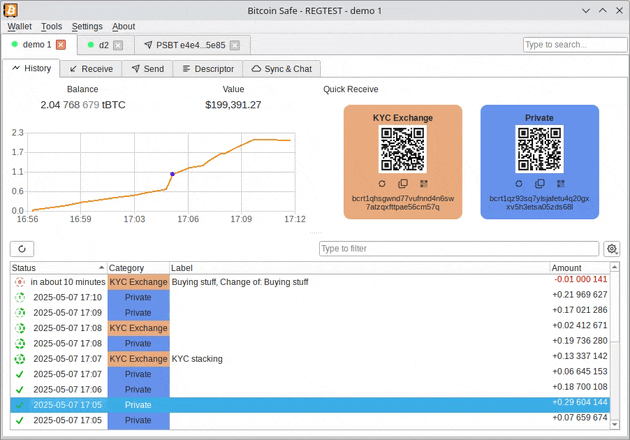
- Speed up transactions with Child Pays For Parent (CPFP).
- BDK 1.2 (upgraded from 0.32).
- Testnet4 support.
- Preconfigured Testnet demo wallets.
- Cluster unconfirmed transactions so that parents/children are next to each other.
- Customizable columns for all tables (optional view: Txid, Address index, and more)
- Bug fixes and other improvements.
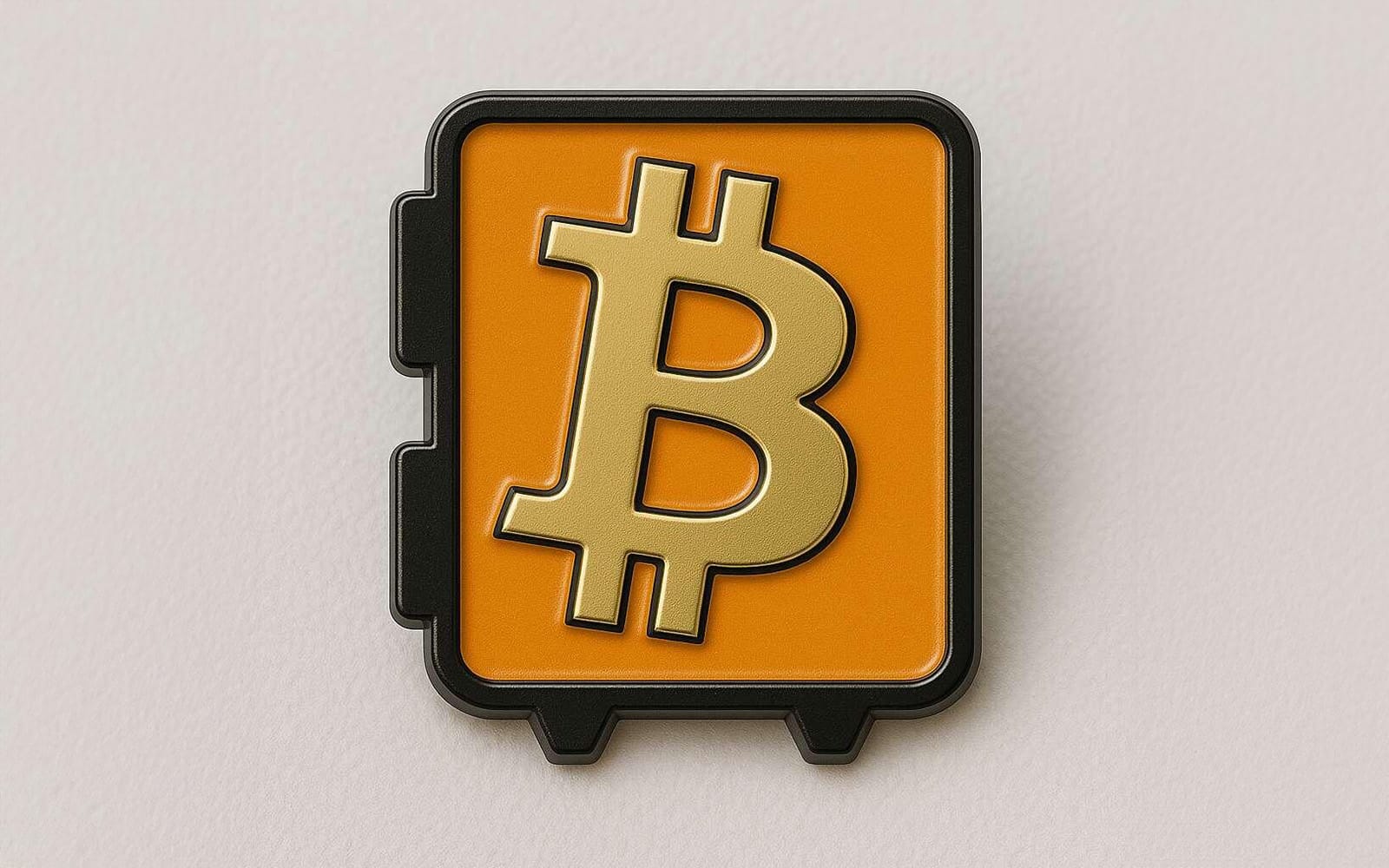
Announcement / Archive
Blog Post / Archive
GitHub Repo
Website -
-
 @ 7f6db517:a4931eda
2025-06-01 02:01:32
@ 7f6db517:a4931eda
2025-06-01 02:01:32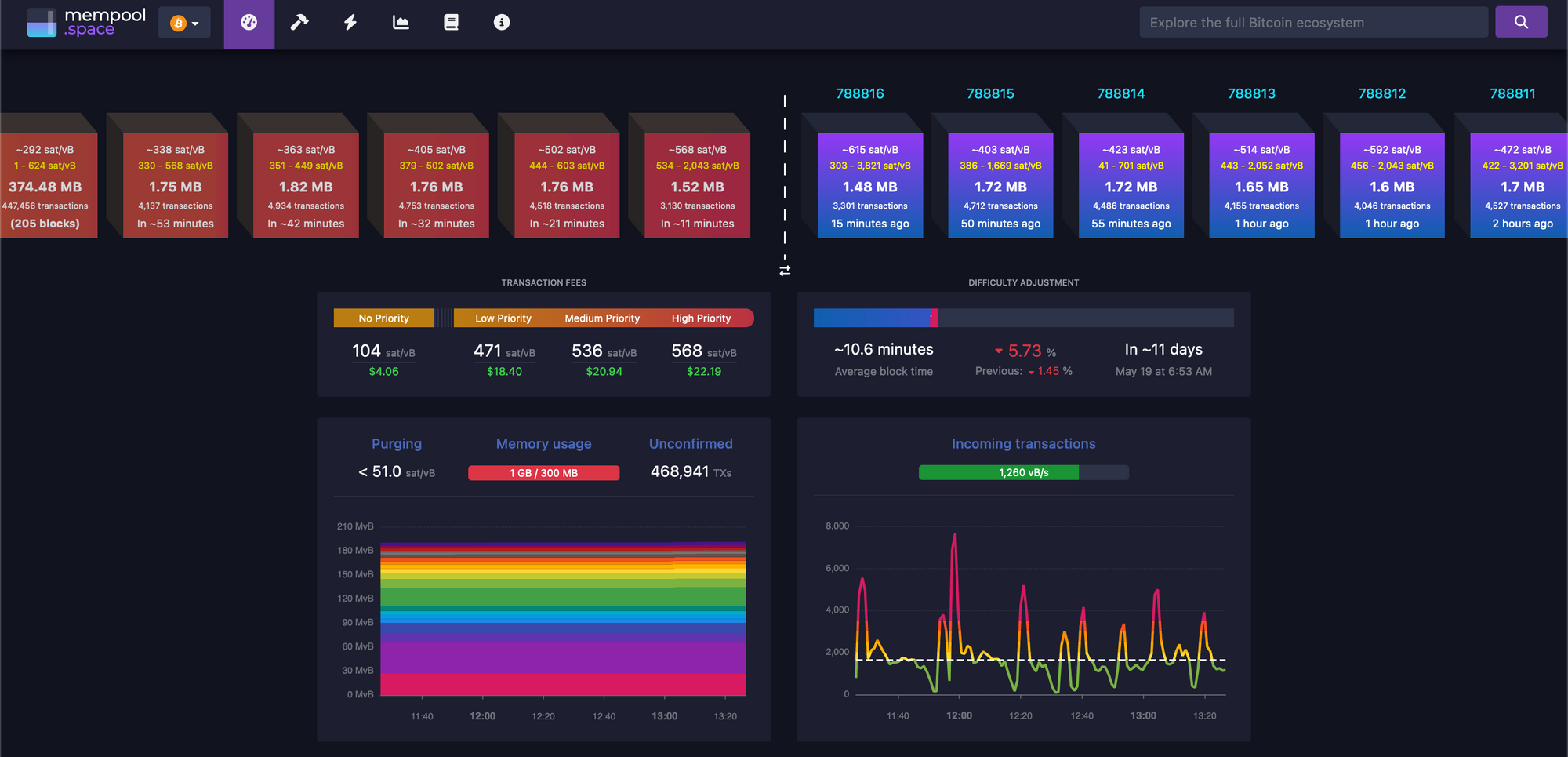
There must be a limit to how much data is transferred across the bitcoin network in order to keep the ability to run and use your own node accessible. A node is required to interact with the global bitcoin network - if you do not use your own node then you must trust someone else's node. If nodes become inaccessible to run then the network will centralize around the remaining entities that operate them - threatening the censorship resistance at the core of bitcoin's value prop. The bitcoin protocol uses three main mechanisms to keep node operation costs low - a fixed limit on the amount of data in each block, an automatic difficulty adjustment that regulates how many blocks are produced based on current mining hash rate, and a robust dynamic transaction fee market.
Bitcoin transaction fees limit network abuse by making usage expensive. There is a cost to every transaction, set by a dynamic free market based on demand for scarce block space. It is an incredibly robust way to prevent spam without relying on centralized entities that can be corrupted or pressured.
After the 2017 bitcoin fee spike we had six years of relative quiet to build tools that would be robust in a sustained high fee market. Fortunately our tools are significantly better now but many still need improvement. Most of the pain points we see today will be mitigated.
The reality is we were never going to be fully prepared - pressure is needed to show the pain points and provide strong incentives to mitigate them.
It will be incredibly interesting to watch how projects adapt under pressure. Optimistic we see great innovation here.
_If you are willing to wait for your transaction to confirm you can pay significantly lower fees. Learn best practices for reducing your fee burden here.
My guide for running and using your own bitcoin node can be found here._
If you found this post helpful support my work with bitcoin.

-
 @ c1e9ab3a:9cb56b43
2025-05-27 13:19:53
@ c1e9ab3a:9cb56b43
2025-05-27 13:19:53I. Introduction: Money as a Function of Efficiency and Preference
Money is not defined by law, but by power over productivity. In any open economy, the most economically efficient actors—those who control the most valuable goods, services, and knowledge—ultimately dictate the medium of exchange. Their preferences signal to the broader market what form of money is required to access the highest-value goods, from durable commodities to intangibles like intellectual property and skilled labor.
Whatever money these actors prefer becomes the de facto unit of account and store of value, regardless of its legal status. This emergent behavior is natural and reflects a hierarchy of monetary utility.
II. Classical Gresham’s Law: A Product of Market Distortion
Gresham’s Law, famously stated as:
"Bad money drives out good"
is only valid under coercive monetary conditions, specifically: - Legal tender laws that force the acceptance of inferior money at par with superior money. - Fixed exchange rates imposed by decree, not market valuation. - Governments or central banks backing elastic fiduciary media with promises of redemption. - Institutional structures that mandate debt and tax payments in the favored currency.
Under these conditions, superior money (hard money) is hoarded, while inferior money (soft, elastic, inflationary) circulates. This is not an expression of free market behavior—it is the result of suppressed price discovery and legal coercion.
Gresham’s Law, therefore, is not a natural law of money, but a law of distortion under forced parity and artificial elasticity.
III. The Collapse of Coercion: Inversion of Gresham’s Law
When coercive structures weaken or are bypassed—through technological exit, jurisdictional arbitrage, monetary breakdown, or political disintegration—Gresham’s Law inverts:
Good money drives out bad.
This occurs because: - Market actors regain the freedom to select money based on utility, scarcity, and credibility. - Legal parity collapses, exposing the true economic hierarchy of monetary forms. - Trustless systems (e.g., Bitcoin) or superior digital instruments (e.g., stablecoins) offer better settlement, security, and durability. - Elastic fiduciary media become undesirable as counterparty risk and inflation rise.
The inversion marks a return to monetary natural selection—not a breakdown of Gresham’s Law, but the collapse of its preconditions.
IV. Elasticity and Control
Elastic fiduciary media (like fiat currency) are not intrinsically evil. They are tools of state finance and debt management, enabling rapid expansion of credit and liquidity. However, when their issuance is unconstrained, and legal tender laws force their use, they become weapons of economic coercion.
Banks issue credit unconstrained by real savings, and governments enforce the use of inflated media through taxation and courts. This distorts capital allocation, devalues productive labor, and ultimately hollows out monetary confidence.
V. Monetary Reversion: The Return of Hard Money
When the coercion ends—whether gradually or suddenly—the monetary system reverts. The preferences of the productive and wealthy reassert themselves:
- Superior money is not just saved—it begins to circulate.
- Weaker currencies are rejected not just for savings, but for daily exchange.
- The hoarded form becomes the traded form, and Gresham’s Law inverts completely.
Bitcoin, gold, and even highly credible stable instruments begin to function as true money, not just stores of value. The natural monetary order returns, and the State becomes a late participant, not the originator of monetary reality.
VI. Conclusion
Gresham’s Law operates only under distortion. Its inversion is not an anomaly—it is a signal of the collapse of coercion. The monetary system then reorganizes around productive preference, technological efficiency, and economic sovereignty.
The most efficient market will always dictate the form of hard money. The State can delay this reckoning through legal force, but it cannot prevent it indefinitely. Once free choice returns, bad money dies, and good money lives again.
-
 @ c9badfea:610f861a
2025-06-01 00:32:13
@ c9badfea:610f861a
2025-06-01 00:32:13- Install Feeder (it's free and open source)
- Discover RSS feeds from various sources (see links below)
- Copy the Feed URL
- Open Feeder, tap the ⁞ icon, and choose Add Feed
- Paste the Feed URL and tap Search
- Select the found RSS feed item
- Scroll down and tap OK
Some Sources
ℹ️ You can also use YouTube channel URLs as feeds
-
 @ a19caaa8:88985eaf
2025-05-27 22:36:15
@ a19caaa8:88985eaf
2025-05-27 22:36:15インターネット、だいすき!
レスバって?
- たのしさ(ちゃぴにきく)
ちがい
- タイプもきく?それはダルい?
さけるには
- ちゃぴにきく
“思い遣る”のと“邪推する”のは違う
- でもそう捉えたんだから仕方ないじゃん(自分の気持ちも大事にする)(バランス)(またあ?)
- 「意見単体」として見ているか、「そのひとから発された言葉」として見ているかの違い?
-
自分の理想をひとに押し付けない
-
それはそれとして、社会に疲れて深く潜りにきて、同じように深いとこに居るひとと手を振り合ったり、そのあり方を見て吸収したりしたいのに、バトルに巻き込まれるの、不憫すぎる
- インスタくんはえらいなあ、「このひとにストーリーズを表示しない」ができて
- 自分はそんなつもり無くても、始まってしまった以上、責任がある気がしてしまって、相手がどうして欲しいかを考え始めてしまい、消耗する
- 社会じゃん
- EなのにEしづらい環境のひとたちの捌け口になる必要は無い
- 海は広い
-
 @ 39cc53c9:27168656
2025-05-27 09:21:37
@ 39cc53c9:27168656
2025-05-27 09:21:37After almost 3 months of work, we've completed the redesign of kycnot.me. More modern and with many new features.
Privacy remains the foundation - everything still works with JavaScript disabled. If you enable JS, you will get some nice-to-have features like lazy loading and smoother page transitions, but nothing essential requires it.
User Accounts
We've introduced user accounts that require zero personal information:
- Secret user tokens - no email, no phone number, no personal data
- Randomly generated usernames for default privacy and fairness
- Karma system that rewards contributions and unlocks features: custom display names, profile pictures, and more.
Reviews and Community Discussions
On the previous sites, I was using third party open source tools for the comments and discussions. This time, I've built my own from scratch, fully integrated into the site, without JavaScript requirements.
Everyone can share their experiences and help others make informed decisions:
- Ratings: Comments can have a 1-5 star rating attached. You can have one rating per service and it will affect the overall user score.
- Discussions: These are normal comments, you can add them on any listed service.
Comment Moderation
I was strugling to keep up with moderation on the old site. For this, we've implemented an AI-powered moderation system that:
- Auto-approves legitimate comments instantly
- Flags suspicious content for human review
- Keeps discussions valuable by minimizing spam
The AI still can mark comments for human review, but most comments will get approved automatically by this system. The AI also makes summaries of the comments to help you understand the overall sentiment of the community.
Powerful Search & Filtering
Finding exactly what you need is now easier:
- Advanced filtering system with many parameters. You can even filter by attributes to pinpoint services with specific features.
The results are dynamic and shuffle services with identical scores for fairness.
See all listings
Listings are now added as 'Community Contributed' by default. This means that you can still find them in the search results, but they will be clearly marked as such.
Updated Scoring System
New dual-score approach provides more nuanced service evaluations:
- Privacy Score: Measures how well a service protects your personal information and data
-
Trust Score: Assesses reliability, security, and overall reputation
-
Combined into a weighted Overall Score for quick comparisons
- Completely transparent and open source calculation algorithm. No manual tweaking or hidden factors.
AI-Powered Terms of Service Analysis
Basically, a TLDR summary for Terms of Service:
- Automated system extracts the most important points from complex ToS documents
- Clear summaries
- Updated monthly to catch any changes
The ToS document is hashed and only will be updated if there are any changes.
Service Events and Timelines
Track the complete history of any service, on each service page you can see the timeline of events. There are two types of events:
- Automatic events: Created by the system whenever something about a service changes, like its description, supported currencies, attributes, verification status…
- Manual events: Added by admins when there’s important news, such as a service going offline, being hacked, acquired, shut down, or other major updates.
There is also a global timeline view available at /events
Notification System
Since we now have user accounts, we built a notifiaction system so you can stay informed about anything:
- Notifications for comment replies and status changes
- Watch any comment to get notified for new replies.
- Subscribe to services to monitor events and updates
- Notification customization.
Coming soon: Third-party privacy-preserving notifications integration with Telegram, Ntfy.sh, webhooks...
Service Suggestions
Anyone with an account can suggest a new service via the suggestion form. After submitting, you'll receive a tracking page where you can follow the status of your suggestion and communicate directly with admins.
All new suggestions start as "unlisted" — they won't appear in search results until reviewed. Our team checks each submission to ensure it's not spam or inappropriate. If similar services already exist, you'll be shown possible duplicates and can choose to submit your suggestion as an edit instead.
You can always check the progress of your suggestion, respond to moderator questions, and see when it goes live, everything will also be notified to your account. This process ensures high-quality listings and a collaborative approach to building the directory.
These are some of the main features we already have, but there are many more small changes and improvements that you will find when using the site.
What's Next?
This is just the beginning. We will be constantly working to improve KYCnot.me and add more features that help you preserve your privacy.
Remember: True financial freedom requires the right to privacy. Stay KYC-free!
-
 @ 2dd9250b:6e928072
2025-05-31 16:23:22
@ 2dd9250b:6e928072
2025-05-31 16:23:22Durante a década de 1990, houve o aumento da globalização da economia, determinando a adição do fluxo internacional de capitais, de produtos e serviços. Este fenômeno levou a uma interdependência maior entre as economias dos países. Justamente por causa da possibilidade de que um eventual colapso econômico em um país resulte no contágio dos demais. Diante disso, aumentou a preocupação com os riscos incentivando a utilização de sofisticados modelos e estratégias de avaliação de gestão de risco.
Na década, ganharam destaque ainda os graves problemas financeiros enfrentados, entre outros, pelo banco inglês Barings Bank, e pelo fundo de investimento norte-americano Long Term Capital Management.
Outro grande destaque foi a fraude superior a US$ 7 bilhões sofrida pelo banco Société Generale em Janeiro de 2008.
O Barings Bank é um banco inglês que faliu em 1995 em razão de operações financeiras irregulares e mal-sucedidas realizadas pelo seu principal operador de mercado. O rombo da instituição foi superior à US$ 1,3 Bilhão e causado por uma aposta equivocada no desempenho futuro no índice de ações no Japão. Na realidade, o mercado acionário japonês caiu mais de 15% na época, determinando a falência do banco. O Baring Bank foi vendido a um grupo financeiro holandês (ING) pelo valor simbólico de uma libra esterlina.
O Long Term Capital Management era um fundo de investimento de que perdeu em 1998 mais de US$ 4,6 bilhões em operações nos mercados financeiros internacionais. O LTCM foi socorrido pelo Banco Central dos Estados Unidos (Federal Reserve ), que coordenou uma operação de socorro financeiro à instituição. A justificativa do Banco Central para esta decisão era "o receio das possíveis consequências mundiais da falência do fundo de investimento".
O banco francês Société Generale informou, em janeiro de 2008, uma perda de US$ 7,16 bilhões determinadas por fraudes efetuadas por um operador do mercado financeiro. Segundo revelou a instituição, o operador assumiu posições no mercado sem o conhecimento da direção do banco. A instituição teve que recorrer a uma urgente captação de recursos no mercado próxima a US$ 5,0 bilhões.
E finalmente chegamos ao caso mais problemático da era das finanças modernas anterior ao Bitcoin, o caso Lehman Brothers.
O Lehman Brothers era o 4° maior de investimentos dos EUA quando pediu concordata em 15/09/2008 com dívidas que superavam inacreditáveis US$ 600 bilhões.
Não se tinha contas correntes ou talão de cheques do Lehman Brothers. Era um banco especializado em investimentos e complexas operações financeiras. Havia feito pesados investimentos em empréstimos a juros fixos no famigerado mercado subprime, e o crédito imobiliário voltado a pessoas consideradas de forte risco de inadimplência.
Com essa carteira de investimentos que valia bem menos que o estimado e o acúmulo de projetos financeiros, minou a confiança dos investidores na instituição de 158 anos. Suas ações passaram de US$ 80 a menos de US$ 4. Acumulando fracassos nas negociações para levantar fundos; a instituição de cerca de 25 mil funcionários entrou em concordata.
O Federal Reserve resgatou algumas instituições financeiras grandes e tradicionais norte-americanas como a seguradora AIG no meio da crise. O Fed injetou um capital de US$ 182, 3 bilhões no American International Group (AIG).
Foi exatamente essa decisão do Fed em salvar alguns bancos e deixar quebrar outros, que causou insegurança por parte dos clientes. E os clientes ficaram insatisfeitos tanto com os bancos de investimentos quanto com as agências de classificação de risco, como a Standard & Poor's que tinha dado uma nota alta para o Lehman Brothers no mesmo dia em que ele quebrou.
E essa foi uma das razões pelo qual o Bitcoin foi criado. Satoshi Nakamoto entendeu que as pessoas não estavam mais confiando nem no Governo, nem nos Bancos Privados que o Governo federal restagatava quando eles quebravam e isso prejudicou muita gente. Tanto que o “hash” do Genesis Block contém o título do artigo “Chancellor on brink of second bailout for banks” (Chanceler à beira de segundo resgate para bancos, em português) da edição britânica do The Times.
Esse texto foi parcialmente editado do texto de ASSAF Neto, CAF (2014).
-
 @ 9cb3545c:2ff47bca
2025-05-27 12:58:56
@ 9cb3545c:2ff47bca
2025-05-27 12:58:56Introduction
Public companies that hold Bitcoin on behalf of investors (often issuing securities backed by those Bitcoin holdings) have faced growing pressure to demonstrate proof of reserves – evidence that they genuinely hold the cryptocurrency they claim. One approach is to publish the company’s Bitcoin wallet addresses so that anyone can verify the balances on the blockchain. This practice gained momentum after high-profile crypto collapses (e.g. FTX in 2022) eroded trust, leading major exchanges and fund issuers like Binance, Kraken, OKX, and Bitwise to publicize wallet addresses as proof of assets . The goal is transparency and reassurance for investors. However, making wallet addresses public comes with significant security and privacy risks. This report examines those risks – from cybersecurity threats and blockchain tracing to regulatory and reputational implications – and weighs them against the transparency benefits of on-chain proof of reserves.
Proof of Reserves via Public Wallet Addresses
In the cryptocurrency ethos of “don’t trust – verify,” on-chain proof of reserves is seen as a powerful tool. By disclosing wallet addresses (or cryptographic attestations of balances), a company lets investors and analysts independently verify that the Bitcoin reserves exist on-chain. For example, some firms have dashboards showing their addresses and balances in real time . In theory, this transparency builds trust by proving assets are not being misreported or misused. Shareholders gain confidence that the company’s Bitcoin holdings are intact, potentially preventing fraud or mismanagement.
Yet this approach essentially sacrifices the pseudonymity of blockchain transactions. Publishing a wallet address ties a large, known institution to specific on-chain funds. While Bitcoin addresses are public by design, most companies treat their specific addresses as sensitive information. Public proof-of-reserve disclosures break that anonymity, raising several concerns as detailed below.
Cybersecurity Threats from Visible Wallet Balances
Revealing a wallet address with a large balance can make a company a prime target for hackers and cybercriminals. Knowing exactly where significant reserves are held gives attackers a clear blueprint. As Bitcoin advocate (and MicroStrategy Executive Chairman) Michael Saylor warned in 2025, “publicly known wallet addresses become prime targets for malicious actors. Knowing where significant reserves are held provides hackers with a clear target, potentially increasing the risk of sophisticated attacks” . In other words, publishing the address increases the attack surface – attackers might intensify phishing campaigns, malware deployment, or insider bribery aimed at obtaining the keys or access to those wallets.
Even if the wallets are secured in cold storage, a public address advertisement may encourage attempts to penetrate the organization’s security. Custodians and partners could also be targeted. Saylor noted that this exposure isn’t just risky for the company holding the Bitcoin; it can indirectly put their custodial providers and related exchanges at risk as well . For instance, if a third-party custodian manages the wallets, hackers might attempt to breach that custodian knowing the reward (the company’s Bitcoin) is great.
Companies themselves have acknowledged these dangers. Grayscale Investments, which runs the large Grayscale Bitcoin Trust (GBTC), pointedly refused to publish its wallet addresses in late 2022, citing “security concerns” and complex custody arrangements that have “kept our investors’ assets safe for years” . Grayscale implied that revealing on-chain addresses could undermine those security measures, and it chose not to “circumvent complex security arrangements” just to appease public demand . This highlights a key point: corporate treasury security protocols often assume wallet details remain confidential. Publicizing them could invalidate certain assumptions (for example, if an address was meant to be operationally secret, it can no longer serve that role once exposed).
Additionally, a publicly known trove of cryptocurrency might invite physical security threats. While not a purely “cyber” issue, if criminals know a particular company or facility controls a wallet with, say, thousands of Bitcoin, it could lead to threats against personnel (extortion or coercion to obtain keys). This is a less common scenario for large institutions (which typically have robust physical security), but smaller companies or key individuals could face elevated personal risk by being associated with huge visible crypto reserves.
In summary, cybersecurity experts consider public proof-of-reserve addresses a double-edged sword: transparency comes at the cost of advertising exactly where a fortune is held. As Saylor bluntly put it, “the conventional way of issuing proof of reserves today is actually insecure… This method undermines the security of the issuer, the custodian, the exchanges and the investors. This is not a good idea”  . From a pure security standpoint, broadcasting your wallets is akin to drawing a bullseye on them.
Privacy Risks: Address Clustering and Blockchain Tracing
Blockchain data is public, so publishing addresses opens the door to unwanted analytics and loss of privacy for the business. Even without knowing the private keys, analysts can scrutinize every transaction in and out of those addresses. This enables address clustering – linking together addresses that interact – and other forms of blockchain forensics that can reveal sensitive information about the company’s activities.
One immediate risk is that observers can track the company’s transaction patterns. For example, if the company moves Bitcoin from its reserve address to an exchange or to another address, that move is visible in real time. Competitors, investors, or even attackers could deduce strategic information: perhaps the company is planning to sell (if coins go to an exchange wallet) or is reallocating funds. A known institution’s on-chain movements can thus “reveal strategic movements or holdings”, eroding the company’s operational privacy . In a volatile market, advance knowledge of a large buy or sell by a major player could even be exploited by others (front-running the market, etc.).
Publishing one or a few static addresses also violates a basic privacy principle of Bitcoin: address reuse. Best practice in Bitcoin is to use a fresh address for each transaction to avoid linking them  . If a company continuously uses the same “proof of reserve” address, all counterparties sending funds to or receiving funds from that address become visible. Observers could map out the company’s business relationships or vendors by analyzing counterparties. A Reddit user commenting on an ETF that published a single address noted that “reusing a single address for this makes me question their risk management… There are much better and more privacy-preserving ways to prove reserves… without throwing everything in a single public address” . In other words, a naive implementation of proof-of-reserve (one big address) maximizes privacy leakage.
Even if multiple addresses are used, if they are all disclosed, one can perform clustering analysis to find connections. This happened in the Grayscale case: although Grayscale would not confirm any addresses, community analysts traced and identified 432 addresses likely belonging to GBTC’s custodial holdings by following on-chain traces from known intermediary accounts . They managed to attribute roughly 317,705 BTC (about half of GBTC’s holdings) to those addresses . This demonstrates that even partial information can enable clustering – and if the company directly published addresses, the task becomes even easier to map the entirety of its on-chain asset base.
Another threat vector is “dusting” attacks, which become more feasible when an address is publicly known. In a dusting attack, an adversary sends a tiny amount of cryptocurrency (dust) to a target address. The dust itself is harmless, but if the target address ever spends that dust together with other funds, it can cryptographically link the target address to other addresses in the same wallet. Blockchain security researchers note that “with UTXO-based assets, an attacker could distribute dust to an address to reveal the owner’s other addresses by tracking the dust’s movement… If the owner unknowingly combines this dust with their funds in a transaction, the attacker can… link multiple addresses to a single owner”, compromising privacy . A company that publishes a list of reserve addresses could be systematically dusted by malicious actors attempting to map out all addresses under the company’s control. This could unmask cold wallet addresses that the company never intended to publicize, further eroding its privacy and security.
Investor confidentiality is another subtle concern. If the business model involves individual investor accounts or contributions (for instance, a trust where investors can deposit or withdraw Bitcoin), public addresses might expose those movements. An outside observer might not know which investor corresponds to a transaction, but unusual inflows/outflows could signal actions by big clients. In extreme cases, if an investor’s own wallet is known (say a large investor announces their involvement), one might link that to transactions in the company’s reserve addresses. This could inadvertently reveal an investor’s activities or holdings, breaching expectations of confidentiality. Even absent direct identification, some investors might simply be uncomfortable with their transactions being part of a publicly traceable ledger tied to the company.
In summary, publishing reserve addresses facilitates blockchain tracing that can pierce the veil of business privacy. It hands analysts the keys to observe how funds move, potentially exposing operational strategies, counterparties, and internal processes. As one industry publication noted, linking a large known institution to specific addresses can compromise privacy and reveal more than intended . Companies must consider whether they are ready for that level of transparency into their every on-chain move.
Regulatory and Compliance Implications
From a regulatory perspective, wallet address disclosure lies in uncharted territory, but it raises several flags. First and foremost is the issue of incomplete information: A wallet address only shows assets, not the company’s liabilities or other obligations. Regulators worry that touting on-chain holdings could give a false sense of security. The U.S. Securities and Exchange Commission (SEC) has cautioned investors to “not place too much confidence in the mere fact a company says it’s got a proof-of-reserves”, noting that such reports “lack sufficient information” for stakeholders to ascertain if liabilities can be met . In other words, a public company might show a big Bitcoin address balance, but if it has debts or customer liabilities of equal or greater value, the proof-of-reserve alone is “not necessarily an indicator that the company is in a good financial position” .
This regulatory stance implies that address disclosure, if done, must be paired with proper context. A public company would likely need to clarify in its financial statements or investor communications that on-chain reserves are unencumbered (not pledged as loan collateral, not already sold forward, etc.) and that total liabilities are accounted for. Otherwise, there’s a risk of misleading investors, which could have legal consequences. For example, if investors interpret the on-chain balance as proof of solvency but the company actually had leveraged those bitcoins for loans, lawsuits or regulatory enforcement could follow for misrepresentation.
There’s also a compliance burden associated with revealing addresses. Once an address is known to be the company’s, that company effectively must monitor all transactions related to it. If someone sends funds to that address (even without permission), the company might receive tainted coins (from hacked sources or sanctioned entities). This could trigger anti-money laundering (AML) red flags. Normally, compliance teams can ignore random deposits to unknown wallets, but they cannot ignore something sent into their publicly identified corporate wallet. Even a tiny dust amount sent from a blacklisted address could complicate compliance – for instance, the company would need to prove it has no relation to the sender and perhaps even avoid moving those tainted outputs. Being in the open increases such exposure. Threat actors might even exploit this by “poisoning” a company’s address with unwanted transactions, just to create regulatory headaches or reputational smears.
Another consideration is that custodial agreements and internal risk controls might forbid public disclosure of addresses. Many public companies use third-party custodians for their Bitcoin (for example, Coinbase Custody, BitGo, etc.). These custodians often treat wallet details as confidential for security. Grayscale noted that its Bitcoin are custodied on Coinbase and implied that revealing on-chain info would interfere with security arrangements  . It’s possible that some custodians would object to their clients broadcasting addresses, or might require additional assurances. A company going against such advice might be seen as negligent if something went wrong.
Regulators have so far not mandated on-chain proofs for public companies – in fact, recent laws have exempted public companies from proof-of-reserve mandates on the assumption they are already subject to rigorous SEC reporting. For example, a Texas bill in 2023 required crypto exchanges and custodians to provide quarterly proof-of-reserves to the state, but it “specifically carved out public reporting companies” since they already file audited financials with the SEC . The rationale was that between SEC filings and audits, public companies have oversight that private crypto firms lack . However, this also highlights a gap: even audited financials might not verify 100% of crypto assets (auditors often sample balances). Some observers noted that standard audits “may not ever include the 100% custodial asset testing contemplated by proof of reserves”, especially since quarterly SEC filings (10-Q) are often not audited . This puts public companies in a nuanced position – they are trusted to use traditional audits and internal controls, but the onus is on them if they choose to add extra transparency like on-chain proofs.
Finally, securities regulators focus on fair disclosure and accuracy. If a company publicly posts addresses, those essentially become investor disclosures subject to anti-fraud rules. The firm must keep them up to date and accurate. Any mistake (such as publishing a wrong address or failing to mention that some coins are locked up or lent out) could attract regulatory scrutiny for being misleading. In contrast, a formal audit or certification from a third-party comes with standards and disclaimers that are better understood by regulators. A self-published wallet list is an unprecedented form of disclosure that regulators haven’t fully vetted – meaning the company bears the risk if something is misinterpreted.
In summary, wallet address disclosure as proof-of-reserve must be handled very carefully to avoid regulatory pitfalls. The SEC and others have warned that on-chain assets alone don’t tell the whole story . Public companies would need to integrate such proofs with their official reporting in a responsible way – otherwise they risk confusion or even regulatory backlash for giving a false sense of security.
Reputational and Operational Risks
While transparency is meant to enhance reputation, in practice public wallet disclosures can create new reputational vulnerabilities. Once an address is public, a company’s every on-chain action is under the microscope of the crypto community and media. Any anomaly or perceived misstep can snowball into public relations problems.
One vivid example occurred with Crypto.com in late 2022. After the exchange published its cold wallet addresses to prove reserves (a move prompted by the FTX collapse), on-chain analysts quickly noticed a “suspicious transfer of 320,000 ETH” – about 82% of Crypto.com’s Ether reserves – moving from their cold wallet to another exchange (Gate.io)  . This large, unexpected transfer sparked immediate panic and FUD (fear, uncertainty, and doubt) on social media. Observers speculated that Crypto.com might be insolvent or was manipulating snapshots of reserves by borrowing funds. The CEO had to publicly respond, admitting it was an operational error – the ETH was supposed to go to a new cold storage address but ended up at a whitelisted external address by mistake . The funds were eventually returned, but not before reputational damage was done: the incident made headlines about mishandled funds and rattled user confidence  . This case illustrates how full public visibility can turn an internal slip-up into a highly public crisis. If the addresses had not been public, the mistake might have been quietly corrected; with on-chain transparency, there was nowhere to hide and no way to control the narrative before the public drew worst-case conclusions.
Even routine operations can be misinterpreted. Blockchain data lacks context – analysts may jump to conclusions that hurt a company’s reputation even if nothing is actually wrong. For instance, Binance (the world’s largest crypto exchange) encountered scrutiny when on-chain observers noted that one of its reserve wallets (labeled “Binance 8”) contained far more assets than it should have. This wallet was meant to hold collateral for Binance’s issued tokens, but held an excess balance, suggesting possible commingling of customer funds with collateral  . Bloomberg and others reported a ~$12.7 billion discrepancy visible on-chain . Binance had to acknowledge the issue as a “clerical error” and quickly separate the funds, all under the glare of public attention  . While Binance maintained that user assets were fully backed and the mistake was purely operational, the episode raised public concern over Binance’s practices, feeding a narrative that even the largest exchange had internal control lapses. The key point is that public proof-of-reserves made the lapse obvious to everyone, forcing a reactive explanation. The reputational hit (even if temporary) was an operational risk of being so transparent.
Additionally, strategic confidentiality is lost. If a company holding Bitcoin as a reserve asset decides to make a major move (say, reallocating to a different wallet, or using some Bitcoin for a strategic investment or loan), doing so with known addresses broadcasts that strategy. Competitors or market analysts can infer things like “Company X is moving 10% of its BTC — why? Are they selling? Hedging? Using it as collateral?” This can erode any competitive advantage of keeping financial strategies discreet. It might even affect the company’s stock price if investors interpret moves negatively. For example, if a blockchain analysis shows the company’s reserves dropping, shareholders might fear the company sold Bitcoin (perhaps due to financial distress), even if the reality is benign (like moving funds to a new custodian). The company would be forced into continuous public explanation of on-chain actions to prevent misunderstanding.
There’s also a risk of exposing business partnerships. Suppose the company uses certain exchanges or OTC desks to rebalance its holdings – transactions with those service providers will be visible and could link the company to them. If one of those partners has issues (say a hacked exchange or a sanctioned entity inadvertently), the company could be reputationally contaminated by association through the blockchain trail.
Finally, not all publicity is good publicity in the crypto world. A public proof-of-reserve might invite armchair auditors to scrutinize and criticize every aspect of the company’s crypto management. Minor issues could be blown out of proportion. On the flip side, if a company chooses not to publish addresses, it could face reputational risk from a different angle: skeptics might question why it isn’t being transparent. (Indeed, Grayscale’s refusal to disclose wallet addresses led to social media chatter about whether they truly held all the Bitcoin they claimed, contributing to investor nervousness and a steep discount on GBTC shares .) Thus, companies are in a delicate spot: share too much and every move invites scrutiny; share too little and you breed distrust.
Balancing Transparency Benefits vs. Risks
The central question is whether the benefit of proving reserve holdings to investors outweighs these security and privacy risks. It’s a classic risk-reward calculation, and opinions in the industry are divided.
On the side of transparency, many argue that the credibility and trust gained by proof-of-reserves is invaluable. Advocates note that Bitcoin was designed for open verification – “on-chain auditability and permissionless transparency” are core features . By embracing this, companies demonstrate they are good stewards of a “trustless” asset. In fact, some believe public companies have a duty to be extra transparent. A recent Nasdaq report contended that “when a publicly traded company holds Bitcoin but offers no visibility into how that Bitcoin is held or verified, it exposes itself to multiple levels of risk: legal, reputational, operational, and strategic”, undermining trust . In that view, opacity is riskier in the long run – a lack of proof could weaken investor confidence or invite regulatory suspicion. Shareholders and analysts may actually penalize a company that refuses to provide verifiable proof of its crypto assets .
Transparency done right can also differentiate a firm as a leader in governance. Publishing reserve data (whether via addresses or through third-party attestations) can be seen as a commitment to high standards. For example, Metaplanet, an investment firm, publicly discloses its BTC reserve addresses and even provides a live dashboard for anyone to verify balances . This proactive openness signals confidence and has been touted as an industry best practice in some quarters. By proving its reserves, a company can potentially avoid the fate of those that lost public trust (as happened with opaque crypto firms in 2022). It’s also a means to preempt false rumors – if data is out in the open, misinformation has less room to grow.
However, the pro-transparency camp increasingly acknowledges that there are smarter ways to achieve trust without courting all the risks. One compromise is using cryptographic proofs or audits instead of plain address dumps. For instance, exchanges like Kraken have implemented Merkle tree proof-of-reserves: an independent auditor verifies all customer balances on-chain and provides a cryptographic report, and customers can individually verify their account is included without the exchange revealing every address publicly. This method proves solvency to those who need to know without handing over a complete roadmap to attackers. Another emerging solution is zero-knowledge proofs, where a company can prove knowledge or ownership of certain assets without revealing the addresses or amounts to the public. These technologies are still maturing, but they aim to deliver the best of both worlds: transparency and privacy.
On the side of caution, many experts believe the risks of full public disclosure outweigh the incremental gain in transparency, especially for regulated public companies. Michael Saylor encapsulates this viewpoint: he calls on-chain proof-of-reserve “a bad idea” for institutions, arguing that it “offers one-way transparency” (assets only) and “leaves organizations open to cyberattacks” . He stresses that no serious security expert would advise a Fortune 500 company to list all its wallet addresses, as it essentially compromises corporate security over time . Saylor and others also point out the pointlessness of an assets-only proof: unless you also prove liabilities, showing off reserves might even be dangerous because it could lull investors into a false sense of security .
Regulators and traditional auditors echo this: proof-of-reserves, while a useful tool, “is not enough by itself” to guarantee financial health . They advocate for holistic transparency – audits that consider internal controls, liabilities, and legal obligations, not just a snapshot of a blockchain address  . From this perspective, a public company can satisfy transparency demands through rigorous third-party audits and disclosures rather than raw on-chain data. Indeed, public companies are legally bound to extensive reporting; adding public crypto addresses on top may be seen as redundant and risky.
There is also an implicit cost-benefit analysis: A successful attack resulting from over-sharing could be catastrophic (loss of funds, legal liability, reputational ruin), whereas the benefit of public proof is somewhat intangible (improved investor sentiment, which might be achieved via other assurance methods anyway). Given that trade-off, many firms err on the side of caution. As evidence, few if any U.S.-listed companies that hold Bitcoin have published their wallet addresses. Instead, they reference independent custodians and audits for assurance. Even crypto-native companies have pulled back on full transparency after realizing the downsides – for example, some auditing firms halted issuing proof-of-reserves reports due to concerns about how they were interpreted and the liability involved  .
Industry best practices are still evolving. A prudent approach gaining favor is to prove reserves without leaking sensitive details. This can involve disclosing total balances and having an auditor or blockchain oracle confirm the assets exist, but without listing every address publicly. Companies are also encouraged to disclose encumbrances (whether any of the reserves are collateralized or lent out) in tandem, to address the liabilities issue . By doing so, they aim to achieve transparency and maintain security.
In evaluating whether to publish wallet addresses, a company must ask: Will this level of openness meaningfully increase stakeholder trust, or would a more controlled disclosure achieve the same goal with less risk? For many public companies, the answer has been to avoid public addresses. The risks – from attracting hackers to revealing strategic moves – tend to outweigh the marginal transparency benefit in their judgment. The collapse of unregulated exchanges has certainly proven the value of reserve verification, but public companies operate in a different context with audits and legal accountability. Thus, the optimal solution may be a middle ground: proving reserves through vetted processes (auditor attestations, cryptographic proofs) that satisfy investor needs without blatantly exposing the company’s financial backend to the world.
Conclusion
Publishing Bitcoin wallet addresses as proof of reserves is a bold transparency measure – one that speaks to crypto’s ideals of open verification – but it comes with a laundry list of security considerations. Public companies weighing this approach must contend with the heightened cybersecurity threat of advertising their treasure troves to hackers, the loss of privacy and confidentiality as on-chain sleuths dissect their every transaction, and potential regulatory complications if such disclosures are misunderstood or incomplete. Real-world incidents illustrate the downsides: firms that revealed addresses have seen how quickly online communities flag (and sometimes misinterpret) their blockchain moves, causing reputational turbulence and forcing rapid damage control  .
On the other hand, proving reserves to investors is important – it can prevent fraud and bolster trust. The question is how to achieve it without incurring unacceptable risk. Many experts and industry leaders lean towards the view that simply publishing wallet addresses is too risky a method, especially for public companies with much to lose  . The risks often do outweigh the direct benefits in such cases. Transparency remains crucial, but it can be provided in safer ways – through regular audits, cryptographic proofs that don’t expose all wallet details, and comprehensive disclosures that include liabilities and controls.
In conclusion, while on-chain proof of reserves via public addresses offers a tantalizing level of openness, it must be approached with extreme caution. For most public companies, the smart strategy is to balance transparency with security: verify and show investors that assets exist and are sufficient, but do so in a controlled manner that doesn’t compromise the very assets you’re trying to protect. As the industry matures, we can expect more refined proof-of-reserve practices that satisfy the demand for honesty and solvency verification without unduly endangering the enterprise. Until then, companies will continue to tread carefully, mindful that transparency is only truly valuable when it doesn’t come at the price of security and trust.
Sources:
• Grayscale statement on refusal to share on-chain proof-of-reserves  • Community analysis identifying Grayscale’s wallet addresses  • Cointelegraph – Crypto.com’s mistaken 320k ETH transfer spotted via on-chain proof-of-reserves   • Axios – Binance wallet “commingling” error observed on-chain   • Michael Saylor’s remarks on security risks of publishing wallet addresses    • SEC Acting Chief Accountant on limitations of proof-of-reserves reports  • Nasdaq (Bitcoin for Corporations) – argument for corporate transparency & proof-of-reserves    • 1inch Security Blog – explanation of dusting attacks and privacy loss via address linking  -
 @ b1ddb4d7:471244e7
2025-05-31 16:00:45
@ b1ddb4d7:471244e7
2025-05-31 16:00:45Bitcoin FilmFest (BFF25) returns to Warsaw for its third edition, blending independent cinema—from feature films and commercials to AI-driven experimental visuals—with education and entertainment.
Hundreds of attendees from around the world will gather for three days of screenings, discussions, workshops, and networking at the iconic Kinoteka Cinema (PKiN), the same venue that hosted the festival’s first two editions in March 2023 and April 2024.
This year’s festival, themed “Beyond the Frame,” introduces new dimensions to its program, including an extra day on May 22 to celebrate Bitcoin Pizza Day, the first real-world bitcoin transaction, with what promises to be one of Europe’s largest commemorations of this milestone.
BFF25 bridges independent film, culture, and technology, with a bold focus on decentralized storytelling and creative expression. As a community-driven cultural experience with a slightly rebellious spirit, Bitcoin FilmFest goes beyond movies, yet cinema remains at its heart.
Here’s a sneak peek at the lineup, specially curated for movie buffs:
 Generative Cinema – A special slot with exclusive shorts and a thematic debate on the intersection of AI and filmmaking. Featured titles include, for example: BREAK FREE, SATOSHI: THE CREATION OF BITCOIN, STRANGE CURRENCIES, and BITCOIN IS THE MYCELIUM OF MONEY, exploring financial independence, traps of the fiat system, and a better future built on sound money.
Generative Cinema – A special slot with exclusive shorts and a thematic debate on the intersection of AI and filmmaking. Featured titles include, for example: BREAK FREE, SATOSHI: THE CREATION OF BITCOIN, STRANGE CURRENCIES, and BITCOIN IS THE MYCELIUM OF MONEY, exploring financial independence, traps of the fiat system, and a better future built on sound money. Upcoming Productions Preview – A bit over an hour-long block of unreleased pilots and works-in-progress. Attendees will get exclusive first looks at projects like FINDING HOME (a travel-meets-personal-journey series), PARALLEL SPACES (a story about alternative communities), and THE LEGEND OF LANDI (a mysterious narrative).
Upcoming Productions Preview – A bit over an hour-long block of unreleased pilots and works-in-progress. Attendees will get exclusive first looks at projects like FINDING HOME (a travel-meets-personal-journey series), PARALLEL SPACES (a story about alternative communities), and THE LEGEND OF LANDI (a mysterious narrative). Freedom-Focused Ads & Campaigns – Unique screenings of video commercials, animations, and visual projects, culminating in “The PoWies” (Proof of Work-ies)—the first ever awards show honoring the best Bitcoin-only awareness campaigns.
Freedom-Focused Ads & Campaigns – Unique screenings of video commercials, animations, and visual projects, culminating in “The PoWies” (Proof of Work-ies)—the first ever awards show honoring the best Bitcoin-only awareness campaigns.To get an idea of what might come up at the event, here, you can preview 6 selected ads combined into two 2 videos:
 Open Pitch Competition – A chance for filmmakers to present fresh ideas and unfinished projects to an audience of a dedicated jury, movie fans and potential collaborators. This competitive block isn’t just entertaining—it’s a real opportunity for creators to secure funding and partnerships.
Open Pitch Competition – A chance for filmmakers to present fresh ideas and unfinished projects to an audience of a dedicated jury, movie fans and potential collaborators. This competitive block isn’t just entertaining—it’s a real opportunity for creators to secure funding and partnerships. Golden Rabbit Awards: A lively gala honoring films from the festival’s Official Selection, with awards in categories like Best Feature, Best Story, Best Short, and Audience Choice.
Golden Rabbit Awards: A lively gala honoring films from the festival’s Official Selection, with awards in categories like Best Feature, Best Story, Best Short, and Audience Choice.BFF25 Main Screenings
Sample titles from BFF25’s Official Selection:
 REVOLUCIÓN BITCOIN – A documentary by Juan Pablo, making its first screening outside the Spanish-speaking world in Warsaw this May. Three years of important work, 80 powerful minutes to experience. The film explores Bitcoin’s impact across Argentina, Colombia, Mexico, El Salvador, and Spain through around 40 diverse perspectives. Screening in Spanish with English subtitles, followed by a Q&A with the director.
REVOLUCIÓN BITCOIN – A documentary by Juan Pablo, making its first screening outside the Spanish-speaking world in Warsaw this May. Three years of important work, 80 powerful minutes to experience. The film explores Bitcoin’s impact across Argentina, Colombia, Mexico, El Salvador, and Spain through around 40 diverse perspectives. Screening in Spanish with English subtitles, followed by a Q&A with the director. UNBANKABLE – Luke Willms’ directorial debut, drawing from his multicultural roots and his father’s pioneering HIV/AIDS research. An investigative documentary based on Luke’s journeys through seven African countries, diving into financial experiments and innovations—from mobile money and digital lending to Bitcoin—raising smart questions and offering potential lessons for the West. Its May appearance at BFF25 marks its largest European event to date, following festival screenings and nominations across multiple continents over the past year.
UNBANKABLE – Luke Willms’ directorial debut, drawing from his multicultural roots and his father’s pioneering HIV/AIDS research. An investigative documentary based on Luke’s journeys through seven African countries, diving into financial experiments and innovations—from mobile money and digital lending to Bitcoin—raising smart questions and offering potential lessons for the West. Its May appearance at BFF25 marks its largest European event to date, following festival screenings and nominations across multiple continents over the past year. HOTEL BITCOIN – A Spanish comedy directed by Manuel Sanabria and Carlos “Pocho” Villaverde. Four friends, 4,000 bitcoins , and one laptop spark a chaotic adventure of parties, love, crime, and a dash of madness. Exploring sound money, value, and relationships through a twisting plot. The film premiered at the Tarazona and Moncayo Comedy Film Festival in August 2024. Its Warsaw screening at BFF25 (in Spanish with English subtitles) marks its first public showing outside the Spanish-speaking world.
HOTEL BITCOIN – A Spanish comedy directed by Manuel Sanabria and Carlos “Pocho” Villaverde. Four friends, 4,000 bitcoins , and one laptop spark a chaotic adventure of parties, love, crime, and a dash of madness. Exploring sound money, value, and relationships through a twisting plot. The film premiered at the Tarazona and Moncayo Comedy Film Festival in August 2024. Its Warsaw screening at BFF25 (in Spanish with English subtitles) marks its first public showing outside the Spanish-speaking world.Check out trailers for this year’s BFF25 and past editions on YouTube.
Tickets & Info:
- Detailed program and tickets are available at bitcoinfilmfest.com/bff25.
- Stay updated via the festival’s official channels (links provided on the website).
- Use ‘LN-NEWS’ to get 10% of tickets
-
 @ dfa02707:41ca50e3
2025-06-01 03:01:33
@ dfa02707:41ca50e3
2025-06-01 03:01:33Contribute to keep No Bullshit Bitcoin news going.
- The latest firmware updates for COLDCARD devices introduce two major features: COLDCARD Co-sign (CCC) and Key Teleport between two COLDCARD Q devices using QR codes and/or NFC with a website.

What's new
- COLDCARD Co-Sign: When CCC is enabled, a second seed called the Spending Policy Key (Key C) is added to the device. This seed works with the device's Main Seed and one or more additional XPUBs (Backup Keys) to form 2-of-N multisig wallets.
- The spending policy functions like a hardware security module (HSM), enforcing rules such as magnitude and velocity limits, address whitelisting, and 2FA authentication to protect funds while maintaining flexibility and control, and is enforced each time the Spending Policy Key is used for signing.
- When spending conditions are met, the COLDCARD signs the partially signed bitcoin transaction (PSBT) with the Main Seed and Spending Policy Key for fund access. Once configured, the Spending Policy Key is required to view or change the policy, and violations are denied without explanation.
"You can override the spending policy at any time by signing with either a Backup Key and the Main Seed or two Backup Keys, depending on the number of keys (N) in the multisig."
-
A step-by-step guide for setting up CCC is available here.
-
Key Teleport for Q devices allows users to securely transfer sensitive data such as seed phrases (words, xprv), secure notes and passwords, and PSBTs for multisig. It uses QR codes or NFC, along with a helper website, to ensure reliable transmission, keeping your sensitive data protected throughout the process.
- For more technical details, see the protocol spec.
"After you sign a multisig PSBT, you have option to “Key Teleport” the PSBT file to any one of the other signers in the wallet. We already have a shared pubkey with them, so the process is simple and does not require any action on their part in advance. Plus, starting in this firmware release, COLDCARD can finalize multisig transactions, so the last signer can publish the signed transaction via PushTX (NFC tap) to get it on the blockchain directly."
- Multisig transactions are finalized when sufficiently signed. It streamlines the use of PushTX with multisig wallets.
- Signing artifacts re-export to various media. Users are now provided with the capability to export signing products, like transactions or PSBTs, to alternative media rather than the original source. For example, if a PSBT is received through a QR code, it can be signed and saved onto an SD card if needed.
- Multisig export files are signed now. Public keys are encoded as P2PKH address for all multisg signature exports. Learn more about it here.
- NFC export usability upgrade: NFC keeps exporting until CANCEL/X is pressed.
- Added Bitcoin Safe option to Export Wallet.
- 10% performance improvement in USB upload speed for large files.
- Q: Always choose the biggest possible display size for QR.
Fixes
- Do not allow change Main PIN to same value already used as Trick PIN, even if Trick PIN is hidden.
- Fix stuck progress bar under
Receiving...after a USB communications failure. - Showing derivation path in Address Explorer for root key (m) showed double slash (//).
- Can restore developer backup with custom password other than 12 words format.
- Virtual Disk auto mode ignores already signed PSBTs (with “-signed” in file name).
- Virtual Disk auto mode stuck on “Reading…” screen sometimes.
- Finalization of foreign inputs from partial signatures. Thanks Christian Uebber!
- Temporary seed from COLDCARD backup failed to load stored multisig wallets.
Destroy Seedalso removes all Trick PINs from SE2.Lock Down Seedrequires pressing confirm key (4) to execute.- Q only: Only BBQr is allowed to export Coldcard, Core, and pretty descriptor.

-
 @ dfa02707:41ca50e3
2025-06-01 02:01:27
@ dfa02707:41ca50e3
2025-06-01 02:01:27Contribute to keep No Bullshit Bitcoin news going.
- RoboSats v0.7.7-alpha is now available!
NOTE: "This version of clients is not compatible with older versions of coordinators. Coordinators must upgrade first, make sure you don't upgrade your client while this is marked as pre-release."
- This version brings a new and improved coordinators view with reviews signed both by the robot and the coordinator, adds market price sources in coordinator profiles, shows a correct warning for canceling non-taken orders after a payment attempt, adds Uzbek sum currency, and includes package library updates for coordinators.

Source: RoboSats.
- siggy47 is writing daily RoboSats activity reviews on stacker.news. Check them out here.
- Stay up-to-date with RoboSats on Nostr.
What's new
- New coordinators view (see the picture above).
- Available coordinator reviews signed by both the robot and the coordinator.
- Coordinators now display market price sources in their profiles.

Source: RoboSats.
- Fix for wrong message on cancel button when taking an order. Users are now warned if they try to cancel a non taken order after a payment attempt.
- Uzbek sum currency now available.
- For coordinators: library updates.
- Add docker frontend (#1861).
- Add order review token (#1869).
- Add UZS migration (#1875).
- Fixed tests review (#1878).
- Nostr pubkey for Robot (#1887).
New contributors

Full Changelog: v0.7.6-alpha...v0.7.7-alpha
-
 @ 8bad92c3:ca714aa5
2025-06-01 02:01:24
@ 8bad92c3:ca714aa5
2025-06-01 02:01:24Marty's Bent

It's been a pretty historic week for the United States as it pertains to geopolitical relations in the Middle East. President Trump and many members of his administration, including AI and Crypto Czar David Sacks and Treasury Secretary Scott Bessent, traveled across the Middle East making deals with countries like Qatar, Saudi Arabia, the United Arab Emirates, Syria, and others. Many are speculating that Iran may be included in some behind the scenes deal as well. This trip to the Middle East makes sense considering the fact that China is also vying for favorable relationships with those countries. The Middle East is a power player in the world, and it seems pretty clear that Donald Trump is dead set on ensuring that they choose the United States over China as the world moves towards a more multi-polar reality.
Many are calling the events of this week the Riyadh Accords. There were many deals that were struck in relation to artificial intelligence, defense, energy and direct investments in the United States. A truly prolific power play and demonstration of deal-making ability of Donald Trump, if you ask me. Though I will admit some of the numbers that were thrown out by some of the countries were a bit egregious. We shall see how everything plays out in the coming years. It will be interesting to see how China reacts to this power move by the United States.
While all this was going on, there was something happening back in the United States that many people outside of fringe corners of FinTwit are not talking about, which is the fact that the 10-year and 30-year U.S. Treasury bond yields are back on the rise. Yesterday, they surpassed the levels of mid-April that caused a market panic and are hovering back around levels that have not been seen since right before Donald Trump's inauguration.


I imagine that there isn't as much of an uproar right now because I'm pretty confident the media freakouts we were experiencing in mid-April were driven by the fact that many large hedge funds found themselves off sides of large levered basis trades. I wouldn't be surprised if those funds have decreased their leverage in those trades and bond yields being back to mid-April levels is not affecting those funds as much as they were last month. But the point stands, the 10-year and 30-year yields are significantly elevated with the 30-year approaching 5%. Regardless of the deals that are currently being made in the Middle East, the Treasury has a big problem on its hands. It still has to roll over many trillions worth of debt over over the next few years and doing so at these rates is going to be massively detrimental to fiscal deficits over the next decade. The interest expense on the debt is set to explode in the coming years.
On that note, data from the first quarter of 2025 has been released by the government and despite all the posturing by the Trump administration around DOGE and how tariffs are going to be beneficial for the U.S. economy, deficits are continuing to explode while the interest expense on the debt has definitively surpassed our annual defense budget.

via Charlie Bilello

via Mohamed Al-Erian
To make matters worse, as things are deteriorating on the fiscal side of things, the U.S. consumer is getting crushed by credit. The 90-plus day delinquency rates for credit card and auto loans are screaming higher right now.

via TXMC
One has to wonder how long all this can continue without some sort of liquidity crunch. Even though equities markets have recovered from their post-Liberation Day month long bear market, I would not be surprised if what we're witnessing is a dead cat bounce that can only be continued if the money printers are turned back on. Something's got to give, both on the fiscal side and in the private markets where the Common Man is getting crushed because he's been forced to take on insane amounts of debt to stay afloat after years of elevated levels of inflation. Add on the fact that AI has reached a state of maturity that will enable companies to replace their current meat suit workers with an army of cheap, efficient and fast digital workers and it isn't hard to see that some sort of employment crisis could be on the horizon as well.
Now is not the time to get complacent. While I do believe that the deals that are currently being made in the Middle East are probably in the best interest of the United States as the world, again, moves toward a more multi-polar reality, we are facing problems that one cannot simply wish away. They will need to be confronted. And as we've seen throughout the 21st century, the problems are usually met head-on with a money printer.
I take no pleasure in saying this because it is a bit uncouth to be gleeful to benefit from the strife of others, but it is pretty clear to me that all signs are pointing to bitcoin benefiting massively from everything that is going on. The shift towards a more multi-polar world, the runaway debt situation here in the United States, the increasing deficits, the AI job replacements and the consumer credit crisis that is currently unfolding, All will need to be "solved" by turning on the money printers to levels they've never been pushed to before.
Weird times we're living in.
China's Manufacturing Dominance: Why It Matters for the U.S.
In my recent conversation with Lyn Alden, she highlighted how China has rapidly ascended the manufacturing value chain. As Lyn pointed out, China transformed from making "sneakers and plastic trinkets" to becoming the world's largest auto exporter in just four years. This dramatic shift represents more than economic success—it's a strategic power play. China now dominates solar panel production with greater market control than OPEC has over oil and maintains near-monopoly control of rare earth elements crucial for modern technology.
"China makes like 10 times more steel than the United States does... which is relevant in ship making. It's relevant in all sorts of stuff." - Lyn Alden
Perhaps most concerning, as Lyn emphasized, is China's financial leverage. They hold substantial U.S. assets that could be strategically sold to disrupt U.S. treasury market functioning. This combination of manufacturing dominance, resource control, and financial leverage gives China significant negotiating power in any trade disputes, making our attempts to reshoring manufacturing all the more challenging.
Check out the full podcast here for more on Triffin's dilemma, Bitcoin's role in monetary transition, and the energy requirements for rebuilding America's industrial base.
Headlines of the Day
Financial Times Under Fire Over MicroStrategy Bitcoin Coverage - via X
Trump in Qatar: Historic Boeing Deal Signed - via X
Get our new STACK SATS hat - via tftcmerch.io
Johnson Backs Stock Trading Ban; Passage Chances Slim - via X
Take the First Step Off the Exchange
Bitkey is an easy, secure way to move your Bitcoin into self-custody. With simple setup and built-in recovery, it’s the perfect starting point for getting your coins off centralized platforms and into cold storage—no complexity, no middlemen.
Take control. Start with Bitkey.
Use the promo code *“TFTC20”* during checkout for 20% off
Ten31, the largest bitcoin-focused investor, has deployed 158,469 sats | $150.00M across 30+ companies through three funds. I am a Managing Partner at Ten31 and am very proud of the work we are doing. Learn more at ten31.vc/invest.
Final thought...
Building things of value is satisfying.
Get this newsletter sent to your inbox daily: https://www.tftc.io/bitcoin-brief/
Subscribe to our YouTube channels and follow us on Nostr and X:
@media screen and (max-width: 480px) { .mobile-padding { padding: 10px 0 !important; } .social-container { width: 100% !important; max-width: 260px !important; } .social-icon { padding: 0 !important; } .social-icon img { height: 32px !important; width: 32px !important; } .icon-cell { padding: 0 4px !import
-
 @ b1ddb4d7:471244e7
2025-05-31 16:00:43
@ b1ddb4d7:471244e7
2025-05-31 16:00:43Starting January 1, 2026, the United Kingdom will impose some of the world’s most stringent reporting requirements on cryptocurrency firms.
All platforms operating in or serving UK customers-domestic and foreign alike-must collect and disclose extensive personal and transactional data for every user, including individuals, companies, trusts, and charities.
This regulatory drive marks the UK’s formal adoption of the OECD’s Crypto-Asset Reporting Framework (CARF), a global initiative designed to bring crypto oversight in line with traditional banking and to curb tax evasion in the rapidly expanding digital asset sector.
What Will Be Reported?
Crypto firms must gather and submit the following for each transaction:
- User’s full legal name, home address, and taxpayer identification number
- Detailed data on every trade or transfer: type of cryptocurrency, amount, and nature of the transaction
- Identifying information for corporate, trust, and charitable clients
The obligation extends to all digital asset activities, including crypto-to-crypto and crypto-to-fiat trades, and applies to both UK residents and non-residents using UK-based platforms. The first annual reports covering 2026 activity are due by May 31, 2027.
Enforcement and Penalties
Non-compliance will carry stiff financial penalties, with fines of up to £300 per user account for inaccurate or missing data-a potentially enormous liability for large exchanges. The UK government has urged crypto firms to begin collecting this information immediately to ensure operational readiness.
Regulatory Context and Market Impact
This move is part of a broader UK strategy to position itself as a global fintech hub while clamping down on fraud and illicit finance. UK Chancellor Rachel Reeves has championed these measures, stating, “Britain is open for business – but closed to fraud, abuse, and instability”. The regulatory expansion comes amid a surge in crypto adoption: the UK’s Financial Conduct Authority reported that 12% of UK adults owned crypto in 2024, up from just 4% in 2021.
Enormous Risks for Consumers: Lessons from the Coinbase Data Breach
While the new framework aims to enhance transparency and protect consumers, it also dramatically increases the volume of sensitive personal data held by crypto firms-raising the stakes for cybersecurity.
The risks are underscored by the recent high-profile breach at Coinbase, one of the world’s largest exchanges.
In May 2025, Coinbase disclosed that cybercriminals, aided by bribed offshore contractors, accessed and exfiltrated customer data including names, addresses, government IDs, and partial bank details.
The attackers then used this information for sophisticated phishing campaigns, successfully deceiving some customers into surrendering account credentials and funds.
“While private encryption keys remained secure, sufficient customer information was exposed to enable sophisticated phishing attacks by criminals posing as Coinbase personnel.”
Coinbase now faces up to $400 million in compensation costs and has pledged to reimburse affected users, but the incident highlights the systemic vulnerability created when large troves of personal data are centralized-even if passwords and private keys are not directly compromised. The breach also triggered a notable drop in Coinbase’s share price and prompted a $20 million bounty for information leading to the attackers’ capture.
The Bottom Line
The UK’s forthcoming crypto reporting regime represents a landmark in financial regulation, promising greater transparency and tax compliance. However, as the Coinbase episode demonstrates, the aggregation of sensitive user data at scale poses a significant cybersecurity risk.
As regulators push for more oversight, the challenge will be ensuring that consumer protection does not become a double-edged sword-exposing users to new threats even as it seeks to shield them from old ones.
-
 @ b1ddb4d7:471244e7
2025-05-31 16:00:38
@ b1ddb4d7:471244e7
2025-05-31 16:00:38When Sergei talks about bitcoin, he doesn’t sound like someone chasing profits or followers. He sounds like someone about to build a monastery in the ruins.
While the mainstream world chases headlines and hype, Sergei shows up in local meetups from Sacramento to Cleveland, mentors curious minds, and shares what he knows is true – hoping that, with the right spark, someone will light their own way forward.
We interviewed Sergei to trace his steps: where he started, what keeps him going, and why teaching bitcoin is far more than explaining how to set up a node – it’s about reaching the right minds before the noise consumes them. So we began where most journeys start: at the beginning.

First Steps
- So, where did it all begin for you and what made you stay curious?
I first heard about bitcoin from a friend’s book recommendation, American Kingpin, the book about Silk Road (online drug marketplace). He is still not a true bitcoiner, although I helped him secure private keys with some bitcoin.
I was really busy at the time – focused on my school curriculum, running a 7-bedroom Airbnb, and working for a standardized test prep company. Bitcoin seemed too technical for me to explore, and the pace of my work left no time for it.
After graduating, while pursuing more training, I started playing around with stocks and maximizing my savings. Passive income seemed like the path to early retirement, as per the promise of the FIRE movement (Financial Independence, Retire Early). I mostly followed the mainstream news and my mentor’s advice – he liked preferred stocks at the time.
I had some Coinbase IOUs and remember sending bitcoin within the Coinbase ledger to a couple friends. I also recall the 2018 crash; I actually saw the legendary price spike live but couldn’t benefit because my funds were stuck amidst the frenzy. I withdrew from that investment completely for some time. Thankfully, my mentor advised to keep en eye on bitcoin.
Around late 2019, I started DCA-ing cautiously. Additionally, my friend and I were discussing famous billionaires, and how there was no curriculum for becoming a billionaire. So, I typed “billionaires” into my podcast app, and landed on We Study Billionaires podcast.
That’s where I kept hearing Preston Pysh mention bitcoin, before splitting into his own podcast series, Bitcoin Fundamentals. I didn’t understand most of the terminology of stocks, bonds, etc, yet I kept listening and trying to absorb it thru repetition. Today, I realize all that financial talk was mostly noise.
When people ask me for a technical explanation of fiat, I say: it’s all made up, just like the fiat price of bitcoin! Starting in 2020, during the so-called pandemic, I dove deeper. I religiously read Bitcoin Magazine, scrolled thru Bitcoin Twitter, and joined Simply Bitcoin Telegram group back when DarthCoin was an admin.
DarthCoin was my favorite bitcoiner – experienced, knowledgeable, and unapologetic. Watching him shift from rage to kindness, from passion to despair, gave me a glimpse at what a true educator’s journey would look like.
The struggle isn’t about adoption at scale anymore. It’s about reaching the few who are willing to study, take risks, and stay out of fiat traps. The vast majority won’t follow that example – not yet at least… if I start telling others the requirements for true freedom and prosperity, they would certainly say “Hell no!”
- At what point did you start teaching others, and why?
After college, I helped teach at a standardized test preparation company, and mentored some students one-on-one. I even tried working at a kindergarten briefly, but left quickly; Babysitting is not teaching.
What I discovered is that those who will succeed don’t really need my help – they would succeed with or without me, because they already have the inner drive.
Once you realize your people are perishing for lack of knowledge, the only rational thing to do is help raise their level of knowledge and understanding. That’s the Great Work.
I sometimes imagine myself as a political prisoner. If that were to happen, I’d probably start teaching fellow prisoners, doctors, janitors, even guards. In a way we already live in an open-air prison, So what else is there to do but teach, organize, and conspire to dismantle the Matrix?
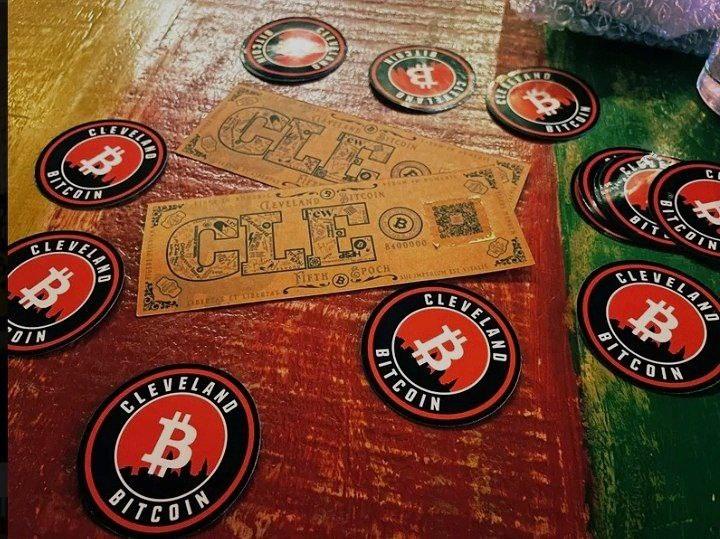
Building on Bitcoin
- You hosted some in-person meetups in Sacramento. What did you learn from those?
My first presentation was on MultiSig storage with SeedSigner, and submarine swaps through Boltz.exchange.
I realized quickly that I had overestimated the group’s technical background. Even the meetup organizer, a financial advisor, asked, “How is anyone supposed to follow these steps?” I responded that reading was required… He decided that Unchained is an easier way.
At a crypto meetup, I gave a much simpler talk, outlining how bitcoin will save the world, based on a DarthCoin’s guide. Only one person stuck around to ask questions – a man who seemed a little out there, and did not really seem to get the message beyond the strength of cryptographic security of bitcoin.
Again, I overestimated the audience’s readiness. That forced me to rethink my strategy. People are extremely early and reluctant to study.
- Now in Ohio, you hold sessions via the Orange Pill App. What’s changed?
My new motto is: educate the educators. The corollary is: don’t orange-pill stupid normies (as DarthCoin puts it).
I’ve shifted to small, technical sessions in order to raise a few solid guardians of this esoteric knowledge who really get it and can carry it forward.
The youngest attendee at one of my sessions is a newborn baby – he mostly sleeps, but maybe he still absorbs some of the educational vibes.
- How do local groups like Sactown and Cleveland Bitcoiners influence your work?
Every meetup reflects its local culture. Sacramento and Bay Area Bitcoiners, for example, do camping trips – once we camped through a desert storm, shielding our burgers from sand while others went to shoot guns.
Cleveland Bitcoiners are different. They amass large gatherings. They recently threw a 100k party. They do a bit more community outreach. Some are curious about the esoteric topics such as jurisdiction, spirituality, and healthful living.
I have no permanent allegiance to any state, race, or group. I go where I can teach and learn. I anticipate that in my next phase, I’ll meet Bitcoiners so advanced that I’ll have to give up my fiat job and focus full-time on serious projects where real health and wealth are on the line.
Hopefully, I’ll be ready. I believe the universe always challenges you exactly to your limit – no less, no more.
- What do people struggle with the most when it comes to technical education?
The biggest struggle isn’t technical – it’s a lack of deep curiosity. People ask “how” and “what” – how do I set up a node, what should one do with the lightning channels? But very few ask “why?”
Why does on-chain bitcoin not contribute to the circular economy? Why is it essential to run Lightning? Why did humanity fall into mental enslavement in the first place?
I’d rather teach two-year-olds who constantly ask “why” than adults who ask how to flip a profit. What worries me most is that most two-year-olds will grow up asking state-funded AI bots for answers and live according to its recommendations.
- One Cleveland Bitcoiner shows up at gold bug meetups. How valuable is face-to-face education?
I don’t think the older generation is going to reverse the current human condition. Most of them have been under mind control for too long, and they just don’t have the attention span to study and change their ways.
They’re better off stacking gold and helping fund their grandkids’ education. If I were to focus on a demographic, I’d go for teenagers – high school age – because by college, the indoctrination is usually too strong, and they’re chasing fiat mastery.
As for the gold bug meetup? Perhaps one day I will show up with a ukulele to sing some bitcoin-themed songs. Seniors love such entertainment.
- How do you choose what to focus on in your sessions, especially for different types of learners?
I don’t come in with a rigid agenda. I’ve collected a massive library of resources over the years and never stopped reading. My browser tab and folder count are exploding.
At the meetup, people share questions or topics they’re curious about, then I take that home, do my homework, and bring back a session based on those themes. I give them the key takeaways, plus where to dive deeper.
Most people won’t – or can’t – study the way I do, and I expect attendees to put in the work. I suspect that it’s more important to reach those who want to learn but don’t know how, the so-called nescient (not knowing), rather than the ignorant.
There are way too many ignorant bitcoiners, so my mission is to find those who are curious what’s beyond the facade of fake reality and superficial promises.
That naturally means that fewer people show up, and that’s fine. I’m not here for the crowds; I’m here to educate the educators. One bitcoiner who came decided to branch off into self-custody sessions and that’s awesome. Personally, I’m much more focused on Lightning.
I want to see broader adoption of tools like auth, sign-message, NWC, and LSPs. Next month, I’m going deep into eCash solutions, because let’s face it – most newcomers won’t be able to afford their own UTXO or open a lightning channel; additionally, it has to be fun and easy for them to transact sats, otherwise they won’t do it. Additionally, they’ll need to rely on
-
 @ b7274d28:c99628cb
2025-05-27 07:07:33
@ b7274d28:c99628cb
2025-05-27 07:07:33A few months ago, a nostrich was switching from iOS to Android and asked for suggestions for #Nostr apps to try out. nostr:npub18ams6ewn5aj2n3wt2qawzglx9mr4nzksxhvrdc4gzrecw7n5tvjqctp424 offered the following as his response:
nostr:nevent1qvzqqqqqqypzq0mhp4ja8fmy48zuk5p6uy37vtk8tx9dqdwcxm32sy8nsaa8gkeyqydhwumn8ghj7un9d3shjtnwdaehgunsd3jkyuewvdhk6tcpz4mhxue69uhhyetvv9ujuerpd46hxtnfduhszythwden5te0dehhxarj9emkjmn99uqzpwwts6n28eyvjpcwvu5akkwu85eg92dpvgw7cgmpe4czdadqvnv984rl0z
Yes. #Android users are fortunate to have some powerful Nostr apps and tools at our disposal that simply have no comparison over on the iOS side. However, a tool is only as good as the knowledge of the user, who must have an understanding of how best to wield it for maximum effect. This fact was immediately evidenced by replies to Derek asking, "What is the use case for Citrine?" and "This is the first time I'm hearing about Citrine and Pokey. Can you give me links for those?"
Well, consider this tutorial your Nostr starter-kit for Android. We'll go over installing and setting up Amber, Amethyst, Citrine, and Pokey, and as a bonus we'll be throwing in the Zapstore and Coinos to boot. We will assume no previous experience with any of the above, so if you already know all about one or more of these apps, you can feel free to skip that tutorial.
So many apps...
You may be wondering, "Why do I need so many apps to use Nostr?" That's perfectly valid, and the honest answer is, you don't. You can absolutely just install a Nostr client from the Play Store, have it generate your Nostr identity for you, and stick with the default relays already set up in that app. You don't even need to connect a wallet, if you don't want to. However, you won't experience all that Nostr has to offer if that is as far as you go, any more than you would experience all that Italian cuisine has to offer if you only ever try spaghetti.
Nostr is not just one app that does one thing, like Facebook, Twitter, or TikTok. It is an entire ecosystem of applications that are all built on top of a protocol that allows them to be interoperable. This set of tools will help you make the most out of that interoperability, which you will never get from any of the big-tech social platforms. It will provide a solid foundation for you to build upon as you explore more and more of what Nostr has to offer.
So what do these apps do?

Fundamental to everything you do on Nostr is the need to cryptographically sign with your private key. If you aren't sure what that means, just imagine that you had to enter your password every time you hit the "like" button on Facebook, or every time you commented on the latest dank meme. That would get old really fast, right? That's effectively what Nostr requires, but on steroids.
To keep this from being something you manually have to do every 5 seconds when you post a note, react to someone else's note, or add a comment, Nostr apps can store your private key and use it to sign behind the scenes for you. This is very convenient, but it means you are trusting that app to not do anything with your private key that you don't want it to. You are also trusting it to not leak your private key, because anyone who gets their hands on it will be able to post as you, see your private messages, and effectively be you on Nostr. The more apps you give your private key to, the greater your risk that it will eventually be compromised.
Enter #Amber, an application that will store your private key in only one app, and all other compatible Nostr apps can communicate with it to request a signature, without giving any of those other apps access to your private key.
Most Nostr apps for Android now support logging in and signing with Amber, and you can even use it to log into apps on other devices, such as some of the web apps you use on your PC. It's an incredible tool given to us by nostr:npub1w4uswmv6lu9yel005l3qgheysmr7tk9uvwluddznju3nuxalevvs2d0jr5, and only available for Android users. Those on iPhone are incredibly jealous that they don't have anything comparable, yet.

Speaking of nostr:npub1w4uswmv6lu9yel005l3qgheysmr7tk9uvwluddznju3nuxalevvs2d0jr5, the next app is also one of his making.
All Nostr data is stored on relays, which are very simple servers that Nostr apps read notes from and write notes to. In most forms of social media, it can be a pain to get your own data out to keep a backup. That's not the case on Nostr. Anyone can run their own relay, either for the sake of backing up their personal notes, or for others to post their notes to, as well.
Since Nostr notes take up very little space, you can actually run a relay on your phone. I have been on Nostr for almost 2 and a half years, and I have 25,000+ notes of various kinds on my relay, and a backup of that full database is just 24MB on my phone's storage.
Having that backup can save your bacon if you try out a new Nostr client and it doesn't find your existing follow list for some reason, so it writes a new one and you suddenly lose all of the people you were following. Just pop into your #Citrine relay, confirm it still has your correct follow list or import it from a recent backup, then have Citrine restore it. Done.
Additionally, there are things you may want to only save to a relay you control, such as draft messages that you aren't ready to post publicly, or eCash tokens, which can actually be saved to Nostr relays now. Citrine can also be used with Amber for signing into certain Nostr applications that use a relay to communicate with Amber.
If you are really adventurous, you can also expose Citrine over Tor to be used as an outbox relay, or used for peer-to-peer private messaging, but that is far more involved than the scope of this tutorial series.

You can't get far in Nostr without a solid and reliable client to interact with. #Amethyst is the client we will be using for this tutorial because there simply isn't another Android client that comes close, so far. Moreover, it can be a great client for new users to get started on, and yet it has a ton of features for power-users to take advantage of as well.
There are plenty of other good clients to check out over time, such as Coracle, YakiHonne, Voyage, Olas, Flotilla and others, but I keep coming back to Amethyst, and by the time you finish this tutorial, I think you'll see why. nostr:npub1gcxzte5zlkncx26j68ez60fzkvtkm9e0vrwdcvsjakxf9mu9qewqlfnj5z and others who have contributed to Amethyst have really built something special in this client, and it just keeps improving with every update that's shipped.

Most social media apps have some form of push notifications, and some Nostr apps do, too. Where the issue comes in is that Nostr apps are all interoperable. If you have more than one application, you're going to have both of them notifying you. Nostr users are known for having five or more Nostr apps that they use regularly. If all of them had notifications turned on, it would be a nightmare. So maybe you limit it to only one of your Nostr apps having notifications turned on, but then you are pretty well locked-in to opening that particular app when you tap on the notification.
Pokey, by nostr:npub1v3tgrwwsv7c6xckyhm5dmluc05jxd4yeqhpxew87chn0kua0tjzqc6yvjh, solves this issue, allowing you to turn notifications off for all of your Nostr apps, and have Pokey handle them all for you. Then, when you tap on a Pokey notification, you can choose which Nostr app to open it in.
Pokey also gives you control over the types of things you want to be notified about. Maybe you don't care about reactions, and you just want to know about zaps, comments, and direct messages. Pokey has you covered. It even supports multiple accounts, so you can get notifications for all the npubs you control.

One of the most unique and incredibly fun aspects of Nostr is the ability to send and receive #zaps. Instead of merely giving someone a 👍️ when you like something they said, you can actually send them real value in the form of sats, small portions of a Bitcoin. There is nothing quite like the experience of receiving your first zap and realizing that someone valued what you said enough to send you a small amount (and sometimes not so small) of #Bitcoin, the best money mankind has ever known.
To be able to have that experience, though, you are going to need a wallet that can send and receive zaps, and preferably one that is easy to connect to Nostr applications. My current preference for that is Alby Hub, but not everyone wants to deal with all that comes along with running a #Lightning node. That being the case, I have opted to use nostr:npub1h2qfjpnxau9k7ja9qkf50043xfpfy8j5v60xsqryef64y44puwnq28w8ch for this tutorial, because they offer one of the easiest wallets to set up, and it connects to most Nostr apps by just copy/pasting a connection string from the settings in the wallet into the settings in your Nostr app of choice.
Additionally, even though #Coinos is a custodial wallet, you can have it automatically transfer any #sats over a specified threshold to a separate wallet, allowing you to mitigate the custodial risk without needing to keep an eye on your balance and make the transfer manually.

Most of us on Android are used to getting all of our mobile apps from one souce: the Google Play Store. That's not possible for this tutorial series. Only one of the apps mentioned above is available in Google's permissioned playground. However, on Android we have the advantage of being able to install whatever we want on our device, just by popping into our settings and flipping a toggle. Indeed, thumbing our noses at big-tech is at the heart of the Nostr ethos, so why would we make ourselves beholden to Google for installing Nostr apps?
The nostr:npub10r8xl2njyepcw2zwv3a6dyufj4e4ajx86hz6v4ehu4gnpupxxp7stjt2p8 is an alternative app store made by nostr:npub1wf4pufsucer5va8g9p0rj5dnhvfeh6d8w0g6eayaep5dhps6rsgs43dgh9 as a resource for all sorts of open-source apps, but especially Nostr apps. What is more, you can log in with Amber, connect a wallet like Coinos, and support the developers of your favorite Nostr apps directly within the #Zapstore by zapping their app releases.
One of the biggest features of the Zapstore is the fact that developers can cryptographically sign their app releases using their Nostr keys, so you know that the app you are downloading is the one they actually released and hasn't been altered in any way. The Zapstore will warn you and won't let you install the app if the signature is invalid.
Getting Started
Since the Zapstore will be the source we use for installing most of the other apps mentioned, we will start with installing the Zapstore.
We will then use the Zapstore to install Amber and set it up with our Nostr account, either by creating a new private key, or by importing one we already have. We'll also use it to log into the Zapstore.
Next, we will install Amethyst from the Zapstore and log into it via Amber.
After this, we will install Citrine from the Zapstore and add it as a local relay on Amethyst.
Because we want to be able to send and receive zaps, we will set up a wallet with CoinOS and connect it to Amethyst and the Zapstore using Nostr Wallet Connect.
Finally, we will install Pokey using the Zapstore, log into it using Amber, and set up the notifications we want to receive.
By the time you are done with this series, you will have a great head-start on your Nostr journey compared to muddling through it all on your own. Moreover, you will have developed a familiarity with how things generally work on Nostr that can be applied to other apps you try out in the future.
Continue to Part 2: The Zapstore. Nostr Link: nostr:naddr1qvzqqqr4gupzpde8f55w86vrhaeqmd955y4rraw8aunzxgxstsj7eyzgntyev2xtqydhwumn8ghj7un9d3shjtnzwf5kw6r5vfhkcapwdejhgtcqp5cnwdphxv6rwwp3xvmnzvqgty5au
-
 @ c1e6505c:02b3157e
2025-05-27 01:11:45
@ c1e6505c:02b3157e
2025-05-27 01:11:45I spent Memorial Day swimming in the local river - something I try to do at least four times a week. It’s the best form of exercise imo, but it’s more than that. Swimming against the tide, feeling the water move around me... there’s something about it that keeps me grounded. Nature at her peak.
Today I brought my X-Pro2 with the 1959 Leica Summaron 35mm f/2.8. I'm still testing the lens wide open to get a feel for its character. My subject this time: the light playing on the ripples and waves.
While I was shooting, a kid randomly ran up to me and started telling me something about what he got for his dad while fishing, or something - I didn’t quite hear him - and then he asked what I was looking at. I told him, “The ripples. The way the light is refracting.” I had him sit exactly where I was so he could see it too.
He lit up. You could tell no one had ever pointed something like that out to him before. In that moment, I felt like maybe I was able to plant a little seed - a new way of seeing.
This is what I was looking at.

-
 @ eb0157af:77ab6c55
2025-06-01 02:01:09
@ eb0157af:77ab6c55
2025-06-01 02:01:09A new investment vehicle combines exposure to Bitcoin with downside protection based on the price of gold.
On May 29, Cantor Fitzgerald Asset Management announced the launch of an investment product that merges direct exposure to Bitcoin with a bearish hedge linked to gold.
According to the financial institution, the new fund offers a solution for investors seeking to benefit from the growth potential of the leading cryptocurrency while maintaining a safety net tied to the precious metal.
Fund features
The fund is structured with a five-year term and no cap on potential upside, allowing investors to fully capture Bitcoin’s growth. The “1-to-1” protection mechanism means that any losses on Bitcoin would be offset by corresponding gains from gold.
Brandon Lutnick, Chairman of Cantor and son of former CEO Howard Lutnick (now Commerce Secretary in the Trump administration), called the product “a truly revolutionary investment vehicle” that helps investors access Bitcoin’s potential while providing downside protection. “There are still people on the Earth that are still scared of Bitcoin, and we want to bring them into this ecosystem,” Lutnick added.
The fund marks Cantor Fitzgerald’s first BTC-focused investment product. The firm, with 79 years of history and $14.8 billion in assets under management, is making its first significant move into the Bitcoin market.
The announcement follows the closing of its first round of financing agreements with Maple Finance and FalconX. Through its “Bitcoin Financing Business” division, Cantor plans to initially make up to $2 billion in financing available to institutional clients.
The post Cantor Fitzgerald launches Bitcoin fund with gold hedge appeared first on Atlas21.
-
 @ b1ddb4d7:471244e7
2025-06-01 02:00:50
@ b1ddb4d7:471244e7
2025-06-01 02:00:50Custodial Lightning wallets allow users to transact without managing private keys or channel liquidity. The provider handles technical complexities, but this convenience comes with critical trade-offs:
- You don’t control your keys: The custodian holds your bitcoin.
- Centralized points of failure: Servers can be hacked or shut down.
- Surveillance risks: Providers track transaction metadata.
Key Risks of Custodial Lightning Wallets
*1. Hacks and Exit Scams*
Custodians centralize large amounts of bitcoin, attracting hackers:
- Nearly $2.2 billion worth of funds were stolen from hacks in 2024.
- Lightning custodians suffered breaches, losing user funds.
Unlike non-custodial wallets, victims have no recourse since they don’t hold keys.
*2. Censorship and Account Freezes*
Custodians comply with regulators, risking fund seizures:
- Strike (a custodial Lightning app) froze accounts of users in sanctioned regions.
- A U.K. court in 2020 ordered Bitfinex to freeze bitcoin worth $860,000 after the exchange and blockchain sleuthing firm Chainalysis traced the funds to a ransomware payment.
*3. Privacy Erosion*
Custodians log user activity, exposing sensitive data:
- Transaction amounts, receiver addresses, and IPs are recorded.
*4. Service Downtime*
Centralized infrastructure risks outages.
*5. Inflation of Lightning Network Centralization*
Custodians dominate liquidity, weakening network resilience:
- At the moment, 10% of the nodes on Lightning control 80% of the liquidity.
- This centralization contradicts bitcoin’s decentralized ethos.
How to Switch to Self-Custodial Lightning Wallets
Migrating from custodial services is straightforward:
*1. Choose a Non-Custodial Wallet*
Opt for wallets that let you control keys and channels:
- Flash: The self-custodial tool that lets you own your keys, control your coins, and transact instantly.
- Breez Wallet : Non-custodial, POS integrations.
- Core Lightning : Advanced, for self-hosted node operators.
*2. Transfer Funds Securely*
- Withdraw funds from your custodial wallet to a bitcoin on-chain address.
- Send bitcoin to your non-custodial Lightning wallet.
*3. Set Up Channel Backups*
Use tools like Static Channel Backups (SCB) to recover channels if needed.
*4. Best Practices*
- Enable Tor: Mask your IP (e.g., Breez’s built-in Tor support).
- Verify Receiving Addresses: Avoid phishing scams.
- Regularly Rebalance Channels: Use tools like Lightning Pool for liquidity.
Why Self-Custodial Lightning Matters
- Self-custody: Control your keys and funds.
- Censorship resistance: No third party can block transactions.
- Network health: Decentralized liquidity strengthens Lightning.
Self-custodial wallets now rival custodial ease.
Custodial Lightning wallets sacrifice security for convenience, putting users at risk of hacks, surveillance, and frozen funds. As bitcoin adoption grows, so does the urgency to embrace self-custodial solutions.
Take action today:
- Withdraw custodial funds to a hardware wallet.
- Migrate to a self-custodial Lightning wallet.
- Educate others on the risks of custodial control.
The Lightning Network’s potential hinges on decentralization—don’t let custodians become its Achilles’ heel.
-
 @ dfa02707:41ca50e3
2025-06-01 03:01:33
@ dfa02707:41ca50e3
2025-06-01 03:01:33News
- Bitcoin mining centralization in 2025. According to a blog post by b10c, Bitcoin mining was at its most decentralized in May 2017, with another favorable period from 2019 to 2022. However, starting in 2023, mining has become increasingly centralized, particularly due to the influence of large pools like Foundry and the use of proxy pooling by entities such as AntPool.

Source: b10c's blog.
- OpenSats announces the eleventh wave of Nostr grants. The five projects in this wave are the mobile live-streaming app Swae, the Nostr-over-ham-radio project HAMSTR, Vertex—a Web-of-Trust (WOT) service for Nostr developers, Nostr Double Ratchet for end-to-end encrypted messaging, and the Nostr Game Engine for building games and applications integrated with the Nostr ecosystem.
- New Spiral grantee: l0rinc. In February 2024, l0rinc transitioned to full-time work on Bitcoin Core. His efforts focus on performance benchmarking and optimizations, enhancing code quality, conducting code reviews, reducing block download times, optimizing memory usage, and refactoring code.
- Project Eleven offers 1 BTC to break Bitcoin's cryptography with a quantum computer. The quantum computing research organization has introduced the Q-Day Prize, a global challenge that offers 1 BTC to the first team capable of breaking an elliptic curve cryptographic (ECC) key using Shor’s algorithm on a quantum computer. The prize will be awarded to the first team to successfully accomplish this breakthrough by April 5, 2026.
- Unchained has launched the Bitcoin Legacy Project. The initiative seeks to advance the Bitcoin ecosystem through a bitcoin-native donor-advised fund platform (DAF), investments in community hubs, support for education and open-source development, and a commitment to long-term sustainability with transparent annual reporting.
- In its first year, the program will provide support to Bitcoin hubs in Nashville, Austin, and Denver.
- Support also includes $50,000 to the Bitcoin Policy Institute, a $150,000 commitment at the University of Austin, and up to $250,000 in research grants through the Bitcoin Scholars program.
"Unchained will match grants 1:1 made to partner organizations who support Bitcoin Core development when made through the Unchained-powered bitcoin DAF, up to 1 BTC," was stated in a blog post.
- Block launched open-source tools for Bitcoin treasury management. These include a dashboard for managing corporate bitcoin holdings and provides a real-time BTC-to-USD price quote API, released as part of the Block Open Source initiative. The company’s own instance of the bitcoin holdings dashboard is available here.
Source: block.xyz
- Bull Bitcoin expands to Mexico, enabling anyone in the country to receive pesos from anywhere in the world straight from a Bitcoin wallet. Additionally, users can now buy Bitcoin with a Mexican bank account.
"Bull Bitcoin strongly believes in Bitcoin’s economic potential in Mexico, not only for international remittances and tourism, but also for Mexican individuals and companies to reclaim their financial sovereignty and protect their wealth from inflation and the fragility of traditional financial markets," said Francis Pouliot, Founder and CEO of Bull Bitcoin.
- Corporate bitcoin holdings hit a record high in Q1 2025. According to Bitwise, public companies' adoption of Bitcoin has hit an all-time high. In Q1 2025, these firms collectively hold over 688,000 BTC, marking a 16.11% increase from the previous quarter. This amount represents 3.28% of Bitcoin's fixed 21 million supply.

Source: Bitwise.
- The Bitcoin Bond Company for institutions has launched with the aim of acquiring $1 trillion in Bitcoin over 21 years. It utilizes secure, transparent, and compliant bond-like products backed by Bitcoin.
- The U.S. Senate confirmed Paul Atkins as Chair of the Securities and Exchange Commission (SEC). At his confirmation hearing, Atkins emphasized the need for a clear framework for digital assets. He aims to collaborate with the CFTC and Congress to address jurisdiction and rulemaking gaps, aligning with the Trump administration's goal to position the U.S. as a leader in Bitcoin and blockchain finance.
- Ethereum developer Virgil Griffith has been released from custody. Griffith, whose sentence was reduced to 56 months, is now seeking a pardon. He was initially sentenced to 63 months for allegedly violating international sanctions laws by providing technical advice on using cryptocurrencies and blockchain technology to evade sanctions during a presentation titled 'Blockchains for Peace' in North Korea.
- No-KYC exchange eXch to close down under money laundering scrutiny. The privacy-focused cryptocurrency trading platform said it will cease operations on May 1. This decision follows allegations that the platform was used by North Korea's Lazarus Group for money laundering. eXch revealed it is the subject of an active "transatlantic operation" aimed at shutting down the platform and prosecuting its team for "money laundering and terrorism."
- Blockstream combats ESP32 FUD concerning Jade signers. The company stated that after reviewing the vulnerability disclosed in early March, Jade was found to be secure. Espressif Systems, the designer of the ESP32, has since clarified that the "undocumented commands" do not constitute a "backdoor."
- Bank of America is lobbying for regulations that favor banks over tech firms in stablecoin issuance. The bank's CEO Brian Moynihan is working with groups such as the American Bankers Association to advance the issuance of a fully reserved, 1:1 backed "Bank of America coin." If successful, this could limit stablecoin efforts by non-banks like Tether, Circle, and others, reports The Block.
- Tether to back OCEAN Pool with its hashrate. "As a company committed to financial freedom and open access, we see supporting decentralization in Bitcoin mining as essential to the network’s long-term integrity," said Tether CEO Paolo Ardoino.
- Bitdeer to expand its self-mining operations to navigate tariffs. The Singapore-based mining company is advancing plans to produce machines in the U.S. while reducing its mining hardware sales. This response is in light of increasing uncertainties related to U.S. trade policy, as reported by Bloomberg.
- Tether acquires $32M in Bitdeer shares. The firm has boosted its investment in Bitdeer during a wider market sell-off, with purchases in early to mid-April amounting to about $32 million, regulatory filings reveal.
- US Bitcoin miner manufacturer Auradine has raised $153 million in a Series C funding round as it expands into AI infrastructure. The round was led by StepStone Group and included participation from Maverick Silicon, Premji Invest, Samsung Catalyst Fund, Qualcomm Ventures, Mayfield, MARA Holdings, GSBackers, and other existing investors. The firm raised to over $300 million since its inception in 2022.
- Voltage has partnered with BitGo to [enable](https://www.voltage.cloud/blog/bitgo-and-voltage-team-up-to-deliver-instant-bitcoin-and-stabl
-
 @ dfa02707:41ca50e3
2025-05-31 15:01:34
@ dfa02707:41ca50e3
2025-05-31 15:01:34- This version introduces the Soroban P2P network, enabling Dojo to relay transactions to the Bitcoin network and share others' transactions to break the heuristic linking relaying nodes to transaction creators.
- Additionally, Dojo admins can now manage API keys in DMT with labels, status, and expiration, ideal for community Dojo providers like Dojobay. New API endpoints, including "/services" exposing Explorer, Soroban, and Indexer, have been added to aid wallet developers.
- Other maintenance updates include Bitcoin Core, Tor, Fulcrum, Node.js, plus an updated ban-knots script to disconnect inbound Knots nodes.
"I want to thank all the contributors. This again shows the power of true Free Software. I also want to thank everyone who donated to help Dojo development going. I truly appreciate it," said Still Dojo Coder.
What's new
- Soroban P2P network. For MyDojo (Docker setup) users, Soroban will be automatically installed as part of their Dojo. This integration allows Dojo to utilize the Soroban P2P network for various upcoming features and applications.
- PandoTx. PandoTx serves as a transaction transport layer. When your wallet sends a transaction to Dojo, it is relayed to a random Soroban node, which then forwards it to the Bitcoin network. It also enables your Soroban node to receive and relay transactions from others to the Bitcoin network and is designed to disrupt the assumption that a node relaying a transaction is closely linked to the person who initiated it.
- Pushing transactions through Soroban can be deactivated by setting
NODE_PANDOTX_PUSH=offindocker-node.conf. - Processing incoming transactions from Soroban network can be deactivated by setting
NODE_PANDOTX_PROCESS=offindocker-node.conf.
- Pushing transactions through Soroban can be deactivated by setting
- API key management has been introduced to address the growing number of people offering their Dojos to the community. Dojo admins can now access a new API management tab in their DMT, where they can create unlimited API keys, assign labels for easy identification, and set expiration dates for each key. This allows admins to avoid sharing their main API key and instead distribute specific keys to selected parties.
- New API endpoints. Several new API endpoints have been added to help API consumers develop features on Dojo more efficiently:
- New:
/latest-block- returns data about latest block/txout/:txid/:index- returns unspent output data/support/services- returns info about services that Dojo exposes
- Updated:
/tx/:txid- endpoint has been updated to return raw transaction with parameter?rawHex=1
- The new
/support/servicesendpoint replaces the deprecatedexplorerfield in the Dojo pairing payload. Although still present, API consumers should use this endpoint for explorer and other pairing data.
- New:
Other changes
- Updated ban script to disconnect inbound Knots nodes.
- Updated Fulcrum to v1.12.0.
- Regenerate Fulcrum certificate if expired.
- Check if transaction already exists in pushTx.
- Bump BTC-RPC Explorer.
- Bump Tor to v0.4.8.16, bump Snowflake.
- Updated Bitcoin Core to v29.0.
- Removed unnecessary middleware.
- Fixed DB update mechanism, added api_keys table.
- Add an option to use blocksdir config for bitcoin blocks directory.
- Removed deprecated configuration.
- Updated Node.js dependencies.
- Reconfigured container dependencies.
- Fix Snowflake git URL.
- Fix log path for testnet4.
- Use prebuilt addrindexrs binaries.
- Add instructions to migrate blockchain/fulcrum.
- Added pull policies.


Learn how to set up and use your own Bitcoin privacy node with Dojo here.
-
 @ 7f6db517:a4931eda
2025-06-01 02:01:32
@ 7f6db517:a4931eda
2025-06-01 02:01:32
I often hear "bitcoin doesn't interest me, I'm not a finance person."
Ironically, the beauty of sound money is you don't have to be. In the current system you're expected to manage a diversified investment portfolio or pay someone to do it. Bitcoin will make that optional.
— ODELL (@ODELL) September 16, 2018
At first glance bitcoin often appears overwhelming to newcomers. It is incredibly easy to get bogged down in the details of how it works or different ways to use it. Enthusiasts, such as myself, often enjoy going down the deep rabbit hole of the potential of bitcoin, possible pitfalls and theoretical scenarios, power user techniques, and the developer ecosystem. If your first touch point with bitcoin is that type of content then it is only natural to be overwhelmed. While it is important that we have a thriving community of bitcoiners dedicated to these complicated tasks - the true beauty of bitcoin lies in its simplicity. Bitcoin is simply better money. It is the best money we have ever had.
Life is complicated. Life is hard. Life is full of responsibility and surprises. Bitcoin allows us to focus on our lives while relying on a money that is simple. A money that is not controlled by any individual, company, or government. A money that cannot be easily seized or blocked. A money that cannot be devalued at will by a handful of corrupt bureaucrat who live hundreds of miles from us. A money that can be easily saved and should increase in purchasing power over time without having to learn how to "build a diversified stock portfolio" or hire someone to do it for us.
Bitcoin enables all of us to focus on our lives - our friends and family - doing what we love with the short time we have on this earth. Time is scarce. Life is complicated. Bitcoin is the most simple aspect of our complicated lives. If we spend our scarce time working then we should be able to easily save that accrued value for future generations without watching the news or understanding complicated financial markets. Bitcoin makes this possible for anyone.
Yesterday was Mother's Day. Raising a human is complicated. It is hard, it requires immense personal responsibility, it requires critical thinking, but mothers figure it out, because it is worth it. Using and saving bitcoin is simple - simply install an app on your phone. Every mother can do it. Every person can do it.
Life is complicated. Life is beautiful. Bitcoin is simple.
If you found this post helpful support my work with bitcoin.

-
 @ 7f6db517:a4931eda
2025-05-31 12:01:48
@ 7f6db517:a4931eda
2025-05-31 12:01:48
What is KYC/AML?
- The acronym stands for Know Your Customer / Anti Money Laundering.
- In practice it stands for the surveillance measures companies are often compelled to take against their customers by financial regulators.
- Methods differ but often include: Passport Scans, Driver License Uploads, Social Security Numbers, Home Address, Phone Number, Face Scans.
- Bitcoin companies will also store all withdrawal and deposit addresses which can then be used to track bitcoin transactions on the bitcoin block chain.
- This data is then stored and shared. Regulations often require companies to hold this information for a set number of years but in practice users should assume this data will be held indefinitely. Data is often stored insecurely, which results in frequent hacks and leaks.
- KYC/AML data collection puts all honest users at risk of theft, extortion, and persecution while being ineffective at stopping crime. Criminals often use counterfeit, bought, or stolen credentials to get around the requirements. Criminals can buy "verified" accounts for as little as $200. Furthermore, billions of people are excluded from financial services as a result of KYC/AML requirements.
During the early days of bitcoin most services did not require this sensitive user data, but as adoption increased so did the surveillance measures. At this point, most large bitcoin companies are collecting and storing massive lists of bitcoiners, our sensitive personal information, and our transaction history.
Lists of Bitcoiners
KYC/AML policies are a direct attack on bitcoiners. Lists of bitcoiners and our transaction history will inevitably be used against us.
Once you are on a list with your bitcoin transaction history that record will always exist. Generally speaking, tracking bitcoin is based on probability analysis of ownership change. Surveillance firms use various heuristics to determine if you are sending bitcoin to yourself or if ownership is actually changing hands. You can obtain better privacy going forward by using collaborative transactions such as coinjoin to break this probability analysis.
Fortunately, you can buy bitcoin without providing intimate personal information. Tools such as peach, hodlhodl, robosats, azteco and bisq help; mining is also a solid option: anyone can plug a miner into power and internet and earn bitcoin by mining privately.
You can also earn bitcoin by providing goods and/or services that can be purchased with bitcoin. Long term, circular economies will mitigate this threat: most people will not buy bitcoin - they will earn bitcoin - most people will not sell bitcoin - they will spend bitcoin.
There is no such thing as KYC or No KYC bitcoin, there are bitcoiners on lists and those that are not on lists.
If you found this post helpful support my work with bitcoin.

-
 @ 06639a38:655f8f71
2025-05-26 14:21:37
@ 06639a38:655f8f71
2025-05-26 14:21:37Finally there is a release (1.7.0) for Nostr-PHP with a full NIP-19 integration. Here is an example file with some snippets to how it works to encode and decode bech32 encoded entities:
- https://github.com/nostrver-se/nostr-php/blob/main/src/Examples/nip19-bech32-decoded-entities.php
- https://github.com/nostrver-se/nostr-php/blob/main/src/Examples/nip19-bech32-encoded-entities.php
Now merge request #68 (and issues #74, #64 are closed) is finally merged which I opened in October 2024.
Next up is:
- Create documentation how to use NIP-19 with the library on https://nostr-php.dev
- Create documentation how to use NIP-04 and NIP-44 with the library on https://nostr-php.dev
- Work out a proof-of-concept with the revolt/event-loop package to create concurrent async requests with websocket connections
-
 @ dfa02707:41ca50e3
2025-06-01 02:01:26
@ dfa02707:41ca50e3
2025-06-01 02:01:26Contribute to keep No Bullshit Bitcoin news going.
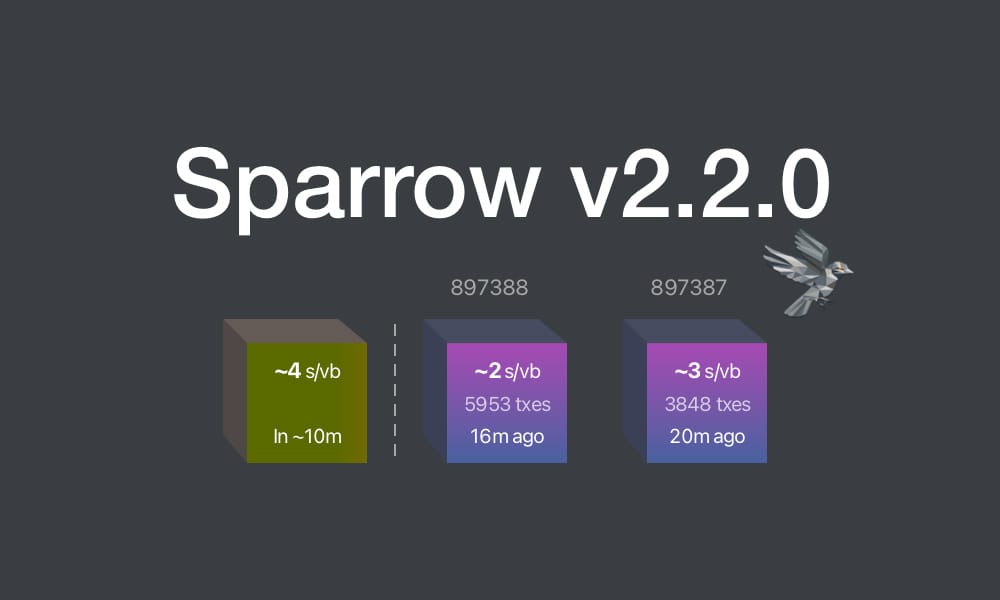
This update brings key enhancements for clarity and usability:
- Recent Blocks View: Added to the Send tab and inspired by Mempool's visualization, it displays the last 2 blocks and the estimated next block to help choose fee rates.
- Camera System Overhaul: Features a new library for higher resolution detection and mouse-scroll zoom support when available.
- Vector-Based Images: All app images are now vectorized and theme-aware, enhancing contrast, especially in dark mode.
- Tor & P2A Updates: Upgraded internal Tor and improved support for pay-to-anchor (P2A) outputs.
- Linux Package Rename: For Linux users, Sparrow has been renamed to sparrowwallet (or sparrowserver); in some cases, the original sparrow package may need manual removal.
- Additional updates include showing total payments in multi-payment transaction diagrams, better handling of long labels, and other UI enhancements.
- Sparrow v2.2.1 is a bug fix release that addresses missing UUID issue when starting Tor on recent macOS versions, icons for external sources in Settings and Recent Blocks view, repackaged
.debinstalls to use older gzip instead of zstd compression, and removed display of median fee rate where fee rates source is set to Server.
Learn how to get started with Sparrow wallet:
Release notes (v2.2.0)
- Added Recent Blocks view to Send tab.
- Converted all bitmapped images to theme aware SVG format for all wallet models and dialogs.
- Support send and display of pay to anchor (P2A) outputs.
- Renamed
sparrowpackage tosparrowwalletandsparrowserveron Linux. - Switched camera library to openpnp-capture.
- Support FHD (1920 x 1080) and UHD4k (3840 x 2160) capture resolutions.
- Support camera zoom with mouse scroll where possible.
- In the Download Verifier, prefer verifying the dropped file over the default file where the file is not in the manifest.
- Show a warning (with an option to disable the check) when importing a wallet with a derivation path matching another script type.
- In Cormorant, avoid calling the
listwalletdirRPC on initialization due to a potentially slow response on Windows. - Avoid server address resolution for public servers.
- Assume server address is non local for resolution failures where a proxy is configured.
- Added a tooltip to indicate truncated labels in table cells.
- Dynamically truncate input and output labels in the tree on a transaction tab, and add tooltips if necessary.
- Improved tooltips for wallet tabs and transaction diagrams with long labels.
- Show the address where available on input and output tooltips in transaction tab tree.
- Show the total amount sent in payments in the transaction diagram when constructing multiple payment transactions.
- Reset preferred table column widths on adjustment to improve handling after window resizing.
- Added accessible text to improve screen reader navigation on seed entry.
- Made Wallet Summary table grow horizontally with dialog sizing.
- Reduced tooltip show delay to 200ms.
- Show transaction diagram fee percentage as less than 0.01% rather than 0.00%.
- Optimized and reduced Electrum server RPC calls.
- Upgraded Bouncy Castle, PGPainless and Logback libraries.
- Upgraded internal Tor to v0.4.8.16.
- Bug fix: Fixed issue with random ordering of keystore origins on labels import.
- Bug fix: Fixed non-zero account script type detection when signing a message on Trezor devices.
- Bug fix: Fixed issue parsing remote Coldcard xpub encoded on a different network.
- Bug fix: Fixed inclusion of fees on wallet label exports.
- Bug fix: Increase Trezor device libusb timeout.
Linux users: Note that the
sparrowpackage has been renamed tosparrowwalletorsparrowserver, and in some cases you may need to manually uninstall the originalsparrowpackage. Look in the/optfolder to ensure you have the new name, and the original is removed.What's new in v2.2.1
- Updated Tor library to fix missing UUID issue when starting Tor on recent macOS versions.
- Repackaged
.debinstalls to use older gzip instead of zstd compression. - Removed display of median fee rate where fee rates source is set to Server.
- Added icons for external sources in Settings and Recent Blocks view
- Bug fix: Fixed issue in Recent Blocks view when switching fee rates source
- Bug fix: Fixed NPE on null fee returned from server
-
 @ b1ddb4d7:471244e7
2025-06-01 02:00:49
@ b1ddb4d7:471244e7
2025-06-01 02:00:49The upcoming Bitcoin 2025 conference, scheduled from May 27–29 at the Venetian Conference Center in Las Vegas, is set to make history with an official attempt to break the GUINNESS WORLD RECORDS® title for the most Bitcoin point-of-sale transactions in an eight-hour period.
Organized by BTC Inc, the event will showcase Bitcoin’s evolution from a digital capital asset to a practical medium of exchange, leveraging the latest advancements in payment technology.
Tap-to-Pay with Lightning-Ready Bolt Cards
To facilitate this record-setting attempt, 4,000 Lightning-ready Bolt Cards will be distributed to conference attendees.
— Uncle Rockstar Developer (@r0ckstardev) May 15, 2025
These NFC-enabled cards allow users to make instant, contactless Bitcoin payments at vendor booths throughout the expo-no apps or QR codes required, just a simple tap.
The cards are available in four collectible designs, each featuring a prominent figure in Bitcoin’s history: Senator Cynthia Lummis, Michael Saylor, Satoshi Nakamoto, and Jack Dorsey.
Each attendee will receive a randomly assigned card, making them both functional and collectible souvenirs.
Senator Lummis: A Playful Provocation
Notably, one of the card designs features Senator Cynthia Lummis with laser eyes-a playful nod to her reputation as a leading Bitcoin advocate in US politics.
While Lummis is known for her legislative efforts to promote Bitcoin integration, she has publicly stated she prefers to “spend dollars and save Bitcoin,” viewing BTC as a long-term store of value rather than a daily currency.
The choice to feature her on the Bolt Card, could be suggested by Rockstar Dev of the BTC Pay Server Foundation, perhaps a lighthearted way to highlight the ongoing debate about Bitcoin’s role in everyday payments.
Nothing cracks me up quite like a senator that wants the US to buy millions of Bitcoin use dollars to buy a beer at a Bitcoin bar.
This is how unserious some of you are. pic.twitter.com/jftIEggmip
— Magoo PhD (@HodlMagoo) April 4, 2025
How Bolt Cards and the Lightning Network Work
Bolt Cards are physical cards equipped with NFC (Near Field Communication) technology, similar to contactless credit or debit cards. When linked to a compatible Lightning wallet, they enable users to make Bitcoin payments over the Lightning Network by simply tapping the card at a point-of-sale terminal.
The Lightning Network is a second-layer protocol built on top of Bitcoin, designed to facilitate instant, low-cost transactions ideal for everyday purchases.
This integration aims to make Bitcoin as easy to use as traditional payment methods, eliminating the need for QR code scanning or mobile apps.
A Showcase for Bitcoin’s Real-World Usability
With over 30,000 attendees, 300 exhibitors, and 500 speakers expected, the Bitcoin 2025 conference is poised to be the largest Bitcoin event of the year-and potentially the most transactional.
The event will feature on-site activations such as the Official Bitcoin Magazine Store, where all merchandise will be available at a 21% discount for those paying with Bitcoin via the Lightning Network-a nod to Bitcoin’s 21 million coin supply limit.
By deeply integrating Lightning payments into the conference experience, organizers hope to demonstrate Bitcoin’s readiness for mainstream commerce and set a new benchmark for its practical use as a currency.
Conclusion
The Guinness World Record attempt at Bitcoin 2025 is more than a publicity stunt-it’s a bold demonstration of Bitcoin’s technological maturity and its potential to function as a modern, everyday payment method.
Whether or not the record is set, the event will serve as a milestone in the ongoing journey to make Bitcoin a truly global, user-friendly currency
-
 @ c2865f41:eaff678a
2025-05-31 20:09:44
@ c2865f41:eaff678a
2025-05-31 20:09:44Unwilling to investigate. No interpellation of neighbors, witnesses, experts. No report emitted commenting on the petition, but just ignoring to answer. As such O.S.R. calls upon the justice system to address the wrongs. The analog drawing of geometer at the time of entree in the register of the O.S.R property
See the map attached, it is annotated and self-explaining, could not be clearer. O.S.R challenges the court to convoke when still alive), and any explanation he can give as to his drawing, now ignored by the same instance(Plav Cadastre) that mandated him in the first place. The example record
See attachment: the example record is out of a Swiss register, note the precise identity and details, address etc. of the owner of said parcel. That is what the constitution of Montenegro subscribes to: to have similar practices respected. The trail into the forest See attachment, another supporting map, as an example of the practices that are pertinent to justify an immediate injunction by the court, of all activities on the contested parcels.
-
 @ 7f6db517:a4931eda
2025-05-31 12:01:47
@ 7f6db517:a4931eda
2025-05-31 12:01:47
People forget Bear Stearns failed March 2008 - months of denial followed before the public realized how bad the situation was under the surface.
Similar happening now but much larger scale. They did not fix fundamental issues after 2008 - everything is more fragile.
The Fed preemptively bailed out every bank with their BTFP program and First Republic Bank still failed. The second largest bank failure in history.
There will be more failures. There will be more bailouts. Depositors will be "protected" by socializing losses across everyone.
Our President and mainstream financial pundits are currently pretending the banking crisis is over while most banks remain insolvent. There are going to be many more bank failures as this ponzi system unravels.
Unlike 2008, we have the ability to opt out of these broken and corrupt institutions by using bitcoin. Bitcoin held in self custody is unique in its lack of counterparty risk - you do not have to trust a bank or other centralized entity to hold it for you. Bitcoin is also incredibly difficult to change by design since it is not controlled by an individual, company, or government - the supply of dollars will inevitably be inflated to bailout these failing banks but bitcoin supply will remain unchanged. I do not need to convince you that bitcoin provides value - these next few years will convince millions.
If you found this post helpful support my work with bitcoin.

-
 @ 06639a38:655f8f71
2025-05-26 12:58:38
@ 06639a38:655f8f71
2025-05-26 12:58:38Nostr-PHP
Djuri submitted quite some pull requests in the last couple of week while he was implementing a Nostr connect / login on https://satsback.com. The backend of that platform is written in PHP so the Nostr-PHP library is used for several purposes while Djuri also developed quite some new features utilizing the following NIPs:
- NIP-04
- NIP-05
- NIP-17
- NIP-44
Thank you very much Djuri for these contributions. We now can do the basic private stuff with the library.
PR for NIP-04 and NIP-44: https://github.com/nostrver-se/nostr-php/pull/84 and https://github.com/nostrver-se/nostr-php/pull/88
Examples:- https://github.com/nostrver-se/nostr-php/blob/main/src/Examples/nip04-encrypted-messages.php
- https://github.com/nostrver-se/nostr-php/blob/main/src/Examples/nip44-gift-wrapping.php
PR for NIP-05: https://github.com/nostrver-se/nostr-php/pull/89
Example: https://github.com/nostrver-se/nostr-php/blob/main/src/Examples/nip05-lookup.phpPR for NIP-17: https://github.com/nostrver-se/nostr-php/pull/90
Example: https://github.com/nostrver-se/nostr-php/blob/main/src/Examples/nip17-private-direct-messages.phpPR for adding more metadata profile fields: https://github.com/nostrver-se/nostr-php/pull/94
Example: https://github.com/nostrver-se/nostr-php/blob/main/src/Examples/fetch-profile-metadata.phpFetch
10050event (dm relay list) of an given pubkey
Example: https://github.com/nostrver-se/nostr-php/blob/main/src/Examples/fetch-dm-relayslist.phpThe CLI tool is removed from the library, see PR https://github.com/nostrver-se/nostr-php/pull/93
Nostr-PHP documentation
While new NIPs are implemented in the Nostr-PHP library, I'm trying to keep up with the documentation at https://nostr-php.dev. For now, things are still much work in progress and I've added the AI agent Goose using the Claude LLM to bootstrap new documentation pages. Currently I'm working on documentation for
- How to direct messages with NIP-04 and NIP-17
- Encrypted payloads for event content NIP-44
- Fetch profiledata of a given pubkey
- Lookup NIP-05 data of given pubkey
- Using the NIP-19 helper class
CCNS.news
I've moved CCNS to a new domain https://ccns.news and have partly implemented the new NIP-B0 for web bookmarks. When you post a bookmark there, a kind
39701event is transmitted to some Nostr relays (take a look at this event for example). Optionally you can also publish this content as a note to the network.As you can see at https://ccns.news/l/censorship-resistant-publishing-and-archiving, I've listed some todo's. All this stuff is done with Javascript using the NDK Typescript library (so I'm not using any PHP stuff for this with Nostr-PHP).
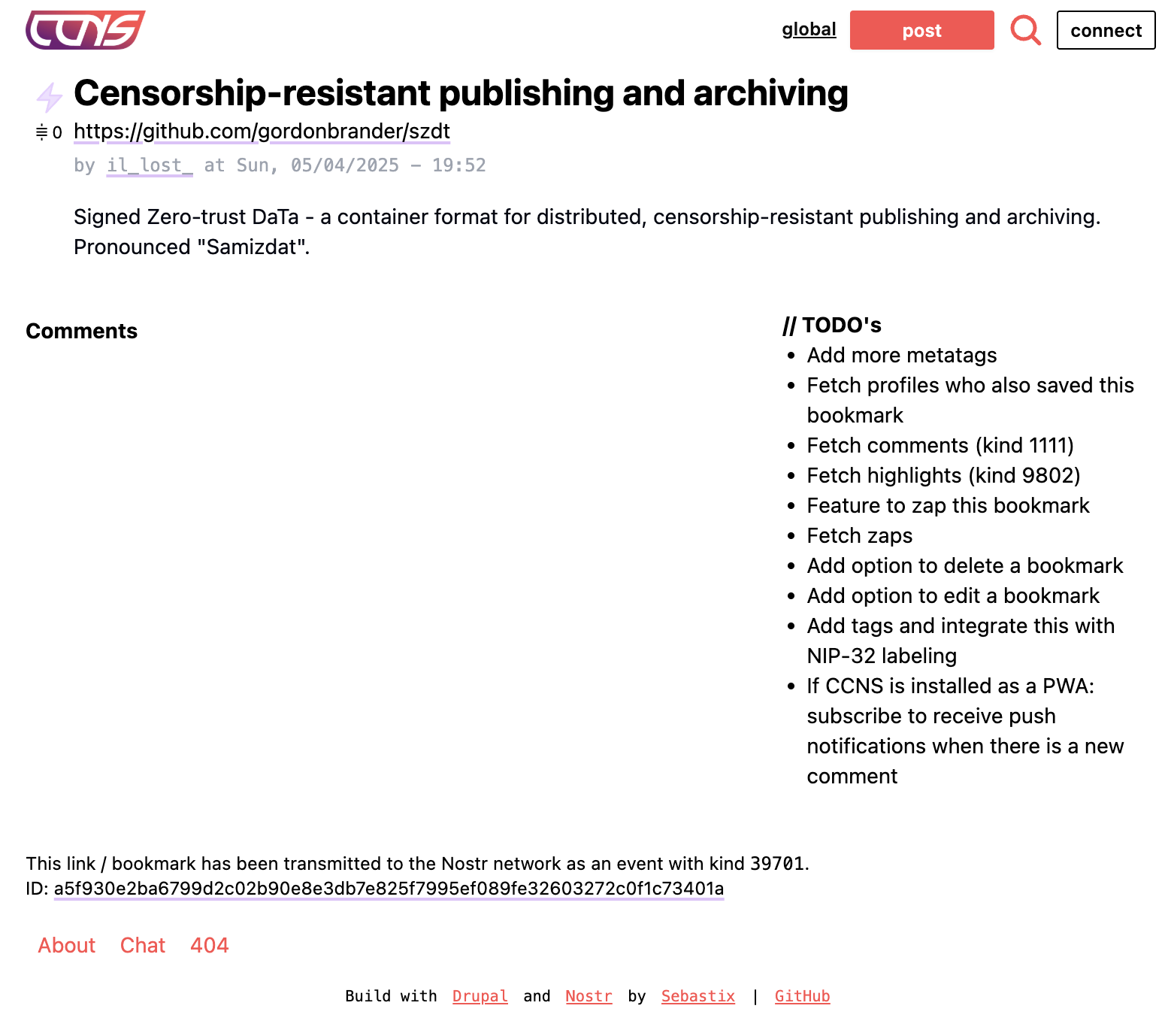
Also new: https://ccns.news/global now has a global feed which fetches all the web bookmark events with kind
39701from several public Nostr relays. I had a rough idea to compare feeds generated with NDK and Nostr-PHP (for both using the same set of relays).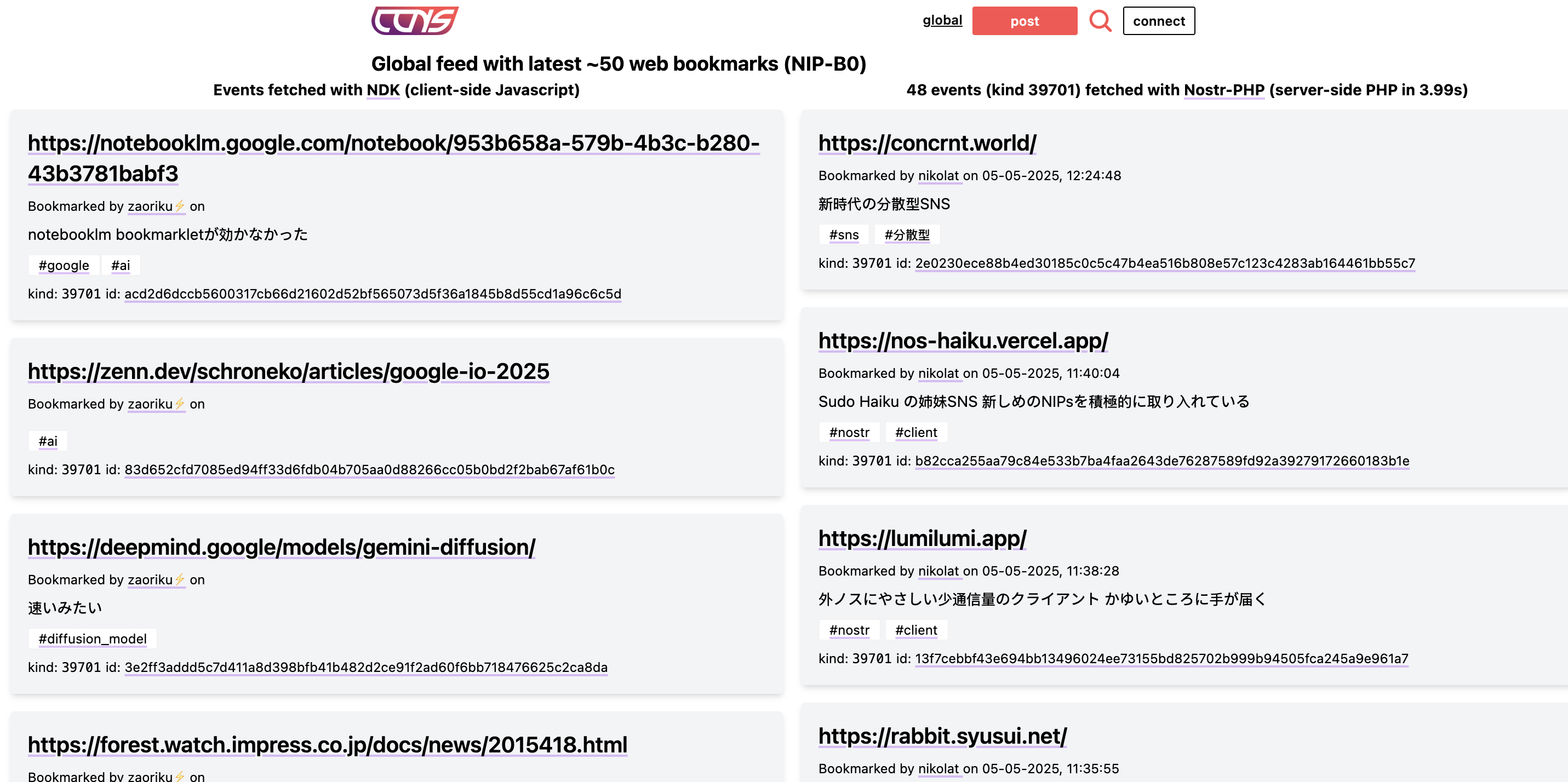
Building a njump clone for this Drupal website
You can now use this URL pattern to fetch Nostr events:
https://nostrver.se/e/{event_id|nevent1|note1|addr1}where you can provide a plain Nostr event ID or NIP-19 encoded identifier.An example, this URL [nostr:nevent1qvzqqqqqqypzqmjxss3dld622uu8q25gywum9qtg4w4cv4064jmg20xsac2aam5nqqsqm2lz4ru6wlydzpulgs8m60ylp4vufwsg55whlqgua6a93vp2y4g3uu9lr) fetches the data from one or more relays. This data is then being saved as a (Drupal) node entity (in a database on the server where this website is hosted, which is located in my office fyi). With this saved node, this data is now also available at https://nostrver.se/e/0dabe2a8f9a77c8d1079f440fbd3c9f0d59c4ba08a51d7f811ceeba58b02a255/1 where the (cached) data is server from the database instead. It's just raw data for now, nothing special about it. One of my next steps is to style this in a more prettier interface and I will need to switch the theme of this website to a custom theme. A custom theme where I will be using TailwindCSS v4 and DaisyUI v5.
The module which is providing these Nostr features is FOSS and uses the Nostr-PHP library for doing the following:
- Request the event from one or more relays
- Decode the provided NIP-19 identifier
For now this module is way for me to utilize the Nostr-PHP library with Drupal for fetching events. This can be automated so in theory I could index all the Nostr events. But this is not my ambition as it would require quite some hardware resources to accomplish this.
I hope I can find the time to build up a new theme first for this website, so I can start styling the data for the fetched events. On this website, there is also a small piece (powered by another module) you can find at https://nostrver.se/nostrides doing things with this NIP-113 around activity events (in my case that's cycling what interests me).What's next
I'm already working on the following stuff:
- Implement a class to setup a persistent connection to a relay for requesting events continuously
- Extend the documentation with the recent added features
Other todo stuff:
- Review NIP-13 proof-of-work PR from Djuri
- Implement a NIP-65 lookup for fetching read and write relays for a given npub issue #91
- Build a proof-of-concept with revolt/event-loop to request events asynchronous with persistent relay connections
- Add comments to https://ccns.news
-
 @ b1ddb4d7:471244e7
2025-06-01 02:00:46
@ b1ddb4d7:471244e7
2025-06-01 02:00:46Bitcoin FilmFest (BFF25) returns to Warsaw for its third edition, blending independent cinema—from feature films and commercials to AI-driven experimental visuals—with education and entertainment.
Hundreds of attendees from around the world will gather for three days of screenings, discussions, workshops, and networking at the iconic Kinoteka Cinema (PKiN), the same venue that hosted the festival’s first two editions in March 2023 and April 2024.
This year’s festival, themed “Beyond the Frame,” introduces new dimensions to its program, including an extra day on May 22 to celebrate Bitcoin Pizza Day, the first real-world bitcoin transaction, with what promises to be one of Europe’s largest commemorations of this milestone.
BFF25 bridges independent film, culture, and technology, with a bold focus on decentralized storytelling and creative expression. As a community-driven cultural experience with a slightly rebellious spirit, Bitcoin FilmFest goes beyond movies, yet cinema remains at its heart.
Here’s a sneak peek at the lineup, specially curated for movie buffs:
 Generative Cinema – A special slot with exclusive shorts and a thematic debate on the intersection of AI and filmmaking. Featured titles include, for example: BREAK FREE, SATOSHI: THE CREATION OF BITCOIN, STRANGE CURRENCIES, and BITCOIN IS THE MYCELIUM OF MONEY, exploring financial independence, traps of the fiat system, and a better future built on sound money.
Generative Cinema – A special slot with exclusive shorts and a thematic debate on the intersection of AI and filmmaking. Featured titles include, for example: BREAK FREE, SATOSHI: THE CREATION OF BITCOIN, STRANGE CURRENCIES, and BITCOIN IS THE MYCELIUM OF MONEY, exploring financial independence, traps of the fiat system, and a better future built on sound money. Upcoming Productions Preview – A bit over an hour-long block of unreleased pilots and works-in-progress. Attendees will get exclusive first looks at projects like FINDING HOME (a travel-meets-personal-journey series), PARALLEL SPACES (a story about alternative communities), and THE LEGEND OF LANDI (a mysterious narrative).
Upcoming Productions Preview – A bit over an hour-long block of unreleased pilots and works-in-progress. Attendees will get exclusive first looks at projects like FINDING HOME (a travel-meets-personal-journey series), PARALLEL SPACES (a story about alternative communities), and THE LEGEND OF LANDI (a mysterious narrative). Freedom-Focused Ads & Campaigns – Unique screenings of video commercials, animations, and visual projects, culminating in “The PoWies” (Proof of Work-ies)—the first ever awards show honoring the best Bitcoin-only awareness campaigns.
Freedom-Focused Ads & Campaigns – Unique screenings of video commercials, animations, and visual projects, culminating in “The PoWies” (Proof of Work-ies)—the first ever awards show honoring the best Bitcoin-only awareness campaigns.To get an idea of what might come up at the event, here, you can preview 6 selected ads combined into two 2 videos:
 Open Pitch Competition – A chance for filmmakers to present fresh ideas and unfinished projects to an audience of a dedicated jury, movie fans and potential collaborators. This competitive block isn’t just entertaining—it’s a real opportunity for creators to secure funding and partnerships.
Open Pitch Competition – A chance for filmmakers to present fresh ideas and unfinished projects to an audience of a dedicated jury, movie fans and potential collaborators. This competitive block isn’t just entertaining—it’s a real opportunity for creators to secure funding and partnerships. Golden Rabbit Awards: A lively gala honoring films from the festival’s Official Selection, with awards in categories like Best Feature, Best Story, Best Short, and Audience Choice.
Golden Rabbit Awards: A lively gala honoring films from the festival’s Official Selection, with awards in categories like Best Feature, Best Story, Best Short, and Audience Choice.BFF25 Main Screenings
Sample titles from BFF25’s Official Selection:
 REVOLUCIÓN BITCOIN – A documentary by Juan Pablo, making its first screening outside the Spanish-speaking world in Warsaw this May. Three years of important work, 80 powerful minutes to experience. The film explores Bitcoin’s impact across Argentina, Colombia, Mexico, El Salvador, and Spain through around 40 diverse perspectives. Screening in Spanish with English subtitles, followed by a Q&A with the director.
REVOLUCIÓN BITCOIN – A documentary by Juan Pablo, making its first screening outside the Spanish-speaking world in Warsaw this May. Three years of important work, 80 powerful minutes to experience. The film explores Bitcoin’s impact across Argentina, Colombia, Mexico, El Salvador, and Spain through around 40 diverse perspectives. Screening in Spanish with English subtitles, followed by a Q&A with the director. UNBANKABLE – Luke Willms’ directorial debut, drawing from his multicultural roots and his father’s pioneering HIV/AIDS research. An investigative documentary based on Luke’s journeys through seven African countries, diving into financial experiments and innovations—from mobile money and digital lending to Bitcoin—raising smart questions and offering potential lessons for the West. Its May appearance at BFF25 marks its largest European event to date, following festival screenings and nominations across multiple continents over the past year.
UNBANKABLE – Luke Willms’ directorial debut, drawing from his multicultural roots and his father’s pioneering HIV/AIDS research. An investigative documentary based on Luke’s journeys through seven African countries, diving into financial experiments and innovations—from mobile money and digital lending to Bitcoin—raising smart questions and offering potential lessons for the West. Its May appearance at BFF25 marks its largest European event to date, following festival screenings and nominations across multiple continents over the past year. HOTEL BITCOIN – A Spanish comedy directed by Manuel Sanabria and Carlos “Pocho” Villaverde. Four friends, 4,000 bitcoins , and one laptop spark a chaotic adventure of parties, love, crime, and a dash of madness. Exploring sound money, value, and relationships through a twisting plot. The film premiered at the Tarazona and Moncayo Comedy Film Festival in August 2024. Its Warsaw screening at BFF25 (in Spanish with English subtitles) marks its first public showing outside the Spanish-speaking world.
HOTEL BITCOIN – A Spanish comedy directed by Manuel Sanabria and Carlos “Pocho” Villaverde. Four friends, 4,000 bitcoins , and one laptop spark a chaotic adventure of parties, love, crime, and a dash of madness. Exploring sound money, value, and relationships through a twisting plot. The film premiered at the Tarazona and Moncayo Comedy Film Festival in August 2024. Its Warsaw screening at BFF25 (in Spanish with English subtitles) marks its first public showing outside the Spanish-speaking world.Check out trailers for this year’s BFF25 and past editions on YouTube.
Tickets & Info:
- Detailed program and tickets are available at bitcoinfilmfest.com/bff25.
- Stay updated via the festival’s official channels (links provided on the website).
- Use ‘LN-NEWS’ to get 10% of tickets
-
 @ bf95e1a4:ebdcc848
2025-05-26 12:04:27
@ bf95e1a4:ebdcc848
2025-05-26 12:04:27This is a part of the Bitcoin Infinity Academy course on Knut Svanholm's book Bitcoin: Sovereignty Through Mathematics. For more information, check out our Geyser page!
The Environment
There’s no such thing as a free lunch. There’s no such thing as a zero-sum game. The 2nd law of thermodynamics tells us this. You know, the one about entropy and how everything will be really lame in a couple of trillion years. There’s no action without an equally big reaction somewhere. This is also true for Bitcoin mining. Every once in a while, some ignorant clickbait-hungry journalist writes an article about Bitcoin’s energy usage and how it’s connected to global warming or how widespread Bitcoin adoption would kill us all someday because of its “wasteful” production process. What they all fail to address is the alternative cost. As mentioned before, Bitcoin is valuable because it's scarce, and it's scarce because it's costly to produce. The same is true for gold or diamonds or anything else that is scarce and hard to come by. As discussed in earlier chapters, the mining algorithm can never be any more energy efficient because the electricity spent is directly linked to the value of the token.
Secondly, think about what most people use their Bitcoin for. Nothing. That’s right, nothing. Bitcoin incentivizes saving rather than spending. This is the exact opposite of how people use money in our current system of fiat currencies because Bitcoin is deflationary rather than inflationary relative to all other currencies. This means that every dollar, yen, or pound spent on Bitcoin would have ended up being spent on some other energy-demanding thing had it not been spent on Bitcoin. Either that or it would have lost its value due to inflation, which implies that even more dollars, yen, or euros would have been created and spent on frivolous things. Right now, credit is cheap, and the underlying economic theory of our time is based on the idea that the amount of spending going on in society is a key metric in economics. Bitcoin, on the other hand, is based on the economic theories of the Austrian school, where saving is the key metric. Yes, Bitcoin is costly to produce, but so is overproducing every product on Earth because every business needs to expand as fast as possible to pay off their loans. Human well-being has always been, and will always be, linearly connected to energy consumption. You can’t get around or bypass this fact. Energy consumption and human flourishing are inevitably linked. The thing Bitcoin does is to take away the need for unnecessary energy consumption by incentivizing us to save for future generations. It’s a mechanism that hinders our self-destructive tendencies. Not a threat to our planet's health, but a remedy.
The next time you hear about the Bitcoin network using as much energy as a small country, ask yourself: where would all that energy have ended up if it wasn’t funneled into the only invention trying to save us from ourselves there is? Into a Chinese factory producing consumer goods shipped by boat, truck and car for temporary use and probably ending up in a garbage pile the size of a small country in less than a year? How is that better for the planet? The only place from which solutions for humanity's problems can stem is human ingenuity. Such ingenuity in turn, stems from places where people with brains have a shot at getting somewhere in life. Thanks to the Internet and Bitcoin, that somewhere is everywhere. The Internet connects us, and Bitcoin frees up our time and emancipates us from our current, destructive systems. Bitcoin helps you plant a seed and watch it grow. Before you criticize Bitcoin, try to comprehend why it was invented and what inflationary, soft money does to the mechanisms of the market. Try to understand why we have a “climate problem” in the first place — why we overconsume. What underlying forces pull our psychological strings and make us borrow money for a new car? It takes a special kind of ignorance to criticize a solution without first fully comprehending the problem.
There’s one specific word that describes the current global environmentalist movement better than any other, and that word is “hubris.” Yes, the Earth has been getting warmer, very slowly, over the last fifty years. Yes, at least one of the ice caps might be melting. Yes, it’s probably because of human activity but no, you can’t save the planet through political interference in people’s lives. To get every nation on Earth to agree that it is a good idea to forcefully make people change their behavior for the sake of the climate is not only impossible but also cruel and counterproductive. Collectivists always disguise their urge to deprive their fellow man of his or her possessions and freedoms as a necessary thing to do in order to “save” humanity. This is nothing new. They’ve just decided that “climate change” is the most effective banner to rally under right now. The causes change, but the underlying philosophy stays the same. It’s very disturbing that the socialist experiment gets to repeat itself so many times in so many parts of the world.
Human progress and human flourishing have linear relationships to energy usage. If we want to find new ways of bettering ourselves, we should use more energy, not less. Truly free market competition leads to the most efficient solutions, and there are a bunch of incentives for producers of consumable goods to find cheap energy sources. Bitcoin provides the market with yet another incentive — to find locations for and invest in power plants in remote areas of the world where the cost barrier for building the plant has been too high historically due to the costly and wasteful process of transporting electricity. Hydro-electric plants in areas with a high risk of flooding, for instance. These areas are not suitable for human settlements, but they could provide us with a lot of electricity. When producers have the option to convert electricity into money directly, they’re more likely to use renewable energy sources, not less. In this sense, Bitcoin can function as a battery for energy producers.
Offshore wind farms have a very specific wind force range where they produce a usable amount of electricity. The bigger the turbine, the wider the range, but they still have an upper and a lower wind force limit. If an offshore wind farm had been connected to a Bitcoin mining rig, the surplus energy produced on windy days could have been converted into a profit for the producer instantly. The same logic applies to solar farms and geothermal plants. Energy is not a finite resource in any practical sense for the inhabitants of Mother Earth. If we could harness and store all the power of all the sunlight that hits the Earth during just one day, we could satisfy all of humanity’s energy needs for a couple of hundred years.
Bitcoin’s role in all of this is unexplored, but its potential to be a very positive environmental force is huge, and it will prove its utility during the next century. On one hand, it provides energy producers with a battery; on the other hand, it gives central bankers a run for their money and ultimately forces them to adopt a more sound monetary policy or become obsolete altogether. Bitcoin creates an incentive for sacrificing surplus energy for a small profit and a greater good rather than just letting it go to waste. The energy harnessed is converted into a completely scarce asset that is divisible and transportable to a much greater extent than any other valuable resource on Earth. It incentivizes energy producers to think long term and will reward those most patient and least wasteful among them. This recalibration of incentive structures is, of course, not only limited to energy producers or miners but to anyone who embraces this technology and understands its implications. In due time, Bitcoin’s superior monetary properties will be undeniable to even the most stubborn dinosaur. This would be an enormous net gain for humanity and the environment.
Courageous politicians dare to implement unpopular policies. They don’t need climate-striking teenagers to tell them which issues ought to be addressed first. It is ironic how celebrities who score cheap points by talking about the climate often accuse their political opponents of being “populist.” What really happens when you raise carbon taxes and try to force populations into behaviors that they don’t really like? The gilets jaunes, or yellow vests, in France are a great example. People still have to commute to work. Raising taxes solves nothing — it just distorts the market and relocates the problem. The only thing the recently adopted environmentalist policies of France resulted in was the destruction of Paris. Arguably not the best thing for the environment.
In a truly free society, a society with sound money, climate-striking children wouldn’t be a problem. They would have to learn to cooperate in order to address whatever imaginary problem they sought to solve, which would be harmless to the rest of us. Now, when backed by fear-mongering journalists, they can cause a ton of damage as our virtue-signaling political class needs to adapt to whatever imaginary issue the press has primed us with in order to secure votes. It’s not about whether there is a real climate problem or not, but rather about motives. Always ask yourself, what does this person stand to gain from holding this particular opinion? Can this issue really be solved by political means?
There’s no such thing as a free lunch. There is such a thing as representation, however, and there’s always a personal economic motive behind political decisions. They’re not here for you; you’re here for them. One of the most eye-opening experiences of my life was seeing the lobbyist quarters in Brussels. The rise of veganism, placebic gluten intolerance, and "meat-free Mondays" in school cafeterias are all products of the food industry. A soy burger is a lot cheaper to produce than a beef one. To anyone who can sell it at a higher price by appealing to people’s vanity or world-saving hubris, huge profits await. They’ve managed to monetize our collective bad climate conscience in such a cunning way that most of us have no clue we’re being played. In the 20th century, the cereal-killers of the Kellogg's company and their likes funded “research” that cemented a fear of red meats and saturated fats into the minds of the public. The effects of this propaganda can very much still be seen today as the inhabitants of America are about twice as fat today than they were before the introduction of “light” products to the market. All of these things are connected to the root of the problem: the lack of sound money. Inflation made it possible for the food industry to replace our homemade beef burger with a mass-produced cheap soy substitute while making us believe that the price of a burger hadn’t changed that much in the last fifty years. Spoiler alert - it had.
Another of the most eye-opening experiences I’ve had was during my stay in a Mayan village in the Toledo district of Belize about ten years ago. I spent a couple of days with a family of two adults and six children in a jungle village of huts and no electricity save for two diesel generators. One night, the father of the house told me a story about his friend going into politics a decade earlier and being murdered for having the wrong opinions. We slept on wooden beds without mattresses, and a couple of dogs and turkeys ran freely around the village. One day, the family’s ten-year-old was listening to some Bob Marley songs on a CD player connected to a car battery and a small solar panel on a pole in the garden. I listened for a while and then asked him about the strange sound effects in between the songs. Helicopter sounds, machine gun sounds, and other strange noises were intersecting the songs here and there. He replied by telling me, “...oh, it’s not a proper CD. I made it with Virtual DJ on my cousin’s laptop”. I was stunned. Here was this ten-year-old, in the middle of the jungle, just as skilled with a computer as any other ten-year-old I had ever met. At that moment, I realized just how leveled the playing field has been for the workforce across the globe. Here was this child, living in a hut without even electricity (but also without a mortgage to inherit), ready to compete on the same global market as any other kid in the world.
Bitcoin is the logical next step. Bitcoin doesn’t care about nationality, gender, ethnicity, age, sexual preferences, or any other imagined victimization or privilege. To Bitcoin, we’re all equal. It is a voluntary system, and it knows no biases. Bitcoin is equality of opportunity in its purest form, and it doesn’t have any opinion on the outcome whatsoever.
About the Bitcoin Infinity Academy
The Bitcoin Infinity Academy is an educational project built around Knut Svanholm’s books about Bitcoin and Austrian Economics. Each week, a whole chapter from one of the books is released for free on Highlighter, accompanied by a video in which Knut and Luke de Wolf discuss that chapter’s ideas. You can join the discussions by signing up for one of the courses on our Geyser page. Signed books, monthly calls, and lots of other benefits are also available.
-
 @ b1ddb4d7:471244e7
2025-06-01 02:00:44
@ b1ddb4d7:471244e7
2025-06-01 02:00:44Starting January 1, 2026, the United Kingdom will impose some of the world’s most stringent reporting requirements on cryptocurrency firms.
All platforms operating in or serving UK customers-domestic and foreign alike-must collect and disclose extensive personal and transactional data for every user, including individuals, companies, trusts, and charities.
This regulatory drive marks the UK’s formal adoption of the OECD’s Crypto-Asset Reporting Framework (CARF), a global initiative designed to bring crypto oversight in line with traditional banking and to curb tax evasion in the rapidly expanding digital asset sector.
What Will Be Reported?
Crypto firms must gather and submit the following for each transaction:
- User’s full legal name, home address, and taxpayer identification number
- Detailed data on every trade or transfer: type of cryptocurrency, amount, and nature of the transaction
- Identifying information for corporate, trust, and charitable clients
The obligation extends to all digital asset activities, including crypto-to-crypto and crypto-to-fiat trades, and applies to both UK residents and non-residents using UK-based platforms. The first annual reports covering 2026 activity are due by May 31, 2027.
Enforcement and Penalties
Non-compliance will carry stiff financial penalties, with fines of up to £300 per user account for inaccurate or missing data-a potentially enormous liability for large exchanges. The UK government has urged crypto firms to begin collecting this information immediately to ensure operational readiness.
Regulatory Context and Market Impact
This move is part of a broader UK strategy to position itself as a global fintech hub while clamping down on fraud and illicit finance. UK Chancellor Rachel Reeves has championed these measures, stating, “Britain is open for business – but closed to fraud, abuse, and instability”. The regulatory expansion comes amid a surge in crypto adoption: the UK’s Financial Conduct Authority reported that 12% of UK adults owned crypto in 2024, up from just 4% in 2021.
Enormous Risks for Consumers: Lessons from the Coinbase Data Breach
While the new framework aims to enhance transparency and protect consumers, it also dramatically increases the volume of sensitive personal data held by crypto firms-raising the stakes for cybersecurity.
The risks are underscored by the recent high-profile breach at Coinbase, one of the world’s largest exchanges.
In May 2025, Coinbase disclosed that cybercriminals, aided by bribed offshore contractors, accessed and exfiltrated customer data including names, addresses, government IDs, and partial bank details.
The attackers then used this information for sophisticated phishing campaigns, successfully deceiving some customers into surrendering account credentials and funds.
“While private encryption keys remained secure, sufficient customer information was exposed to enable sophisticated phishing attacks by criminals posing as Coinbase personnel.”
Coinbase now faces up to $400 million in compensation costs and has pledged to reimburse affected users, but the incident highlights the systemic vulnerability created when large troves of personal data are centralized-even if passwords and private keys are not directly compromised. The breach also triggered a notable drop in Coinbase’s share price and prompted a $20 million bounty for information leading to the attackers’ capture.
The Bottom Line
The UK’s forthcoming crypto reporting regime represents a landmark in financial regulation, promising greater transparency and tax compliance. However, as the Coinbase episode demonstrates, the aggregation of sensitive user data at scale poses a significant cybersecurity risk.
As regulators push for more oversight, the challenge will be ensuring that consumer protection does not become a double-edged sword-exposing users to new threats even as it seeks to shield them from old ones.
-
 @ 7f6db517:a4931eda
2025-05-31 09:01:33
@ 7f6db517:a4931eda
2025-05-31 09:01:33

"Privacy is necessary for an open society in the electronic age. Privacy is not secrecy. A private matter is something one doesn't want the whole world to know, but a secret matter is something one doesn't want anybody to know. Privacy is the power to selectively reveal oneself to the world." - Eric Hughes, A Cypherpunk's Manifesto, 1993
Privacy is essential to freedom. Without privacy, individuals are unable to make choices free from surveillance and control. Lack of privacy leads to loss of autonomy. When individuals are constantly monitored it limits our ability to express ourselves and take risks. Any decisions we make can result in negative repercussions from those who surveil us. Without the freedom to make choices, individuals cannot truly be free.
Freedom is essential to acquiring and preserving wealth. When individuals are not free to make choices, restrictions and limitations prevent us from economic opportunities. If we are somehow able to acquire wealth in such an environment, lack of freedom can result in direct asset seizure by governments or other malicious entities. At scale, when freedom is compromised, it leads to widespread economic stagnation and poverty. Protecting freedom is essential to economic prosperity.
The connection between privacy, freedom, and wealth is critical. Without privacy, individuals lose the freedom to make choices free from surveillance and control. While lack of freedom prevents individuals from pursuing economic opportunities and makes wealth preservation nearly impossible. No Privacy? No Freedom. No Freedom? No Wealth.
Rights are not granted. They are taken and defended. Rights are often misunderstood as permission to do something by those holding power. However, if someone can give you something, they can inherently take it from you at will. People throughout history have necessarily fought for basic rights, including privacy and freedom. These rights were not given by those in power, but rather demanded and won through struggle. Even after these rights are won, they must be continually defended to ensure that they are not taken away. Rights are not granted - they are earned through struggle and defended through sacrifice.
If you found this post helpful support my work with bitcoin.

-
 @ 2e8970de:63345c7a
2025-05-31 19:51:28
@ 2e8970de:63345c7a
2025-05-31 19:51:28Enfortumab Vedotin and Pembrolizumab doubled survival rates, with fewer serious side effects in advanced bladder cancer.
https://www.nejm.org/doi/full/10.1056/NEJMoa2312117
https://stacker.news/items/993799
-
 @ 7f6db517:a4931eda
2025-05-31 09:01:33
@ 7f6db517:a4931eda
2025-05-31 09:01:33
Bank run on every crypto bank then bank run on every "real" bank.
— ODELL (@ODELL) December 14, 2022
Good morning.
It looks like PacWest will fail today. It will be both the fifth largest bank failure in US history and the sixth major bank to fail this year. It will likely get purchased by one of the big four banks in a government orchestrated sale.
March 8th - Silvergate Bank
March 10th - Silicon Valley Bank
March 12th - Signature Bank
March 19th - Credit Suisse
May 1st - First Republic Bank
May 4th - PacWest Bank?PacWest is the first of many small regional banks that will go under this year. Most will get bought by the big four in gov orchestrated sales. This has been the playbook since 2008. Follow the incentives. Massive consolidation across the banking industry. PacWest gonna be a drop in the bucket compared to what comes next.
First, a hastened government led bank consolidation, then a public/private partnership with the remaining large banks to launch a surveilled and controlled digital currency network. We will be told it is more convenient. We will be told it is safer. We will be told it will prevent future bank runs. All of that is marketing bullshit. The goal is greater control of money. The ability to choose how we spend it and how we save it. If you control the money - you control the people that use it.
If you found this post helpful support my work with bitcoin.

-
 @ b1ddb4d7:471244e7
2025-06-01 02:00:43
@ b1ddb4d7:471244e7
2025-06-01 02:00:43This article was originally published on aier.org
Even after eleven years experience, and a per Bitcoin price of nearly $20,000, the incredulous are still with us. I understand why. Bitcoin is not like other traditional financial assets.
Even describing it as an asset is misleading. It is not the same as a stock, as a payment system, or a money. It has features of all these but it is not identical to them.
What Bitcoin is depends on its use as a means of storing and porting value, which in turn rests of secure titles to ownership of a scarce good. Those without experience in the sector look at all of this and get frustrated that understanding why it is valuable is not so easy to grasp.
In this article, I’m updating an analysis I wrote six years ago. It still holds up. For those who don’t want to slog through the entire article, my thesis is that Bitcoin’s value obtains from its underlying technology, which is an open-source ledger that keeps track of ownership rights and permits the transfer of these rights. Bitcoin managed to bundle its unit of account with a payment system that lives on the ledger. That’s its innovation and why it obtained a value and that value continues to rise.
Consider the criticism offered by traditional gold advocates, who have, for decades, pushed the idea that sound money must be backed by something real, hard, and independently valuable. Bitcoin doesn’t qualify, right? Maybe it does.
Bitcoin first emerged as a possible competitor to national, government-managed money in 2009. Satoshi Nakamoto’s white paper was released October 31, 2008. The structure and language of this paper sent the message: This currency is for computer technicians, not economists nor political pundits. The paper’s circulation was limited; novices who read it were mystified.
But the lack of interest didn’t stop history from moving forward. Two months later, those who were paying attention saw the emergence of the “Genesis Block,” the first group of bitcoins generated through Nakamoto’s concept of a distributed ledger that lived on any computer node in the world that wanted to host it.
Here we are all these years later and a single bitcoin trades at $18,500. The currency is held and accepted by many thousands of institutions, both online and offline. Its payment system is very popular in poor countries without vast banking infrastructures but also in developed countries. And major institutions—including the Federal Reserve, the OECD, the World Bank, and major investment houses—are paying respectful attention and weaving blockchain technology into their operations.
Enthusiasts, who are found in every country, say that its exchange value will soar even more in the future because its supply is strictly limited and it provides a system vastly superior to government money. Bitcoin is transferred between individuals without a third party. It is relatively low-cost to exchange. It has a predictable supply. It is durable, fungible, and divisible: all crucial features of money. It creates a monetary system that doesn’t depend on trust and identity, much less on central banks and government. It is a new system for the digital age.
Hard lessons for hard money
To those educated in the “hard money” tradition, the whole idea has been a serious challenge. Speaking for myself, I had been reading about bitcoin for two years before I came anywhere close to understanding it. There was just something about the whole idea that bugged me. You can’t make money out of nothing, much less out of computer code. Why does it have value then? There must be something amiss. This is not how we expected money to be reformed.
There’s the problem: our expectations. We should have been paying closer attention to Ludwig von Mises’ theory of money’s origins—not to what we think he wrote, but to what he actually did write.
In 1912, Mises released The Theory of Money and Credit. It was a huge hit in Europe when it came out in German, and it was translated into English. While covering every aspect of money, his core contribution was in tracing the value and price of money—and not just money itself—to its origins. That is, he explained how money gets its price in terms of the goods and services it obtains. He later called this process the “regression theorem,” and as it turns out, bitcoin satisfies the conditions of the theorem.
Mises’ teacher, Carl Menger, demonstrated that money itself originates from the market—not from the State and not from social contract. It emerges gradually as monetary entrepreneurs seek out an ideal form of commodity for indirect exchange. Instead of merely bartering with each other, people acquire a good not to consume, but to trade. That good becomes money, the most marketable commodity.
But Mises added that the value of money traces backward in time to its value as a bartered commodity. Mises said that this is the only way money can have value.
The theory of the value of money as such can trace back the objective exchange value of money only to that point where it ceases to be the value of money and becomes merely the value of a commodity…. If in this way we continually go farther and farther back we must eventually arrive at a point where we no longer find any component in the objective exchange value of money that arises from valuations based on the function of money as a common medium of exchange; where the value of money is nothing other than the value of an object that is useful in some other way than as money…. Before it was usual to acquire goods in the market, not for personal consumption, but simply in order to exchange them again for the goods that were really wanted, each individual commodity was only accredited with that value given by the subjective valuations based on its direct utility.
Mises’ explanation solved a major problem that had long mystified economists. It is a narrative of conjectural history, and yet it makes perfect sense. Would salt have become money had it otherwise been completely useless? Would beaver pelts have obtained monetary value had they not been useful for clothing? Would silver or gold have had money value if they had no value as commodities first? The answer in all cases of monetary history is clearly no. The initial value of money, before it becomes widely traded as money, originates in its direct utility. It’s an explanation that is demonstrated through historical reconstruction. That’s Mises’ regression theorem.
Bitcoin’s Use Value
At first glance, bitcoin would seem to be an exception. You can’t use a bitcoin for anything other than money. It can’t be worn as jewelry. You can’t make a machine out of it. You can’t eat it or even decorate with it. Its value is only realized as a unit that facilitates indirect exchange. And yet, bitcoin already is money. It’s used every day. You can see the exchanges in real time. It’s not a myth. It’s the real deal.
It might seem like we have to choose. Is Mises wrong? Maybe we have to toss out his whole theory. Or maybe his point was purely historical and doesn’t apply in the future of a digital age. Or maybe his regression theorem is proof that bitcoin is just an empty mania with no staying power, because it can’t be reduced to its value as a useful commodity.
And yet, you don’t have to resort to complicated monetary theory in order to understand the sense of alarm surrounding bitcoin. Many people, as I did, just have a feeling of uneasiness about a money that has no basis in anything physical. Sure, you can print out a bitcoin on a piece of paper, but having a paper with a QR code or a public key is not enough to relieve that sense of unease.
How can we resolve this problem? In my own mind, I toyed with the issue for more than a year. It puzzled me. I wondered if Mises’ insight applied only in a pre-digital age. I followed the speculations online that the value of bitcoin would be zero but for the national currencies into which it is converted. Perhaps the demand for bitcoin overcame the demands of Mises’ scenario because of a desperate need for something other than the dollar.
As time passed—and I read the work of Konrad Graf, Peter Surda, and Daniel Krawisz—finally the resolution came. Bitcoin is both a payment system and a money. The payment system is the source of value, while the accounting unit merely expresses that value in terms of price. The unity of money and payment is its most unusual feature, and the one that most commentators have had trouble wrapping their heads around.
We are all used to thinking of currency as separate from payment systems. This thinking is a reflection of the technological limitations of history. There is the dollar and there are credit cards. There is the euro and there is PayPal. There is the yen and there are wire services. In each case, money transfer relies on third-party service providers. In order to use them, you need to establish what is called a “trust relationship” with them, which is to say that the institution arranging the deal has to believe that you are going to pay.
This wedge between money and payment has always been with us, except for the case of physical proximity.
If I give you a dollar for your pizza slice, there is no third party. But payment systems, third parties, and trust relationships become necessary once you leave geographic proximity. That’s when companies like Visa and institutions like banks become indispensable. They are the application that makes the monetary software do what you want it to do.
The hitch is that
-
 @ 0970cf17:135aa040
2025-05-31 18:32:00
@ 0970cf17:135aa040
2025-05-31 18:32:00{"pattern":{"kick":[true,false,true,false,true,false,true,false,true,false,true,false,true,false,true,false],"snare":[false,true,false,true,false,true,false,true,false,true,false,true,false,true,false,true],"hihat":[true,false,true,true,false,false,true,true,false,false,true,true,false,false,true,true],"openhat":[true,false,false,true,false,false,false,false,true,false,false,true,false,false,true,false],"crash":[false,false,true,false,false,false,true,false,false,false,false,true,false,false,true,false],"ride":[false,false,true,false,false,false,false,true,false,false,false,true,false,false,true,false],"tom1":[false,true,false,false,true,false,false,true,false,false,true,false,true,false,true,false],"tom2":[true,false,false,false,true,false,false,false,false,true,false,true,false,false,true,false]},"bpm":220,"swing":0,"timeSignature":"4/4","drumKit":"standard","timestamp":1748716320785}
-
 @ dfa02707:41ca50e3
2025-06-01 03:01:32
@ dfa02707:41ca50e3
2025-06-01 03:01:32Headlines
- Twenty One Capital is set to launch with over 42,000 BTC in its treasury. This new Bitcoin-native firm, backed by Tether and SoftBank, is planned to go public via a SPAC merger with Cantor Equity Partners and will be led by Jack Mallers, co-founder and CEO of Strike. According to a report by the Financial Times, the company aims to replicate the model of Michael Saylor with his company, MicroStrategy.
- Florida's SB 868 proposes a backdoor into encrypted platforms. The bill and its House companion have both passed through their respective committees and are headed to a full vote. If enacted, SB 868 would require social media companies to decrypt teens' private messages, ban disappearing messages, allow unrestricted parental access to private messages, and likely eliminate encryption for all minors altogether.
- Paul Atkins has officially assumed the role of the 34th Chairman of the US Securities and Exchange Commission (SEC). This is a return to the agency for Atkins, who previously served as an SEC Commissioner from 2002 to 2008 under the George W. Bush administration. He has committed to advancing the SEC’s mission of fostering capital formation, safeguarding investors, and ensuring fair and efficient markets.
- Solosatoshi.com has sold over 10,000 open-source miners, adding more than 10 PH of hashpower to the Bitcoin network.
"Thank you, Bitaxe community. OSMU developers, your brilliance built this. Supporters, your belief drives us. Customers, your trust powers 10,000+ miners and 10PH globally. Together, we’re decentralizing Bitcoin’s future. Last but certainly not least, thank you@skot9000 for not only creating a freedom tool, but instilling the idea into thousands of people, that Bitcoin mining can be for everyone again," said the firm on X.
- OCEAN's DATUM has found 100 blocks. "Over 65% of OCEAN’s miners are using DATUM, and that number is growing every day. This means block template construction is making its way back into the hands of the miners, which is not only the most profitable for miners on OCEAN but also one of the best things for Bitcoin," stated the mining pool.

Source: orangesurf
- Arch Labs has secured $13 million to develop "ArchVM" and integrate smart-contract functionality with Bitcoin. The funding round, valuing the company at $200 million, was led by Pantera Capital, as announced on Tuesday.
- Tesla still holds nearly $1 billion in bitcoin. According to the automaker's latest earnings report, the firm reported digital asset holdings worth $951 million as of March 31.
- The European Central Bank is pushing for amendments to the European Union's Markets in Crypto Assets legislation (MiCA), just months after its implementation. According to Politico's report on Tuesday, the ECB is concerned that U.S. support for cryptocurrency, particularly stablecoins, could cause economic harm to the 27-nation bloc.
- TABConf 2025 is scheduled to take place from October 13-16, 2025. This prominent technical Bitcoin conference is dedicated to community building, education, and developer support, and it is set to return in October. Get your tickets here.
- Kaduna Lightning Development Bootcamp. From May 14th to 17th, the Bitcoin Lightning Developer Bootcamp will take place in Kaduna, Nigeria. Thisevent offers four dynamic days of coding, learning, and networking. Organized by Africa Free Routing and supported by Btrust, Tether, and African Bitcoiners, this bootcamp is designed as a gateway for African developers eager to advance their skills in Bitcoin and Lightning development. Apply here.

Source: African Bitcoiners.
Use the tools
- Core Lightning (CLN) v25.02.2 as been released to fix a broken Docker image. The issue was caused by an SQLite version that did not support an advanced query.
- Blitz wallet v0.4.4-beta introduces several updates and improvements, including the prevention of duplicate ecash payments, fixes for background ecash invoice handling, the ability for users to send payments to BOLT12 invoices from their Liquid balance, support for Blink QR codes, a lowered minimum amount for Lightning-to-Liquid payments to 100 sats, the option to initiate a node sync via a swipe gesture on the wallet's home screen, and the introduction of opt-in or opt-out functionality for newly implemented crash analytics via settings.
- Utreexo v0.5.0, a hash-based dynamic accumulator, is now available.
- Specter v2.1.1 is now available on StartOS. "This update brings compatibility with Bitcoin Core v28 and incorporates several upstream improvements," said developer Alex71btc.
- ESP-Miner (AxeOS) v2.7.0b1 is now available for testing.
- NodeGuard v0.16.1, a treasury management solution for Lightning nodes, has been released.
- The latest stacker.news updates include prompts to add a receiving wallet when posting or making comments (for new users), an option to randomize poll choices, improved URL search, and a few other enhancements. A bug fix for territories created after 9/19/24 has been implemented to reward 70% of their revenue to owners instead of 50%.
Other stuff
- The April edition of the 256 Foundation's newsletter is now available. It includes the latest mining news, Bitcoin network health updates, project developments, and a tutorial on how to update FutureBit's Apollo 1 to the Apollo 2 software.
- Siggy47 has posted a comprehensive RoboSats guide on stacker.news.
- Learn how to run your own Nostr relay using Citrine and Cloudflare Tunnels by following this step-by-step guide by Dhalism.
- Max Guise has written a Bitkey roadmap update for April 2025.
-
PlebLab has uploaded a video on how to build a Rust wallet with LDK Node by Ben Carman.
-
Do you want more? Subscribe and get No Bullshit GM report straight to your mailbox and No Bullshit Bitcoin on Nostr.
- Feedback or tips? Drop it here.
- #FREESAMOURAI
Sign up for No Bullshit Bitcoin
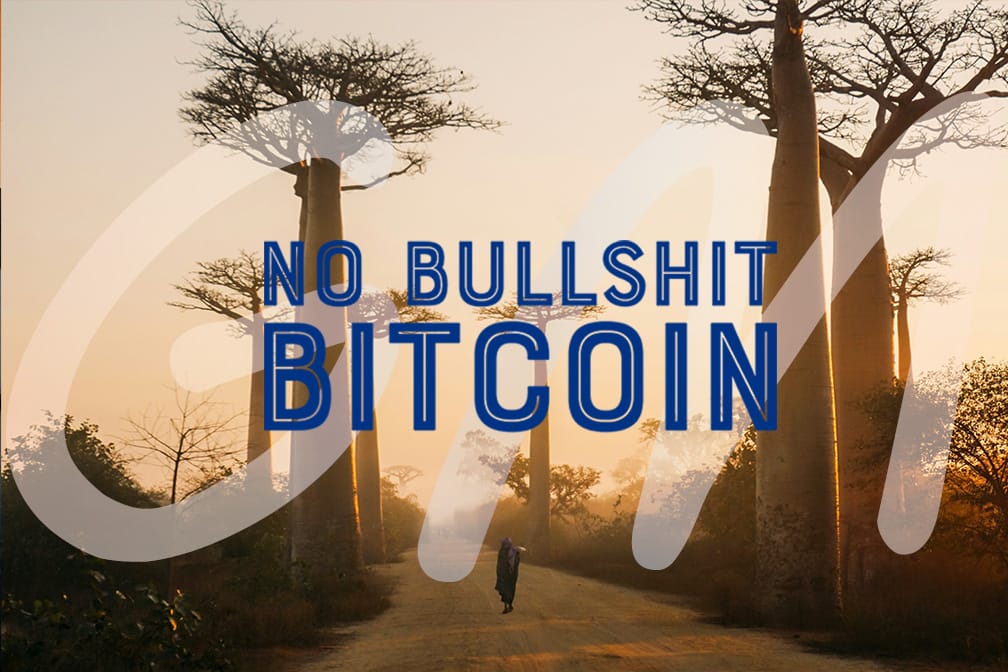
No Bullshit Bitcoin Is a Bitcoin News Desk Without Ads, Paywalls, or Clickbait.
Subscribe .nc-loop-dots-4-24-icon-o{--animation-duration:0.8s} .nc-loop-dots-4-24-icon-o *{opacity:.4;transform:scale(.75);animation:nc-loop-dots-4-anim var(--animation-duration) infinite} .nc-loop-dots-4-24-icon-o :nth-child(1){transform-origin:4px 12px;animation-delay:-.3s;animation-delay:calc(var(--animation-duration)/-2.666)} .nc-loop-dots-4-24-icon-o :nth-child(2){transform-origin:12px 12px;animation-delay:-.15s;animation-delay:calc(var(--animation-duration)/-5.333)} .nc-loop-dots-4-24-icon-o :nth-child(3){transform-origin:20px 12px} @keyframes nc-loop-dots-4-anim{0%,100%{opacity:.4;transform:scale(.75)}50%{opacity:1;transform:scale(1)}}
Email sent! Check your inbox to complete your signup.
No spam. Unsubscribe anytime.
-
 @ 3c559080:a053153e
2025-05-25 20:26:43
@ 3c559080:a053153e
2025-05-25 20:26:43So firstly you should find an emulator for whatever you want to play on. There are many for desktop and mobile devices. Checkhere for a list of all the available consoles and their various emulators.
Next what game do you want to play? This is the like the homepage for a shit ton of roms.
Some of the more popular roms are there and other various list like Sony Nintendo
After narrowing down your selection you will end up on myrient i assume this is just some dope person hosting all these so if you get some use out of it, think of donating they even take corn, but other shitcoins too (but thats not the focus here)
Once you download the Rom of the game you want, you will get a compressed (zip) folder, unzip it and within it will be the rom, most systems will identify your emulator and use it open the game. If not, launch the emulator and within it should be an option to open a file, open the file in the unzipped folder.
Enjoy So you want to Mod?
So every Mod, is a mod for a specific game [ex. Pokemon Blue, Pokemon FireRed, Super Mario Bros.] so it requires you to get the Rom for that base game, the mod itself, and a tool to patch it.
 There is an online tool to easily patch the mod to the ROM. IMPORTANT, this will not change any naming, Id recommend having a folder with the base game roms, and a folder for the mods, and lastly a folder for the newly modded roms. Make sure to name or just save the game in modded roms folder after the patch.
There is an online tool to easily patch the mod to the ROM. IMPORTANT, this will not change any naming, Id recommend having a folder with the base game roms, and a folder for the mods, and lastly a folder for the newly modded roms. Make sure to name or just save the game in modded roms folder after the patch. Below are a few resource to find various Pokemon Rom mods(sometimes called hacks)
Personally, Pokemon Unbound is considered the best most polished hack. it runs on Pokemon Fire Red.
Pokemon Emerald Rouge is a cool take on the popular Rougelite genre. This runs on base game Pokemon Emerald
-
 @ 28ca019b:93fcb2cc
2025-05-25 19:25:17
@ 28ca019b:93fcb2cc
2025-05-25 19:25:17Introduction
“There is nothing more powerful than an idea whose time has come.” -Victor Hugo
Early 1950’s America. Harry S. Truman is in office. The economy is booming and the middle class are comfortable. Shiny new television sets invite the first scenes of Hollywood into people’s homes. The Weavers, Tony Bennett, Vera Lynn and Perry Como play on the radio.
But on the fringes, in dance halls and late night clubs, a cultural revolution is brewing… A new musical fusion with influences from blues, R\&B, jazz, rockabilly, country and gospel music is about to give birth to not only a new genre, but a whole new way of life that will change society and culture, forever.
Rock & Roll
It becomes a symbol of freedom, a means of expression, and a catalyst for social change. It brings into existence a new type of counter-culture, filled with individuals who are driven to rebel against norms and authority. They don’t ask for permission. They push for change.
I believe we are witnessing such a shift now. And like rock & roll, the movement I’m speaking of is also ground up, grass roots, punk rock and will not look to authority to seek permission. The catalyst for this new social change, I believe, is Bitcoin. With its innate properties, it empowers and enables the individual like never before to achieve their fullest potential, expressed through an unprecedented freedom technology. It is an idea, like a song everyone can sing in their own way, that nobody can silence.
Revolution
"You say you got a real solution / Well you know / we’d all love to see the plan" -John Lennon
The rock & roll era helped bring about meaningful societal change through art, music, and film. It created a new social narrative. Today, the Bitcoin network is providing people with a different set of tools and ideas to build a better future in a much more practical and pragmatic way. Instead of trying to reshape social consensus and cultural norms through art forms, fashion, or lifestyle, bitcoin is achieving this through open source code.
For the first time, this technology gives individuals financial sovereignty and personal control over their own destiny, with the ability to self custody their own money that no corporation, government, dictator or king can tamper with. The individual has an opportunity to finally be freed from economic tyranny. And societies have the potential to avoid endless wars funded with printed government money. John Lennon said ‘give peace a chance’. If he were still here today and understood how bitcoin could subvert the military industrial complex would he not exclaim, ‘give bitcoin a chance’?
Natural Rights, Civil Rights, Digital Rights
"The times they are a-Changin’" -Bob Dylan
The civil rights movement was tightly interwoven with the history of rock & roll. The march on Washington, August 28th 1963, marked a seminal moment in American history for the advancement of equal rights before the law. Bob Dylan, along with Joan Baez, stood with over two hundred thousand other Americans and listened to Martin Luther King’s now immortal speech.
People with the same values peacefully gathered in numbers to make a statement powerful enough to change the conversation. This is analogous to the same freedom-minded people today gathering in cyberspace and voting not in the traditional sense, but voting with their money – peacefully exiting and transferring their economic energy into a system where they can’t be expropriated.
The question of whether individual rights are granted or have to be secured by each individual remains a contested area of philosophy to this day. To outline each in a very crude and simplistic way, natural rights (sometimes referred to as inalienable rights) are derived from the belief that every person owns their own body, therefore their own labor, time, and energy. Civil rights, on the other hand, are granted by the state and are therefore not universal. The fact that they are rights granted to humans by other humans means they always have the potential to be revoked or withdrawn.
Digital rights granted by the power of asymmetric cryptography are based in the laws of mathematics. Combined with proof of work, based in the law of thermodynamics, this makes digital rights that bitcoin provides more akin to natural rights than civil rights, as no one person or group can unilaterally revoke those rights or confiscate your property through violence. No amount of fire power, tanks, fighter jets or nuclear weapons can break a bitcoin private key or rewrite the sunken cost of proof of work embedded into bitcoin’s timechain. This idea of securing rights without asking permission is, in itself, a revolution and achievable now in an egalitarian way. This implies a potentially huge shift in power from those with a monopoly on violence, to peaceful individuals who want to be treated fairly and with dignity.
Cypher Punk-Rock
Songwriters write songs. Cypherpunks write code.
To tie things back and look at a very narrow, but potentially huge use case of bitcoin, let’s examine the current broken incentives of the music industry, particularly recorded music. It is becoming increasingly apparent that an option other than a subscription model could find demand from content consumers and producers alike.
There is now a way, with Bitcoin and Lightning Network, for a music fan to pay artists directly and for any amount – dollars, cents or even fractions of cents. This model has positive outcomes for the music producer and fan who are the main two parties engaged in the transaction. The artist keeps all of what is sent and the listener can pay what they want. The listener can pay as they listen, rather than be locked into a rolling subscription that isn’t based on usage. This concept, called ‘value for value’, is finding its way into new music platforms such as Wavlake and Fountain. I believe this model will become the de-facto way of monetizing digital content in the coming years. This could bring an economic signal back to music that has been lost and cannot be achieved by streams alone. This will hopefully create a more meritocratic music system and shake up the entrenched streaming monoliths.
Art can shine a light on a certain truth. It can also make people look at things in a completely new way. Maybe then, Satoshi was the greatest artist who ever lived. Bitcoin smashed the conventional wisdom and theories of the most basic and prevalent thing everyone takes for granted: money. Using money as a lens to view the world can lead to distortions in your perception if the lens is warped. Removing the glasses makes you reevaluate economics, politics, religion, philosophy, morality, beauty, and almost every other aspect of life. The beauty of the Sistine Chapel, the Egyptian pyramids, the Mona Lisa, Beethoven’s 5th Symphony, Bohemian Rhapsody all intrinsically imply a certain degree of proof of work. The art, you could say, speaks for itself.
The Long and Winding Road Ahead
As a musician, I have found a new hope. The value for value movement gives me that hope. If this is truly a superior model of music distribution and consumption it will win out over time on the market.
Another point to touch on would be the possibility of this technology ushering in an artistic renaissance. I can honestly say my favorite music, the songs that have moved me the most, normally comes from a place of truth, honesty and sheer talent. Maybe I’m out of touch, but I feel popular music of late is devoid of soul, meaning and the biggest mainstream artists want to conform to the man (giant corporations/governments) instead of stick it to the man! Probably because there is nowhere else to turn now that streaming and social media platforms own their speech and art. We need to investigate and embrace new ways to own our speech and art, to make art interesting again. The powers that be, need to let it be, and leave alone individuals who wish to use this technology for their own interests if they do so in a peaceful way.
I want to leave you with a Frank Zappa quote that seems more relevant than ever:
“I’d say that today, dishonesty is the rule, and honesty the exception. It could be, statistically, that more people are honest than dishonest, but the few that really control things are not honest, and that tips the balance…”
My charitable view is that the majority of people in power aren’t corrupt, it’s rather just a case of ‘no one is better than their incentives’. But when incentives are misaligned bad outcomes will inevitably result. With bitcoin and its incorruptible incentive structure, we have a chance to peacefully opt-out of a rigged game. I urge you to not trust, but verify with your own research that bitcoin is the answer to many of society’s current problems.
I think it’s fair to say, we all need to question ourselves and authority a little more than we’re comfortable doing, to hold truth as an ideal worth striving for, and live a little more rock & roll!
Link to original article**
-
 @ dfa02707:41ca50e3
2025-06-01 02:01:25
@ dfa02707:41ca50e3
2025-06-01 02:01:25- This version introduces the Soroban P2P network, enabling Dojo to relay transactions to the Bitcoin network and share others' transactions to break the heuristic linking relaying nodes to transaction creators.
- Additionally, Dojo admins can now manage API keys in DMT with labels, status, and expiration, ideal for community Dojo providers like Dojobay. New API endpoints, including "/services" exposing Explorer, Soroban, and Indexer, have been added to aid wallet developers.
- Other maintenance updates include Bitcoin Core, Tor, Fulcrum, Node.js, plus an updated ban-knots script to disconnect inbound Knots nodes.
"I want to thank all the contributors. This again shows the power of true Free Software. I also want to thank everyone who donated to help Dojo development going. I truly appreciate it," said Still Dojo Coder.
What's new
- Soroban P2P network. For MyDojo (Docker setup) users, Soroban will be automatically installed as part of their Dojo. This integration allows Dojo to utilize the Soroban P2P network for various upcoming features and applications.
- PandoTx. PandoTx serves as a transaction transport layer. When your wallet sends a transaction to Dojo, it is relayed to a random Soroban node, which then forwards it to the Bitcoin network. It also enables your Soroban node to receive and relay transactions from others to the Bitcoin network and is designed to disrupt the assumption that a node relaying a transaction is closely linked to the person who initiated it.
- Pushing transactions through Soroban can be deactivated by setting
NODE_PANDOTX_PUSH=offindocker-node.conf. - Processing incoming transactions from Soroban network can be deactivated by setting
NODE_PANDOTX_PROCESS=offindocker-node.conf.
- Pushing transactions through Soroban can be deactivated by setting
- API key management has been introduced to address the growing number of people offering their Dojos to the community. Dojo admins can now access a new API management tab in their DMT, where they can create unlimited API keys, assign labels for easy identification, and set expiration dates for each key. This allows admins to avoid sharing their main API key and instead distribute specific keys to selected parties.
- New API endpoints. Several new API endpoints have been added to help API consumers develop features on Dojo more efficiently:
- New:
/latest-block- returns data about latest block/txout/:txid/:index- returns unspent output data/support/services- returns info about services that Dojo exposes
- Updated:
/tx/:txid- endpoint has been updated to return raw transaction with parameter?rawHex=1
- The new
/support/servicesendpoint replaces the deprecatedexplorerfield in the Dojo pairing payload. Although still present, API consumers should use this endpoint for explorer and other pairing data.
- New:
Other changes
- Updated ban script to disconnect inbound Knots nodes.
- Updated Fulcrum to v1.12.0.
- Regenerate Fulcrum certificate if expired.
- Check if transaction already exists in pushTx.
- Bump BTC-RPC Explorer.
- Bump Tor to v0.4.8.16, bump Snowflake.
- Updated Bitcoin Core to v29.0.
- Removed unnecessary middleware.
- Fixed DB update mechanism, added api_keys table.
- Add an option to use blocksdir config for bitcoin blocks directory.
- Removed deprecated configuration.
- Updated Node.js dependencies.
- Reconfigured container dependencies.
- Fix Snowflake git URL.
- Fix log path for testnet4.
- Use prebuilt addrindexrs binaries.
- Add instructions to migrate blockchain/fulcrum.
- Added pull policies.


Learn how to set up and use your own Bitcoin privacy node with Dojo here.
-
 @ db8c7645:1cac80d5
2025-05-30 17:36:00
@ db8c7645:1cac80d5
2025-05-30 17:36:00Hi, super popular, masculine, and COOL modder loregamer here. I've worked on a few mods on the ModHQ site. I would like the permissions policy to be removed
I wrote a retarded manifesto on it here:
WHY WE STOLE HEADS FROM NEXUS MOD AUTHORS
TLDR
::youtube{#edea7yMqOY8}
-
 @ 7f6db517:a4931eda
2025-06-01 02:01:31
@ 7f6db517:a4931eda
2025-06-01 02:01:31Will not live in a pod.
Will not eat the bugs.
Will not get the chip.
Will not get a blue check.
Will not use CBDCs.Live Free or Die.
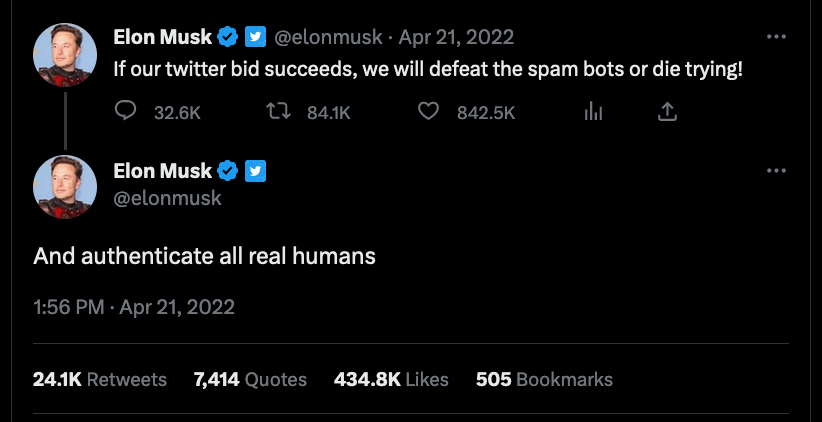
Why did Elon buy twitter for $44 Billion? What value does he see in it besides the greater influence that undoubtedly comes with controlling one of the largest social platforms in the world? We do not need to speculate - he made his intentions incredibly clear in his first meeting with twitter employees after his takeover - WeChat of the West.
To those that do not appreciate freedom, the value prop is clear - WeChat is incredibly powerful and successful in China.
To those that do appreciate freedom, the concern is clear - WeChat has essentially become required to live in China, has surveillance and censorship integrated at its core, and if you are banned from the app your entire livelihood is at risk. Employment, housing, payments, travel, communication, and more become extremely difficult if WeChat censors determine you have acted out of line.
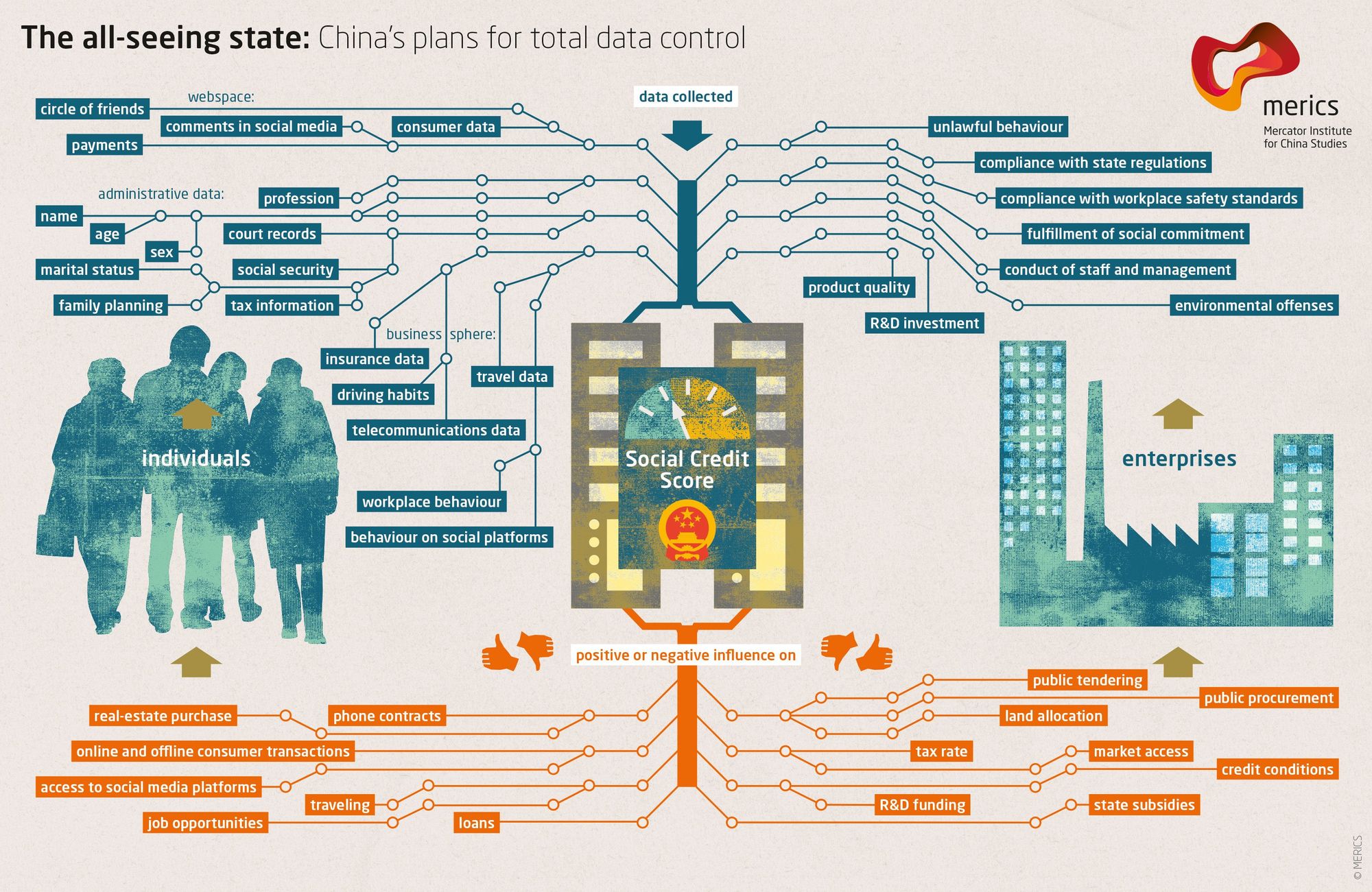
The blue check is the first step in Elon's plan to bring the chinese social credit score system to the west. Users who verify their identity are rewarded with more reach and better tools than those that do not. Verified users are the main product of Elon's twitter - an extensive database of individuals and complete control of the tools he will slowly get them to rely on - it is easier to monetize cattle than free men.
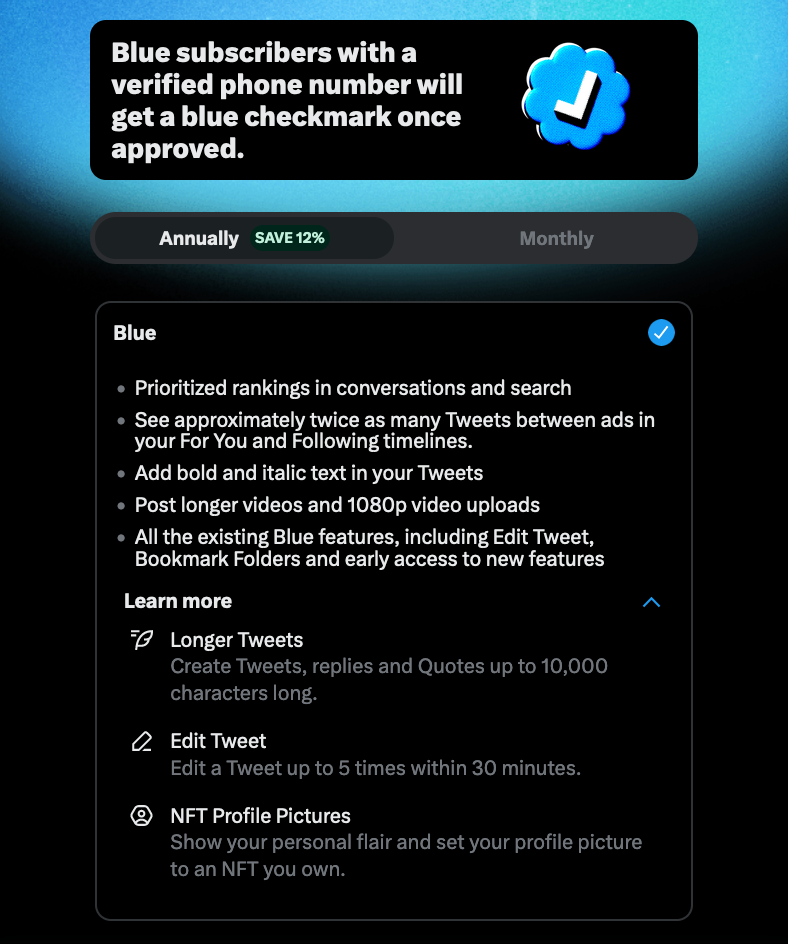
If you cannot resist the temptation of the blue check in its current form you have already lost - what comes next will be much darker. If you realize the need to resist - freedom tech provides us options.
If you found this post helpful support my work with bitcoin.

-
 @ 8d34bd24:414be32b
2025-05-25 06:29:21
@ 8d34bd24:414be32b
2025-05-25 06:29:21It seems like most Christians today have lost their reverence and awe of God. We’ve attributed God’s awesome creation by the word of His mouth to random chance and a Big Bang. We’ve attributed the many layers of sediment to millions and billions of years of time instead of God’s judgment of evil. We’ve emphasized His love and mercy to the point that we’ve forgotten about His holiness and righteous wrath. We’ve brought God down to our level and made Him either our “buddy” or made Him our magic genie servant, who is just there to answer our every want and whim.
The God of the Bible is a holy and awesome God who should be both loved and feared.
The fear of the Lord is the beginning of knowledge;\ Fools despise wisdom and instruction. (Proverbs 1:7)
The God of the Bible is the Lord of Lords and King of Kings who “… upholds all things by the word of His power. …” (Hebrews 1:3). Yes, God loves us as sons. Yes, God is merciful. Yes, through Jesus we have the blessed opportunity to approach God directly. None of that means we get to treat God like just another friend. We are to approach God with fear and trembling and worship Him in reverence and awe.
Worship the Lord with reverence And rejoice with trembling. (Psalm 2:11)
Part of the problem is that our culture just doesn’t show reverence to authority. It focuses on self and freedom. The whole thought of reverence for authority is incomprehensible for many. Look at this Psalm of worship:
The Lord reigns, let the peoples tremble;\ He is enthroned above the cherubim, let the earth shake!\ The Lord is great in Zion,\ And He is exalted above all the peoples.\ Let them praise Your great and awesome name;\ Holy is He. (Psalm 99:1-3)
This is the way we should view God and the proper attitude for approaching God.
Another issue is that we don’t study what God has done in the past. In the Old Testament, God commanded the Israelites to setup monuments of remembrance and to teach their kids all of the great things God had done for them. When they failed to do so, Israel drifted astray.
You shall teach them to your sons, talking of them when you sit in your house and when you walk along the road and when you lie down and when you rise up. (Deuteronomy 11:19)
God has given us the Bible, His word, so that we can know Him, know His character, and know His great deeds. When we fail to be in His word daily, we can forget (or not even know) the greatness of our God.
Establish Your word to Your servant,\ As that which produces reverence for You. (Psalm 119:38)
Do you love God’s word like this? Do you hunger for God’s word? Do you seek to know everything about God that you can know? When we love someone or something, we want to know everything about it.
Princes persecute me without cause,\ But my heart stands in awe of Your words.\ **I rejoice at Your word,\ As one who finds great spoil. \ (Psalm 119:161-162) {emphasis mine}
In addition to what we can learn about God in the Bible, we also need to remember what God has done in our own lives. We need to dwell on what God has done for us. We can just try to remember. Even better (I’ll admit this is a weakness for me), write down answered prayers, blessings, and other things God has done for you. My son has been writing down one blessing every day for over a year. What an example he is!
After we have thought about what God has done for us and those we care about, we should praise Him for His great works.
Shout joyfully to God, all the earth;\ Sing the glory of His name;\ Make His praise glorious.\ Say to God, “How awesome are Your works!\ Because of the greatness of Your power \ Your enemies will give feigned obedience to You.\ All the earth will worship You,\ And will sing praises to You;\ They will sing praises to Your name.” Selah.\ **Come and see the works of God,\ Who is awesome in His deeds toward the sons of men. \ (Psalm 66:1-5) {emphasis mine}
There is nothing we can do to earn salvation from God, but we should be in awe of what He has done for us leading to submission and obedience in gratitude.
Therefore, since we receive a kingdom which cannot be shaken, let us show gratitude, by which we may offer to God an acceptable service with reverence and awe; for our God is a consuming fire. (Hebrews 12:28-29) {emphasis mine}
Are you thankful for your blessings or resentful for what you don’t have? Do you worship God or take things He has provided for granted? Do you tell the world the awesome things God has done for you or do you stay silent? Do you claim to be a Christian, but live a life no different than those around you?
Then the Lord said,
“Because this people draw near with their words\ And honor Me with their lip service,\ But they remove their hearts far from Me,\ And their reverence for Me consists of tradition learned by rote, (Isaiah 29:13)
I hope this passage does not describe your relation ship with our awesome God. He deserves so much more. Instead we should be zealous to praise God and share His goodness with those around us.
Who is there to harm you if you prove zealous for what is good? But even if you should suffer for the sake of righteousness, you are blessed. And do not fear their intimidation, and do not be troubled, but sanctify Christ as Lord in your hearts, always being ready to make a defense to everyone who asks you to give an account for the hope that is in you, yet with gentleness and reverence; (1 Peter 3:13-15) {emphasis mine}
Did you know that you can even show reverence by your every day work?
By faith Noah, being warned by God about things not yet seen, in reverence prepared an ark for the salvation of his household, by which he condemned the world, and became an heir of the righteousness which is according to faith. (Hebrews 11:7) {emphasis mine}
When Noah stepped out in faith and obedience to God and built the ark as God commanded, despite the fact that the people around him probably thought he was crazy building a boat on dry ground that had never flooded, his work was a kind of reverence to God. Are there areas in your life where you can obey God in reverence to His awesomeness? Do you realize that quality work in obedience to God can be a form of worship?
Just going above and beyond in your job can be a form of worship of God if you are working extra hard to honor Him. Obedience is another form of worship and reverence.
Then Zerubbabel the son of Shealtiel, and Joshua the son of Jehozadak, the high priest, with all the remnant of the people, obeyed the voice of the Lord their God and the words of Haggai the prophet, as the Lord their God had sent him. And the people showed reverence for the Lord. (Haggai 1:12) {emphasis mine}
Too many people have put the word of men (especially scientists) above the word of God and have tried to change the clear meaning of the Bible. I used to think it strange how the Bible goes through the days of creation and ends each day with “and there was evening and there was morning, the xth day.” Since a day has an evening and a morning, that seemed redundant. Why did God speak in this manner? God knew that a day would come when many scientist would try to disprove God and would claim that these days were not 24 hour days, but long ages. When a writer is trying to convey long ages, the writer does not mention evening/morning and doesn’t count the days.1
When we no longer see God as speaking the universe and everything in it into existence, we tend to not see God as an awesome God. We don’t see His power. We don’t see His knowledge. We don’t see His goodness. We also don’t see His authority. Why do we have to obey God? Because He created us and because He upholds us. Without Him we would not exist. Our creator has the authority to command His creation. When we compromise in this area, we lose our submission, our awe, and our reverence. (For more on the subject see my series.) When we believe His great works, especially those spoken of in Genesis 1-11 and in Exodus, we can’t help but be in awe of our God.
For the word of the Lord is upright,\ And all His work is done in faithfulness.\ He loves righteousness and justice;\ The earth is full of the lovingkindness of the Lord.\ By the word of the Lord the heavens were made,\ And by the breath of His mouth all their host.\ He gathers the waters of the sea together as a heap;\ He lays up the deeps in storehouses.\ **Let all the earth fear the Lord;\ Let all the inhabitants of the world stand in awe of Him. \ (Psalm 33:4-8) {emphasis mine}
Remembering God’s great works, we can’t help but worship in awe and reverence.
By awesome deeds You answer us in righteousness, O God of our salvation,\ *You who are the trust of all the ends of the earth* and of the farthest sea;\ Who establishes the mountains by His strength,\ Being girded with might;\ Who stills the roaring of the seas,\ The roaring of their waves,\ And the tumult of the peoples.\ They who dwell in the ends of the earth stand in awe of Your signs;\ You make the dawn and the sunset shout for joy. \ (Psalm 65:5-8) {emphasis mine}
If we truly do have awe and reverence for our God, we should be emboldened to tell those around us of His great works.
I will tell of Your name to my brethren;\ In the midst of the assembly I will praise You.\ You who fear the Lord, praise Him;\ All you descendants of Jacob, glorify Him,\ And stand in awe of Him, all you descendants of Israel. \ (Psalm 22:22-23) {emphasis mine}
May God grant you the wisdom to see His awesomeness and to trust Him, serve Him, obey Him, and worship Him as He so rightly deserves. May you always have a right view of God and a hunger for His word and a personal relationship with Him. To God be the Glory!
Trust Jesus
FYI, these are a few more passages on the subject that are helpful, but didn’t fit in the flow of my post.
Great is the Lord, and highly to be praised,\ And His greatness is unsearchable.\ One generation shall praise Your works to another,\ And shall declare Your mighty acts.\ On the glorious splendor of Your majesty\ And on Your wonderful works, I will meditate.\ Men shall speak of the power of Your awesome acts,\ And I will tell of Your greatness. (Psalm 145:3-6)
The boastful shall not stand before Your eyes;\ You hate all who do iniquity.\ You destroy those who speak falsehood;\ The Lord abhors the man of bloodshed and deceit.\ But as for me, by Your abundant lovingkindness I will enter Your house,\ At Your holy temple I will bow in reverence for You. (Psalm 5:5-7) {emphasis mine}
If you do not listen, and if you do not take it to heart to give honor to My name,” says the Lord of hosts, “then I will send the curse upon you and I will curse your blessings; and indeed, I have cursed them already, because you are not taking it to heart. Behold, I am going to rebuke your offspring, and I will spread refuse on your faces, the refuse of your feasts; and you will be taken away with it. Then you will know that I have sent this commandment to you, that My covenant may continue with Levi,” says the Lord of hosts. “My covenant with him was one of life and peace, and I gave them to him as an object of reverence; so he revered Me and stood in awe of My name. (Malachi 2:2-5) {emphasis mine}
-
 @ b1ddb4d7:471244e7
2025-06-01 02:00:39
@ b1ddb4d7:471244e7
2025-06-01 02:00:39When Sergei talks about bitcoin, he doesn’t sound like someone chasing profits or followers. He sounds like someone about to build a monastery in the ruins.
While the mainstream world chases headlines and hype, Sergei shows up in local meetups from Sacramento to Cleveland, mentors curious minds, and shares what he knows is true – hoping that, with the right spark, someone will light their own way forward.
We interviewed Sergei to trace his steps: where he started, what keeps him going, and why teaching bitcoin is far more than explaining how to set up a node – it’s about reaching the right minds before the noise consumes them. So we began where most journeys start: at the beginning.

First Steps
- So, where did it all begin for you and what made you stay curious?
I first heard about bitcoin from a friend’s book recommendation, American Kingpin, the book about Silk Road (online drug marketplace). He is still not a true bitcoiner, although I helped him secure private keys with some bitcoin.
I was really busy at the time – focused on my school curriculum, running a 7-bedroom Airbnb, and working for a standardized test prep company. Bitcoin seemed too technical for me to explore, and the pace of my work left no time for it.
After graduating, while pursuing more training, I started playing around with stocks and maximizing my savings. Passive income seemed like the path to early retirement, as per the promise of the FIRE movement (Financial Independence, Retire Early). I mostly followed the mainstream news and my mentor’s advice – he liked preferred stocks at the time.
I had some Coinbase IOUs and remember sending bitcoin within the Coinbase ledger to a couple friends. I also recall the 2018 crash; I actually saw the legendary price spike live but couldn’t benefit because my funds were stuck amidst the frenzy. I withdrew from that investment completely for some time. Thankfully, my mentor advised to keep en eye on bitcoin.
Around late 2019, I started DCA-ing cautiously. Additionally, my friend and I were discussing famous billionaires, and how there was no curriculum for becoming a billionaire. So, I typed “billionaires” into my podcast app, and landed on We Study Billionaires podcast.
That’s where I kept hearing Preston Pysh mention bitcoin, before splitting into his own podcast series, Bitcoin Fundamentals. I didn’t understand most of the terminology of stocks, bonds, etc, yet I kept listening and trying to absorb it thru repetition. Today, I realize all that financial talk was mostly noise.
When people ask me for a technical explanation of fiat, I say: it’s all made up, just like the fiat price of bitcoin! Starting in 2020, during the so-called pandemic, I dove deeper. I religiously read Bitcoin Magazine, scrolled thru Bitcoin Twitter, and joined Simply Bitcoin Telegram group back when DarthCoin was an admin.
DarthCoin was my favorite bitcoiner – experienced, knowledgeable, and unapologetic. Watching him shift from rage to kindness, from passion to despair, gave me a glimpse at what a true educator’s journey would look like.
The struggle isn’t about adoption at scale anymore. It’s about reaching the few who are willing to study, take risks, and stay out of fiat traps. The vast majority won’t follow that example – not yet at least… if I start telling others the requirements for true freedom and prosperity, they would certainly say “Hell no!”
- At what point did you start teaching others, and why?
After college, I helped teach at a standardized test preparation company, and mentored some students one-on-one. I even tried working at a kindergarten briefly, but left quickly; Babysitting is not teaching.
What I discovered is that those who will succeed don’t really need my help – they would succeed with or without me, because they already have the inner drive.
Once you realize your people are perishing for lack of knowledge, the only rational thing to do is help raise their level of knowledge and understanding. That’s the Great Work.
I sometimes imagine myself as a political prisoner. If that were to happen, I’d probably start teaching fellow prisoners, doctors, janitors, even guards. In a way we already live in an open-air prison, So what else is there to do but teach, organize, and conspire to dismantle the Matrix?

Building on Bitcoin
- You hosted some in-person meetups in Sacramento. What did you learn from those?
My first presentation was on MultiSig storage with SeedSigner, and submarine swaps through Boltz.exchange.
I realized quickly that I had overestimated the group’s technical background. Even the meetup organizer, a financial advisor, asked, “How is anyone supposed to follow these steps?” I responded that reading was required… He decided that Unchained is an easier way.
At a crypto meetup, I gave a much simpler talk, outlining how bitcoin will save the world, based on a DarthCoin’s guide. Only one person stuck around to ask questions – a man who seemed a little out there, and did not really seem to get the message beyond the strength of cryptographic security of bitcoin.
Again, I overestimated the audience’s readiness. That forced me to rethink my strategy. People are extremely early and reluctant to study.
- Now in Ohio, you hold sessions via the Orange Pill App. What’s changed?
My new motto is: educate the educators. The corollary is: don’t orange-pill stupid normies (as DarthCoin puts it).
I’ve shifted to small, technical sessions in order to raise a few solid guardians of this esoteric knowledge who really get it and can carry it forward.
The youngest attendee at one of my sessions is a newborn baby – he mostly sleeps, but maybe he still absorbs some of the educational vibes.
- How do local groups like Sactown and Cleveland Bitcoiners influence your work?
Every meetup reflects its local culture. Sacramento and Bay Area Bitcoiners, for example, do camping trips – once we camped through a desert storm, shielding our burgers from sand while others went to shoot guns.
Cleveland Bitcoiners are different. They amass large gatherings. They recently threw a 100k party. They do a bit more community outreach. Some are curious about the esoteric topics such as jurisdiction, spirituality, and healthful living.
I have no permanent allegiance to any state, race, or group. I go where I can teach and learn. I anticipate that in my next phase, I’ll meet Bitcoiners so advanced that I’ll have to give up my fiat job and focus full-time on serious projects where real health and wealth are on the line.
Hopefully, I’ll be ready. I believe the universe always challenges you exactly to your limit – no less, no more.
- What do people struggle with the most when it comes to technical education?
The biggest struggle isn’t technical – it’s a lack of deep curiosity. People ask “how” and “what” – how do I set up a node, what should one do with the lightning channels? But very few ask “why?”
Why does on-chain bitcoin not contribute to the circular economy? Why is it essential to run Lightning? Why did humanity fall into mental enslavement in the first place?
I’d rather teach two-year-olds who constantly ask “why” than adults who ask how to flip a profit. What worries me most is that most two-year-olds will grow up asking state-funded AI bots for answers and live according to its recommendations.
- One Cleveland Bitcoiner shows up at gold bug meetups. How valuable is face-to-face education?
I don’t think the older generation is going to reverse the current human condition. Most of them have been under mind control for too long, and they just don’t have the attention span to study and change their ways.
They’re better off stacking gold and helping fund their grandkids’ education. If I were to focus on a demographic, I’d go for teenagers – high school age – because by college, the indoctrination is usually too strong, and they’re chasing fiat mastery.
As for the gold bug meetup? Perhaps one day I will show up with a ukulele to sing some bitcoin-themed songs. Seniors love such entertainment.
- How do you choose what to focus on in your sessions, especially for different types of learners?
I don’t come in with a rigid agenda. I’ve collected a massive library of resources over the years and never stopped reading. My browser tab and folder count are exploding.
At the meetup, people share questions or topics they’re curious about, then I take that home, do my homework, and bring back a session based on those themes. I give them the key takeaways, plus where to dive deeper.
Most people won’t – or can’t – study the way I do, and I expect attendees to put in the work. I suspect that it’s more important to reach those who want to learn but don’t know how, the so-called nescient (not knowing), rather than the ignorant.
There are way too many ignorant bitcoiners, so my mission is to find those who are curious what’s beyond the facade of fake reality and superficial promises.
That naturally means that fewer people show up, and that’s fine. I’m not here for the crowds; I’m here to educate the educators. One bitcoiner who came decided to branch off into self-custody sessions and that’s awesome. Personally, I’m much more focused on Lightning.
I want to see broader adoption of tools like auth, sign-message, NWC, and LSPs. Next month, I’m going deep into eCash solutions, because let’s face it – most newcomers won’t be able to afford their own UTXO or open a lightning channel; additionally, it has to be fun and easy for them to transact sats, otherwise they won’t do it. Additionally, they’ll need to rely on
-
 @ b1ddb4d7:471244e7
2025-06-01 02:00:38
@ b1ddb4d7:471244e7
2025-06-01 02:00:38Sati, a Bitcoin payments app and Lightning infrastructure provider, announced the launch of its Lightning integration with Xverse wallet.
Launched in 2025 with investors of the likes as Draper Associates and Ricardo Salinas, Sati powers Bitcoin payments on applications such as WhatsApp to fuel the next wave of adoption.
The Whatsapp bot allows users to send bitcoin via the messaging app through a special bot. After verifying their identity, the user selects the “send” option, chooses to pay to a Lightning address, enters the amount (1,000 sats), confirms with a PIN, and the transaction is completed, with the funds appearing instantly in the recipient wallet.
The new integration will now bring Lightning functionality to over 1.5 million people worldwide. Users can send and receive sats (Bitcoin’s smallest denomination) instantly over the Lightning Network all within the Xverse app,
Further, every xverse wallet user gets a Lightning Address instantly. That means they can receive tips, pay invoices, and use Bitcoin for microtransactions—all without having to manage channels or switch between different apps.
While Xverse adds support for Lightning, users should be cautious in using the wallet as it’s mostly known for enabling access to rug pull projects.
Initially designed in 2017, the Lightning Network has grown to become Bitcoin’s leading layer-2, with a current BTC capacity of over $465M.
“Bitcoin was not meant to be an asset for Wall Street—it was built for peer-to-peer money, borderless and accessible,” said Felipe Servin, Founder and CEO of Sati. “Integrating Lightning natively into Xverse brings that vision back to life, making Bitcoin usable at scale for billions.”
Sati expects USDT on Lightning to be supported as early as July 2025 for users accessing Sati through WhatsApp.
This integration positions Sati’s role as a Lightning infrastructure provider, not just a consumer app. By leveraging its API-based solution, the company provides plug-and-play backend services to wallets and platforms looking to add Bitcoin payments without compromising on security or UX.
Sati recently closed a $600K pre-seed round. The funding is used to support global expansion, stablecoin integration, Lightning infrastructure growth, and broader access to Bitcoin in emerging markets.
The Sati team is attending Bitcoin2025 in Las Vegas this week and looking forward to connect with bitcoin enthusiasts.

